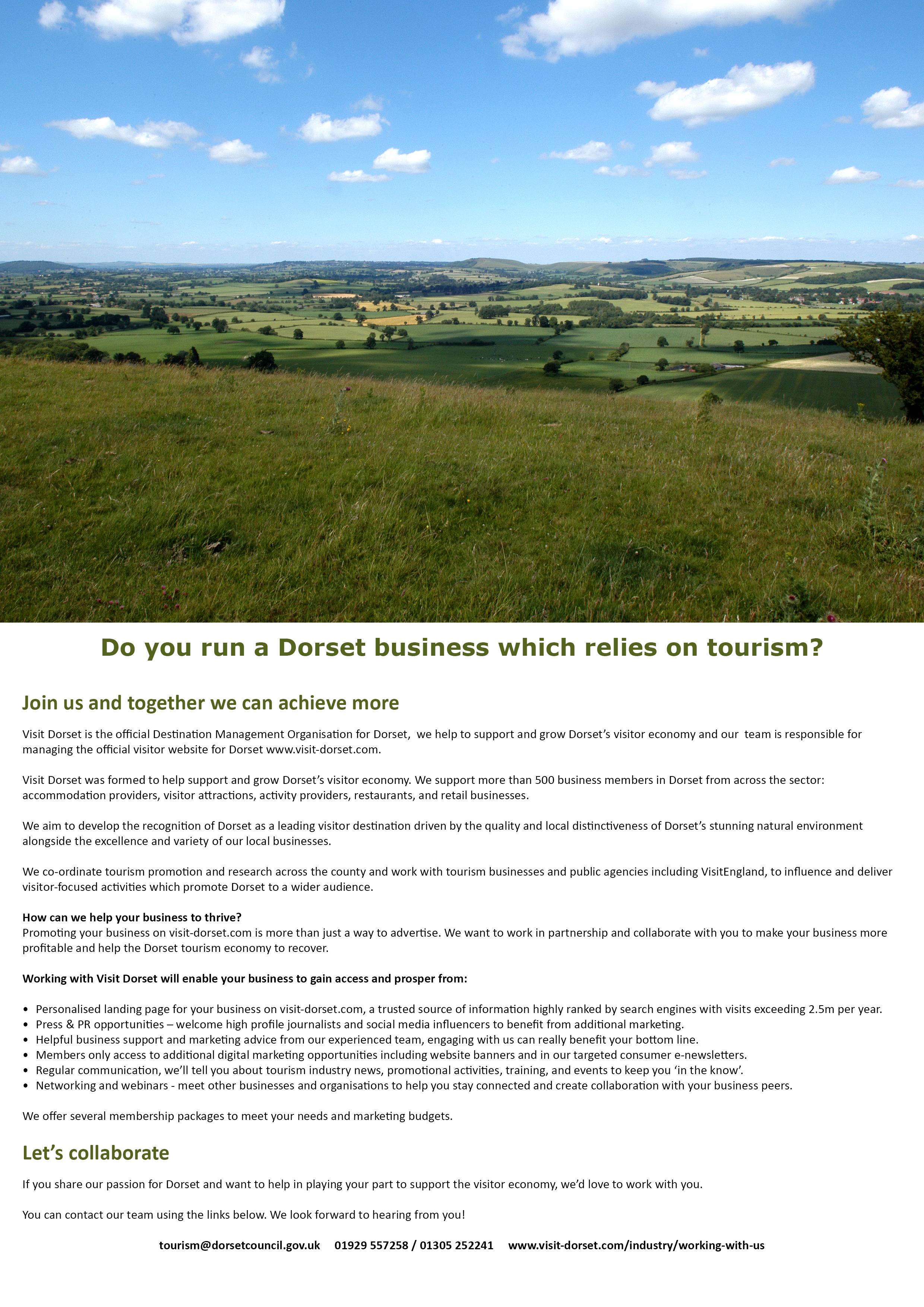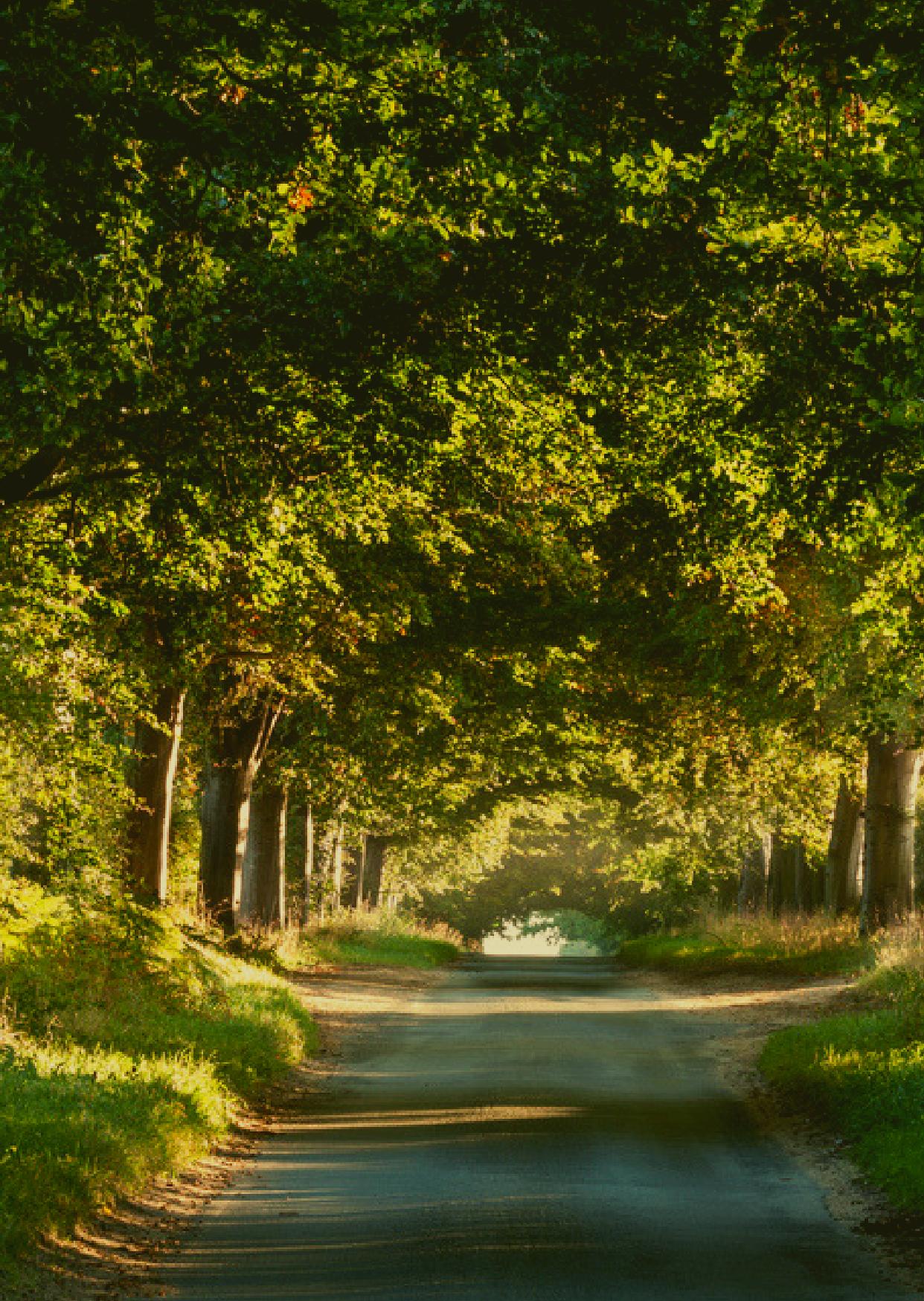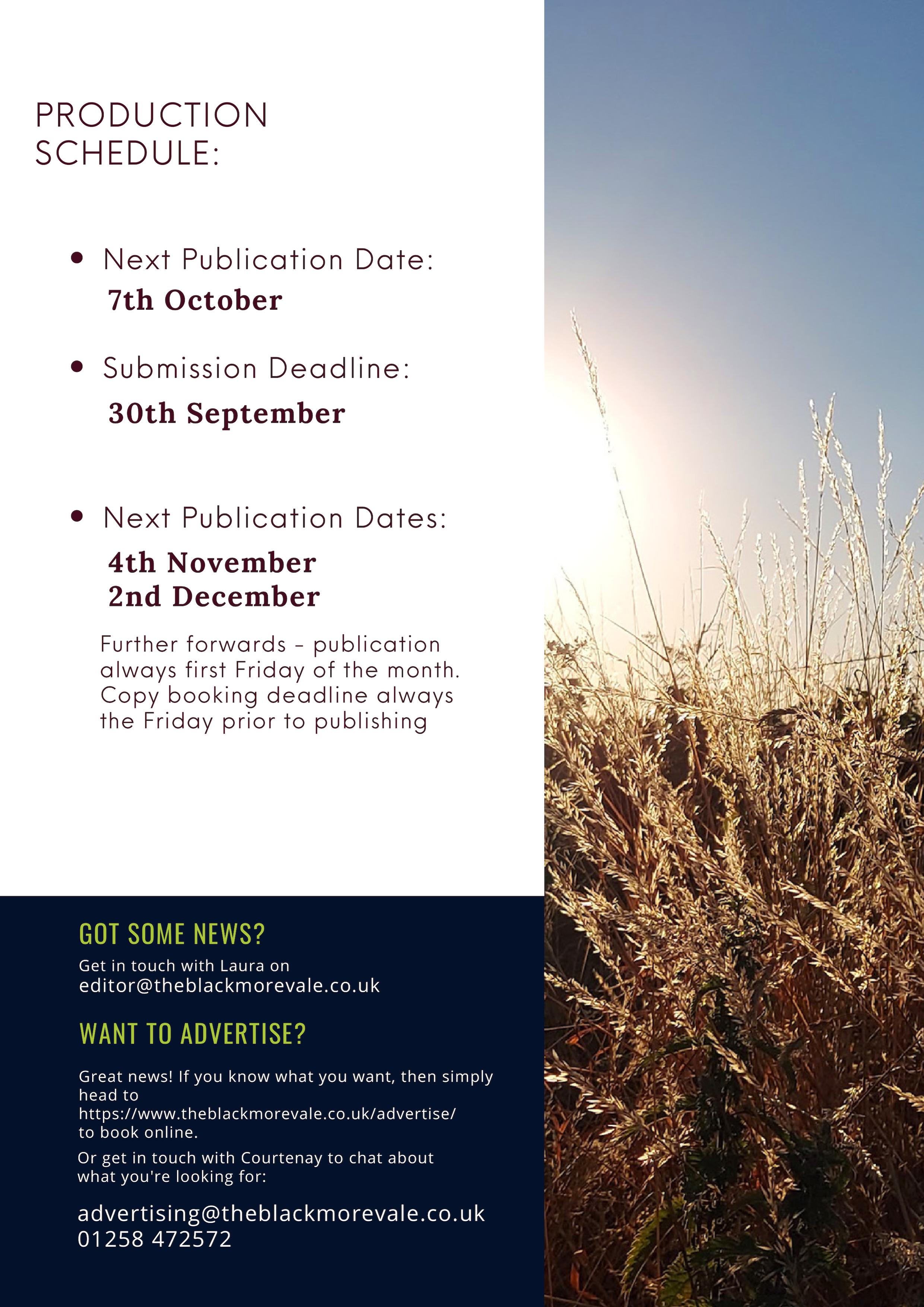From the heart of the Blackmore Vale








In the project’s first major contract a £6 million contract has been signed with North Dorset-based Wessex Internet to bring the government’s new Project Gigabit to 7,000 rural properties P.4
Minette Walters takes on the Random 19 Minette is published in almost 40 countries and has sold more than 25 million books. She loves The Purge horror films, hates biscuits and adores chickens. P.30

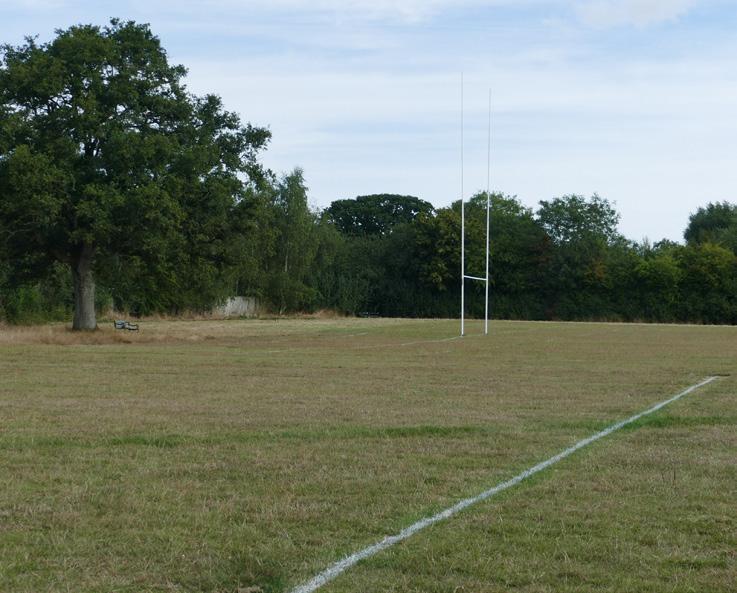
It could close by the end of September, warn the trustees, if no one comes forward. They have also considered selling their surplus land, possibly for development. P.6.
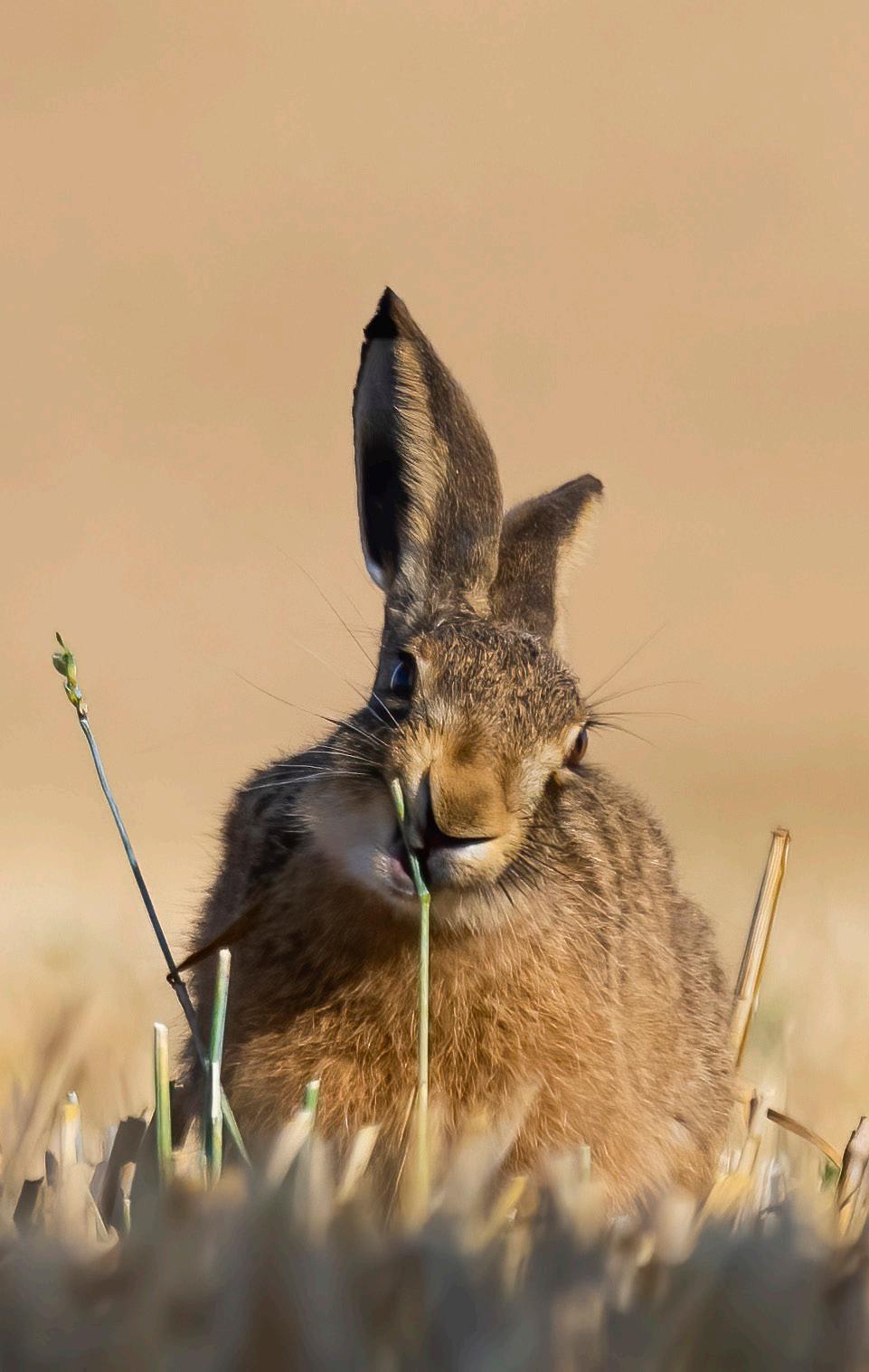
This month’s stunning front cover taken at the Great Dorset Steam Fair submitted by Phil Cutler. Image above by Graham Bannister. As always, the rest of the Reader’s Photography is a beautiful gallery of local images. P.66

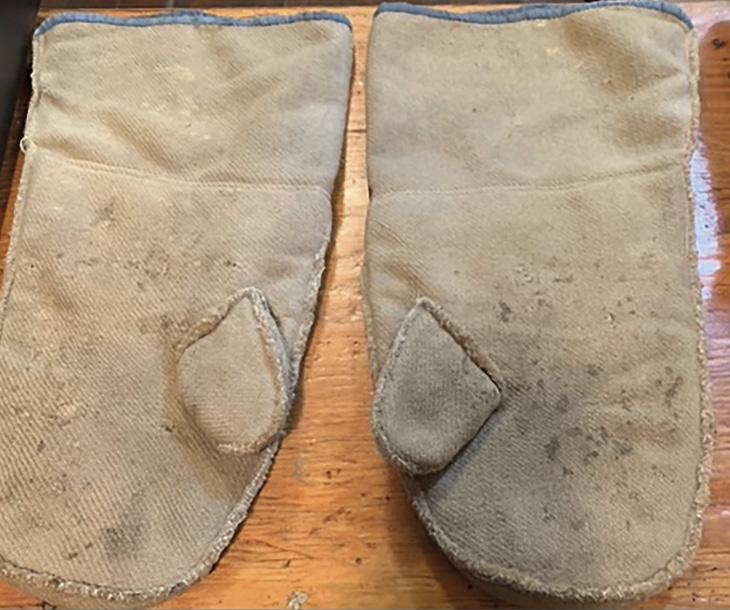
Not only do we have a brilliant round up and gallery of images of the show, but we also have all the results from the cattle, sheep and equestrian classes. From p.22
Did your teen or grandchild take state exams this year? We’ve got special mentions of both GCSE and A level student at the local high schools - P.106
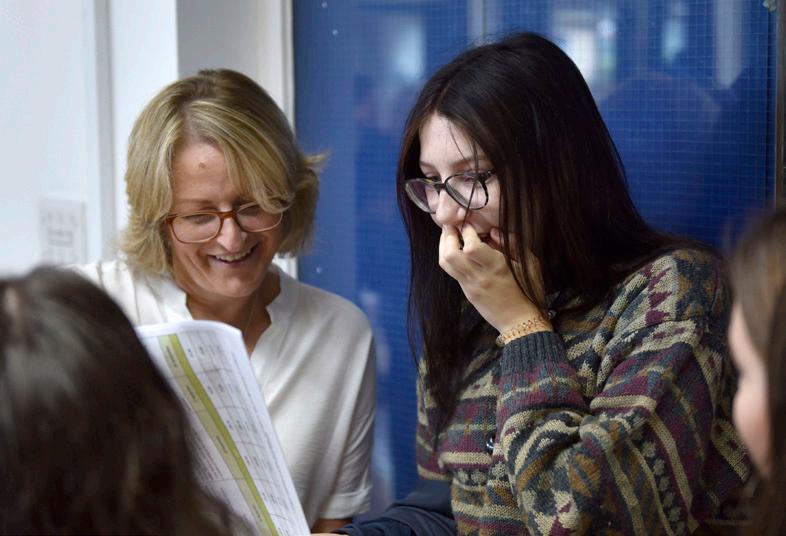
know, it’s a HUGE magazine. So we make it easy for you - just like grabbing the sections you like best from the Sunday papers, you can click the number to jump straight to the section you want. Or, y’know, just make yourself a coffee and read from the beginning
Courtenay, he’s the organised

I wasn’t sure what I was going to write this month –everything is either too big (Energy. Politicians. Strikes. Bills. War.) or too small (it’s hard to remember it being so hot now, isn’t it? And how does the cat lose three collars in one week? And we really do need to get our boiler fixed …). The last few months have been so ... full. There has been so much happening, constantly, at every turn. It has been a lot – not just for us, but for everyone, I think. Then today I happened across a poem (thank you TikTok) which just made me breathe a quiet ‘ye-e-essss’ in my brain:

It’s the end of August and I’m tired. The garden is tired. The grass is tired. Everything is tired. We’ve all had too much summer.
Bring on the cold. Bring on the frost. Bring on all that death and destruction. Let’s have some quiet and some peace. Let us rest. Give us emptiness. I had never heard of the poet (David Budbill) but this has been rattling around my brain ever since. I don’t think any of us want the cold – like any of us can afford the heating! – but we are all tired, and in need of rest. September always feels like a reset to me (much more than January). I would very much like a little peace, rest and emptiness. Lost in the maelstrom of the last few weeks the second anniversary of The BV slipped past unnoticed. But I’m going to be very un-English and say out loud that we are very proud of what it has become. Collective pride* can be a powerful thing. This issue is a bumper one, thanks to us wanting to share a large amount of local pride. We’ve covered lots of the exam successes of our COVID-cohort of students, who faced state exams for the first time (see school news from page 106). There’s also a completely brilliant opinion piece from Luke Rake, the head of Kingston Maurward College, on how and why exam results can be skewed (along with a brilliant explainer for any parent or grandparent who has said out loud this month “what’s a 7 when it’s at home? Is that an B? Or a B+?”)
We’ve also got ALL the local winners from the G&S Show – that starts on p.22. Congratulations to them, and also to James, Bonnie and the G&S team who made it such a genuinely brilliant day.
So. Thank you for the last two years. And let’s all take a deep breath and keep putting one foot in front of the other. Bring on the frost.
*by coincidence we’re currently re-watching the BBC’s Pride & Prejudice. I almost wept when I worked out that it was released almost 30 years ago.
Boris Johnson’s levelling-up agenda comes to rural Dorset, bringing ‘lightning fast’ broadband and other benefits. Fanny Charles reports
A £6 million contract signed with North Dorset-based Wessex Internet will bring the government’s new Project Gigabit to 7,000 rural properties across the district over the next three years.
Forget super-fast or even ultrafast broadband – the £5 billion Project Gigabit aims to bring the fastest and most reliable internet connections to hardto-reach rural areas, to enable families and businesses to take full advantage of technological advances in the coming decades.
For North Dorset, the contract with Wessex Internet will result in vastly improved connectivity
for businesses and individuals outside the market towns and larger villages. The first home will be connected by the end of 2022, with an expected completion date for all by 2025. Wessex Internet was started by James GibsonFleming, now chairman and founding director. Initially it was a response to the problems of business people and individuals in the Iwerne valley who were struggling to get reliable broadband. Since then, the
company has expanded to serve communities in Dorset, Wiltshire and Somerset, and has provided fast broadband to most built-up areas of North Dorset.
But it is very expensive to reach people in the remoter, scattered settlements and farms, and this is where the support funding from Project Gigabit comes in.
It’s not just ‘lightning fast’ broadband, as Boris Johnson called it, when he came to North Dorset to sign the project’s first

Gigabit broadband can provide speeds more than 30 times faster than copperbased superfast broadband
major contract, on one of his last prime ministerial visits. It will also have far-reaching benefits for local business and the community, providing employment opportunities and improved skills for local people. Hector Gibson-Fleming, chief executive of Wessex Internet, is justifiably excited about the contract and what it means for the area: ‘We care about our community and we are really proud as a business to be part of this.’ he says.
‘It will not only bring unlimited speed broadband to the hardestto-reach areas, it will also create employment opportunities for businesses and is good news all round for the prosperity of the area.’
It’s not just good internet Wessex Internet currently employs 150 people, and the new contract will see that figure rise by around 100 over the next 18 months, says Hector, who urges local people to look at recruitment prospects offering skilled jobs across the company. These employment benefits will spread across the district, as the improved connectivity
allows entrepreneurs, farmers and businesses to expand into old farm buildings and other potential workplaces. The new businesses will mean more and better employment and training for local people.
‘There will be opportunities for people to have high-skilled jobs in North Dorset,’ says Hector. ‘We are really proud of the difference we are making to our community.’
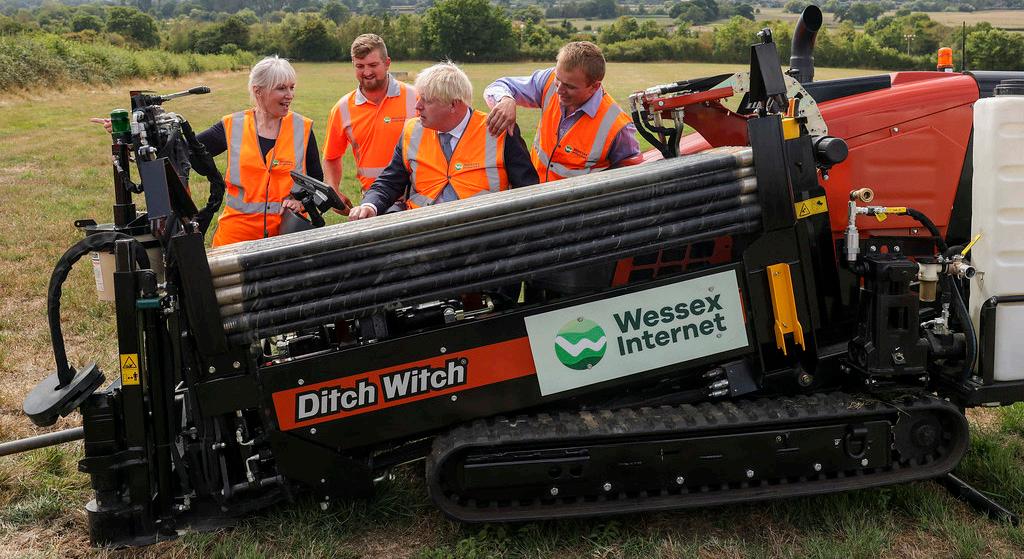
• The government press release, announcing the visit by Boris Johnson and Nadine Dorries, Secretary of State for Digital, Culture, Media and Sport, says: ‘Gigabit

broadband can provide speeds of more than 1,000 megabits per second, more than 30 times faster than copper-based superfast broadband, which is currently available to 97 per cent of UK premises. While superfast is fast enough for most people’s needs today, gigabit-capable connections will provide the speeds and reliability Britain needs for decades into the future.’
• For more information on ‘proudly local and independent’ Wessex Internet, visit wessexinternet.com
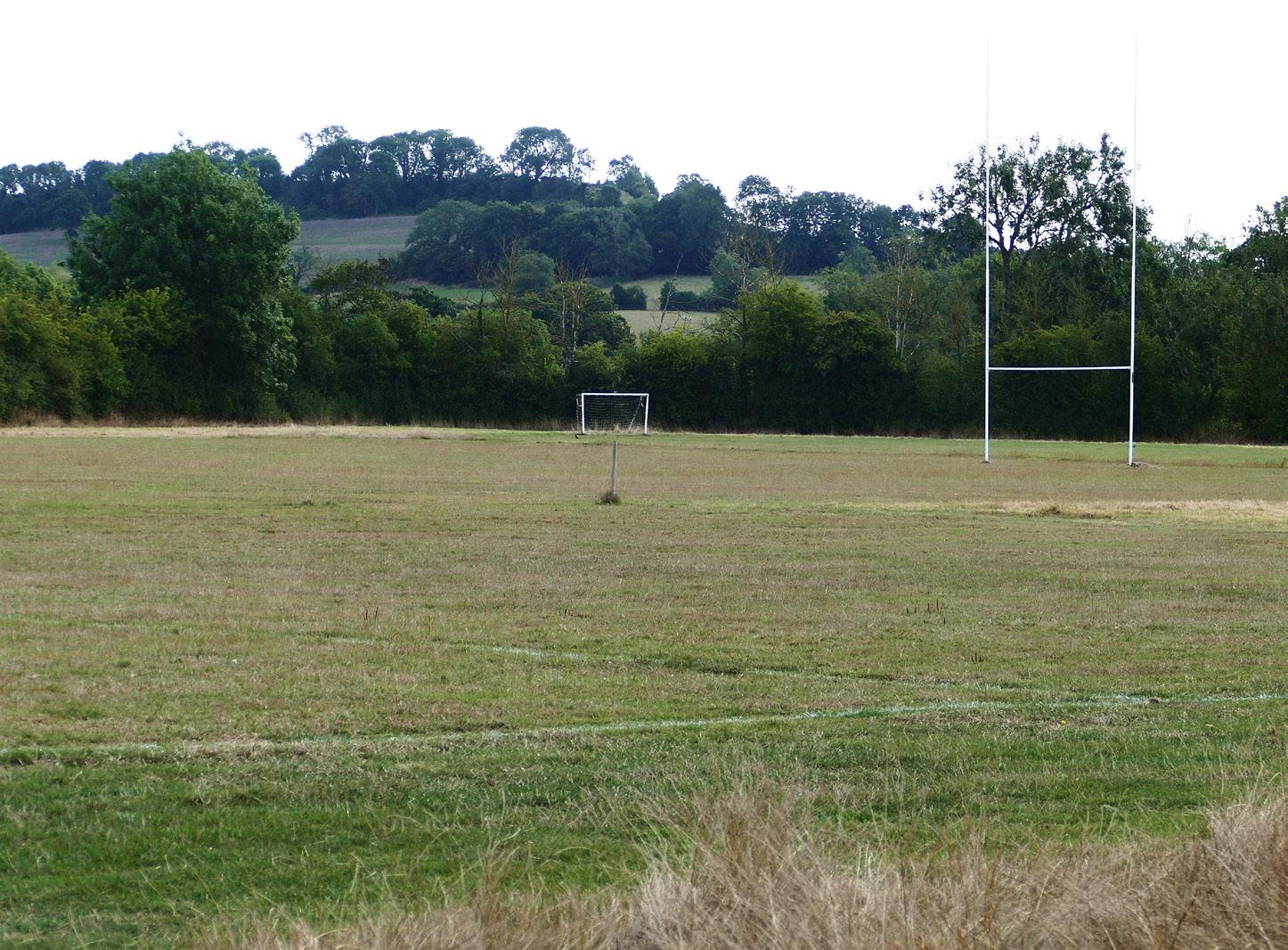
Wincanton Sports Ground could close by the end of September, warn the trustees, if no one comes forward. Rachael Rowe reports
The Blackmore Vale is full of brilliant voluntary services that keep things running in the community. If you want to be a volunteer, there are endless options to choose from – you can help to clear footpaths, run sports facilities or operate a food pantry.
But what happens when a voluntary role evolves into a full-time unpaid task? What if the volunteers want to do something else with their time?
Wincanton Sports Ground is one of several organisations faced with a desperate need for new volunteers and trustees and it so urgent that it risks closure in a few weeks time.
Volunteers needed Wincanton Town Council chairman Howard Ellard also chairs the trustees of Wincanton Sports Ground. He says: ’The sports ground works on a volunteer basis and is governed by a charitable trust (Wincanton Recreational Trust). Like so many local leisure facilities, it is not overseen by the local council. We have four trustees who have been in the post for seven years, and two wish to stand down. ‘The issue is that two of the volunteers have more or less been doing a full time job working at the sports ground. They want to do other things with their time.
It sucks the life out of volunteers when they don’t get any support.’
So, what are the consequences of not having any new volunteers or trustees at the sports ground? Howard explains: ‘The trust cannot operate without trustees. Activities at the sports ground will potentially cease at the end of September.
‘Without volunteers, so many essential jobs just would not get done. At the beginning of October, we will not have anyone to do the day-today jobs. We have tried to get people to volunteer – but we haven’t got very far. When someone is already doing something (as a volunteer or trustee), people think “Well, I don’t have to then”. We need
people to step up; the sports ground is for the benefit of everyone.’
Wincanton needs all the sports and leisure facilities it can get. According to data from public health, the adult population in South Somerset has high rates of obesity (60% of adults). Wincanton also has higher rates of high blood pressure and mental ill health than other parts of England. These can all be improved by regular exercise. Sports and leisure facilities are crucial to preventing long-term conditions and ill health.
Wincanton Sports Ground is home to the tennis club, Wincanton Town Football Club and Wincanton Rugby Club. Popular local cycling club the Wincanton Wheelers is based at the ground, as is a forest school. Naturally, the clubhouse is
Activities at the sports ground could stop at the end of September.
also booked out for events. Local people walk through the grounds, and the complex is well-maintained by the volunteers. A spokesperson for Wincanton Town Football Club says:
‘Wincanton Town Football Club has been in existence since 1890, and our men’s first team is currently playing at its best standard of football. We have managed to get help from the public to fund urgent drainage works for the pitch, and it is also our first season entering a ladies’ team into the Somerset Women’s League.
Wincanton needs to have its much-loved football teams playing here and we are entirely run by volunteers.’
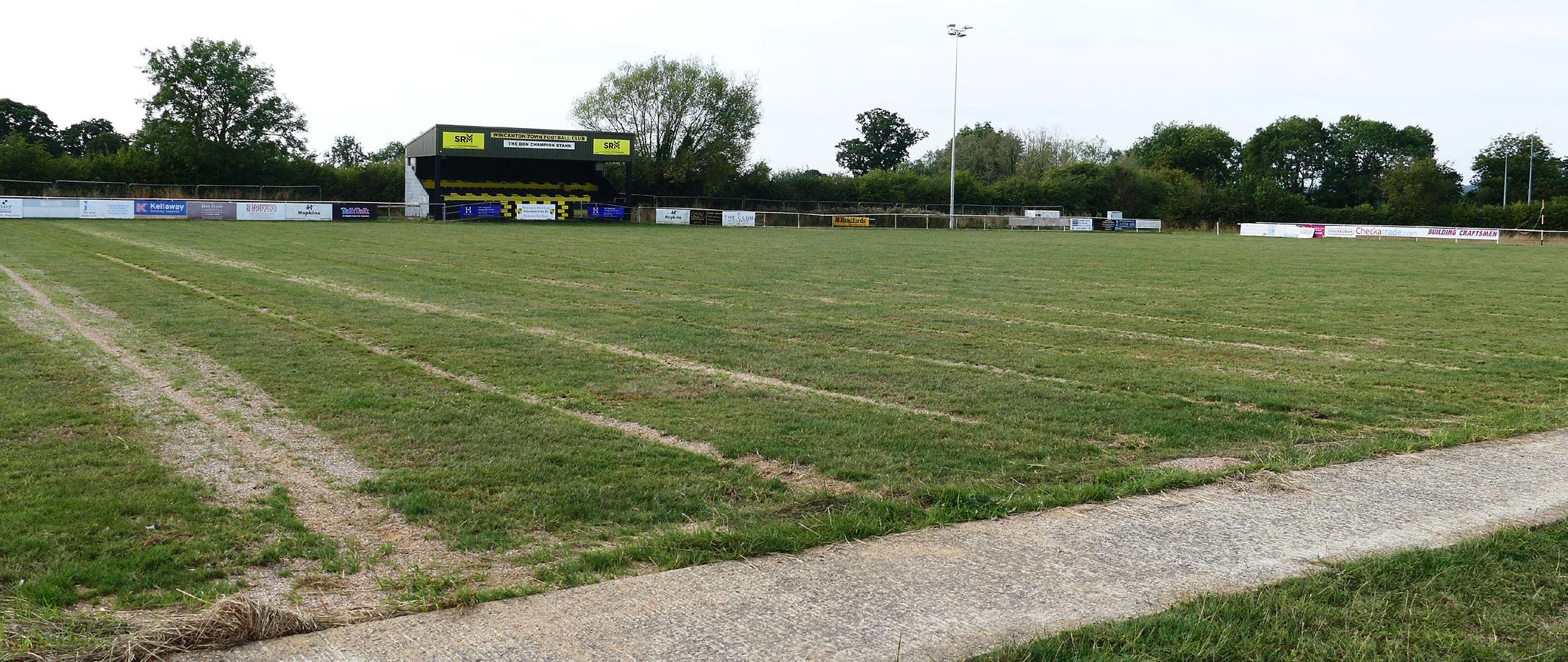
There are various jobs that volunteers or trustees do, ranging from maintaining the grounds to doing the accounts and managing the building.
There are also cleaning and serving positions in the main building. All the individual clubs run on their volunteers too.
Howard continues: ‘We have
done some incredible things in the last two years, but we need people to come forward to replace the volunteers.’
The trustees have already looked at other options. They have met with other organisations that have the potential to take on the management of the sports ground. And they have also considered selling their surplus land, possibly for development. ‘We do have more land than we need,’ says Howard.

Volunteering is not only an admirable thing to do, it is rewarding and comes with
a host of personal benefits. However, when it takes over your life it can become too much. As a society, we have become dependent on volunteers, and their presence can be taken for granted. The work involved in running a charitable trust is also significant. Volunteers step forward to help society – but they also need support and a break from time to time.
If you are considering volunteering, remember that just one hour a month taking on a single task can make a positive difference.
If you are interested in volunteering at Wincanton Sports Ground, contact Howard Ellard howard_ellard@hotmail.com.
Surplus land could be sold for development.
The summer holidays usually mean a quieter time for newspapers, with Parliament in recess and editors scrabbling around during the “silly season” with things to fill their column inches (not The BV of course), but not in this exceptional year, with the Ukraine war, the drought, the energy and cost of living crisis and the Tory leadership battle. Thankfully, the annual release of GCSE and A Level results (and a load of other qualifications one never hears of, but more on that later) provides a glorious opportunity to fill space with images of leaping young people, and the strong suggestion by many papers – particularly The Telegraph – that the only people who did A levels were girls (don’t believe me? Just check the coverage to see the innate media bias). The successes of strong A Levels from boys, or of students studying for qualifications such as BTEC and City & Guilds (of which there are more), simply disappears into the ether. This year was notable for the changes that were required after the teacher-assessed grades during the pandemic, and the resulting shift in grade proportions during the process. It also highlighted
again the changes in the last few years – what on earth is a Grade 8 or a 7 anyway? How does it compare to what we may have done when we were at school? And this year there were also questions about why the proportions of teenagers getting top marks had gone down.

First things first. GCSE grades changed a few years ago to allow for more fairness and accuracy at the top end. The number of students gaining the highest grade was continuing to increase (why this happens in a minute) and so the system was changed, alongside shifts under then Secretary of State Michael Gove to remove coursework from large numbers of subjects and move to more ’traditional’ end-of-year examinations.
Perhaps surprisingly, this more old-fashioned approach to having just examinations – coming with its own stresses and strains – has actually been shown to be a fairer system for students from lower income families, and thus more suitable to enable social mobility.
Interestingly, coursework generally favours more affluent students who have better home and support networks and availabliity of private study space. This is important, as it helps explain the big shifts during the pandemic. The scoring system for GCSE changed to the one in the image on the left –any student with a 7 or above has clearly achieved great things. But then, by the same token, so will a student who has struggled with academic study and gets a 4, which is the ‘gateway’ level at 16. For those of us even older, this Grade 4 is the same as an O Level C or CSE Grade 1.
But why were the grades increasing? The usual red-top arguments are that the exams are getting easier. A similarly silly rationale is that students are getting brighter.
More sensible views would note that, as new examinations systems come in, it takes time to really understand how to deliver them, not only for the test but beginning to prepare students as early as year 7 (that’s the first year of secondary school!). It is also worth noting that the examination bodies are businesses. They operate in a competitive market, so if, for example, one board gets a slightly
Baffled by the exam system and what those grades actually mean? Kingston Maurward’s Principal Luke Rake has an explanation for all us confused ones
What on earth is a Grade 8 or a 7 anyway?



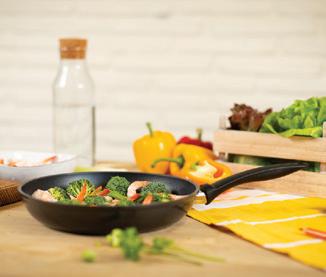




higher proportion of students who achieve a 9, that perhaps provides them with some greater appeal. Schools can – and do – switch boards from time to time.
Most importantly, though, the grade boundaries are set by the boards themselves, and this shifts every single year. Thus, the exact same exam score may elicit a different grade in different years. This profiling (or norm-referencing) enables the exam boards to control precisely the proportion of students who get a certain grade and prevent wide swings. As such, it’s entirely within THEIR control what happens, not the kids’.
During the lockdown periods of the pandemic, students (including my own children) were unable to sit exams and as such were awarded grades according to school-assessed performance measures. These were then aggregated by the exam boards and then, importantly, normalised by the Department for Education using the nowinfamous algorithm. This caused a huge surge in top grades, and also significantly also favoured the more affluent and independent schools.
Is it the schools’ fault? Also no.
This is because the system was hard-baked into a sociological process where students were being assessed on what they had already done and the confidence of staff on how they may do. There is bias all over this, most of it unconscious. Teachers routinely over-estimate student grades and ability (which is why predicted grades are treated with a massive pinch of salt at A level by the universities).
This was particularly noticeable where students came from affluent families, which is why those students have this year, proportionately, seen the largest reduction in the top grades.
Schools cannot improve equality or change the background of their students. They have enough else to do, and they do it brilliantly.
As a result, the whole grade system fell down, as the usual processes to manage the proportions of students at each level weren’t in play. They needed rebalancing this year through a proportionate shift back, down to nearer 2019 levels of performance. They will almost certainly need one more year of rebalancing, and then we will return to the usual
process where the number of passes and top grades incrementally improves by 0.3% or so every year – until we have another step-change in how students are assessed. I’m on the 15th Secretary of State for Education in my career – another one will be along in a minute, so it’ll always be changing. A final thought for those of you with children, like my own, who sat A Levels or GCSEs this summer. Their grades will undoubtedly be lower than had they received centre-assessed grades two years ago. Those grades will thus be competing in the work market for jobs in the future.
It really isn’t, and was both completely predictable and entirely avoidable. Gavin Williamson was clearly asleep at the wheel. However, in the long run, it is unlikely to make a permanent difference, although this requires time to be sure. Grades tend only to be used as staging posts at certain times, and as such the competition tends to be from the same peer group (getting into Uni for example). If you’re over 30, when was the last time someone asked about your exam grades?
What’s far more important is the range of skills young people develop around the hard grades –and this is what is most important now. Students need to be getting jobs, doing volunteer work, exercising, socialising and getting as many strings to their bows as possible.
Your CV gets you an interview, your attitude gets you the job.
For those of you who got your grades this summer – don’t worry, whatever they are. I know plenty of people with top grades and Oxbridge degrees who are far less happy than those without and who work in trades, and they are also frequently less financially secure. Yes, you really need to get your maths and English, which is why if you’ve not yet got a 4, any sixth form or college will make you resit and continue teaching you those subjects. Outside that, though, there’s more that matters.
There is a world out there beyond the mundane path of GCSE > A Level > University. It’s actually the one most people take, whatever the mainstream media likes to tell us.
The path you take is something only you can choose; just enjoy the journey.
*see this year’s local exam results with each school sharing special student mentions from page 106 here.
It’s entirely within THEIR control what happens, not the kids. The exams are getting easier or the students are getting brighter.



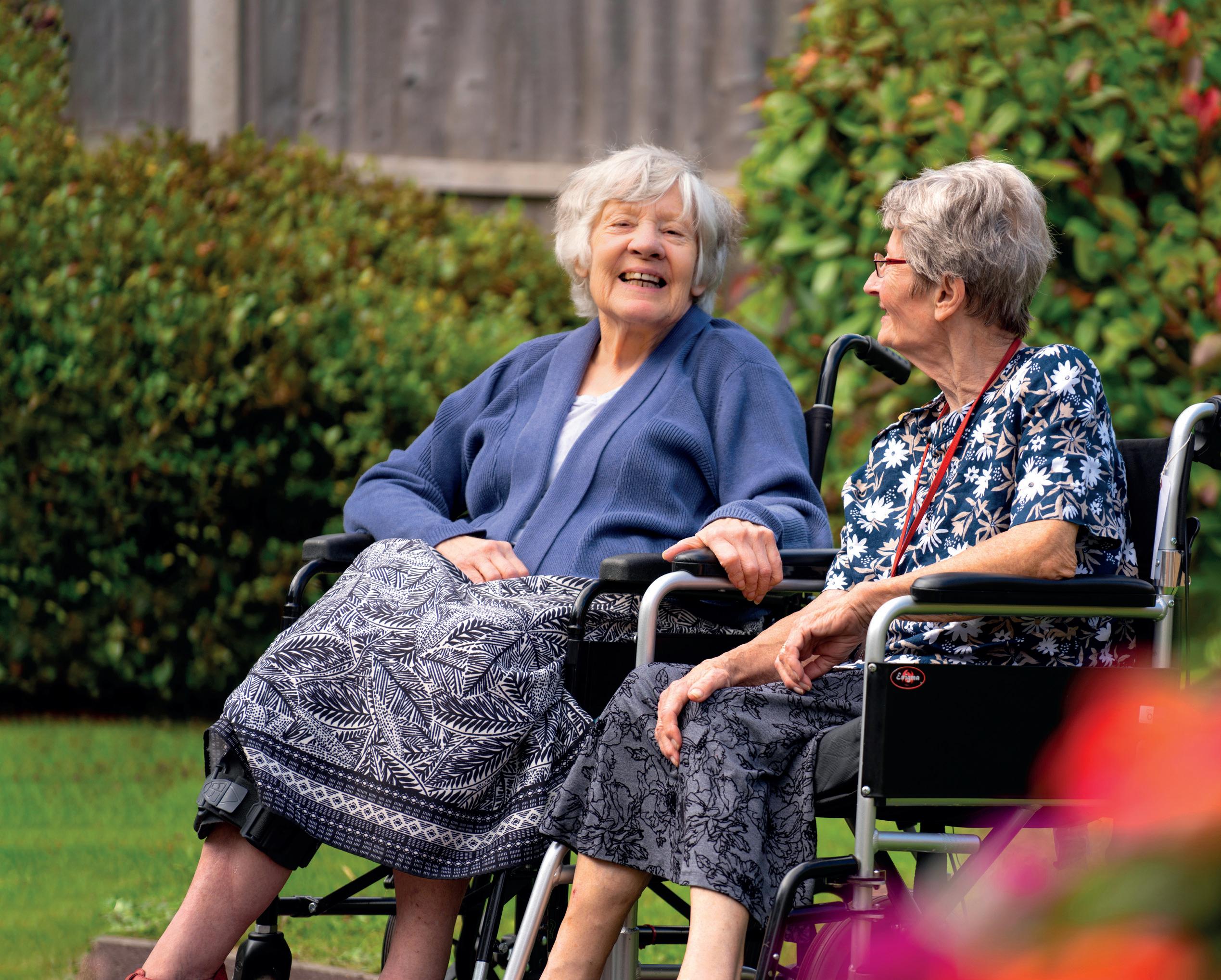
Local farmer Graham Birch used a WhatsApp group to contact neighbouring farmers who helped save his fields. Rachael Rowe reports
‘The really frightening thing was the speed at which the fire took hold. It engulfed the field of corn so quickly, despite the efforts of fellow farmers and fire crews to stop it.’
When Graham Birch’s crops went up in flames, help came swiftly from neighbouring farmers as well as a number of fire appliances who attended from the surrounding area.
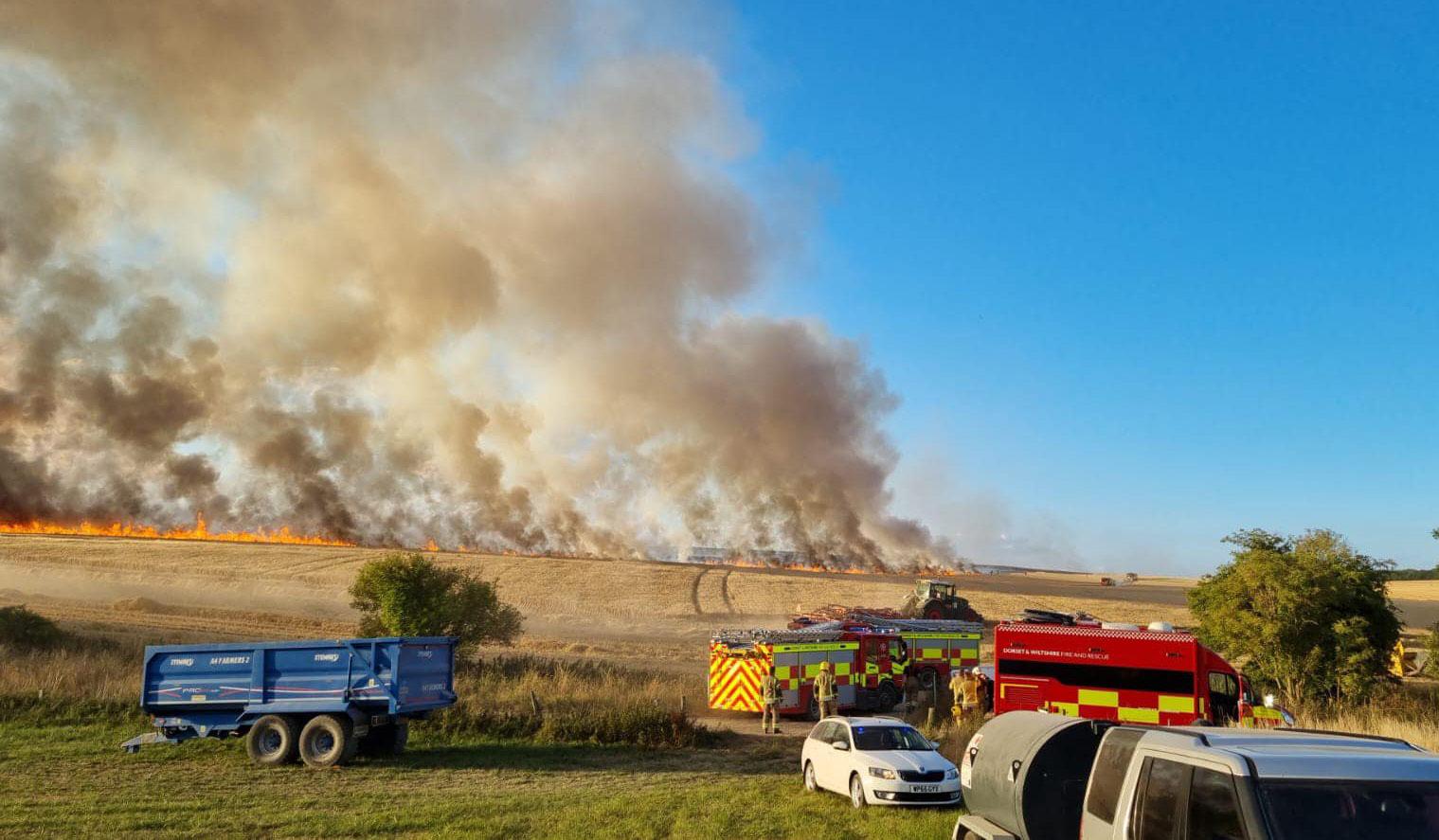
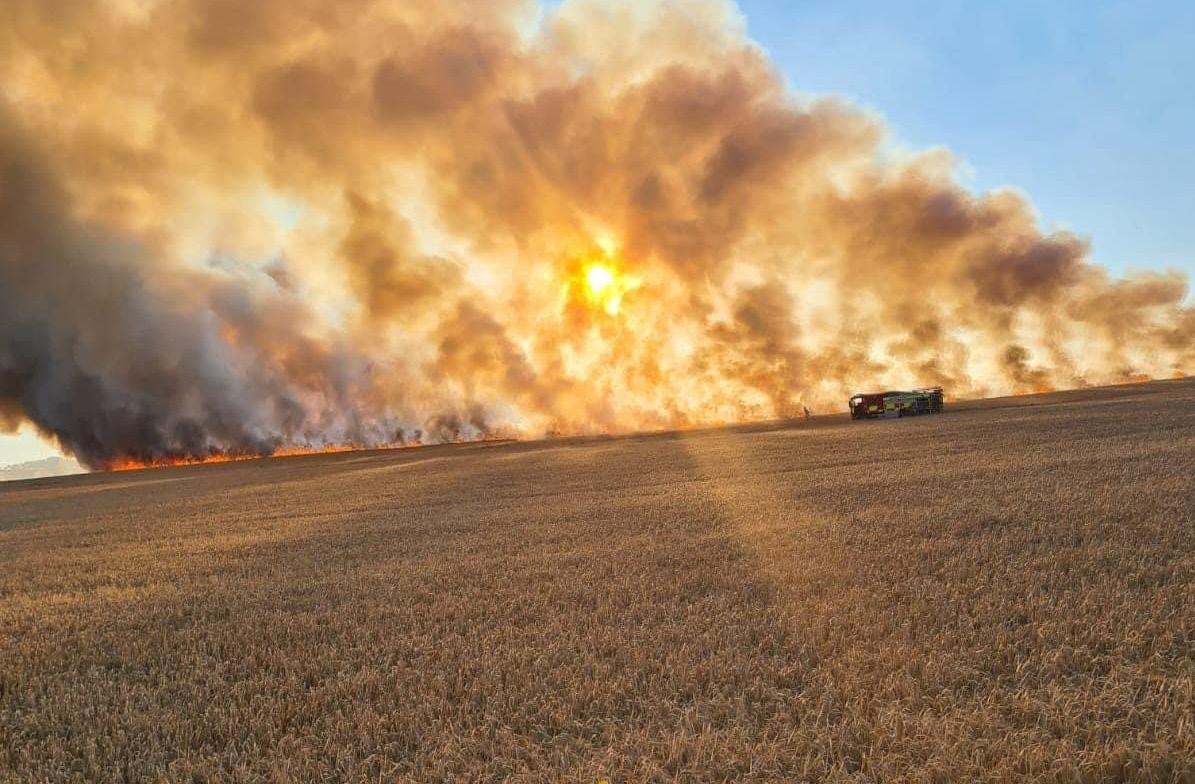
‘One of our neighbouring farmers, Mark Tory, set up a
WhatsApp group for us, so we can help each other out.’ Graham explained. ‘All the local farmers are on it, and they came running to help, creating a fire break. ‘Typically, they will bring a tractor, cultivator and a water tank to try and create a fire break to prevent it from spreading to other farms and areas. The fire brigade were brilliant at getting things under control and had several engines at the scene. It was an amazing
Firefighters were at this scene on 8th August, extinguishing a fire which affected approximately 100 acres. Ten fire engines, a 4x4 pumping appliances and two water carriers attended. Image © Dorset & Wiltshire Fire and Rescue Service
piece of teamwork. We got the fire controlled within about 30 minutes, but it took two hours to put out.’
Graham, who owns Hedge End Farm, at Winterborne Stickland, was reflecting on the terrifying wildfire on his land: ’There’s a lot … hit a flint, causing a spark that set the fire. Everything is so dry at the moment and our crops were super dry. Within moments the fire took hold.
‘My farm manager was treated for smoke inhalation at Dorchester Hospital.’
These dry conditions promoted Dorset & Wiltshire Fire and Rescue Service to issue a Red fire severity alert. They are asking the public not to light bonfires or barbecues during this alert period. A red alert means that, should a wildfire be experienced, it could spread quickly and easily due to the dry conditions.
The risk is most significant on
large areas of open land, such as heathlands, fields and even cliffsides.
The statistics make grim reading. Area Manager Marc House says: ‘From 1st – 10th August, Dorset and Wiltshire Fire and Rescue Services (DWFRS) has attended 180 fires in the open. During the same period last year, the service dealt with only 34 incidents of this nature. That is an increase of over 430%.’
Last year there were no agricultural open fires, but in 2022 there have been 23, mostly in fields of standing crops. DWFRS is asking the public to be vigilant. Marc continues: ‘Farmland is very vulnerable. They are harvesting and it’s a rural community. They need to get the crops in and we want to support the farming community. Farmers can do a lot to help themselves such as cleaning out chaff and dust from machinery and also using spotters.’ So how can we all help?

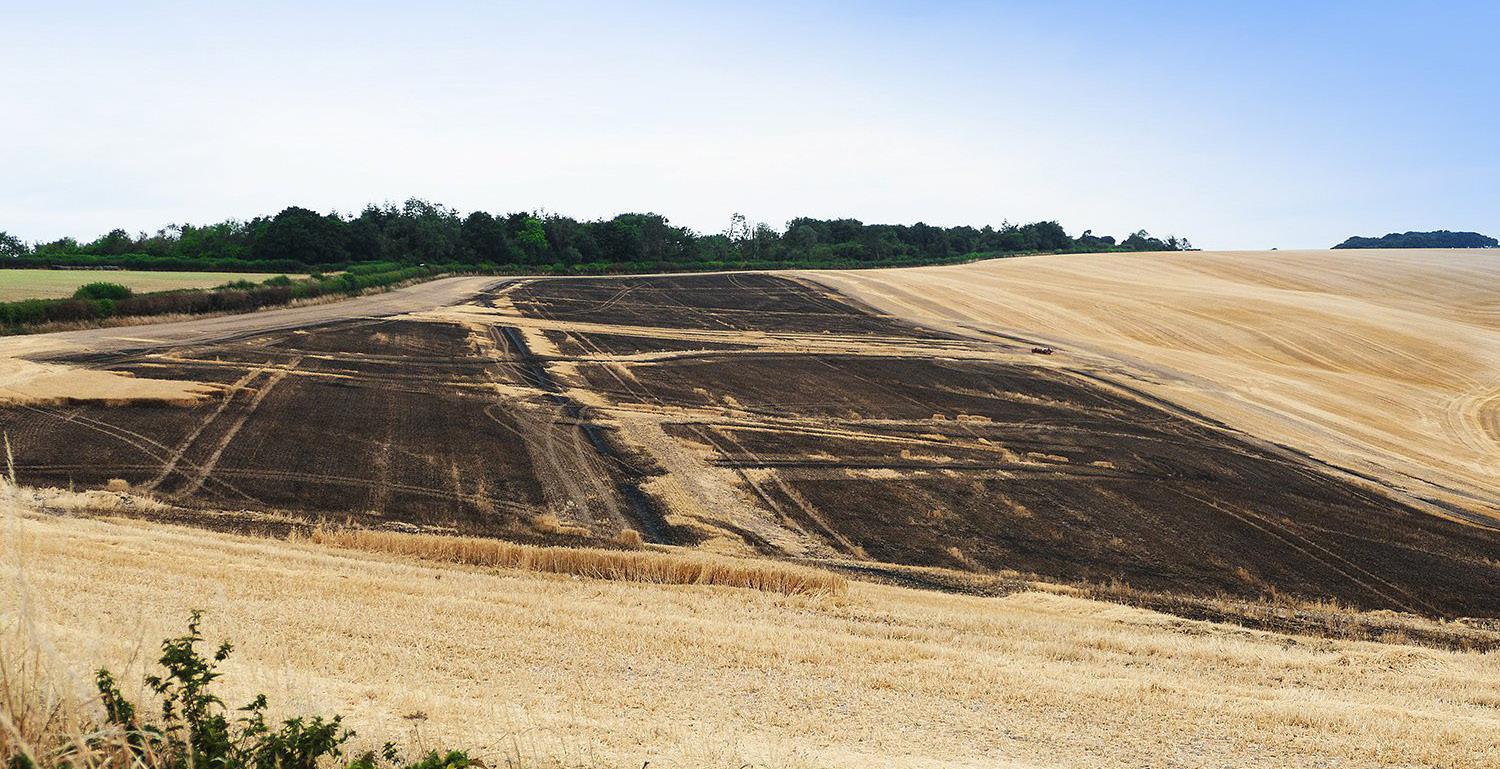
All that remains of the fire at Hedge End Farm in Winterborne Stickland is a large area of scorched earth. Image: Rachael Rowe
Hopefully, people are getting the message about disposable barbecues, but as the recent fire at Studland Heath shows, they are still responsible for many open wildfires. Marc House adds: ‘People should avoid campfires, barbecues and bonfires. Cigarette ends will ignite a hedgerow. Litter should also be disposed of safely. Glass reflects the light and ignites material. If there is a fire, people need to get to a safe place and call 999.’ Graham thinks basic good
judgment plays a part in preventing fires. ‘It’s not necessarily about legislation, but people having the sense to not use a disposable barbecue or a sky lantern. If you smoke, put the butt out properly. People need to use their common sense.’
Finally, think again if you imagine an odd rain shower is sufficient to reduce the risk. Everything is still very dry. As Graham reflects: ‘We need a LOT of rain.’

After a two year enforced break, the Great Dorset Steam Fair (GDSF) was back! Seen as the world’s leading heritage event, the spectacle covers an enormous showground – at over 600 acres it’s one of Europe’s largest outdoor event locations.
GDSF Managing Director Martin Oliver said: ‘We have all missed the Steam Fair massively these past two years and it’s wonderful to welcome everyone back to the showground.’

For so many visitors, the stars of the show are of course the majestic Showmen’s Engines, standing proudly in front of the Old Time Fairground. After dark they lit up to create the unmistakeable GDSF skyline. But there were also steam tractors (for light haulage work),
steam lorries (for local deliveries) and steam cars – once quite The Thing To Be Seen In, with the world-famous Stanley Steamer being the Aston Martin of its day. Steam road rollers were the last steam engines to be built – some still actively working well into the 1960s, with local councils using them for road building and repairs.
GDSF has one of the most prestigious heavy horse displays in the country, with over 100 taking part in displays each day. The fairground is the largest travelling one of its type in the UK, and is a GDSF special mix of old and new. Visitors could a turn on a steam-driven set of Gallopers (the most traditional of carousels) and then move on to a white-knuckle experience on an
adrenaline-fuelled monster ride. There were craft and food marquees, and a Great Dorset Bake-On Tent. All this plus the Wall of Death, the Grand Palace of Entertainment and seven stages of live music including Folk, Country, Blues, Rock and Chill-out.
‘What a show!’ said Martin ‘It felt amazing to be back and we thank everyone for making it such a special event. See you all 24th28th August 2023!’
Massive thanks to Graham at Pengelly Media for the use of his amazing images of the first day at the show. See a full album of Graham’s images on here

When the cattle market and the creamery closed at Stur, locals found a new way to keep the town on the map.
Sturminster Newton was once home to one of Europe’s largest cattle markets, until, in the late 1990s, the market site was sold for redevelopment. The closure of the cattle market ended a 700 year old tradition and was quickly followed by the closure of the Creamery, makers of the awardwinning Sturminster Cheddar and other cheeses.
A public meeting was held at which the town decided that an event to celebrate cheese was one way to keep Sturminster Newton on the map.
In 1999, the first Sturminster Newton Cheese Festival was held –four days long and a wholetown event. Attractions ranged from a tour of the Creamery to a tea-dance in the old Sturminster Hall. Three scout marquees on the recreation ground hosted local food producers and crafters – and there was even an evening

fashion show.
The best of the West Fast forward to 2022 and the festival is still going strong. It is now held for two days over a weekend with rather larger marquees and it takes over the whole recreation ground, off Ricketts Lane.
This year’s festival will feature 21 cheese producers and 47 artisan food and drink producers, showcasing the best that the West Country has to offer.
Naturally there will be a huge variety of cheeses and you can sample them with an array of chutneys, bread, biscuits … and
of course follow up with some sweet treats of jam, cake or chocolate. Perhaps you might like to finish off with some locally distilled gin or vodka – or maybe wine from a Dorset vineyard?
The craft tent will be home to jewellery, portraits, photography, home scents, wood turning and more. Outside there will be other stands, including plants and garden furniture as well as craft demonstrations. And don’t forget the local charities and other organisations which are represented too.
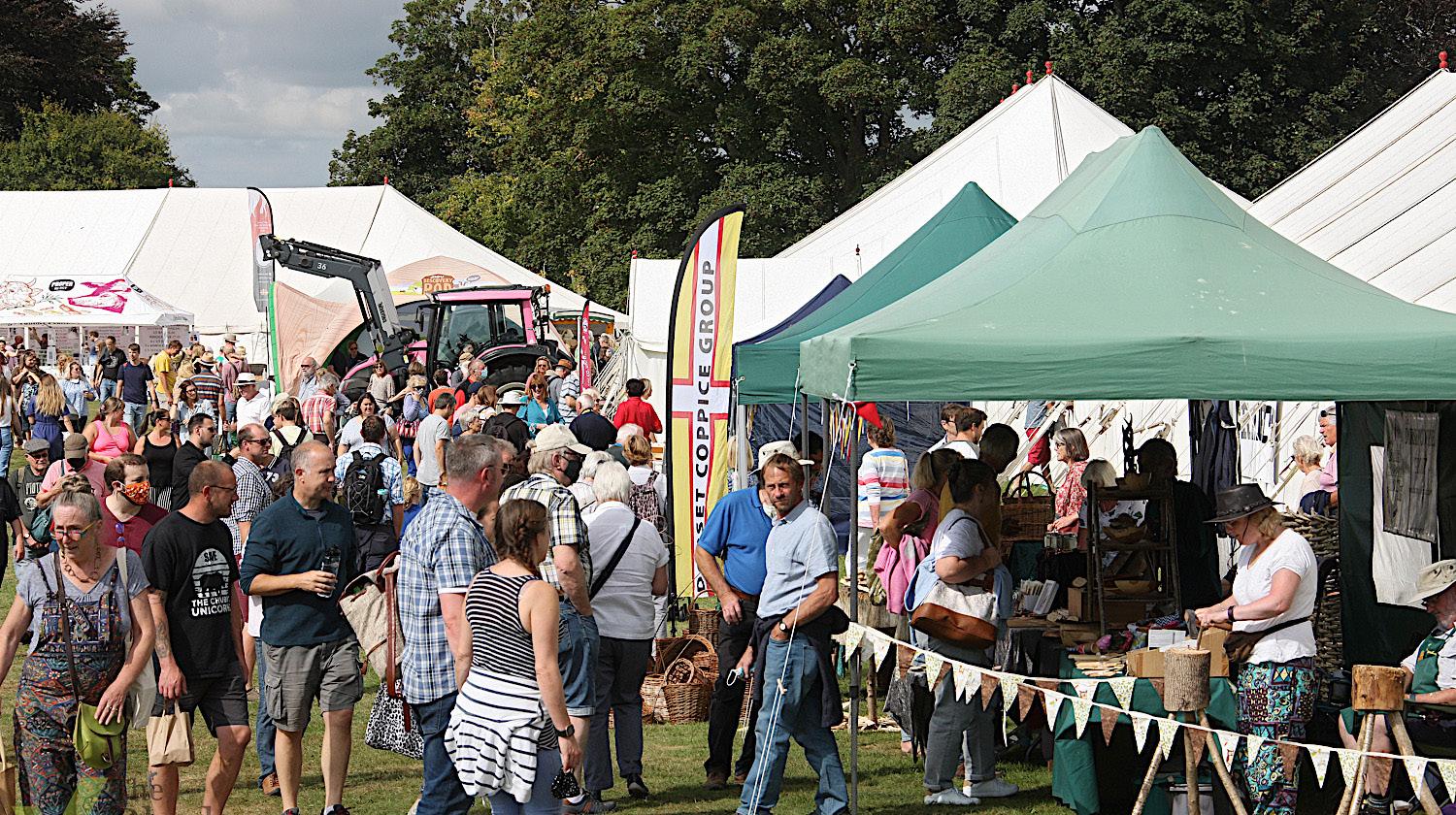
Add to the mix some children’s entertainment (including free Punch & Judy shows and






entertainment from Strawberry Jam), live music, the Real Ale and Cider Tent and an array of outside caterers to choose from – of course, including cheese toasties! There is something for everyone ...
And you never know who you might see – the founder of the world’s largest greenfield festival has been spotted at the Cheese Festival in the past.
If you fancy a short stroll, then perhaps take a break to wander down to the town’s historic 16th century mill, which is still operational – milling began on the Stour at Stur in 1016. It made international news during the first pandemic lockdown, when its wheels ground into action for a short time to produce flour commercially, rather than just for its visitors.
Once you’ve had a quiet look around the mill, head back to the Festival for some liquid
refreshment – or maybe an ice cream – before one last round-up of the food marquee.
Find out more at www.cheesefestival.co.uk and buy your tickets online. Earlybird tickets purchased
before 10th September are £7 (£8 on the gate).
Children under 15 go free. (Free parking is available in the field adjacent to the site).
You can also keep up with all the Cheese Festival news on Facebook and Instagram.
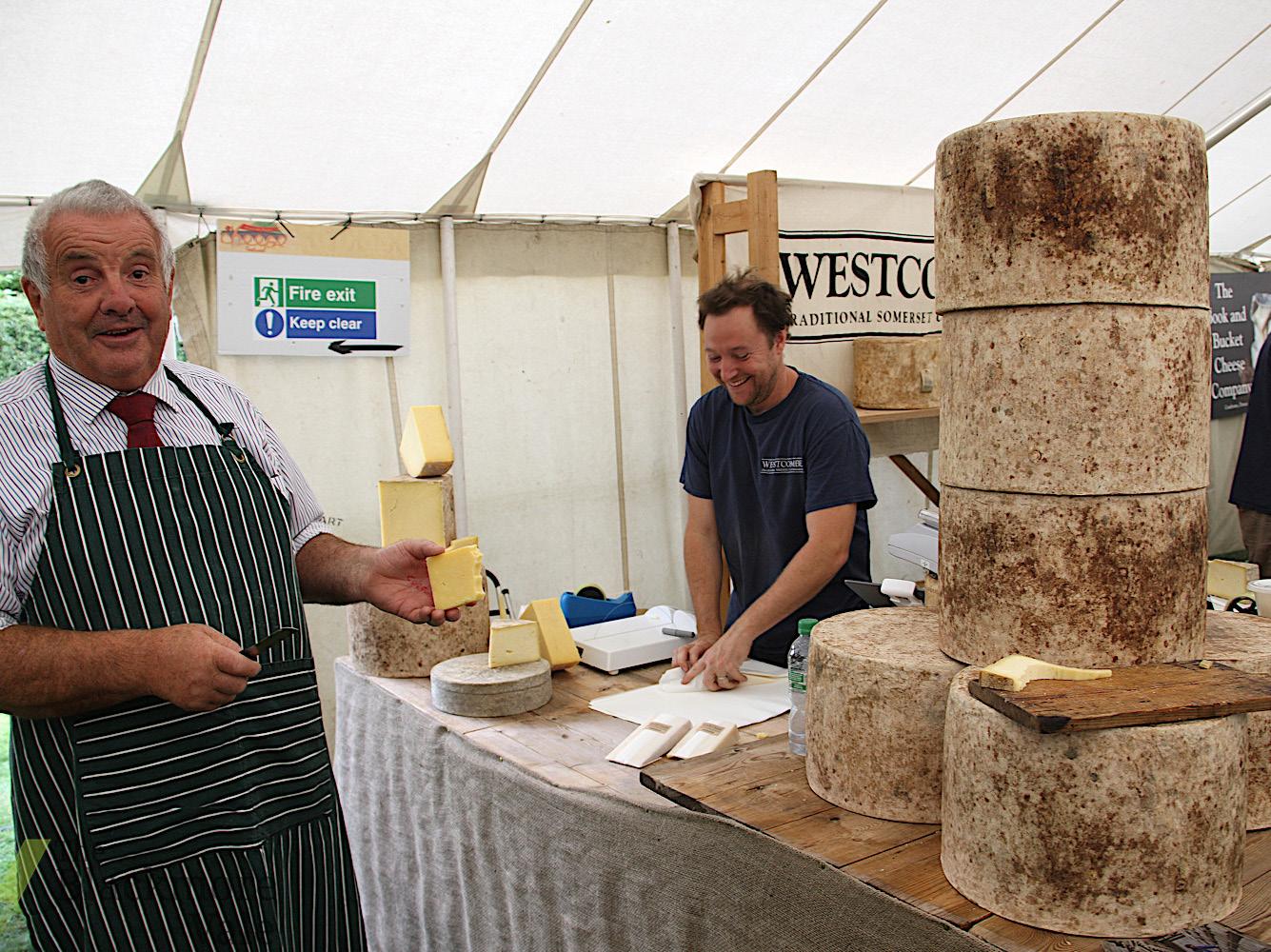
Did you know that you can sponsor one of our centres or some of the lovely animals in our care? Setting up a sponsorship is a great way to support our rescue animals and make a difference to those in need.
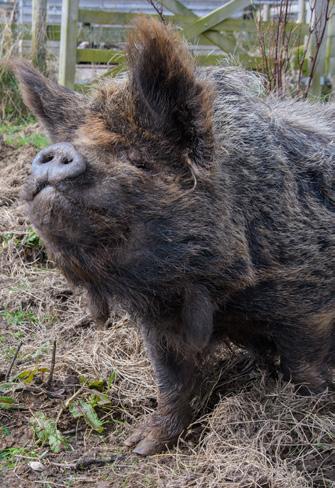
In return for your monthly £5 donation, you will receive twice yearly updates from your chosen centre or animal. They would love to share their adventures with you!
Not only is this the perfect treat for yourself, but you could also gift a sponsorship package to a loved one for a birthday or special occasion.
Please
form:

18-year-old Zander Miller from Verwood staged his first all day Classic & Supercar Sunday event at Clayesmore School in August, and estimates that the classic and supercars on display had a combined value of more than £40 million pounds.

‘It is tricky to estimate’ said Zander. ‘The Ferrari F40 that came is worth over £1m, due to its rarity, age and condition. Many of the supercars are worth between £250,000-£500,000. And then the classic cars ranged from 1920 to 1997; we had an Aston Martin DB2 and an Aston Martin DB11. They’re 70 years apart! I’d imagine we had a value of around £40 (ish) million.’
Born on Instagram Regular readers will remember The BV feature on Zander in the June issue (read it here) – the teenager’s hobby of photographing supercars and posting them on Instagram led to Zander organising his first
supercar owners meet-up, and the formation of the South Coast Supercar Club. In his final year of sixth form at Clayesmore, the budding entrepreneur was noticed by the school team who were keen to encourage him –they subsequently invited Zander to put on a full day event at the school over the summer.
Zander grabbed the opportunity and, despite being in the middle of his A Levels year, threw himself into organising the oneday event.
I spoke with Zander afterwards to find out how his first big show had worked out. Firstly, I wondered just how many cars had shown up on the day?
‘The Clayesmore Classic & Supercar Sunday had 160 classic and supercars on display to the public. We had expected 150!’ Can you tell us about some of the cars that were there?

‘The Hendy Group, our headline sponsors, brought a lovely example of an RS Cosworth. We also had a Ferrari F40 on display from one of our most exclusive members, offering the rare opportunity to view such an iconic car – we were really happy that the owner even allowed the public to sit inside!
‘One of our other sponsors, First Choice Detailing, had arranged cars on their stand in three colours to represent the Italian flag, covering the most
Zander Miller’s first all-day event was a resounding success, with 160 classic and supercars on display. Laura Hitchcock reports
track-focused and exclusive cars manufacturers can offer. There was a member’s Alfa Romeo GTAM (one of only 500 examples in the world), and a Ferrari SF90 Stradale, Ferrari’s latest and greatest hybrid technology which reaches more than 200mph!

‘We were very fortunate that Meridian Modena (our local Ferrari dealership) was able to bring its brand new Ferrari 296 GTB demonstrator car. We were delighted to have had this on display next to the F40, as not many customers have taken delivery of this elegant machine.’

Putting on your first major event of this kind is a huge amount of work. Was it a steep learning curve?
‘If you’d asked me eight months ago if I would be working with Clayesmore and arranging a proper car event, I never would have believed you! Every single step has been a huge learning curve and has taught me so much about arranging a professional event for which customers are willing to buy tickets … and then be satisfied on the day.
‘I know now what works and what doesn’t for future events.
‘I had a lot of positive feedback both during and after the event which is so nice to hear after all the hours of hard work and planning! All the praise really does make it worthwhile, and keeps me motivated.
Of course, I had a few comments
and tips on what I can still improve. Hendy’s told me: “if you come out of the blocks and everything’s perfect, you’re either naive or lucky”. There are some positive lessons learned that will make sure my business continues to grow and be successful.’
Will there be a 2023 Classic & Supercar Sunday event?
‘Ha, I’m not sure yet! But there will definitely be something. I look forward to what is in store for the club, and I’m excited to see where these next events take me. I think a big charitable event is what I’d like to do next.’
On the day we spoke, Zander had just learned his A Level results: ‘Somehow I’ve managed to arrange Clayesmore Classic and Supercar Sunday while juggling all of my subjects at Clayesmore. I’m glad I can say that my place at Bournemouth University
was approved, and I achieved a Distinction* in my Enterprise and Entrepreneurship BTec, A* in Photography, A* in Design and Technology and B in Business Studies.
‘The last few months have been busy and tough. But I have come out the other side with amazing grades and a growing and profitable business in an industry in which I look forward to working after my degree.
‘I’d also like to mention how grateful I am to Clayesmore for giving me the opportunity to work alongside them, starting an event which has the opportunity to become even more successful in the future. And a further thanks goes personally to Rhiannon Harris from Clayesmore School, with whom I worked closely on the event. It simply would not have been as successful without her.’
You can follow Zander on Instagram on @ SCsupercarClub, or get in touch with him here.
Thanks to Ben Hazell for allowing the use of his photography. See a full gallery of images from the Classic & Supercar Sunday event at Clayesmore School on the BH1 Photography website here.
It was a relief for everyone –organisers, volunteers, traders and visitors – to see such an enormous crowd back at the Turnpike Showground for the first proper one-day Gillingham & Shaftesbury agricultural show since 2019. The 2021 show had been planned through COVID lockdowns, and restrictions were only lifted the week before the show itself. It was, by necessity, a very different show from normal, held over two days. This year’s heatwave was a serious problem, causing lastminute changes as the hard ground threatened the safety of polo ponies and showjumpers. And then, in a swift change of fortunes, the rain became the problem instead, as the day before the show was washed out with torrential downpours and thunderstorms. But on the day, the weather gods were kind: the

forecast thunderstorms never materialised, and in the end there couldn’t have been a more perfect setting. Right from the start, there was a vibrant buzz on the showground. Wherever you looked, there was something to see or an old friend to greet. While the livestock and pristine rows of tractors and farm machinery signal it is very much still an agricultural show,
there’s something about the Gillingham & Shaftesbury Show that is a lot more. It’s the sense of community and passion for the countryside that make it an unmissable event in North Dorset’s August calendar.
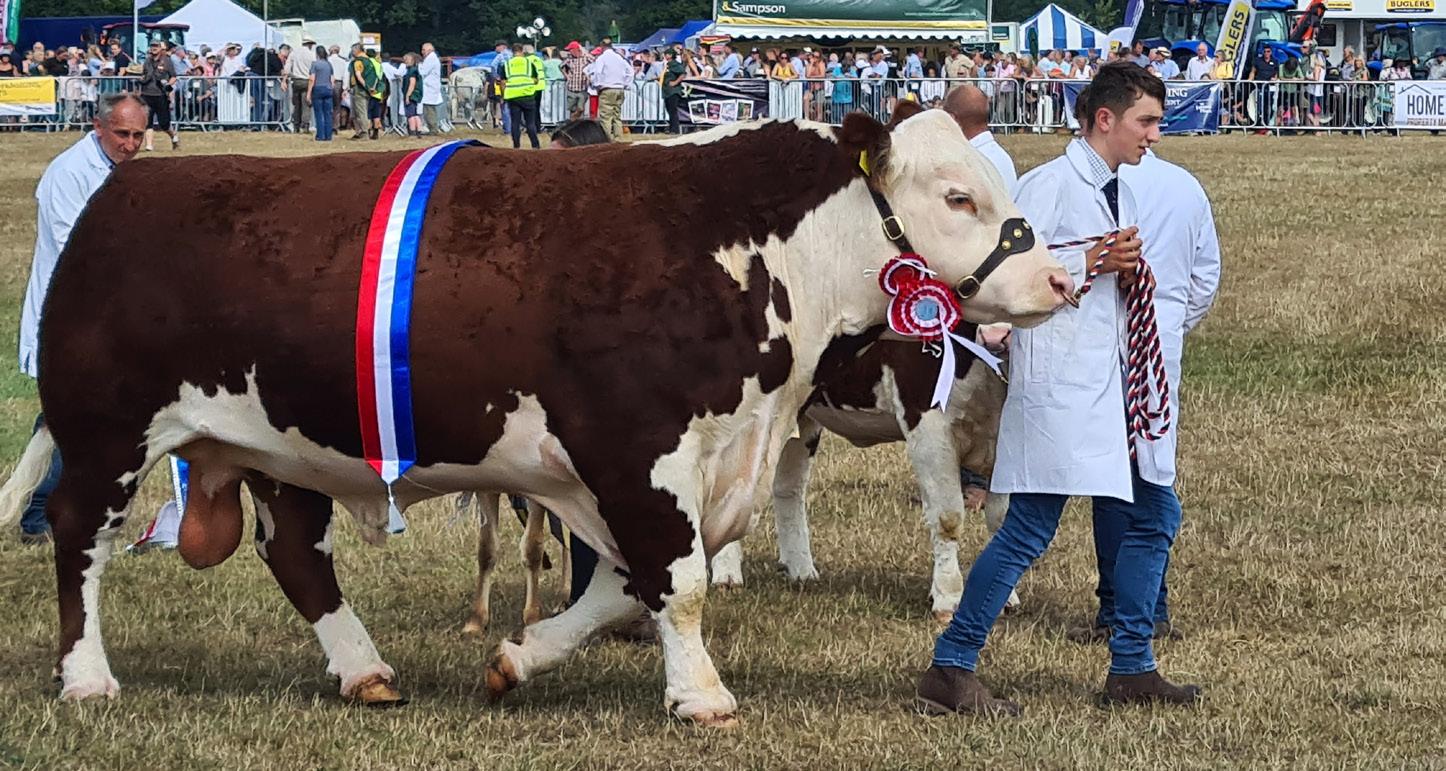
The G&S Show spans the generations, from a weatherbeaten man giving a terse nod to a neighbour to an excited child leading a calf into the main ring for the first time. Small children in long white coats carefully led sheep around a ring, appearing overawed by the crowds and the rosettes. Others trotted ponies through their paces in the rings or helped parents feed animals. Children (and adults) sat captivated by Signature, the Dorset and Wiltshire signing choir, who kicked off events in the music area with modern songs ‘sung’ in sign language.
Over in the marquees, perfectlyshaped vegetables competed alongside glorious dahlias in a riot of colours as inspirational flower arrangements filled the horticultural tent.
The first full one-day show for the new G&S team was deemed a roaring success, report Laura Hitchcock and Rachael RoweImage: Courtenay Hitchcock Image: Derrick Pannell
Fresh eggs sat on plates, this year unaccompanied by their feathered producers, thanks to Avian Flu. The new Wool Village was busy with sheep being shorn by experts and the public learning about the value of British wool.
There was laughter and curiosity at the ferret racing, where spectators were constantly warned about the perils of picking up an animal. The furry creatures raced down drainpipes – it’s tails out first, not the nose, that wins.
The speed at which the Shetland Pony Performance Display team hurtled around the main ring was quite a spectacle but highly entertaining. The Terrier Racing was unmissable, with some spectators not there for the dogs so much as for Harold Galpin’s commentary.


There seemed to be someone working continuously on the steam engines, polishing and making sure the paintwork was gleaming. But what joy when they all rumbled into the main ring for a circuit or two.
The relaxed atmosphere of the day was juxtaposed at times
Bowler hats in the judging ring, elegantly dressed ladies driving carriages, and pristine whitecoated families leading cattle in the main ring. Some things at the G&S Show have remained the same for years. The big news this year was that the Grand Parade made an important and oh-so-welcome reappearance, after a 15 year absence. It was eyes to the sky when the Lightning Bolts Army Parachute Display team landed in the middle of the show – the Dorset crowd feeling special pride as they learned the jump master is from Gillingham.
It’s at places like the G&S Show
food is produced within the Blackmore Vale. The Gritchie Brewing Company Bar was popular, and there was a lot of interest in tasting the gin distillers’ botanicals. There were long queues at the hog roasts and ice cream stalls, selections from so many choices at the fudge stand, and the delicious aroma of curry. You could make a picnic from tasty salami, a mountain of regional cheeses, plus local bread and cakes.
The great thing about the G&S Show is that you never know who you might meet as you make your way round. You may bump into old friends and colleagues while for generations of farming families it’s a chance to get together.
For the first timer, there’s that affirmation that you’ll be marking the third Wednesday in August in the diary for next year’s show.
And the year after ...
The BV produced the first ever official online G&S Show magazine this year –crammed full of fascinating insider peeks into what goes on behind the show, and extraordinarily serious *cough* in-depth interviews with some of the organisers. If you’ve not read it yet, you can do so here!
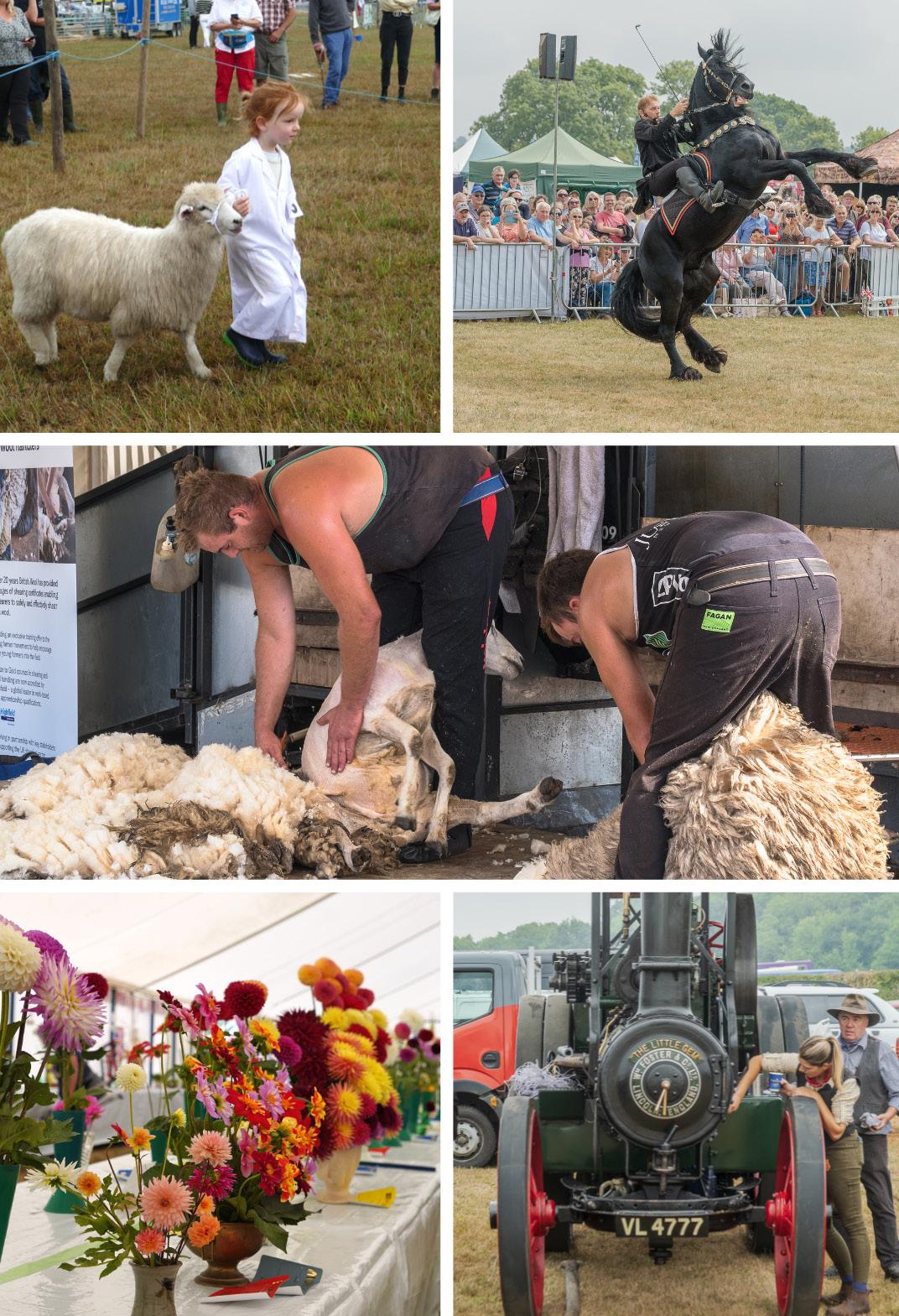
Les Bennett of Slades Hill, Templecome, scored a big success for local cattle farmers, taking the Supreme Dairy Championship with the any other dairy breed champion, Lilylane Magic Hawaii. Les also took the reserve championship with his Holstein championship and Holbuts Cup winner, Ciderhouse Springtime Rochele.
Other local champions and cup winners included the Young Entry Dairy champion and Sandroyd Cup winner, Moonlight Stormy Victorious Nouvelle exhibited by Chloe Peach from Donhead St Andrew, the Young Entry Beef championship and Wilson Shield winner Harry Mitchell from Dorchester, who also took the Gillingham & Shaftesbury Cup. The Mitchell family took the Hereford championship and Lamb Cup with Vexour 1 Phantom.
The Aberdeen Angus championship and Barclays Bank trophy went to Angus Neish of Maiden Bradley. The Longhorn championship went to Matt Horne from Overton near Basingstoke, but the Other Indigenous, Rare and Minority Breeds champion was a local winner, Long Ash Eunite exhibited by Sid Hollier from Dorchester. The Dexter championship went to Cannington Mason exhibited by J and M Bennett of Dulcote.
Young entry, dairy, and Tucker Cup –Amos Craze Mell exhibited by Abigail Rudd. Moonlight Stormy Victorious Nouvelle, and championship, Chloe Peach, Donhead St Andrew. Young entry, beef, and Sidney Perry Shield – Templeton Lele 2nd, Miles Blakeney, Mere; championship, Wilson Shield, and Gillingham & Shaftesbury Cup – Harry Mitchell, Dorchester. Holstein Championship and Holbuts Cup, and cow –Ciderhouse Springtime Rochele, Les Bennett, Templecombe.
Group – Brickyard Pumpkin, Charlotte Tuffin, Bagber.
Any other dairy breed Championship, and heifer – Lilylane Magic Hawaii, Les Bennett.
Cow – Je t’aime Double L Bijou, Richard Norman, Yeovil.
Pair and group – Les Bennett.
Aberdeen Angus Champion, heifer, pair – Angus Neish, Maiden Bradley.
Hereford Champion, heifer, bull and pair – Mitchell family, Dorchester.
British Blue
Cow – Dingvalley Nightingale, R.F & C.L Spiller, Yeovil;
Bull – Dingvalley Pluto, Spiller. Continental
Heifers – Brampton Ruby and Lewyd Silvia, Will Glover, Leigh;
Pair and Beef Cattle pairs championship –Brampton Rainbow and Ruby, Glover. Longhorn Cow – Warns Olive, Alice Glover; bull and pair – Warns Romeo, Alice Glover.
Other Indigenous, Rare & Minority Breeds Champion, cow – Long Ash Eunite, Sid Hollier, Dorchester;
Calf – Lodge Farm Queenie, Andrew Smith, Wincanton;
Heifer – Bayford Helen, Smith; Heifer – Long Ash Jelta, Hollier; Bull – Long Ash Gatsby, Hollier; Pair – Long Ash Hazelberry, Hollier. Dexter Champion, cow or heifer, bull – J & M Bennett, Dulcote;
Heifer – Downs view Lexi, Miles Blakeney, Mere; Pair – Blakeney.
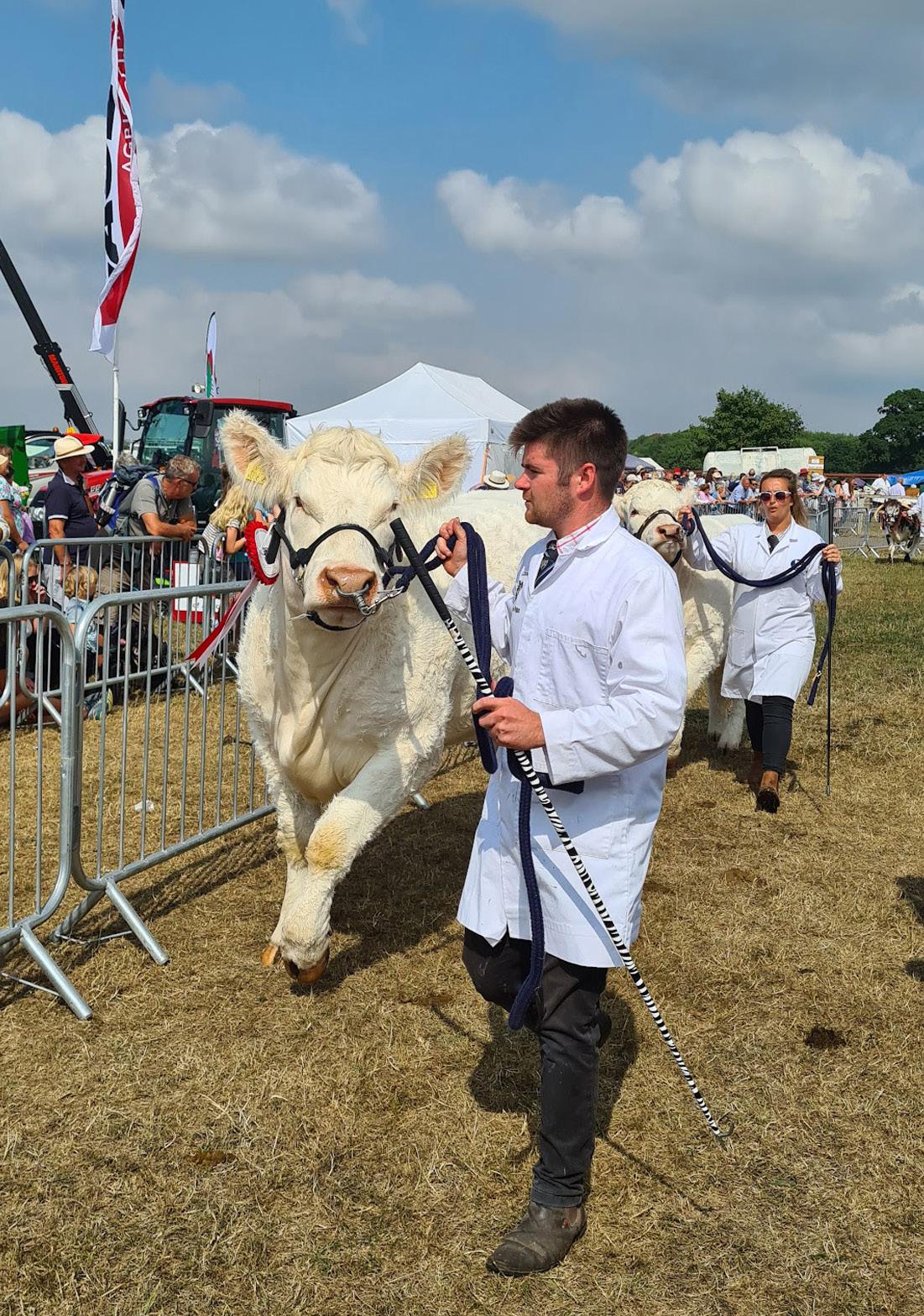
The big winnner in the sheep classes was Miss Ali Tory from Blandford St Mary who won the supreme sheep championship and the Arthur Cradock Cup. Ali also took the Hampshire Down championship and the Commercial and Shortwool championship. Other local successes included Trish Gray from Lower Chicksgrove who won the Fleece championship and the Wool Marketing Board Shield with her Shetland sheep and Tom Newth from Castle Cary who took the Commercial & Shortwool group of three championship and the Sheldon Jones Cup.
Young Handler Championship and John Menlove Shield, and 12 years and under winner – Charlie Coombes; 6 yrs and under – Harriet Griffin, Hazelbury Bryan; 8 yrs and under – Elise Rochford, Wincanton. Dorset Horn and Poll Dorset Ram, ram lamb, ewe lamb, and group of 3 –Alexandria James, Shaftesbury; Ewe – Emma Crosfield, Gillingham.
Hampshire Down Championship and Woolley & Wallis Cup, ram, ewe, ram lamb and ewe lamb – Ali Tory, Blandford St Mary.
Texel Championship and Selway Cup, shearling ewe, ewe lamb, ram lamb – Witham Vale Texels, Frome.
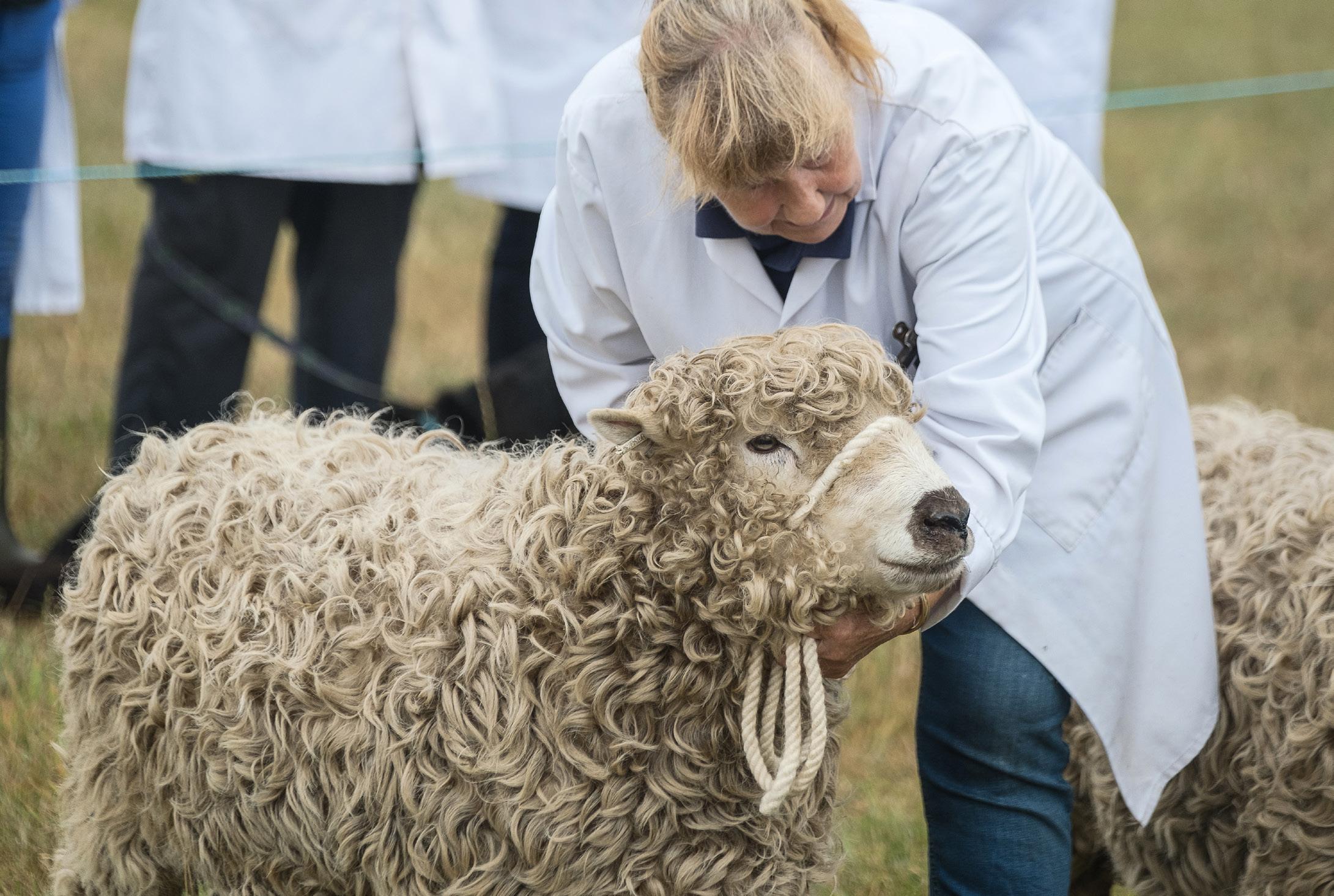
Continental sheep Championship and Mole Valley Farmers Cup, ewe, ewe lamb and group of three – Tom Newth, Castle Cary;
Ram – Alistair Lyle, Yeovil. Zwartble Championship and Kathy Watt Cup and ewe lamb –John Case, Lower Odcombe; Group of 3 – Heather Vincent, Gillingham. Jacob sheep Group of 3 Liz Butler, Yeovil. British Native Longwool Championship, ewe – Miss JA Gamblin, Somerton; Ram – Malcolm Hunt, Wincanton.
Black Welsh Mountain Championship and Glebe Heath Shield, ram, ewe, ram lamb and group of 3 – Mrs Rhian Rochford, Wincanton.
Dorset Down
Ram – Jenny Wyre, Salisbury. Shetland sheep Championship and John Maylam trophy, ram, group of 3 – Mr and Mrs David and Carolyn Gill, Chantmarle; Ewe, ewe lamb – Trish Gray, Lower Chicksgrove. Greyface Dartmoor championship and Valerie Pratt cup, shearling ram, shearling ewe, group of 3 and Hillside & Hearne Flock Shield – Christine Nugent, Mere; Ram lamb – Mr and Mrs JM & RB Gatrill, Wells; Ewe lamb – Mr and Mrs R & J Baker, Tisbury.
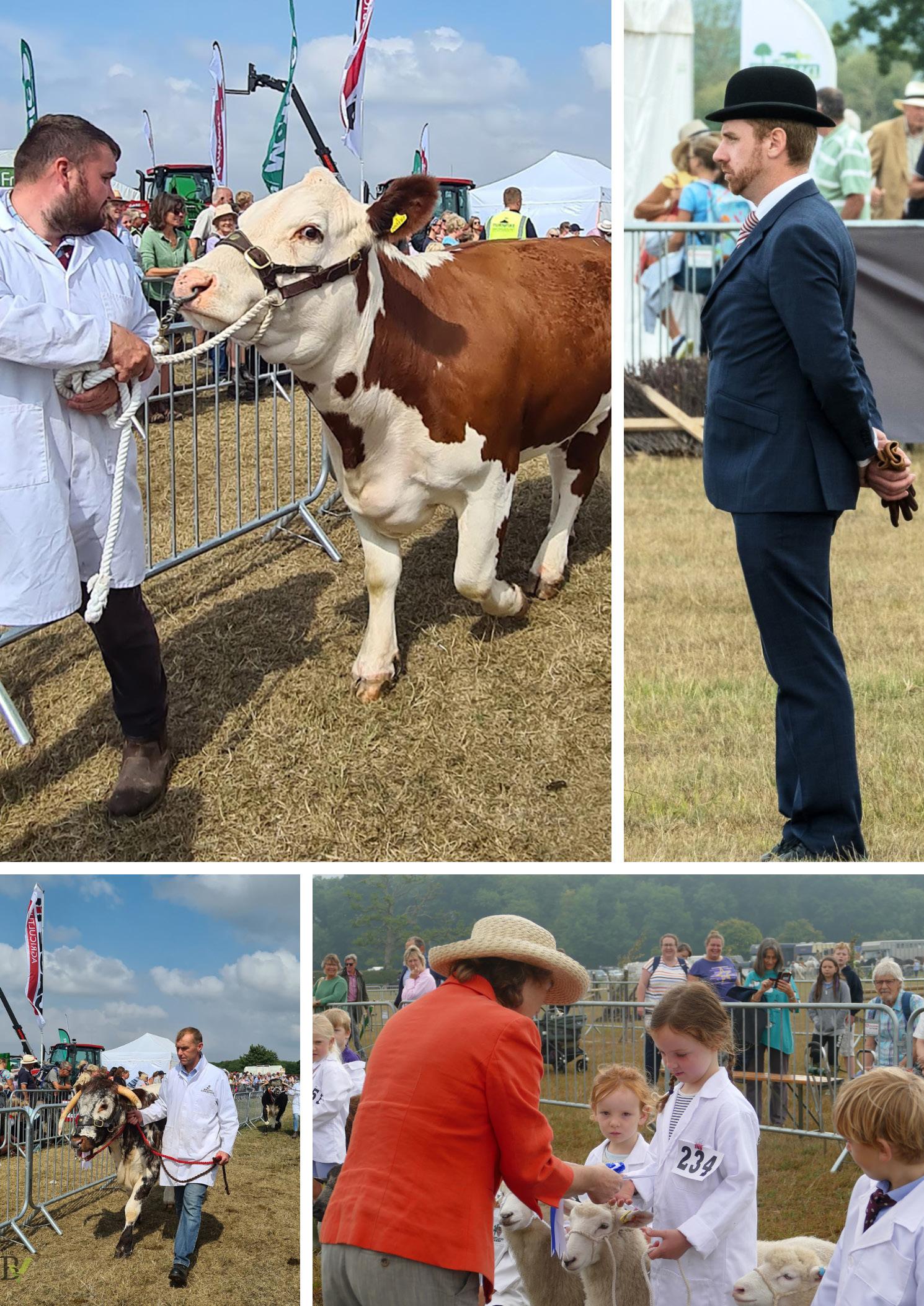
Ram – Keith Street, Salisbury; Ewe, group of 3 – Caroline Bulmer, Shepton Beauchamp. Hill, Heath and Mountain Breed
Championship, ram, ewe, ram lamb, group of 3 – Geoff Barnett, Bridport.
Ram – Calvin Bent, Shaftesbury; Ram lamb – Paul Dunnings, Fifehead St Quintin. Fleece classes
Shetland – Trish Gray; Down & Fine fleece – Jenny Wyre; Luster fleece – Darren and Sarah Rashley, East Coker. Pair of commercial sheep – Martin Jennings, Pitcombe.
Local Novice Ridden Hunter and Vaughan Cup – William and Clare Gundry, Sturminster Newton. Small hunter and Dorset Lettings Cup – Brickell Danielle and Emma Fitzgerald, East Chinnock.
Leading rein and open unaffiliated leading rein pony –Haffendens Winston and Imogen Groves, Bridport. First ridden – Finnlea Finders Keepers and Rosie Gundry, Sturminster Newton.
Small breeds – Sharptor Kingpin and Jess Talbot, Martock. Ridden veteran – Happy Times and Mrs Mouse Berry, Gillingham.
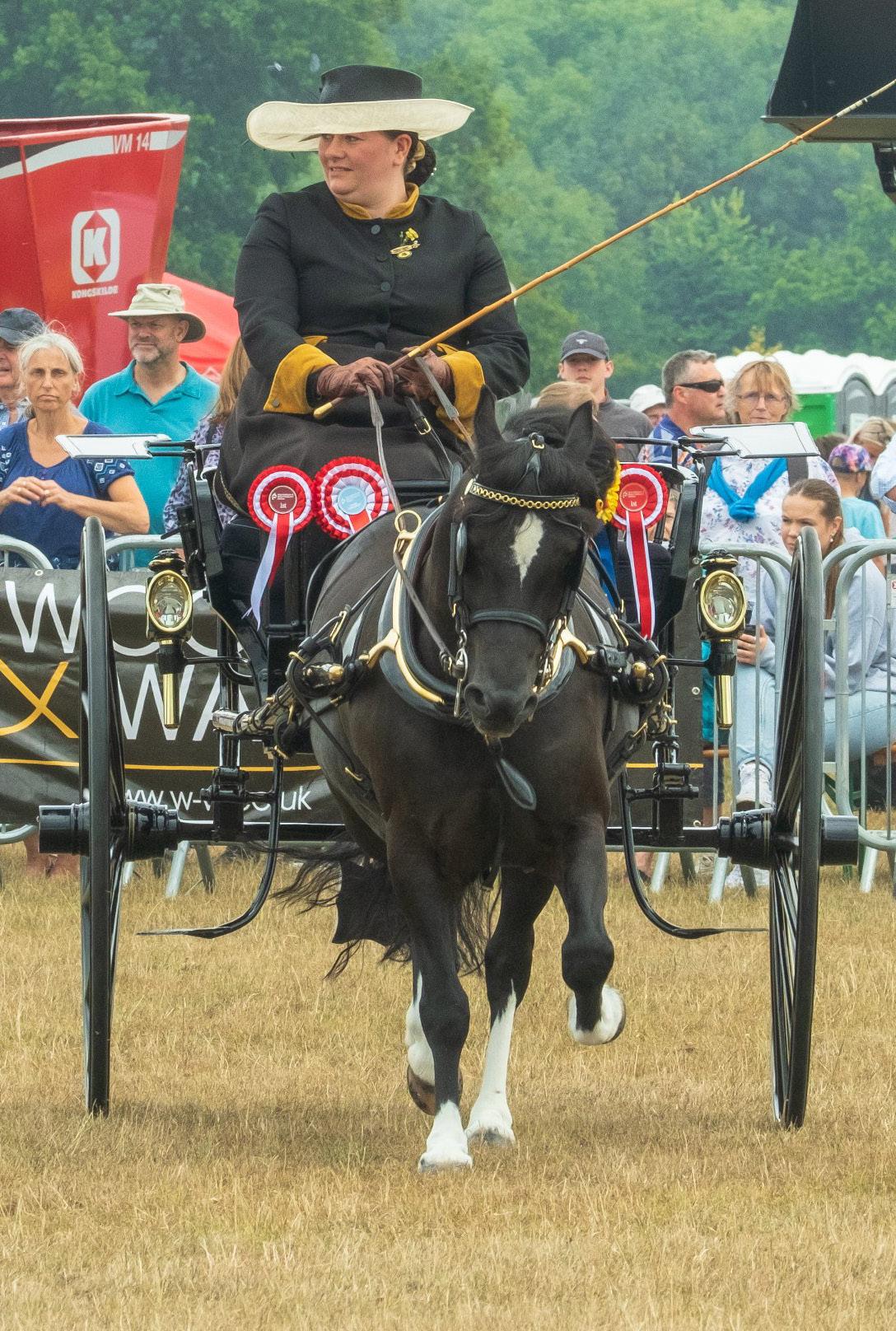
Open ridden cob – Poachers Moon and Josefine Board, Stoke sub Hamdon; Racehorse to riding horse –Josefine Board. Racehorse to riding horse, to include small jumps – Salcombe and Georgia Bennet, Frome.
Young horse breeding in hand, brood mare, and Dufosee Cup – Carry On Tiffin and Sally Fox, Bournemouth.
Young horse breeding in hand,
foal, and Wallis Cup, and Young Horse Breeding In Hand Championship – Sir Sidney Ruff Diamond and Sally Fox.
Young horse breeding in hand, young horse, yearling, 2 & 3 year old – Baloo and Mrs Lucy Felton, Droop.
In hand veteran – Pokeys Lane and Amy Edmeads, Todber. Large breeds, yearling –Popsters Power Ballad and Amy Baynton, Martock.
Small breeds, 4 yrs or over –Sharptor blackthorn and Mrs Megan Bullen, Shaftesbury.
In hand
Youngstock – Stockford Little
Superstar and Andrea Vickery, Dorchester.
Coloured – Auzzie Boy and Mrs Teresa Elson, Dorchester.
Race to riding horse – In The Tub and Tamsin Reynolds, Shaftesbury.
Heavy horses – Donhead Hall Hickory and RJ Hiscock, Donhead St Mary.
Agricultural heavy horse turnout – Holbeane Isaac & Res Gestice Valentina and Michael Yorke, West Hatch.
Trade heavy horse turnout – Donhead Hall Liberty Bell & Donhead Hall Shenandoah and RJ Hiscock.


Minette Walters’ first full-length crime novel, The Ice House, was published in 1992. It took two and a half years to write and was rejected by numerous publishing houses before Macmillan bought it for £1,250. Within four months, it had won the Crime Writers’ Association John Creasey award for best first novel and had been snapped up by 11 foreign publishers. Minette was the first crime/ thriller writer to win three major prizes with her first three books. Her second novel, The Sculptress (inspired in part by an encounter Walters had as a volunteer prison visitor), won the Mystery Writers of America Edgar Award. Her third novel, The Scold’s Bridle, then won the CWA Gold Dagger, giving her a unique treble. Minette is now published in almost 40 countries and has sold more than 25 million copies of her books worldwide.

When Minette discovered the bubonic plague entered England only a few miles from her 18thcentury Dorset manor, she was intrigued, and her curiosity led her to write her first book in a decade. Breaking away from crime writing, The Last Hours was her first historical novel. Set in 14th century Dorset at the time of the plague it
1. What’s your relationship with the Blackmore Vale (the loose North Dorset area, not us!)?
Well, I don’t have a strong link with North Dorset specifically … I went to school in Salisbury, and grew up visiting my friends’
took several years to research and write and is as exciting and readable as any of her psychological crime thrillers. Her recent third historical novel, The Swift and the Harrier, is set in 17th century Dorset, and
homes across Dorset. I loved it. We were living in Hampshire when our youngest was at school in Sherborne so we were always driving across and got to know the area very well (and we know Dorset’s Lord Lieutenant Angus Campbell and his wife Caroline,
explores the local impact of the English Civil War, with the extra enjoyment of a myriad of familiar places and names for Dorset residents to recognise. In 2019 Minette was appointed a Deputy Lieutenant of Dorset.
so we often pop over to Iwerne Minster.
But we ended up in West Dorset. Almost by accident – 23 years ago my mother and my husband Alec’s parents were all getting rather elderly, and lived far from each other (and
from us). Looking after them was increasingly difficult, so eventually we invited them both to move with us – and we started the hunt for a good property with extra cottages. We wanted them to remain independent, but to be just a short walk away. We couldn’t find anything in Hampshire, but then we happened across Whitcombe, here in West Dorset – it’s the most magical house, and we’ve been here ever since.
2. It’s Friday night - you have the house to yourself, and no work is allowed. What are you going to do?
Oh, I’m going to go to bed early to watch a Denzel (Washington) movie! Especially one directed by Tony Scott.
3. What was the last film you watched?
This might be controversial! I love movies, I watch an incredible number, and I do watch them over and over again, too. But I think it must be The Forever Purge. It’s the most recent in the Purge series. I have a serious passion for action movies, and this was fantastically violent. It’s just full of action, blood and gore. I loved it – a very happy two hours!
4. What is your comfort meal?
OK, it’s Moules Mariniere but it has to be to MY recipe. Soften the onions in butter, then add the garlic, parsley, white wine, mussels, obviously, but also giant prawns, lobster, cream and served with homemeade bread. My idea of heaven.
5. Who’s your celebrity crush?
Judge Judy! She is the funniest woman, I love her humour. And she’s educational too. I would love to have dinner with her.
6. Cats or dogs?
Dogs. I’ve always had dogs. I have two golden retrievers at the moment, but I’ve never been without dogs.
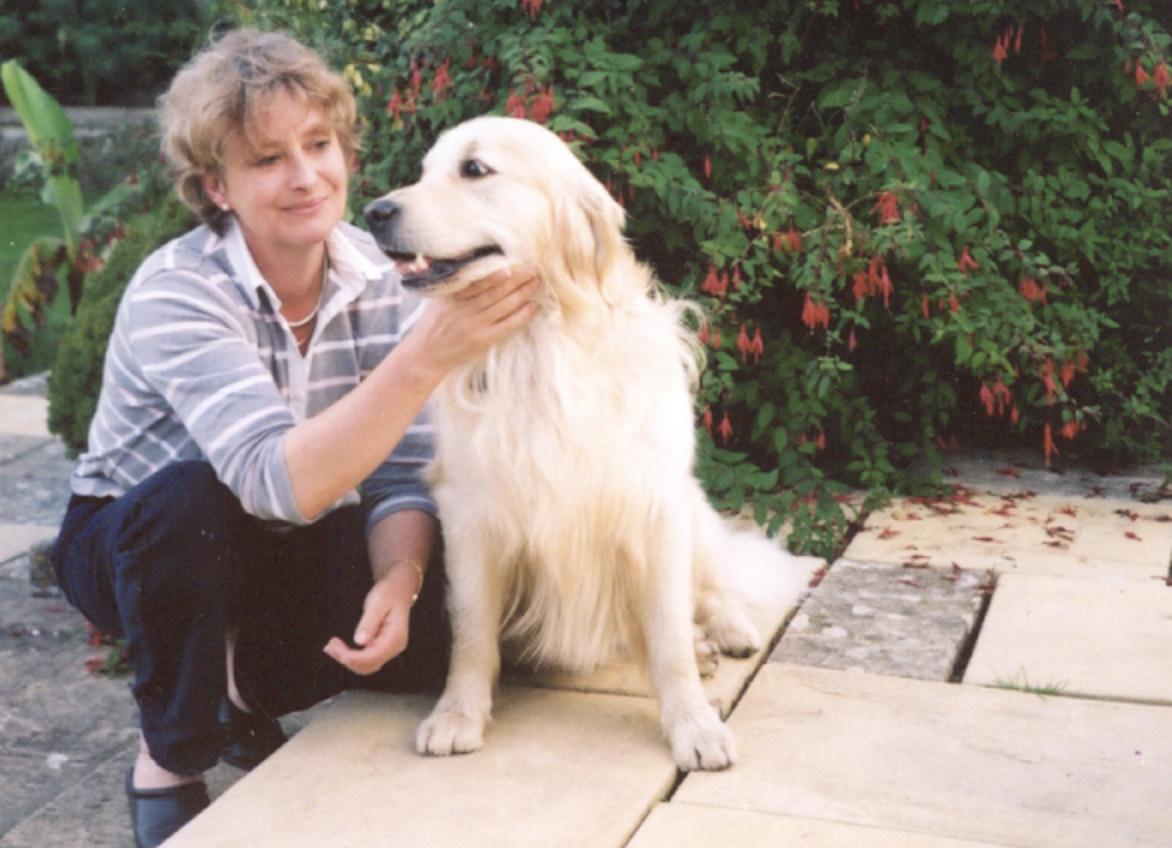
My second favourite animals are chickens. We have lots, and they’re just terrific to simply watch and spend time with.
7. What shop can you not pass without going in?
Very few … I hate shopping!
Although I do find it difficult to pass antique furniture shops. If there’s something in the window
I like the look of, I’m in.
I like Sherborne Antiques
Market, and there’s an antiques warehouse in Dorchester which I love! You never know what you’re going to find, I do poddle about in there rather a lot.
8. What would you like to tell 15-year-old you?
‘It doesn’t matter if you don’t have a boyfriend’
When I was a teenager I was surrounded by friends who I thought were prettier then me, and who had hordes of boys.
In desperation I asked my brother to send me a Valentines card so I could pretend I had a boyfriend, and agreed I would do the same for him.
I carefully signed his card with a question mark and sent it off, and the card I got back was signed ‘love, your brother’.
Not at ALL helpful!
You’re just a bag of hormones at that age, and worrying about your body image … and of course none of it matters. You’re so young at 15, it always works out OK in the end – I promise, I’ve been married 44 years now!
Knowing what others are thinking! Especially my family. I always know. It drives them mad. I do have imagination by the bucket, of course, which also helps. I actually can’t watch crime dramas with the family, I always spot the clues and solve the mystery far too soon, and then everyone tells me to be quiet as I exclaim ‘Oh, well, you know exactly what’s going to happen …’
10. What would you most like to be remembered for?
Simply my books, I think. I do genuinely hope they’ve given as much enjoyment to readers as I have had writing them.
I have a serious passion for action movies, and this was fantastically violent.Minette Walters with Benson (image from her personal photo album)
11. What was the last gift you either gave someone, or received?
The artist Richard Wilkin is a friend of ours. He paints architecture and building interiors, and I asked him to paint the interior of Whitcombe Church. It’s still consecrated, but is owned by the Churches Conservation Trust. It’s a tiny church with the Victorian pews all stripped out so that it is a simple, open space exactly as it was designed. The painting is beautiful, it was a gift to my husband and it now hangs in our hallway.

12. The best crisps flavour? Pringles. Barbecue flavoured ones.
13. And the best biscuit for dunking?
None! I HATE tea and I HATE biscuits!
14. Your top three most-visited websites?
• Wikipedia
• Google Maps – I’m forever looking up Dorset (Minette has already used Googlemaps twice during our call - Ed)
• Amazon – and no, I’m not ashamed!
I buy so many books, and through Amazon I can access all the old interesting ones which are no longer in print. I’m always being asked for tips by aspiring historical authors, and my biggest one is to go and read lots of non-fiction from the period. Generally they’re no longer in print, but through Amazon you can access all the antiquarian bookshops across the country. I get the most exciting parcels arrive! All with old, well-thumbed
books, with notes scribbled in the margins – just picking them up and starting to read I’m already immersed in history. It’s wonderful, everyone should do it.
15. Chip Shop Chips or Home Baked Cake?
I don’t really like sweet things, so chip shop chips please. Maybe a little salt and vinegar, but really I prefer them dipped in mayonnaise. Delicious.
16. Tell us about one of the best evenings you’ve had?
As a surprise for our 10th wedding anniversary, Alec
booked us a weekend at Burgh Island. It’s an iconic landmark on its own tidal island off the Devon coast, entirely decorated in the Art Deco style. As well as the main house there is the Beach House – built in the ’30s as a writer’s retreat for Agatha Christie who wrote two novels while there, both set on the island (Evil Under the Sun and And Then There Were None).
The dinner the night we arrived was literally unforgettable. The first course was pan-friend goose liver and it was just … melt in the mouth.
I’ll never forget it; I can still almost taste and feel it in my mouth.
It was followed up with duck, I think, and then a delicious
“If you wait by the river long enough, the bodies of your enemies will float by.”Richard Wilkin’s painting of Whitcombe Church
orange, chocolate and cream dessert. I even remember we were drinking rioja … The whole meal was wonderful, and the evening was very special.
17. What in life is frankly a mystery to you?
Horses! They baffle me. We have a livery yard on our land, and there are always horses about. I do like them, but they are a mystery to me. I have never ridden one successfully, I always fall off. I’m happy to simply admire them from afar.
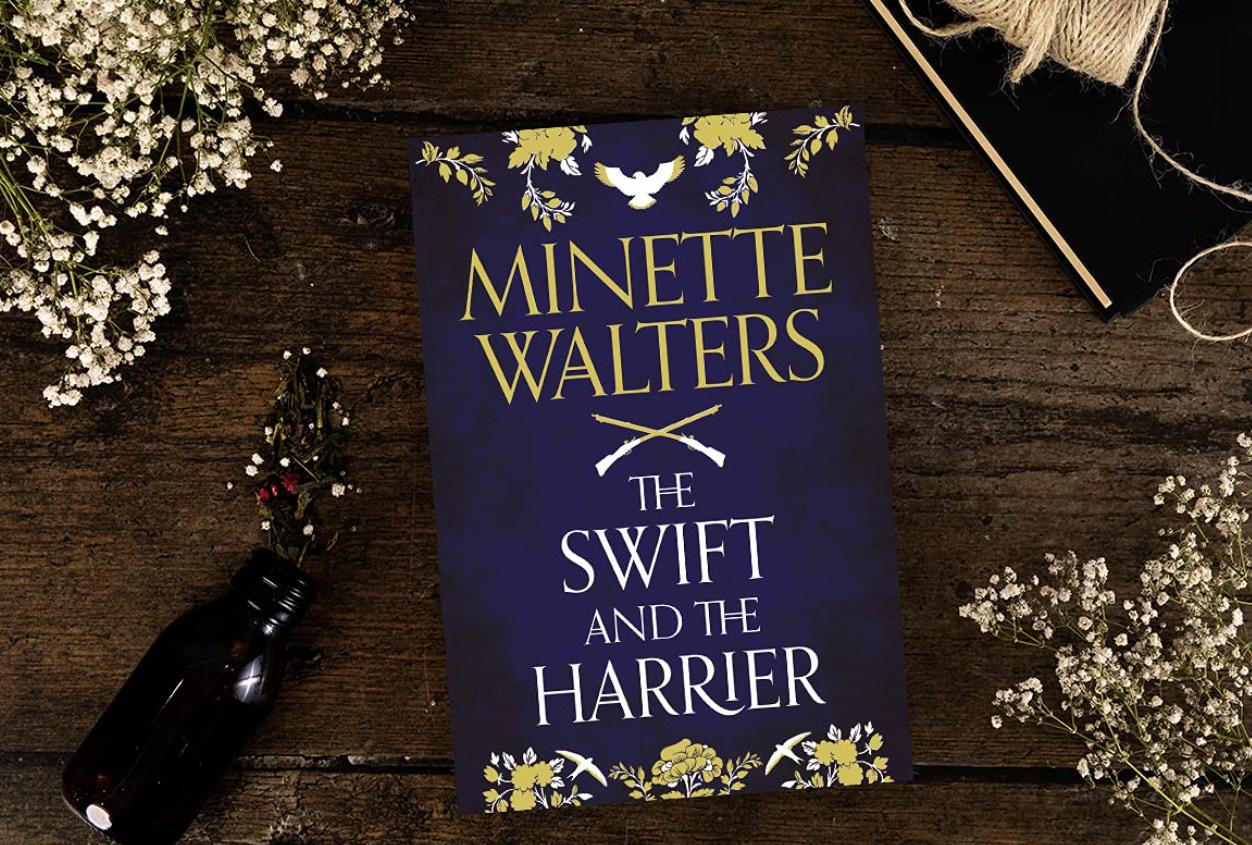
It’s a Chinese proverb:
“If you wait by the river long enough, the bodies of your enemies will float by.”
Isn’t it terrific?
It’s exactly the same thing as ‘revenge is a dish best served cold’, but it’s far more graphic. Who doesn’t want to see the bodies floating by?!
19. You have the power to pass one law tomorrow, uncontested. What will you do?
Oh so many things …
I think top of my list would be to make it a crime to be anonymous on the internet.
If you express an opinion then you should stand by it.
Honestly, the internet is probably
the greatest gift to mankind since the wheel. The overwhelming good, the sheer opportunities it brings ...
Yet people just use it to be hideously abusive, there is a vile element filled with criminals and paedophiles, and data hackers think it’s their playground … it makes me so angry.

Flower farmer Charlotte Tombs in her little flower garden. Featured flowers – tight pale pink balls are dahlia Megan Dean, and the flamboyant peachy pink ones are dahlia Labyrinth All images: Courtenay Hitchcock
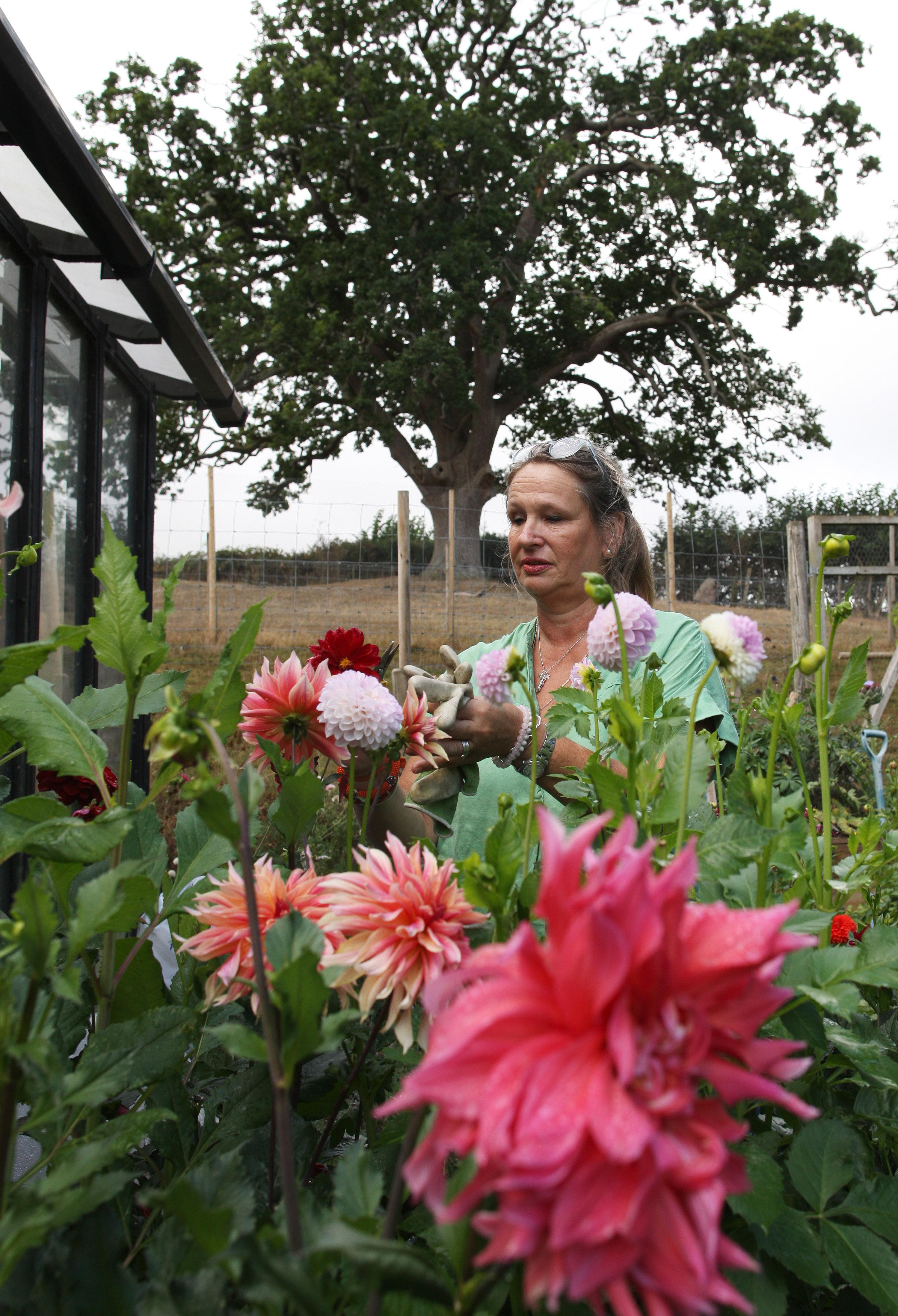
Tucked away near Sturminster Marshall is Northcombe Flowers, a professional flower farm squeezed into less than an eighth of an acre. Six years ago this land was bare, save for a few ancient apple trees.
For owner Charlotte Tombs, the initial outlay was a £2.50 packet of sweet pea seeds, some back-breaking digging and the foresight to transform her back garden into her business. Now it’s a flower-filled landscape for at least ten months of the year. Huge Café au Lait dahlias – a charming mix of subtle cream and dusky pink and a 2022 bridal favourite – jostle for space with cheerful sunflowers, alongside a kaleidoscope of colours from oldfashioned English roses. Achillea, snapdragons, feathery cut-andcome-again cosmos, scented geraniums, nicotiana, feverfew, sweet Williams, larkspur – every inch of space is jammed with flowers and herbs.
A fruit cage of raspberries droop under the weight of their burgeoning harvest. The fruit will end up in Charlotte’s kitchen, the leaves will make ideal foliage in her flower displays.
There are no militaristic lines of the same flower on Charlotte’s farm. The ethos is simply growing a variety of British flowers without the need for pesticides or air miles. Charlotte explains: ‘It’s possible to grow flowers in the UK all year round – even more so now frosts come later.
UK growers used to provide all the flowers for the British market. Narcissi would come from the Scilly Isles as early as December and flower trains would come from Cornwall to London, taking precedence
over passenger trains. It was only after the war, when the Dutch government threw lots of money at their flower industry, that the UK got left behind. Now we import flowers from huge industrialised farms that use all manner of chemicals.’
After a career in sales, Charlotte was inspired by a non-profit organisation, Flowers From The Farm, on Instagram. Set up by a farmer’s wife looking to diversify, the site encouraged like-minded people
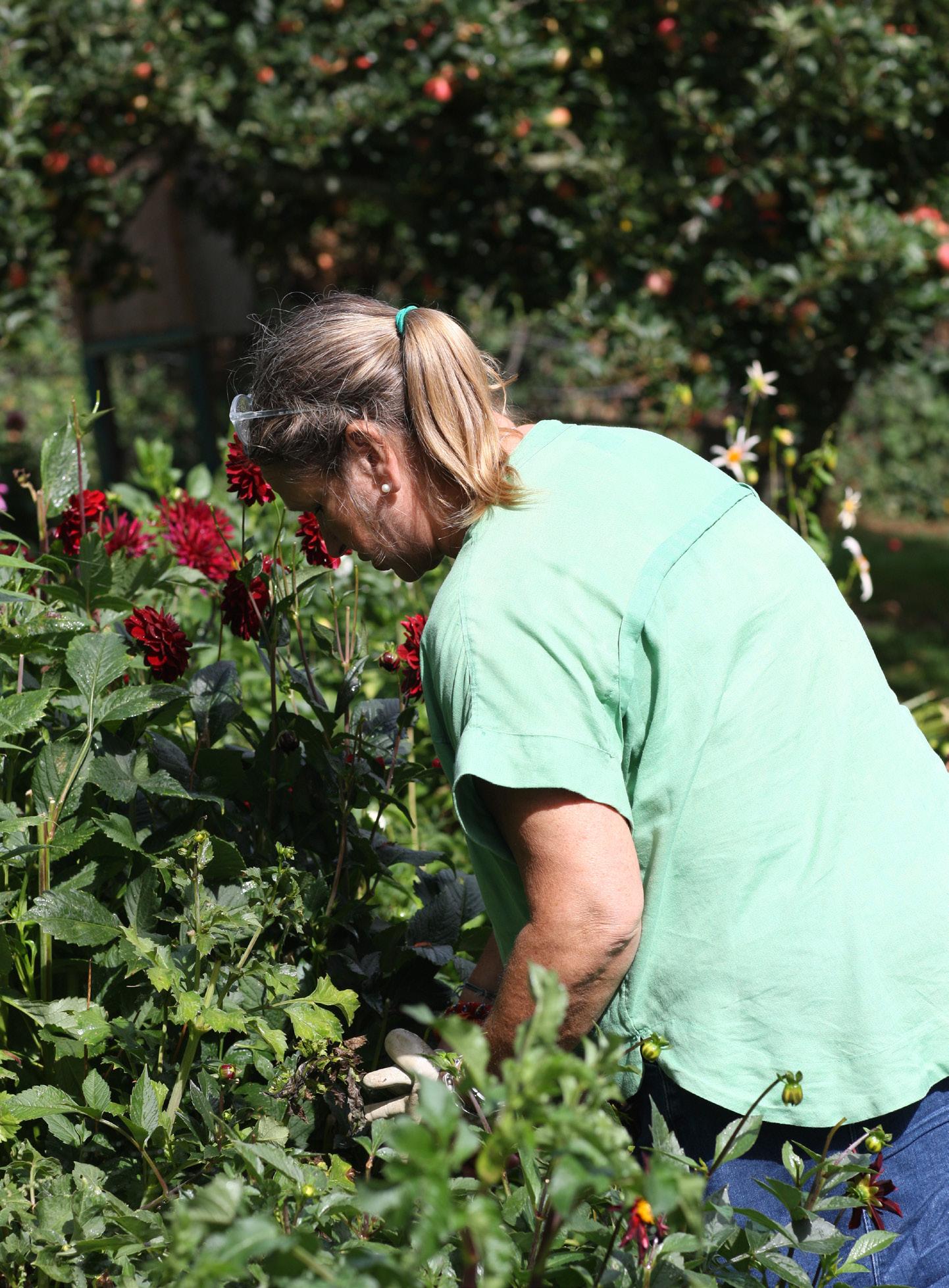
to grow British flowers.
Charlotte recalls: ‘I was inspired by Georgie Newbery’s book The Flower Farmer’s Year. I made notes and pored over seed catalogues. I just did the maths. You can sell a sweet pea stem for £1.25 if you’re growing out of season. A packet of sweet pea seeds costs £2.50. I literally started my business from that one packet and now have sweet peas in bloom as early as March.’ When the pandemic hit, Northcombe Flowers was only in its second season. Charlotte says: ‘I was busy. People wanted to send flowers to loved ones, and florists couldn’t get funeral

Charlotte Tombs’ successful flower farming business grew out of one packet of sweet pea seeds and some Instagram inspiration. Tracie Beardsley reports
COUNTRY LIVING
I literally started my business from that one packet.Charlotte’s guilty pleasure is ‘Aimlessly wandering around the garden with a G&T, picking flowers just for myself.’
Buying your first home is an exciting, albeit sometimes stressful, time. For many people it is the first time that they have had to use a Solicitor.

The obvious service that a Solicitor will provide to a house purchaser, is that of Conveyancing to complete the sale and ensure transfer of the property into your name. However, there are other ways that a Solicitor can assist you at this time to ensure that all your affairs are in good order. Senior Associate Private Client Solicitor Deborah Escott-Watson reports.

The purchase of your first home is a major financial commit ment. You may have used your hard-earned savings to fund the deposit. If you are buying jointly with a partner, and you have both put different deposit amounts down, how do you ensure that you “get out what you put in” if the house is sold because of a relationship breakup? Other questions that a Solicitor can help with is what happens to my share of the house is something happens to me?

The purchase of your first home is therefore a good time to consider putting a Will in place. If something happens to you, who do you want to leave your house to? If you own the house jointly with somebody else, and you pass away, who will benefit from your property?

It is important that you understand the difference between the different types of joint ownership and how that affects how you can benefit your loved ones with your share of the home. A Solicitor can help you decide if what type of joint ownership - joint tenants or tenants in common – is right for you.
A Solicitor can also help you with a Declaration of Trust if you are buying jointly with a partner. A Declaration of Trust is evidence of the agreement between the two of you as to what share of the house you own, what deposit each put down, what if any mortgage there is on the property and how the sale proceeds of the house are divided between you, taking into account any deposit and capital growth. It also can regulate the payment of monthly expenses in relation to the property, for example council tax insurance and utility bills.
Another important aspect to consider and record is how you would deal with ensuring fairness if one person spent a lot of money renovating the house which increased the value of the house? If a relationship breaks down, a one person does not wish to sell, what happens then? A Decla ration of Trust can provide an agreed mechanism to ensure that the house is sold, and the proceeds distributed fairly. There is a lot to consider as a First-time buyer. A Solicitor can help ensure that the Conveyancing is done properly, but also help you ensure that you understand all the rele vant ownership options available to you and that you have protected yourself and your family, especially as this is one of the largest financial commitments you will make.
For more information, please contact Deborah by email; Deborah.escott-watson@bat tens.co.uk or call 01935 811314.
flowers. At first, I felt guilty about jumping on the bandwagon when the world was gripped in such an awful situation. But it made me realise how much pleasure and solace flowers bring to people.’ She now harvests eight buckets of flowers every other day. Her natural approach is on trend, appealing to DIY brides wanting a wildflower wedding.
The buckets are excellent value: retail buckets are £75 for approximately 90 stems of mixed flowers and foliage, and wholesale a bucket sells at £55 for 75 stems.
Charlotte’s sales background shows in her confidence. ‘I can stand by my product. I’m more than happy to walk into a florists and ask them to trial my flowers’, she says.
As the cold weather sets in, Charlotte’s focus turns to dried flowers – a trend enjoying a huge revival – and she’s rounding off her flower year with Christmas wreath workshops.
On New Year’s Day, she sows her first sweet peas, starting the cycle all over again. ‘There’s so much pleasure all year and I never tire of seeing a seedling grow.’ www.northcombe.co.uk
Charlotte’s social media is a delicious flower feast: IG is @northcombeflowers and Facebook is @Northcombe
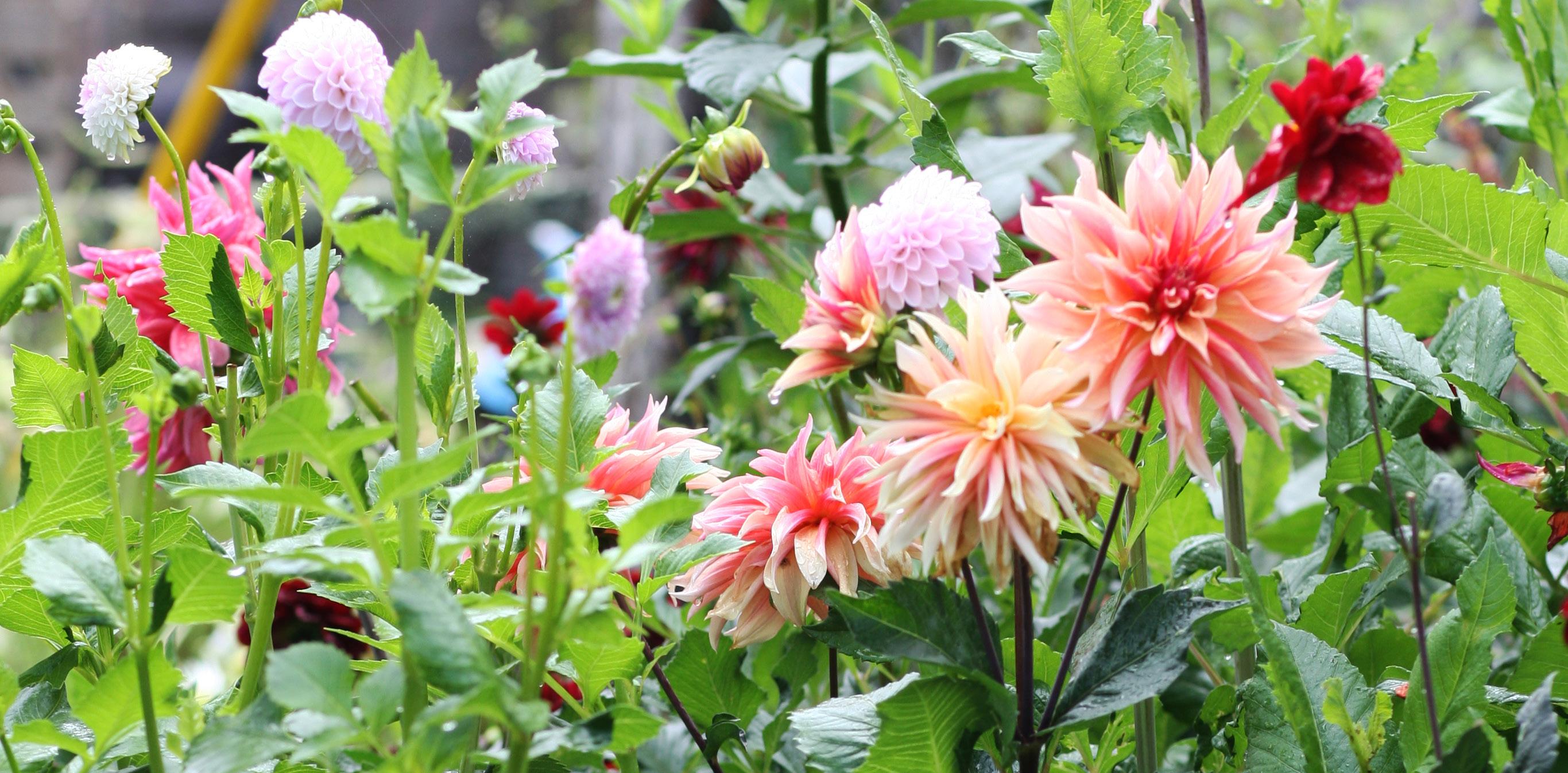
Six years ago, Charlotte’s land was bare save for a few ancient apple trees.
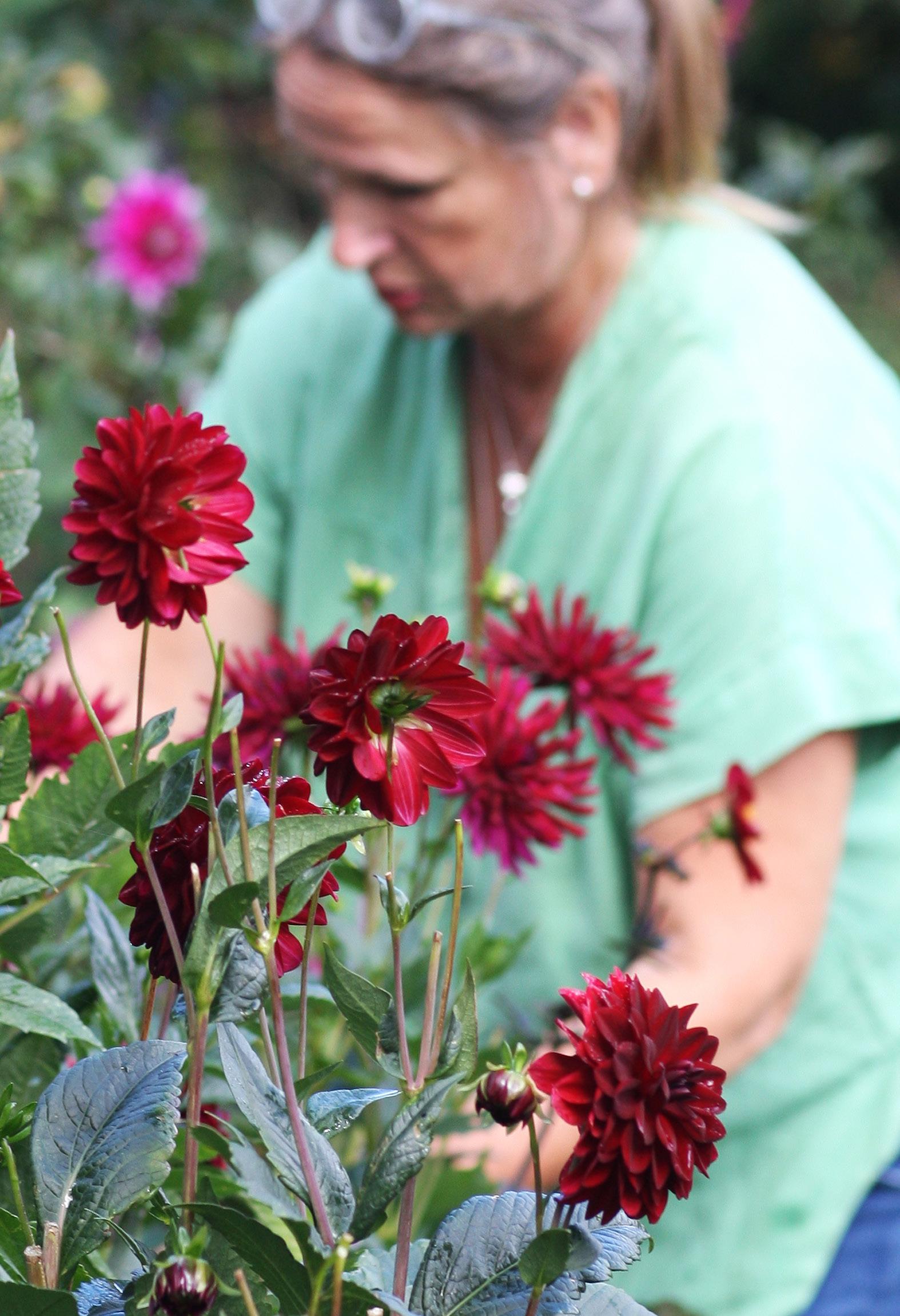
Charlotte’s Café au Lait dahlias are very popular with brides this year


Cosmos. I love the simplicity and feathery foliage. There’s nothing prettier than a jug of white Purity. Cosmos are also great for pollinators.
Aimlessly wandering around the garden with a G&T, picking flowers just for myself.
Plantswoman Ellen Willmott, an influential member of the RHS in the 1800’s. She used to carry eryngium seeds when she visited friends’ gardens, strewing the seeds surreptitiously as she walked among the beds, hence the plant being called ‘Miss Willmott’s Ghost’. What a great calling card!
Having worked for the NHS for more than 30 years, Bolton-born Patricia was appointed as CEO of Dorset Health. She was named as one of 25 rising stars of the NHS in 2013 and is one of only a few ethnic minority CEOs in the NHS provider sector. She was awarded on OBE in the Queen’s Honours list in 2019. Patricia’s mum was a midwife and her dad, and her dad came over with his mum and sisters from Barbados in 1963, the last of the Windrush generation.

‘After my A levels I went to the Caribbean for a couple of years to stay with my grandparents,’ says Patricia. ‘When I came home my mum was adamant I needed a job. She got me an admin role in the local hospital, and I just worked up from there.

‘I had a strong Christian upbringing – my dad and my grandmother were very religious, as is common for Caribbean families. Lots of my values were grounded in Christianity, and I think that probably influenced my career choice. I opted to go into public service because
I was brought up with a strong principle of giving back.
‘At 28 I was one of NHS’s youngest directors of Information, Management & Technology, but I knew I didn’t want to do that forever. So at 30 I took a career break to do
a business degree, and then I came back in to the service in Operational Management – being in a more patient-facing role is where my heart lay.
‘I have never taken a job because I have a huge career aspiration to be a chief executive – it’s just when the sphere of influence or control I’ve had has not been big enough for me to make a genuine difference to local communities, I’ve looked for the next job which will give me more scope in decision making.
‘I was previously a hospital chief executive, but I’ve taken this role in the Dorset health system because I really believe that the NHS has lost its way.
‘Using its power and influence and its ability to work with communities to drive down health inequalities is where its focus was when Bevan set it up, and we need to get back to that.
‘We need to get communities
to talk to us about what they really need, but also we need to develop the principle of citizenship, where communities make the decisions about how public funding is spent.
‘I’m responsible for working with other health and government organisations to make sure that we’re not just giving value for money but also driving down health inequality.
‘It’s so much broader than health services – it’s understanding what we can do to address some of the wider determinates that impact on an individual’s health.
‘Only 20 per cent of anyone’s health and wellbeing is dictated by anything that a health organisation can do.
‘The other 80 per cent is about the quality of housing you live in; the place where you live; whether it’s a healthy environment; what type of education is available; the type of employment you’ve got; and your social mobility. We need to understand the health input required but also appreciate the other 80 per cent.
‘We’re also working with the health providers to make sure they’re giving the best service they can, and if they’re not, then giving them the support to do that. It keeps me busy!’
‘We’re responsible for the entire geographical county, so

I’m caring for about 900,000 residents. We work closely with both BCP and Dorset councils, both of Dorset’s hospitals, Dorset healthcare, and with the voluntary sector. We’re currently looking at how we can bring the private sector into these conversations too. When we look at what it costs to live in Dorset, we know that we as employers are actually contributing to health inequalities. At the lowest levels, we aren’t paying high enough wages for it be affordable to live. Not in luxury – just a basic life. And we know that if you live in the most deprived areas in England such as in Weymouth and Portland who are high on the deprivation scale, while your deprivation is real, you are not as deprived as someone who lives within a pocket of deprivation in a fairly affluent community. Because the infrastructure is
simply not there to support you out of poverty.
It took Wigan ten years to successfully implement a citizenship model. But we haven’t got ten years with the cost of living. My job is to work out how we move some things forward at a much faster pace. Right now we have the opportunity to use this burning platform to do something different very quickly; we just need to work out what we do first.
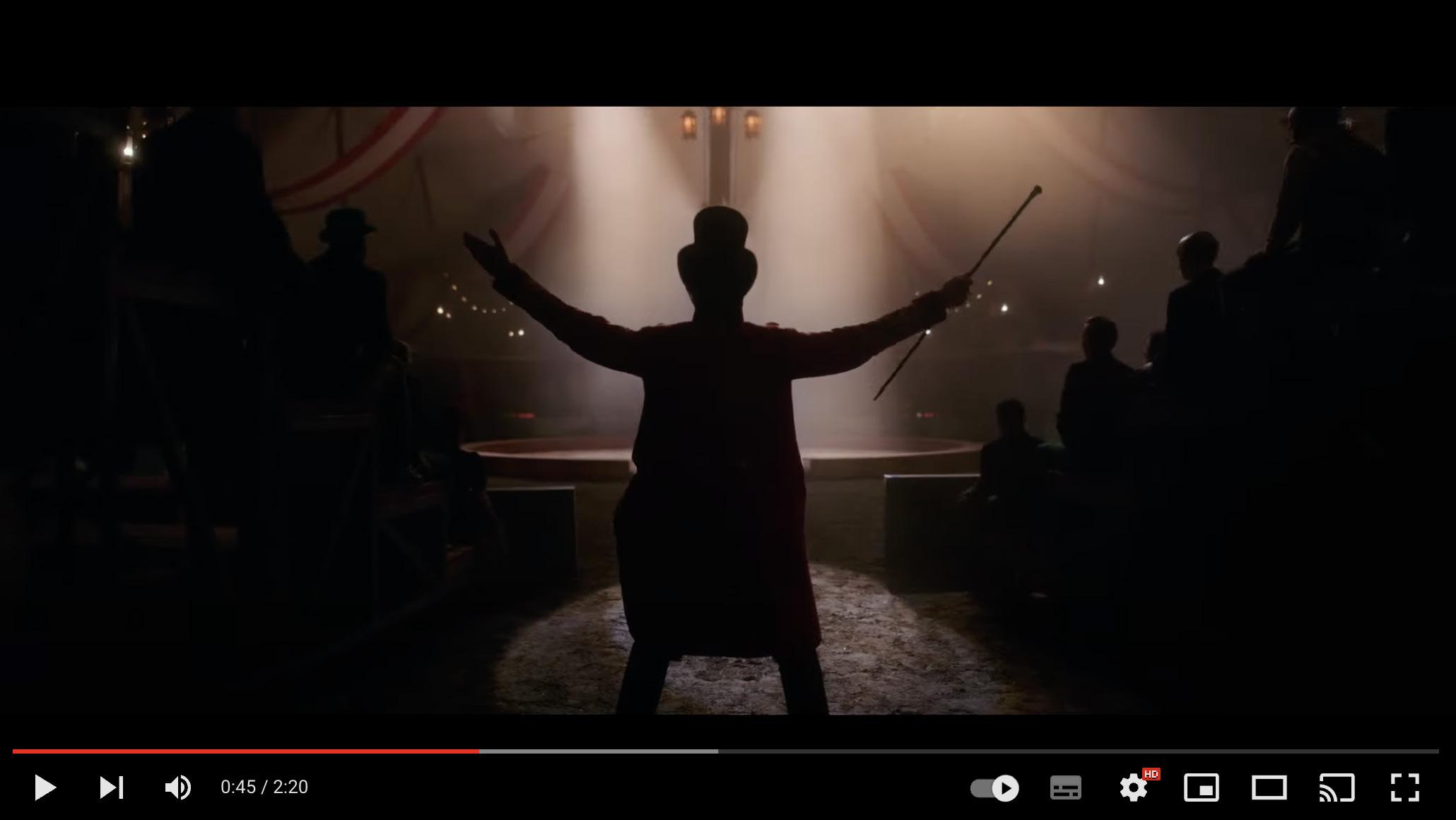
And so to Patricia’s eight music choices, along with how and why they stuck in her life:
This is my childhood! The Merry Men was a band that originated from Barbados, and theirs is some of the first music that my parents played at home when I was small child. Island in the Sun is actually written about Barbados being such a beautiful island.
We had a dichotomy in my grandmother’s house when I was small. My dad worked in textiles and mum was a midwife so they used to work shifts. Me and my brother used to go to my grandmother’s house every evening after school, and I used

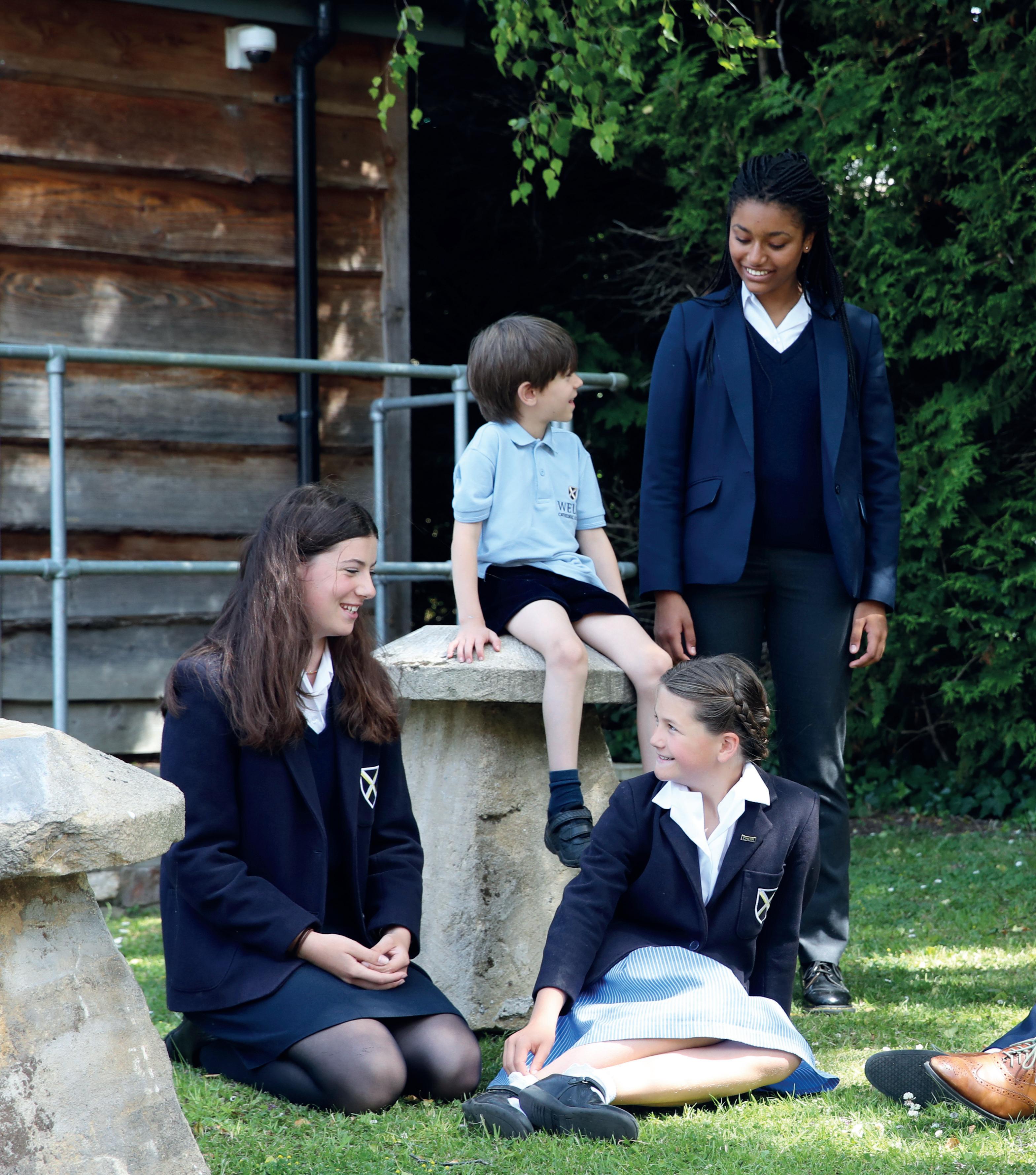


to stay there at weekends. On Thursday night Top of the Pops would be on – my two aunties were in their late teens and we used to sit and rave over it together. But then on a Sunday, we weren’t allowed to listen to any other music because my gran would have Songs of Praise on. I chose this one in particular because it was one of my favourite songs of the 70s. I grew up in the era, I love this music. And I also love a track where people can really sing and Deniece Williams can sing like a songbird. I still have this song in my iTunes and I play it all the time!
I really really love musical theatre, and I’ve introduced both my daughters to it – I think they love it almost as much as I do now. We’ve watched The Greatest Showman god knows how many times. We can’t quite turn the volume down and say all the words yet, but we might get there. I just remember seeing this in the cinema, and I was captivated within the first few seconds because of the beat of the first song. Every time I watch it, I’m
anticipating and waiting for the beginning because I absolutely love that opening beat! It just draws you in. I love it.

As you can imagine, Bob Marley was a really popular artist for us to listen to at home, and has continued to be. The reason
I chose Redemption Song specifically is because when you grow up as a person of colour in the UK, you face the challenges of racism before you get into the normal everyday life challenges. Redemption Song is one of those
uplifting tunes. It makes you think that actually, some of your destiny is in your own hands. It can galvanise and motivate you out of a slump.
It also talks about the past and issues around slavery. You need to know where you’ve come from to know where you’re going.
This song’s just important in its messaging.

This was the first concert I ever went to – I went with my best friend when we were 18. The lead singer of Cameo was famous for wearing black shiny leggings
– think Olivia Newton John in Grease – and a red codpiece. It was his USP.
We were so excited to go to this concert, but a few days before we were watching The Tube when Cameo came on. They were awful! So for four days we were thinking we were going to go to a really awful concert. But the morning we were setting off, Cameo were on the radio, apologising for their performance on The Tube, and they explained their amplifiers weren’t working.
We were so relieved!
Then we got to the concert and it was absolutely fantastic. The big thing I remember was that they
come on at the beginning without any lights, and all you could see was this red shiny codpiece dancing about on stage … But the concert was great.
This song is a reflection of me being brought up in a Christian household. People quite often equate Christianity and gospel music with something that’s really boring, but actually one of the things Sounds of Blackness bring is a different way of doing it. Their songs are grounded in Christian values but they’re R&B dance tunes that happen to be gospel. They bring young people into those values because their music isn’t boring or stifling.

I love this woman. I love her music. I love the fact that every time I watch her sing it looks effortless. I really love this song in particular because it reminds me of my husband (we married in 2000) and my children. But also because it’s just one of those really feelgood songs. It can be applied to anything in your life that brings you joy. I just love it, and I think Anita Baker’s incredible.
When I was younger and Take That were really famous I hated them. But now I’m older and they re-formed and their music has matured, I’ve come to really like them. In fact, I’ve been to see them live three times in the last few years – twice I dragged my husband along! He did admit they put on a really good show technically.
I’ve specifically chosen Never Forget for my track. I’ve seen the song differently since hearing it live. When I think about my life and my career, I have to
remind myself quite often that as a person of colour working in the NHS, I am not the norm, I’m the exception in terms of reaching such a senior role. This song means a lot to me – I need to never forget that. I can tend to assume that everyone else has been able to fight their way through the barriers to get to where they want to be in their career, and that’s not always the case. So mentoring and supporting and breaking down barriers for other people is really important to me.
And if the waves were to wash all your records away but you had time to save just one, which would it be?
Redemption Song.
I think I could handle anything coming at me if I had that song to listen to.
And the book you’d like to take with you to your island?
Maybe I Don’t Belong Here by David Harewood
A lot of what he talks about I can relate to in my own childhood. But also because it’s important in a sense of what I think I’m trying to achieve professionally. His experiences of racism, living in this country as a man from Caribbean heritage, led to a psychotic breakdown, then having to recover and now being successful at what he does. There’s something in the message about the way we treat people, the impact it has on them as human beings, emotionally and psychologically, it can change the direction of their life forever.
A digital radio. Because then I’d have music wherever I was, and if you have music you can deal with anything, can’t you?
Click here to listen to Patricia’s entire playlist on YouTube

Light-touch government is an excellent theory, says North Dorset Green Party’s Ken Huggins. But in practice it just doesn’t hold water. Or sewage.
The ideology that promotes ‘light-touch’ government sounds appealing. It makes for simpler government, with a reduced role for the state, minimal bureaucracy, reduced public sector borrowing and reduced taxation.
The claim is that industry, free from the restrictions of red tape, can get on unhindered with the business of supplying the market with what people need. Bad businesses will fail, and only good businesses will succeed. Sounds good, but there is a fatal flaw … human greed.
A ‘good’ private company is generally considered to be one which primarily focusses on maximising the money made for its shareholders and
management, putting profit before people and planet. Take the water industry in England, overseen by the government regulator OFWAT and the Environment Agency which are both considered to be poorly resourced under lighttouch government.
The industry was privatised in 1989 by a Tory government, under the pretext that the private sector would inject the cash needed to upgrade old Victorian sewers and fix leaky mains water pipes ... That went well, didn’t it! 30 years on, a 2020 report found the businesses had been loaded up with £48bn of debt to help fund dividends of £57bn,
while customers’ water bills increased 40 per cent above the rate of inflation. In 2021, despite grossly polluted foul water being discharged uncontrolled into our rivers and seas for 2.7 million hours, water company executives received an average £100k bonus on top of their salaries.
The water industry is not the only one raking in excessive profits. What we need is big bold honest government, with people and planet protected by appropriate regulations that are rigidly enforced by properly funded public authorities.
The Green Party is calling for essential services like water and energy to be brought into public ownership. Not easy, we know, but the plundering has to stop.
A plan to tackle the energy crisis was drawn up by a cross-party group of MPs in February and is ready to go, says Labour’s Pat Osborne
August’s column about Blandford Town Council’s ‘motion for the ocean’ already seems a lifetime ago. Within a few short weeks, that glimmer of hope was eclipsed by a tsunami of raw sewage engulfing our beaches, rivers, and the marine habitats around our coastline. The root cause of this? Greedy water company bosses prioritising shareholder profits and their own inflated paycheques over basic public health needs. It’ll be lost on nobody that we’re in deep ‘sewage’ with our other utilities too.
Since 2010, under the Tories, energy prices have spiralled out of control. In September, bills will almost double with the
promise of even more increases to come. People across North Dorset, who already have nothing else to give, are being asked to cough up yet more, so that a handful of shareholders can make even more profit.
If that isn’t bad enough, the same Tories who passed the laws which allowed the water companies to do so much harm, are papering over their decisions to slash investment in energy efficiency and renewable energy from wind, waves, sun, and tides – implying instead that environmental policies are to blame for energy hikes, and that fracking and more North Sea gas and oil are the answer.
What we really need is a plan that includes windfall taxes on the huge profits of energy companies, a plan to insulate homes to keep energy bills down, and to bring energy back into public ownership so we’re all in control of our future.
Fortunately, such a plan exists. The legislation was written in February by a cross-party group of MPs and is ready to go.
We can only live in hope that our new prime minister (whoever that will be) will deliver it.
Until then, I’ll hold my nose as water company bosses pump more sewage into the environment – and cash into their pockets – but I won’t hold my breath.
Local fairs can lift a community – but there’s no hiding from the anxious mood that grips the Vale’s residents, says North Dorset Lib Dems’ Mike Chapman
At the peak of COVID, we recognised the difficulties families were facing – we saw the successful roll-out of community fridges in Poole. There was nothing similar operating at the time in North Dorset, so we decided to pave the way and set one up in Sturminster Newton. Community fridges have the double benefit of reducing food waste and stretching household budgets. Other schemes have since developed including fridges in Shaftesbury and Blandford and, of course, The Vale Pantry in Sturminster Newton. Two years on, we have decided to hand our community fridge over to The Emporium team who I am sure will be able to stock it more effectively from more local sources. The very best of luck to them with this and all their other initiatives.
On another positive note, noone does a Fair quite like Dorset, do they? In quick succession we have the Gillingham & Shaftesbury Show, The Oak Fair, The Great Dorset Steam Fair and the Sturminster Newton Cheese
Festival. It always makes me smile that the Cheese Festival was borne out of a collective fury at the closure of the town’s creamery and cheese factory. This was a very Dorset response: an attachment to all things rural, coupled with a blend of stubbornness and entrepreneurial flair.
We found the G&S Show especially good. It gave us the opportunity to ask people about their priorities and to listen to a wide range of thoughts and perspectives. Although the Show with all its attractions served to lift most people’s mood, there was no hiding from the underlying anxiety about life and the world at large. And now have the winter of our discontent. We face a nasty enemy, multiple threats to our standard of living, a poor economic outlook and strikes and go-slows every which way you look. We ought to be pulling together but we are a million miles from that. Boris’s legacy
will be dominated by that failure. Despite his ‘levelling up’ vocabulary, he has undoubtedly increased the polarisation of the nation. Blue wall, red wall, whatever colour wall; please can we just have fewer walls?
Please would the new PM also address another noticeable polarisation – that between customer satisfaction and shareholder satisfaction.
Across rail, energy, water, communications, the media and even the ports, a proper balance seems to be out of reach. Is this because the public as customers have so few real choices? Or is it due to a failure to regulate profits effectively?
We need to find answers and properly invest in solutions before the roving eye of capitalism settles on the NHS and begins to espouse more and more salami-slicing of its routine, less complex activity, engendering counter-productive competition that distracts doctors, nurses, technicians, support staff and managers alike from their real purpose.

NICK HAYWARD

Critically acclaimed singer songwriter, Nick Hayward returns after his sell out show in 2018. The front man of Haircut 100 with hits including 'Love Plus One' and many solo hits such as 'Blue Hat For a Blue Day.'


Andy Fairweather Low's pedigree is the stuff rock dreams are made of If you just remember Andy's early work and major hits such as 'Wide Eyed and Legless' you're in for a treat!
A chance to see live on stage of the only performing original Rock'n'Roll Pioneers in the World today. With his many hits including 'Teenager In Love' and a host of wonderful songs from the era Marty Wilde and his fabulous band take you back through some of the most exciting musical times this country has ever experience.
“Soul, Gospel, and R&B: Ruby Turner is truly the genuine article Blessed with a voice that can breathe life and meaning into any song, whether it be a passionate ballad or a fast groove”



All Floyd’s 2022 tour comes to Dorset this month; faithfylly recreating the classic Pink Floyd anthology in the meticulous detail now expected by All Floyd fans. Delivered with stunning visuals and world-class sound system (surround sound in selected theatres) the 2022 tour builds on the successes of previous tours to both astound and impress even the most hardened of tribute act doubters...
‘Number after number turned out immaculately, noteperfect, complete with backing singers and that wonderful,
rich throbbing sound that Floyd fans will be familiar with. Messers Mason, Gilmour, Waters, Wright and Barrett
would have been proud to hear their music so faithfully rendered. Close your eyes and they could have been in the room. They weren’t, but they could have been.’
This is a show not to miss, a spectacular and honest display of Pink Floyd’s rich musical legacy featuring tracks from Meddle and the iconic Dark Side of the Moon through to The Division Bell.”

Event details:
7:30pm, Saturday 1st October at The Barrington Theatre, Ferndown. Tickets £19.50 direct from the venue here.

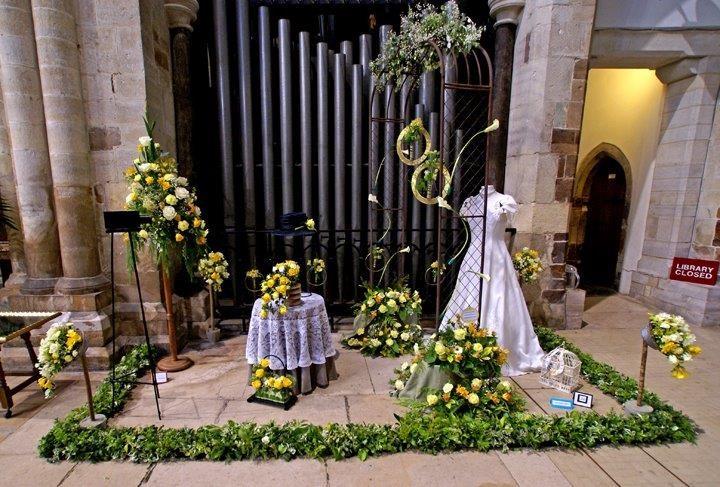

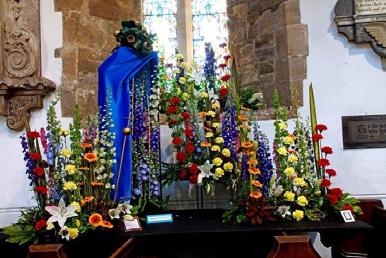











To celebrate the stellar line-up of the 8th Dorchester Literary Festival (DLF) this October, we’re giving away 10 tickets (worth £100) to one lucky winner.
DLF are known for their eclectic and ambitious programming; this year audiences can delve into the lives of our Queen, the Marine Commandos, the celts, Constable, Ronnie Archer-Morgan and Mary Seacole. They’ll meet bushcraft and survival legend Ray Mears, Keith Brymer Jones of The Great Pottery Throw Down as well as Justine Picardie, whose novel Miss Dior brings together fashion and the French Resistance.
Minette Walters shares her Desert Island Books, and bestselling novelists including Robert Harris, Natasha Solomons, Elizabeth Lowry and Ben McIntyre will immerse us in their stories. See all the events and purchase tickets from the
To be in with a chance to win, just click the picture below (or here).
The closing date for this competition is 25th September 2022 and only entries received on or before that date can be included. The prize will go to the first randomly chosen entry. Good luck!





























































































The call has gone out for cyclists to join the 10th anniversary Rotary Dorset Bike Ride, happening on Sunday October 9, starting and finishing at Longthorns Campsite next to Monkey World in Wareham.
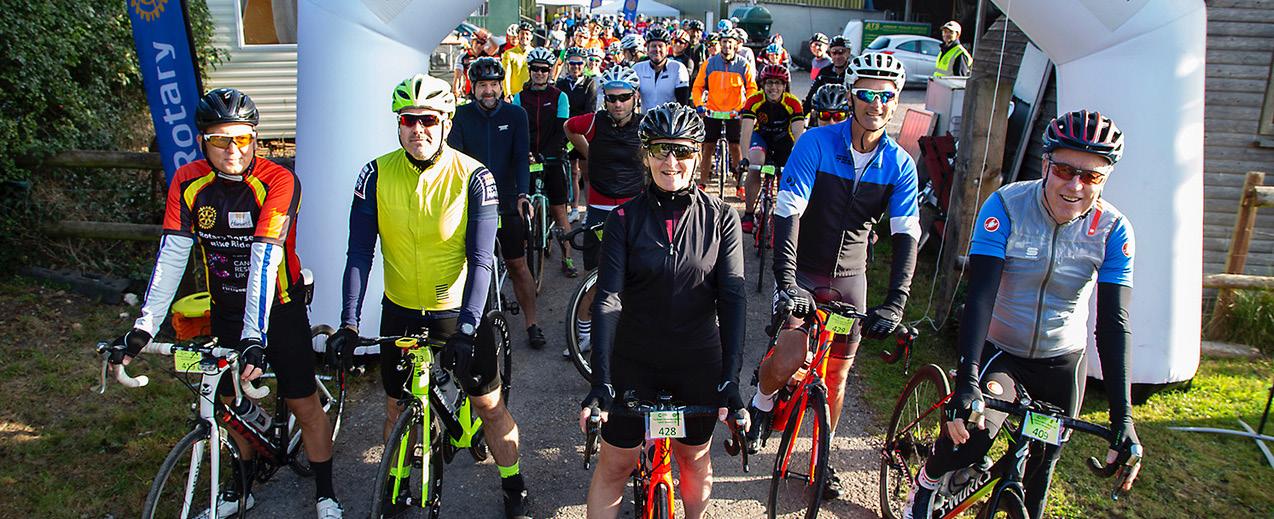
Expected to attract over 500 riders, this year’s event is hoped to be Dorset’s biggest cycle ride. With five routes ranging from 22 to 108 miles, the challenge is designed to welcome riders of all ages and abilities.
This event has raised money for a number of charities over the past ten years, including an impressive £300,000 for Cancer Research UK.

Organiser, Richard Burnett said: ‘Our 10th anniversary is a huge landmark, and we are determined that this year’s event is the biggest ever, raising vital funds for cancer research. Our aim is for all entrants to have a great day out, whether
that’s families riding together, or competitive cyclists pushing their limits.
‘There’s a serious side to the event, which offers cancer survivors and those celebrating the lives of friends and family members impacted by cancer, to fight back and provide much needed funds for research.’

The five routes in this year’s event are 22, 35, 55, 70 and 108 miles, all created to pass through beautiful Dorset countryside.
Riders are invited to sign up for the event at dorset-bike-ride.
co.uk. A discounted entry fee is available by registering in advance online – currently the fee is £35 per rider, and this will increase to £40 for registrations on the day.
Children under 16 are free, if they are registered online and accompanied by a paying adult. ‘Come on, let’s make this Dorset’s biggest cycle ride for charity!’
If you’d like to be involved, the organisers are looking for volunteers and marshals to support the event – please contact via the website.
Fox’s Close now stands on the site of the Fox Inn, once run by a Mr Fox. Roger Guttridge joins the dots in this month’s Then & Now
It’s hard to believe that this is the same location 120 years apart, although the name of this little L-shaped street of bungalows provides a clue.

Fox’s Close at Holwell takes its name from the Fox Inn that once stood on the site, and indeed from a Walter Fox, who was the landlord in the early 20th century.
As you drive through Holwell today, it’s also hard to believe that this modest Blackmore Vale village once had two pubs to serve its 417 inhabitants. That was one pub too many
for some villagers, though, and after the death of a previous landlady in 1883, they campaigned for the Fox’s closure.
The stated reason was that a village of Holwell’s size didn’t need two hostelries – which is a fair point, although I’m guessing that the temperance movement may also have had something to do with it.
The campaign against the evils of drink was in full swing in the late 19th century. In those pre-
Suffragette days, women did not get a say in such matters, of course; even though they probably suffered more than anyone due to their husbands’ drinking. So it fell to Holwell’s men to sign a petition calling for the Fox Inn’s closure – 67 of them signed, 19 of whom were only able to do so with a cross. The campaign obviously failed, as Walter Fox was still pulling pints at the Fox 20 years later, and it’s known that the pub was still in business in 1915!
According to a recent posting by Richard Rolls on the Lost Pubs Project website, the thatched pub was destroyed in a fire in 1961 along with the house next door, which was his great-grandmother’s home. Presumably that’s when the Fox’s Close bungalows were built.
Richard also posted a picture of Holwell Working Men’s Club members outside the Fox, which suggests it was once their regular meeting place.
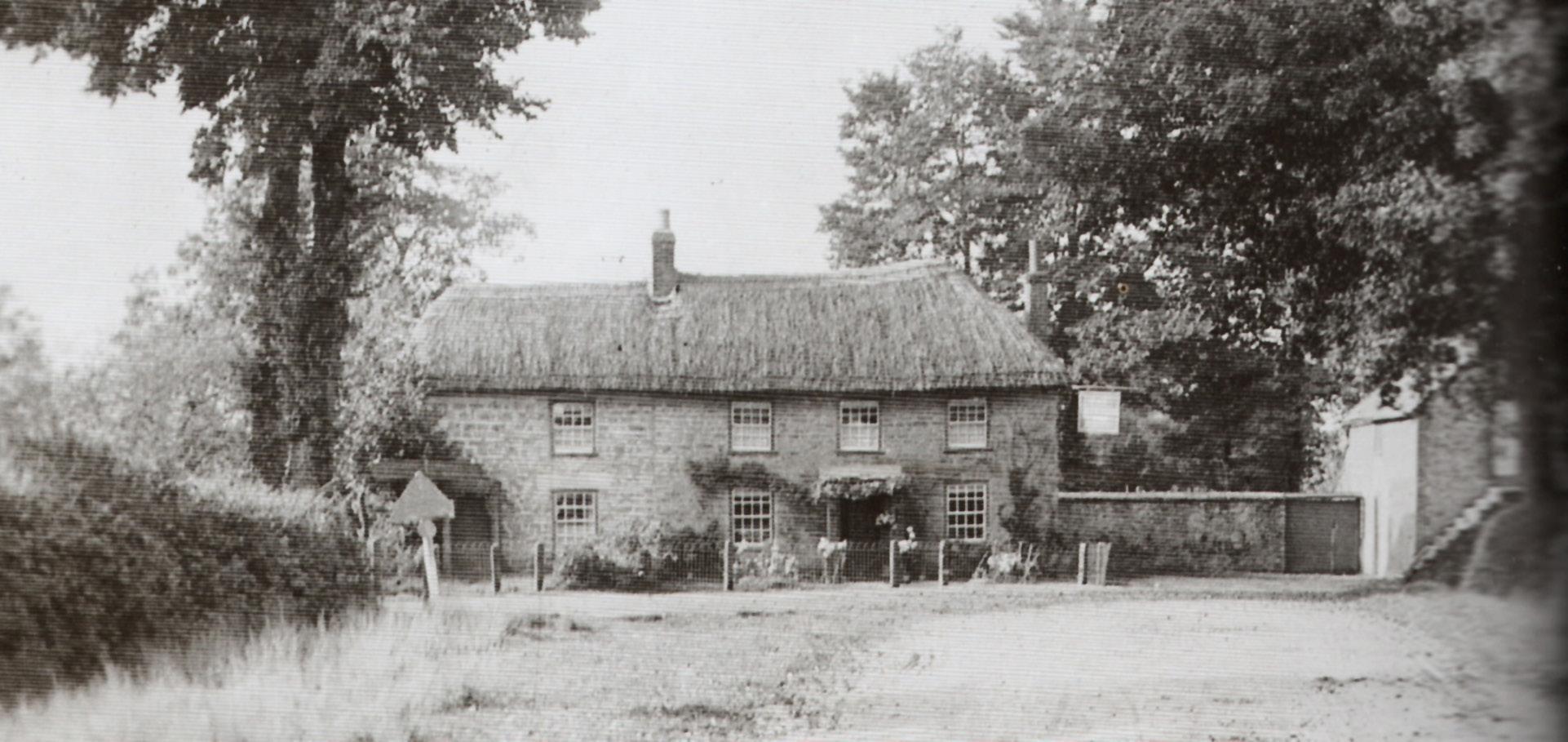




A former Rector of Lydlinch was obsessed with hunting – but his first quarry was an unfortunate old woman, says Roger Guttridge
You won’t find a country clergyman like him today, which is probably just as well, for the Rev William Chafin was far too outrageous for the modern era.
The one-time Rector of Lydlinch was obsessed with hunting and has been called the ‘epitome of the sporting parson of 18th century England’.
He was also a renowned eccentric who always dressed in ‘old boots and greasy leather breeches and refused to change even when dining with the Prince of Wales’.
William’s character owed much to his unusual upbringing.
Born in 1733, he was the 11th and last child of George and Elizabeth Chafin, wealthy owners of Chettle House (now a grade one listed building on Cranborne Chase).
Sadly, only three of William’s ten siblings had survived infancy, a record that their father put down to the excessive tenderness bestowed upon them.
Determined to improve William’s chances, George had the newborn immediately baptised, then removed from his mother to be wet-nursed by the estate shepherd’s wife.
William himself later recalled: ‘I remained in this cottage under the care of the good inhabitants until I was nearly five, without once sleeping in my father’s house.
‘As soon as I could crawl, I was carried by the shepherd to his sheepfold every morning, even in the very depth of winter.’
William was known for his robust constitution, and he put this too down to his upbringing.
He was still riding to hounds at 80 and only suffered a decline in health after being struck by lightning while sitting at a window in 1817.
Even then he survived another year, eventually dying in 1818 aged 85.
Chafin is also famous for his book Anecdotes and History of Cranborne Chase, first published in the year of his death and

which reflects his hunting obsession.
According to his contemporary, Sir Archie MacSarcann, William hunted ‘everything from the flea in the blanket to the elephant in the forest’ … ‘But his chief sport was afforded by foxes, hares, rabbits and owls,’ said Sir Archie.
Chafin’s biggest fan was the novelist and poet Sir Walter Scott, who sent some handwritten notes about him to Lord Montagu, which survive in a copy of Anecdotes in the library at Beaulieu.
Sir Walter reveals that William’s ‘first commencement as a sportsman [was] rather inauspicious – he shot an old woman [and then] left his game where it dropped without staying to bag it.’
‘He shot an old woman, and then left his game where it dropped without staying to bag it.’The Rev William Chafin
When a servant at Chettle House announced that a woman called Goody had been shot dead, ‘there was a confession in the boy’s looks which made his father exclaim: “There sits the rascal that killed her.”’
What the coroner’s inquest decided is unknown but Sir Walter reports that the boy’s father confined him to a garret for a month on a diet of bread and water.
The young William whiled away his time by trapping hungry sparrows using bits of his bread as bait.
In a separate letter to Lord Montagu, Sir Walter describes how the young Chafin also ‘shot
an old cat’, for which offence he served three months in the garret on bread and water, this time amusing himself by hunting rats.
It’s not clear when Chafin became Rector of Lydlinch but he was certainly in post by 1769 and probably continued until 1776, when he inherited the Chettle estate following the death of his brother, another George. Diarist Stephen Terry wrote that the entire Chettle household got sucked
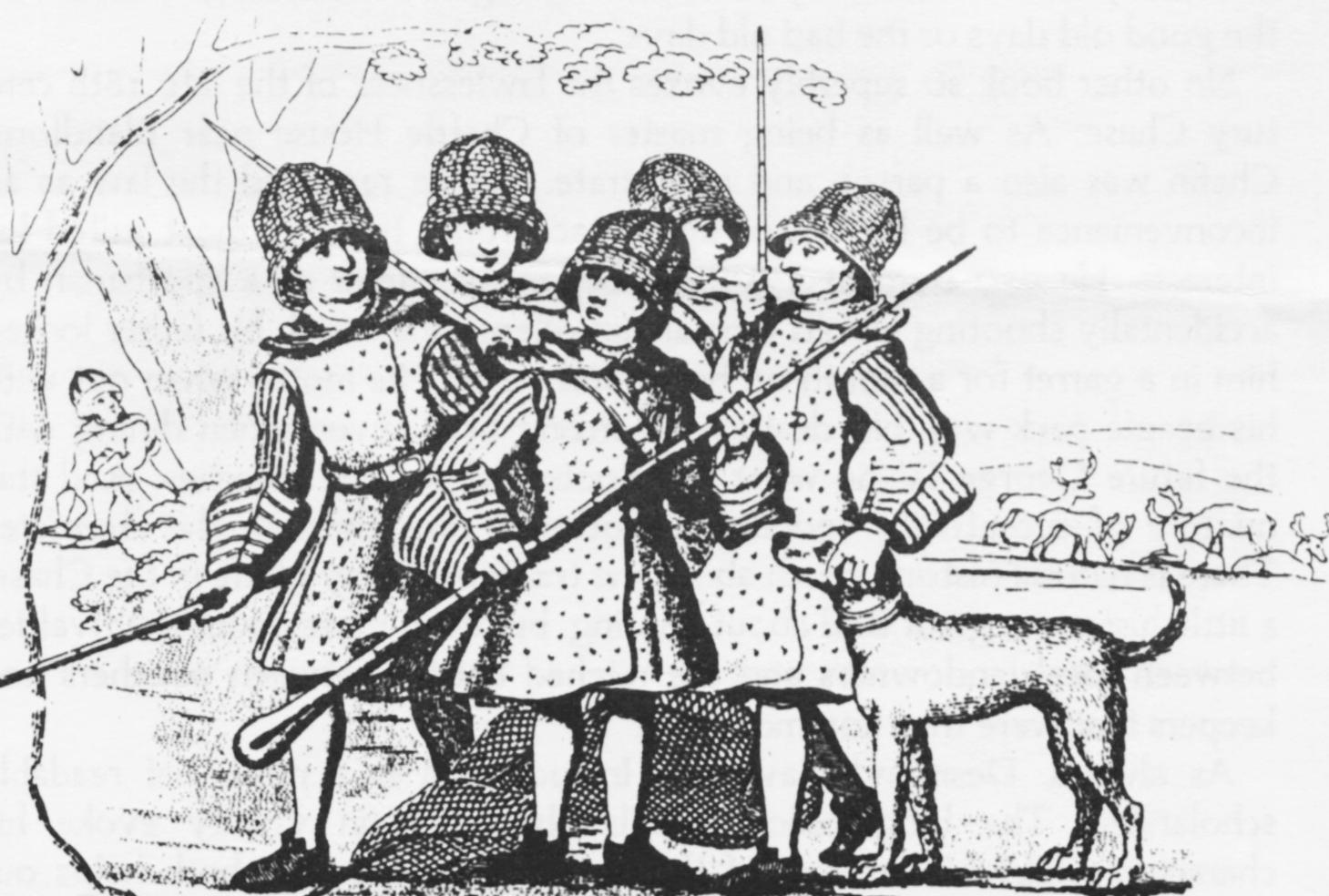
into Chafin’s hunting, apart from the butler, who ‘superintended the garden’.
Terry added: ‘The old cook supervised the cuisine in the kennel as well as in the kitchen, and got the footman up in good time to do his part in the house before he was booted and spurred for the chase,’
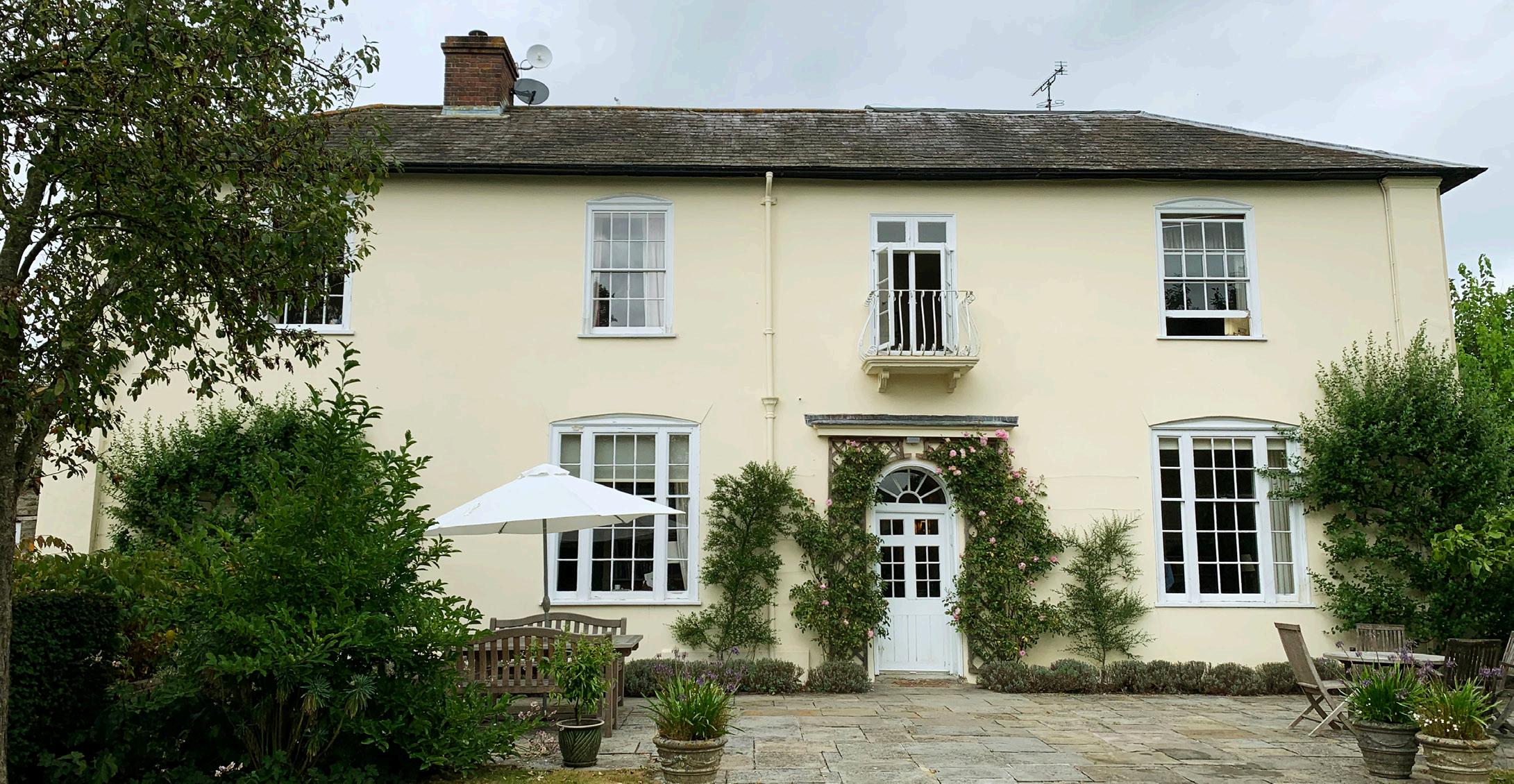
For rabbithunting, Chafin maintained a pack of miniature beagles, each a mere 12 to 14 inches high, which he carried in panniers on his horse.
For owl-hunting, his parishioners were the first pack, flushing out a distressed bird on a sunny day and pursuing it until it sought refuge in a bush, at which point the beagles would be released. Chafin’s inheritance included the manors of Lydlinch, Folke and North Eggardon.
Tradition has it that he sold Eggardon Hill near Bridport to his friend Isaac Gulliver, Dorset’s leading smuggler, who planted fast-growing trees on the summit as a marker for contraband ships approaching the coast.
Chafin only suffered a decline in health after being struck by lightning while sitting at a window in 1817.
Lydlinch’s Old Rectory today Image: Roger Guttridge
Martin Green may farm 260 acres of land organically on Cranborne Chase, but he is best known for his extraordinary archaeological work there, and for the impressive Down Farm Museum he set up behind the farm, which is full of his finds – flint tools and prehistoric artefacts from the Paleolithic to the Romano-British period.
His family has been farming here since the 30s and he started picking up flints as a child, his curiosity sparked by his father’s interest. The Greens knew the area the farm had prehistoric remains, but their profusion was only unearthed by Martin, who started digging in 1976. His hero was General Augustus Pitt-Rivers, the Victorian soldier, scientist and archaeologist, who excavated many sites on the Rushmore estate and elsewhere. His mentor was Richard Bradley, who became a Professor of Archaeology at Reading University.
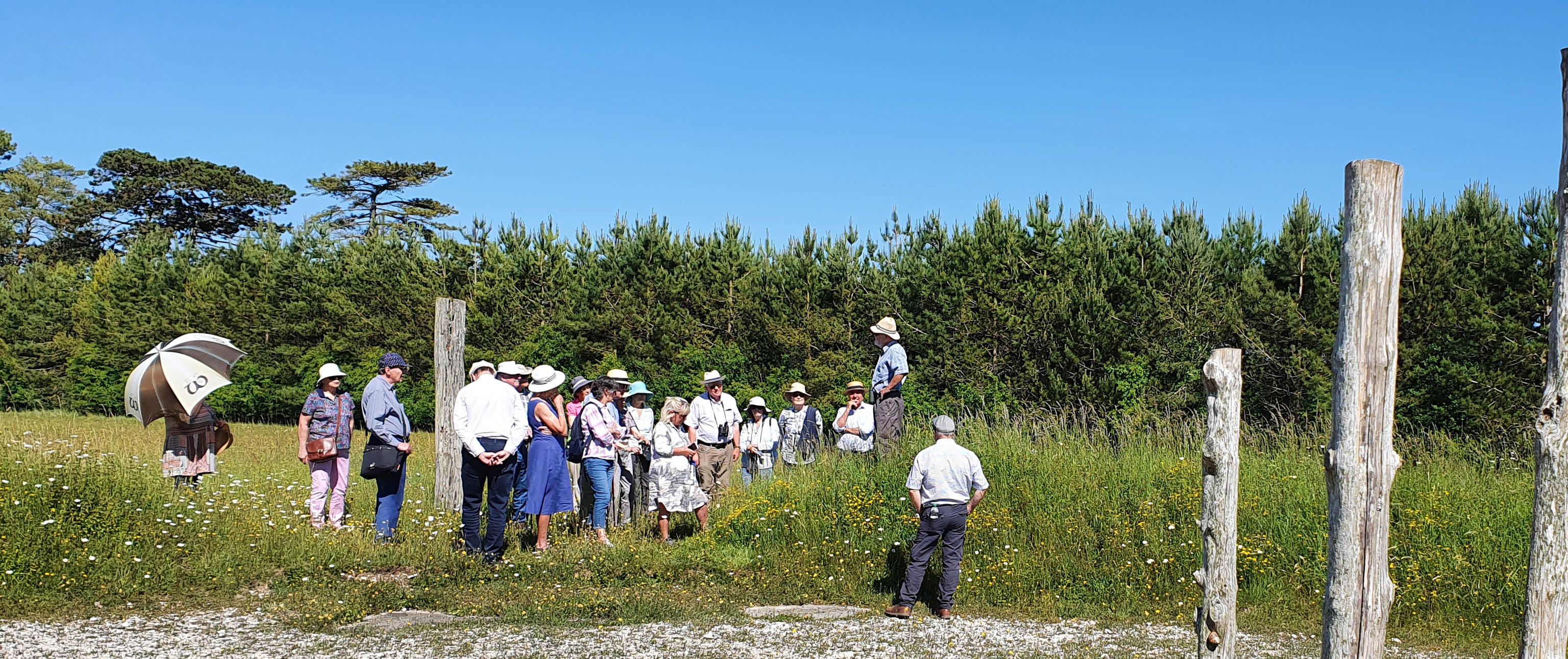
Martin Green demonstrating a stone polishing tool in his Down Farm Museum All images: Rupert Hardy
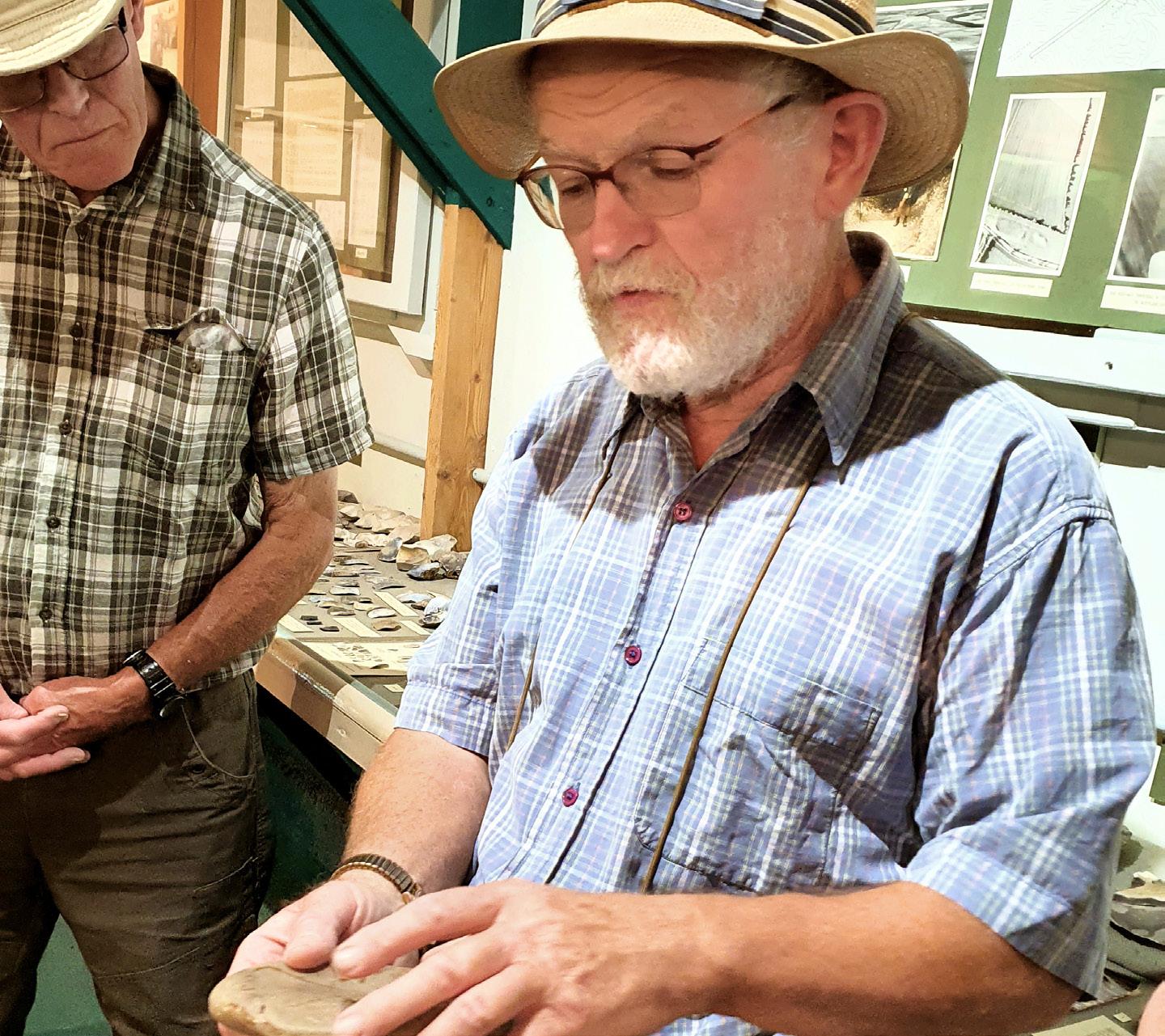
Although Martin was not formally trained, he worked closely with Prof Bradley in the late 1970s on the Pitt-Rivers project which re-examined the large and important Pitt-Rivers collection
of 26,000 archaeological and ethnographic objects to a new museum at Oxford University.
There are a number of excavated

A visit to Martin Green’s remarkable Down Farm Museum is highly recommended, says Rupert Hardy, chair of North Dorset CPREMartin Green (centre, on the mound) leading a tour of the prehistoric sites on Down Farm.
and sensitively preserved prehistoric sites, including round pond barrows and henges (enclosures surrounded by ditches and banks), on the farm. One of the most extraordinary is the Neolithic Dorset Cursus which crosses the farm. Overall, it runs for six miles, mostly westwards, but this was only fully realised in the 1950s. It is the longest in Britain and Martin has only recently excavated part of it. Originally consisting of a pair of parallel banks, some of the Cursus is still visible. It is assumed the Cursus served a religious or ceremonial function related to its southwesterly orientation following astronomical alignments. From the eastern end you can see the midwinter sun set behind the long barrow on the ridge of Gussage Down; a magical experience if you are lucky enough to get a sunny winter solstice.
Martin believes the profusion of sites on his farm related to the location of the Cursus here, but another factor may be the Ackling Dyke, a Roman road which also crosses the farm.
Another remarkable site on the farm is the Fir Tree Field Shaft, which is estimated to be more than 25m deep, even though it has only been excavated to 13m. The shaft was formed by natural processes due to water percolation from melting glaciers at the end of the Ice Age. Finds in the pit range from the Mesolithic to the Neolithic, covering the period from hunter gathering to farming, and including bones of deer, aurochs, flint tools and pottery. Some of the deer clearly fell in. Aurochs were ancestors of modern cattle, domesticated by Neolithic people but long extinct. Many universities, including Cambridge and Reading, have been involved in the digs on the farm, with students receiving
practical courses on excavation techniques and going on archaeological field trips run by Martin.
In recognition of his work and knowledge, Martin was awarded an Honorary Doctorate of Science by Reading University. In 2000 he wrote a book about archaeology and his farm, “A Landscape Revealed: 10,000 Years on a Chalkland Farm”, which is a fascinating read. Prof Bradley said of it: ”Martin must be the most professional amateur [archaeologist] in Britain, but his work is so important that the term is simply not sufficient. His achievement is unique, as this book shows us”.
One recent development has been the construction of a Neolithic house at the Butser Ancient Farm museum in Hampshire, modelled on the one Martin excavated at Down Farm.
Martin sees advantages in his joint roles as farmer and archaeologist which enable him to distinguish what is genuine (or not), such as crop marks. He
believes strongly in protecting the environment, and he is in the process of introducing rare breed cattle, which will help establish more wild flowers in his fields. He sees technology as a major aid to archaeologists; geophysics shows how the Cursus functioned. Drones and 3D laser scanning (LiDAR) are also very useful tools, through which more prehistoric sites are being discovered on Cranborne Chase and elsewhere every year. Surprisingly, his favourite artefact is a flint knife found in Yorkshire, not Dorset, which you can see in his museum. Asked what conveys his life’s work he quotes the words of General Pitt-Rivers: “It was if some unseen hand had guided me to be the owner of such a property”.
Dorset CPRE has organised several visits to Down Farm. Groups of six or more are welcome at his museum –please contact Martin on mgreendownfarm@gmail com. He can lead tours of the prehistoric sites on the farm too, which I thoroughly recommend.
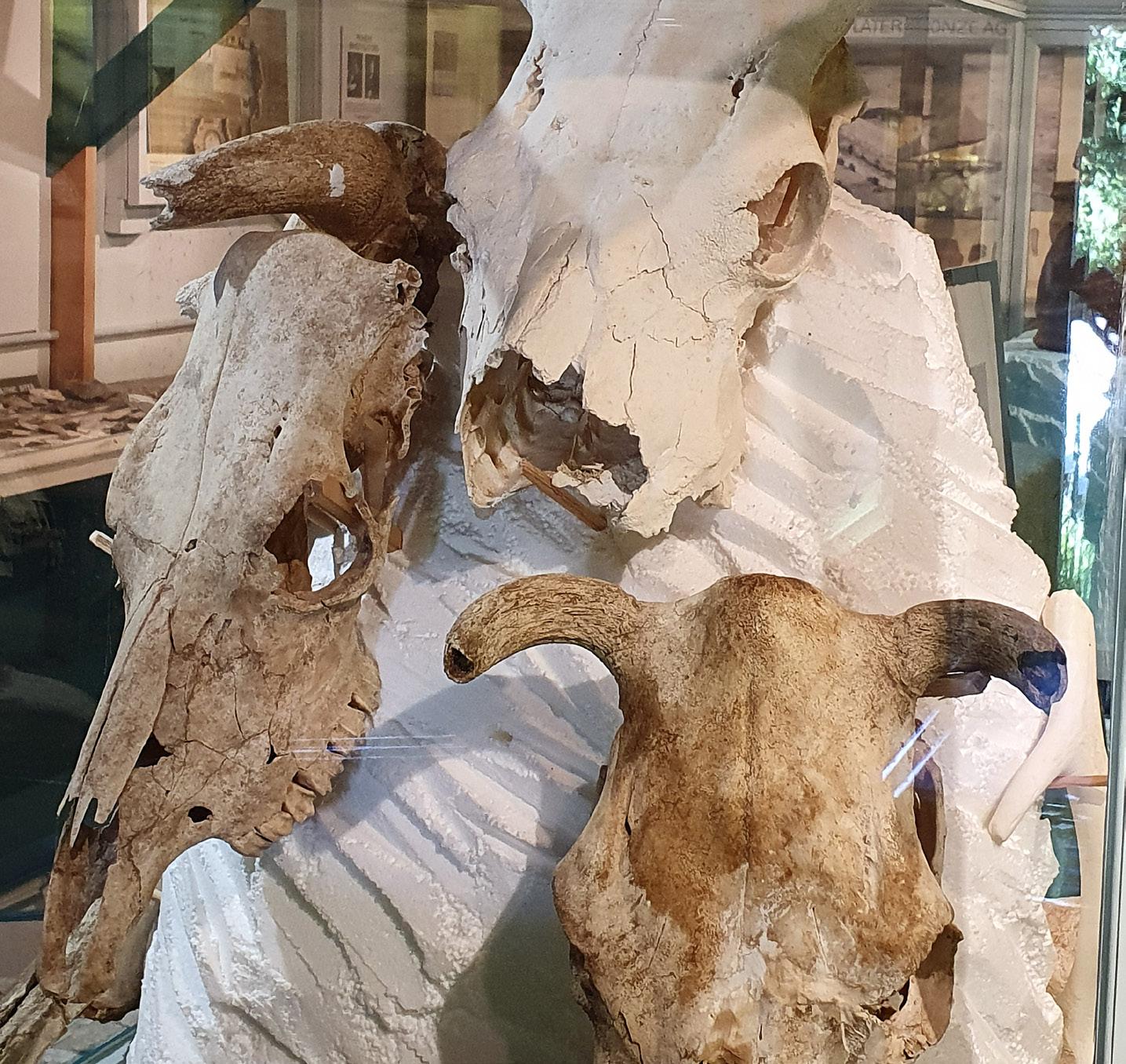
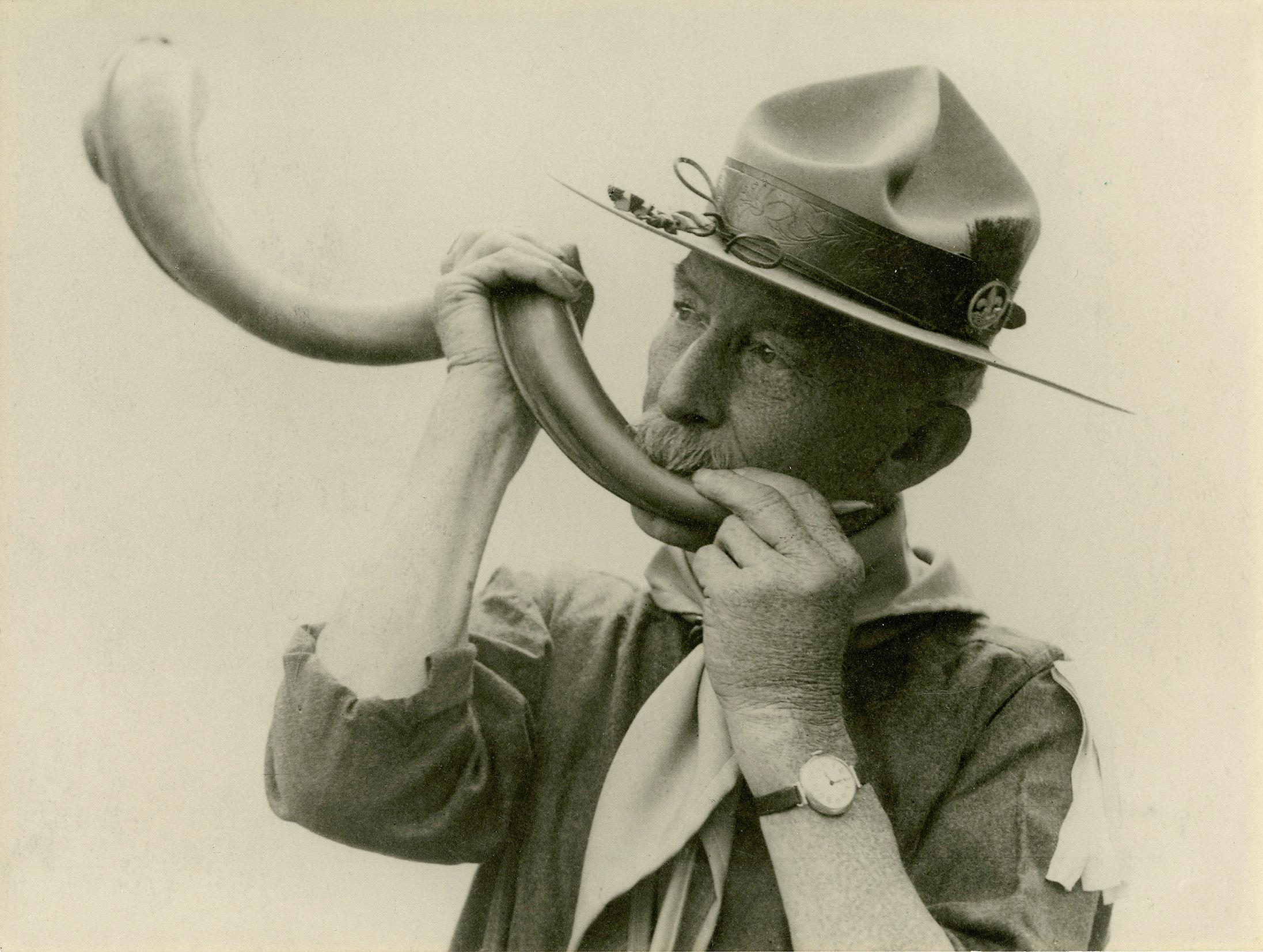
Most people know him as the founder of the Boy Scouts. However, the astoundingly eccentric Robert Baden-Powell was a brilliant military strategist and hero of the Second Boer War, yet later became a pacifist who angered Mussolini and ended up on Hitler’s death list. A conflicted character, he was a macho man who was obsessed with Peter Pan (he saw the play five times) and who was happy to don a frock and entertain troops as a drag artist.
He was an elitist man of privilege, but one who gave the poorest children opportunities to discover the great outdoors.
It started with a statue After delving deep into the world of Boy Scouts and their famous founder, journalist Lorraine Gibson, who lives near Brownsea Island, became intrigued by the island’s role in the birth of the Scouting movement. She was hooked. In the pandemic of 2020, she reported on a fight between Scouts and anti-slavery protesters, hell-bent on throwing Baden-Powell’s statue off Poole Quay.
Now, 90,000 mainly lockdownwritten words later, her first book, Robert Baden-Powell: A Biography, is published. It’s available from 16th September.
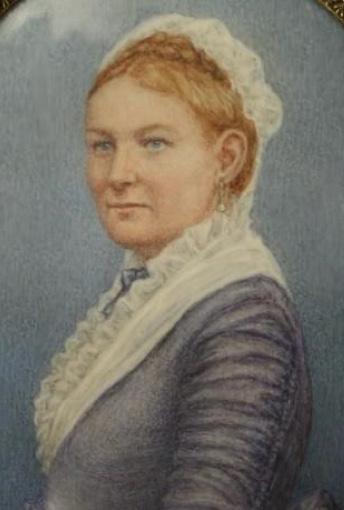
She explains: ‘The more I researched, the more I discovered the dichotomy between his “two lives”, as Baden-Powell called them. His difficult childhood really drew me in – a domineering and unaffectionate mother whom he loved even though she forced him into the army at 19, dashing his dreams of becoming an artist. ‘My book considers a recently discovered telegraph that adds fuel to speculation over his relationship with a fellow soldier that endured for 30 years, until, at the age of 55, he secretly married a 22-year-old woman.’
She adds: ‘This is not so much a warts-and-all tale, but a whatcaused-the-warts tale. I leave the reader to make up their mind.”
Researching in the pandemic had many restrictions, but thanks to modern technology Lorraine was able to interview BadenPowell’s granddaughter, who is still in the scouts in her 80s, and his grandson, as well as his great grandson, who lives in Nova Scotia.

She said: ‘I was blown away by the support I got for my fresh take on the man. I got access to his diaries and school records and when lockdown lifted I had the rare opportunity of seeing archived scouting material curated on Brownsea Island.’
And how was writing her first book? ‘The spare room became my writing turret. My computer was on at 4am and sometimes I would sneak there during the night when an idea came to mind. I was paranoid about losing my work so had back-ups on all manner of devices.
‘The wall was covered in hundreds of Post-It notes and a timeline. My husband and two daughters were very patient.
‘I’d be watching YouTube videos about Baden-Powell while I was cooking, and suddenly rush off to write something.
‘There were a few almost-burnt suppers that year!”
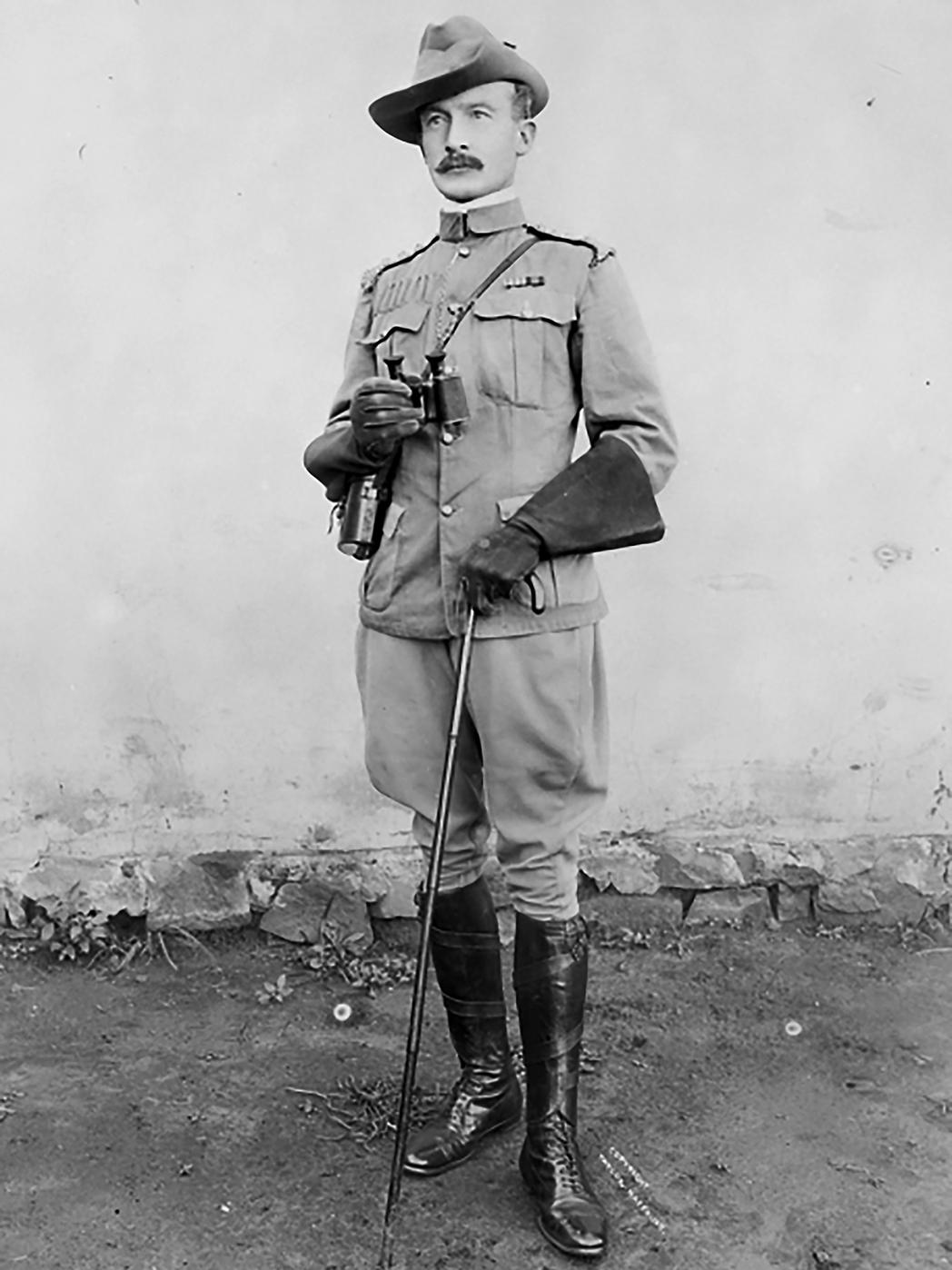
Potentially there are more charred offerings in store for her family: Lorraine is already embarking on another book. She revealed exclusively to The BV: ‘I’m moving from a man in shorts to a man in rhinestone catsuits! I’m a huge Elvis fan and so was my dad. The title of my next book is Elvis: The King of Fashion. What Elvis wore is so culturally relevant. Ask someone how they imagine Elvis and you can almost guess their age. White suit and capes - the Las Vegas 70s. Black leather in the 60s era and drainpipe jeans in the 50s. I’m really hoping to get to Memphis next year to do some real-life research.’

Robert Baden-Powell: A Biography is priced at £25 and will be available from 16th September.


History


by Wayne Winstone
Join Wayne for a fascinating event to celebrate his explosive new novel Picture You Dead, the latest Roy Grace thriller from the number one bestseller Peter James.

Much loved by crime and thriller fans for his fast-paced page-turners full of unexpected plot twists, sinister characters and accurate portrayal of modern day policing, Peter James has won more than 40 awards for his work, including the WHSmith Best Crime Author of All Time Award and Crime Writers’ Association Diamond Dagger.

In Picture You Dead, readers discover the darkness that lurks around every corner in the latest instalment of Peter James’s awardwinning detective series, which is now a major ITV programme starring John Simm as Roy Grace.
Harry and Freya, an ordinary couple, dreamed for years of finding something priceless buried among the tat in a car boot sale. It was a dream they knew in their hearts would never
come true ... until the day it did.
They buy a drab portrait for a few pounds for its beautiful frame, planning to cut the painting out. Then, back at home, they realise there seems to be another picture underneath – and it’s a stunning landscape.
Could it be a long lost masterpiece from 1770? If so, it could be worth millions. One collector is certain it is genuine. He is someone who uses any method he can to get what he wants and will stop at nothing.
Detective Superintendent Roy Grace finds himself plunged into the unfamiliar and rarefied world of fine art.
Outwardly it appears respectable, gentlemanly, above reproach. But beneath the veneer, he rapidly finds that greed, deception and violence walk hand-in-hand.
And Harry and Freya Kipling are about to discover that their dream is turning into their worst nightmare.
‘Sinister and riveting … Peter James is one of the best British crime writers, and therefore one of the best in the world.’ Lee Child
Tickets for the talk in Sherborne are £5 from Winstone’s or online here. The ticket price is redeemable against the book

Edwina Baines talked to Ursula Leach, known for her spare and richly-layered paintings of Cranborne Chase and the Blackmore Vale, in her Iwerne Minster studio.
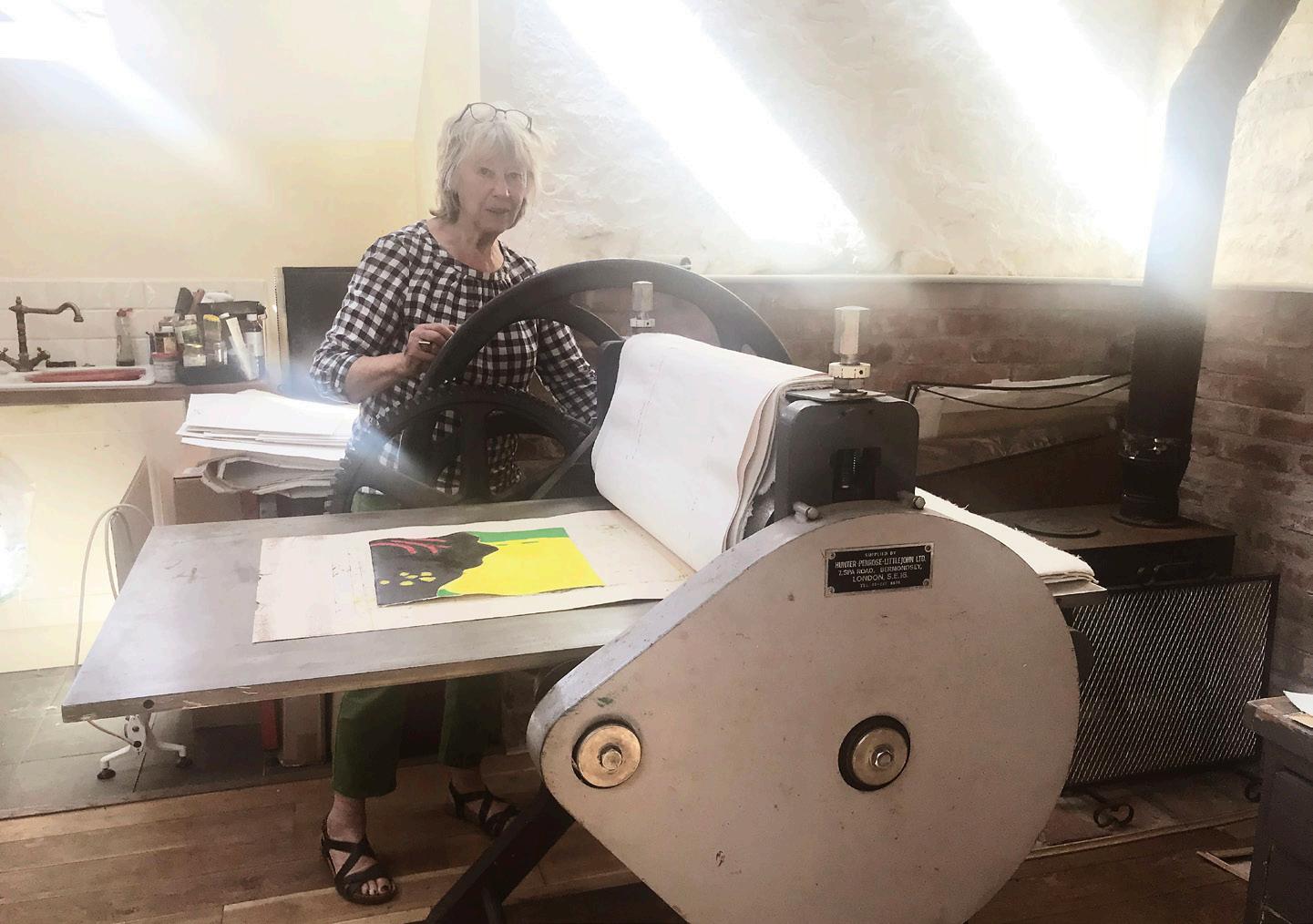
The distant horizons of Cranborne Chase have long been a source of inspiration for famous artists including Lucian Freud and Elisabeth Frink. This vast, ancient landscape is built
of rolling chalk grassland and escarpments, ancient woodlands, downland hillsides and river valleys, each with a distinct and recognisable character. For most of her career artist
Ursula Leach has drawn on the Chase for inspiration, but a move to Iwerne Minster five years ago has led her to explore the hedgerows (or lack of them) and different agricultural practices in the heart of the Blackmore Vale.
Better out than in In the light, airy studio in her garden on a recent hot summer morning, she told me that although she continues to draw, she does not paint so much in the summer, as she prefers to be outside. She cycles around the Vale and walks with ‘my naughty mongrel Cloud’ – a dear little dog with a touch of Plummer Terrier. Ursula can access both the Chase and the Vale from her studio. It is on these excursions where an idea for a painting emerges. ‘Something will catch my

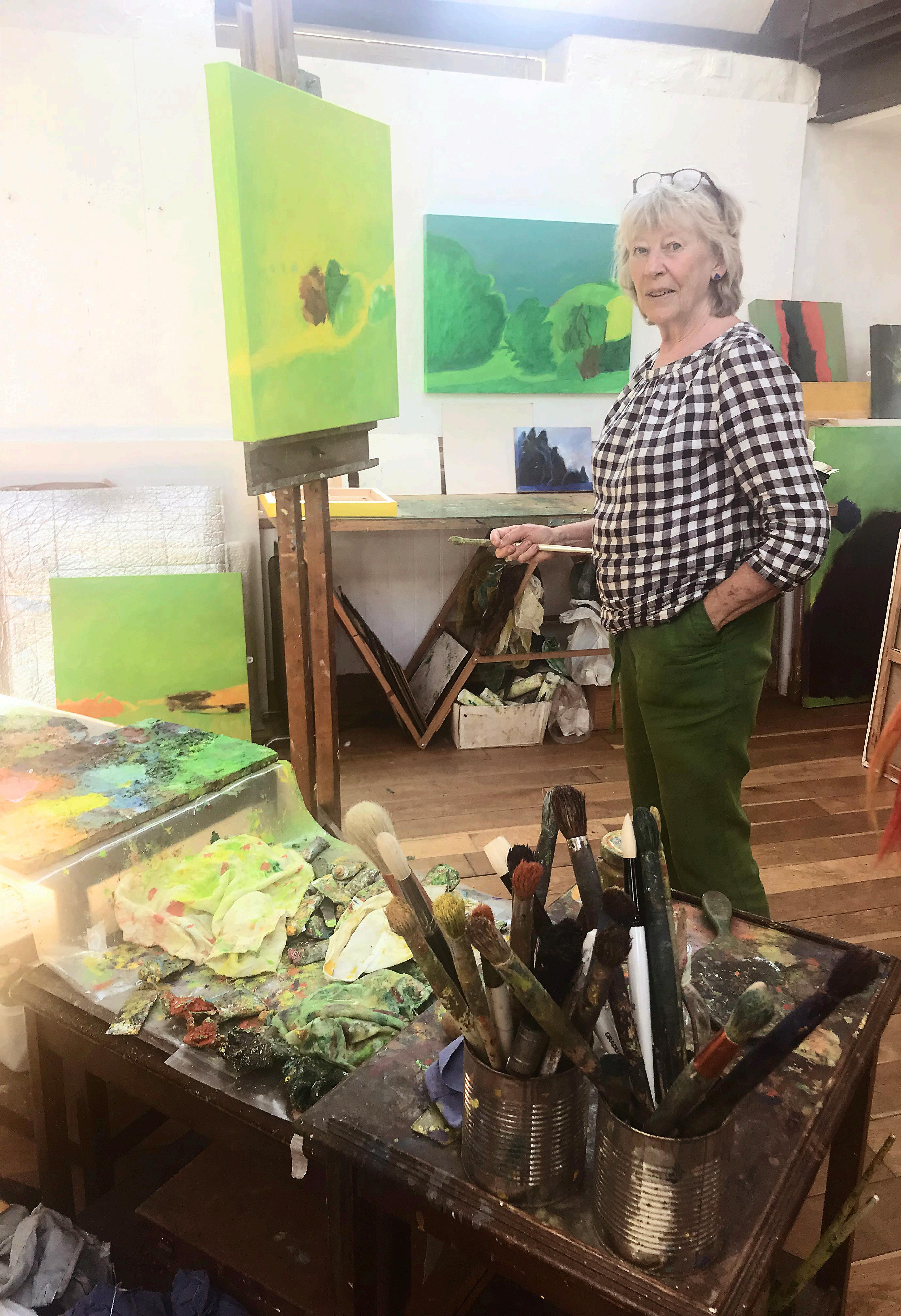
attention in a glance. It’s no good going out looking for something.
When I’m outside walking and I start to draw, it creates an appetite and I make masses of quick sketches to create an idea for a painting.’
Ursula draws attention to stunted and isolated hedgerows and the vast monocultures of modern farming methods. She wants the viewer to gain a different perspective of the landscape which is ‘revelatory rather than accusatory’ and to question our relationship with the natural world.
Vivid blocks of bright oil colour are used to bring landscapes to life, suggesting current agricultural practices and the gradual effects of climate change. The simplicity of the forms and use of the almost fluorescent colours within her
work are intended to elicit a strong emotional response in the viewer.

‘I was always a country girl’ Ursula tells me.
She was brought up in a
Yorkshire village until the age of nine when the family moved to Hampshire. But at an even earlier age, a painting she fell in love with in the art room at school decided her on a future career.
Following a course in fine art, where she was ‘taught how to look’, Ursula returned some years later as a mature student to Farnham Art College (now the University of Creative Arts) to follow a printmaking degree.
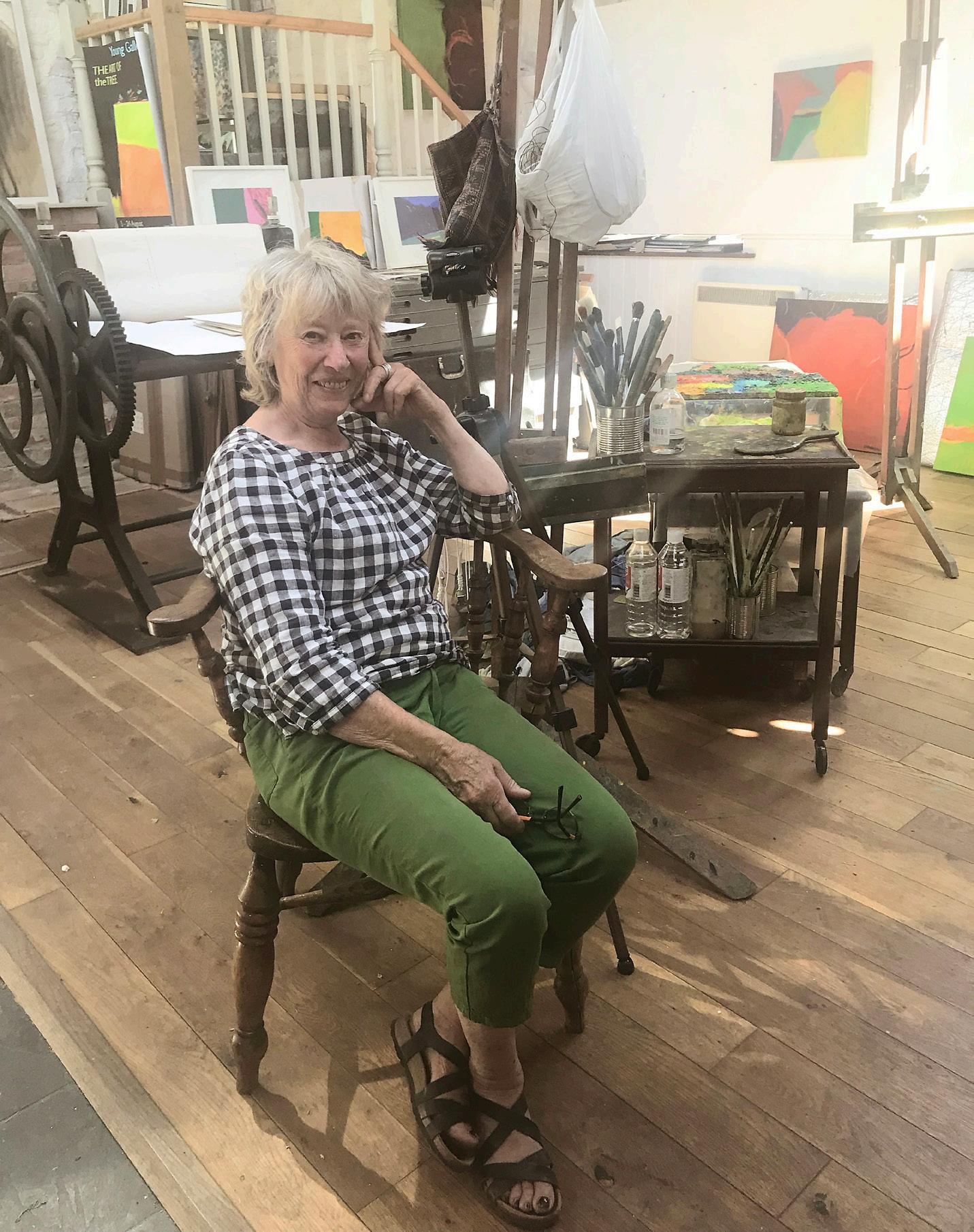
A ten year period of mainly printmaking followed, starting with very large monochrome etchings. But a desire to use colour made her search for another method of making prints. Carborundum is a gritty substance which, when mixed with PVA, creates a rough surface on the printing plate. This holds a lot of ink, and makes for rich velvety colours when inked up and printed. An initial base of colour is applied to the paper ‘to set the mood’ and the plate is printed with a very heavy Hunter Penrose etching press.
‘It’s hard work’ Ursula admitted, but the vivid results are well
It always comes back to colour in the landscape.
worth the effort. However, a desire for even more vibrant colours resulted in a return to painting.
Ursula is now planning a series of black and white drypoints. ‘It’s all about line, and it’s fun to experiment.’ Drypoint is a method that involves scratching an image onto a plate with a pointed tool. The incised line or area holds the ink and creates the image.
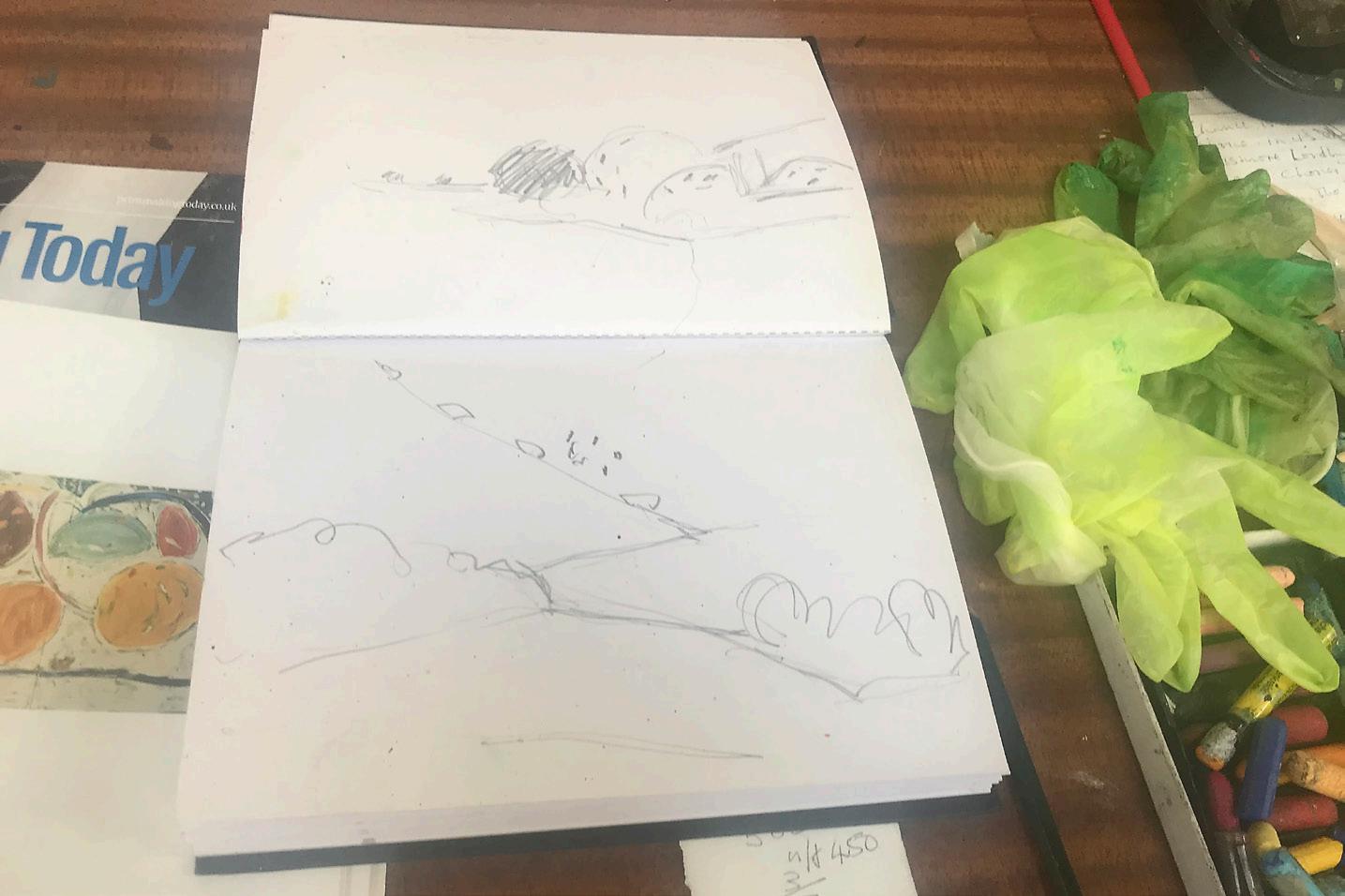
Ursula’s painting career really took off in the 1990s when she started selling prints in London. She had a lucky break after showing a large work at one of the UK’s most important art competitions – the Hunting Art Prize exhibition at the Royal College of Art. Subsequently, she received a letter from a woman who wanted to include her work in a new London gallery.
Ursula’s sound advice to young artists is ‘Go in for competitions! Keep at it. It’s a very competitive world now but it’s not a competitive activity. There’s so much luck involved.’
In 1996 Ursula was elected to the Royal Society of PainterPrintmakers, one of the world’s premier printmaking organisations. All of the society’s members are practising professional printmakers, elected
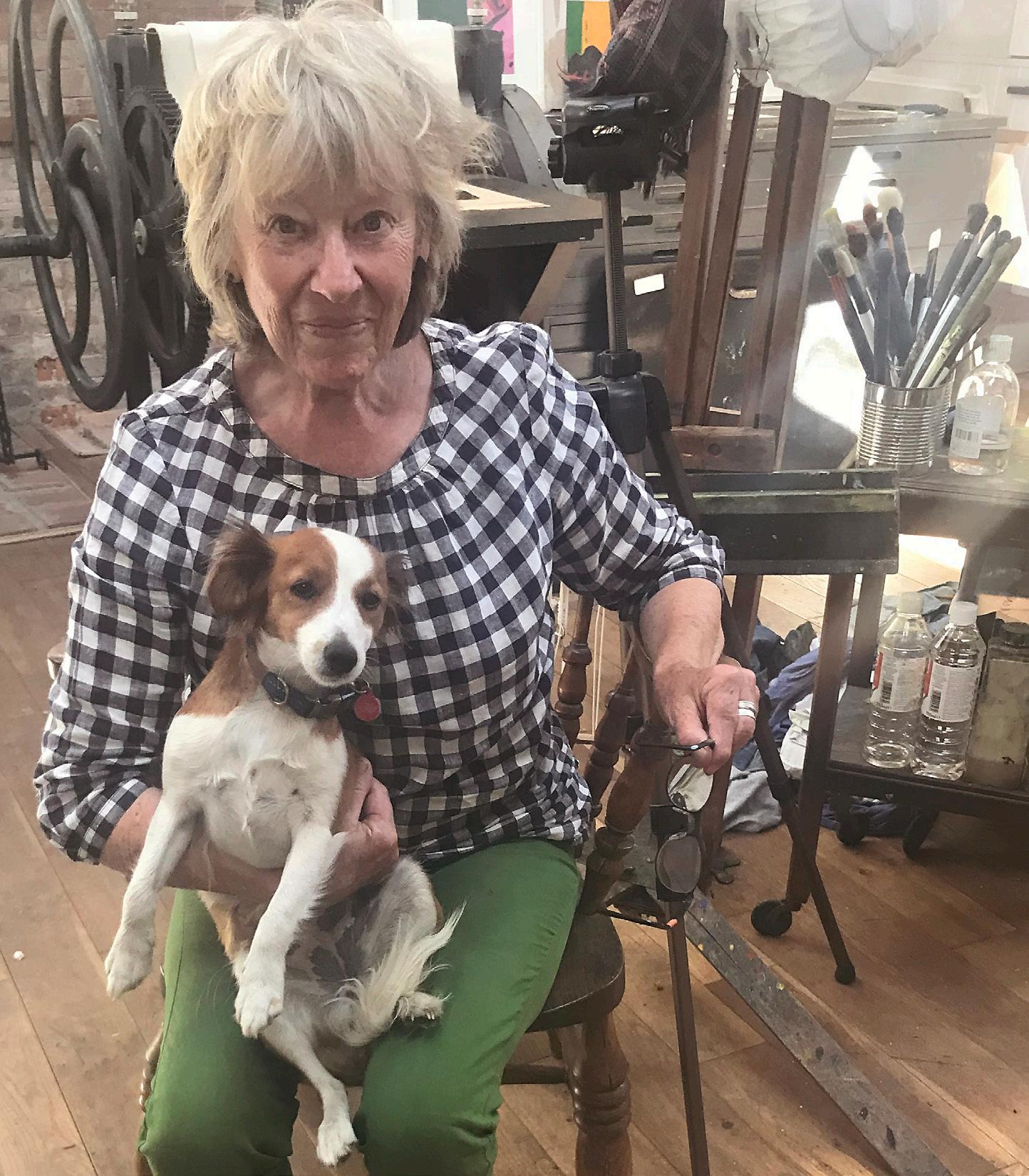
after a rigorous selection by a panel of their peers. Their home is at Bankside Gallery, next to Tate Modern, where they hold regular exhibitions showcasing the best in contemporary printmaking.
Ursula says ‘if you live in the country it’s harder to meet both your audience and the
major galleries.’ Currently her work is also shown at the Oliver Contemporary Gallery in Wandsworth.
A new exhibition is planned at Black Swan Arts in Frome with six other artists who live and work in Dorset and Hampshire. Group 7, as they are known, are all long-term practitioners who have a strong commitment to the media of drawing, painting and printmaking.
Another solo exhibition, at The Art Stable in Child Okeford, is in the pipeline for 2024. Hedgerows in the Vale may develop into the focus for this show, so look out for Ursula out cycling or walking with Cloud, camera and sketchbook in hand, examining the local field systems.
‘For me it always come back to colour in the landscape which catches my eye’
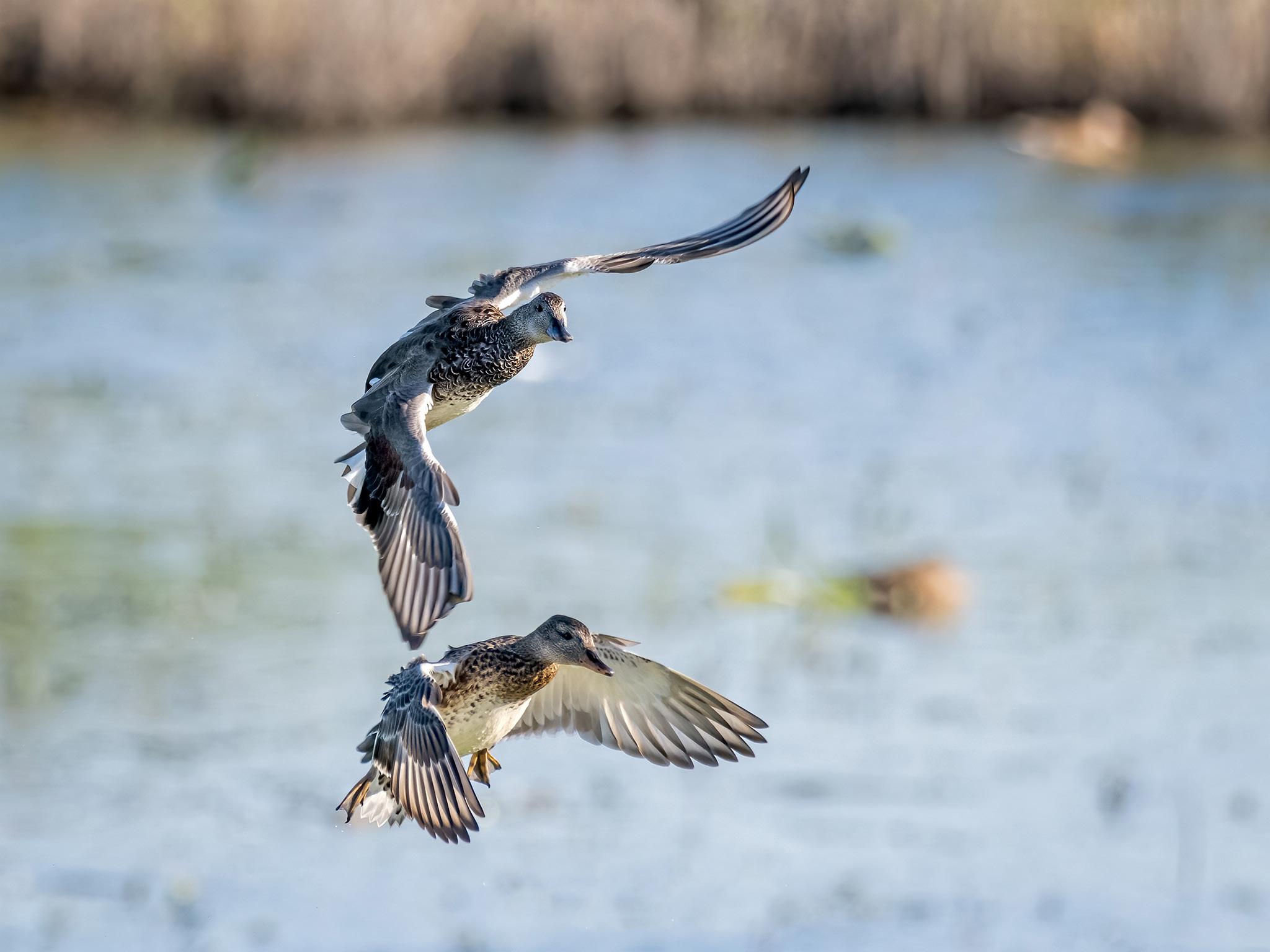

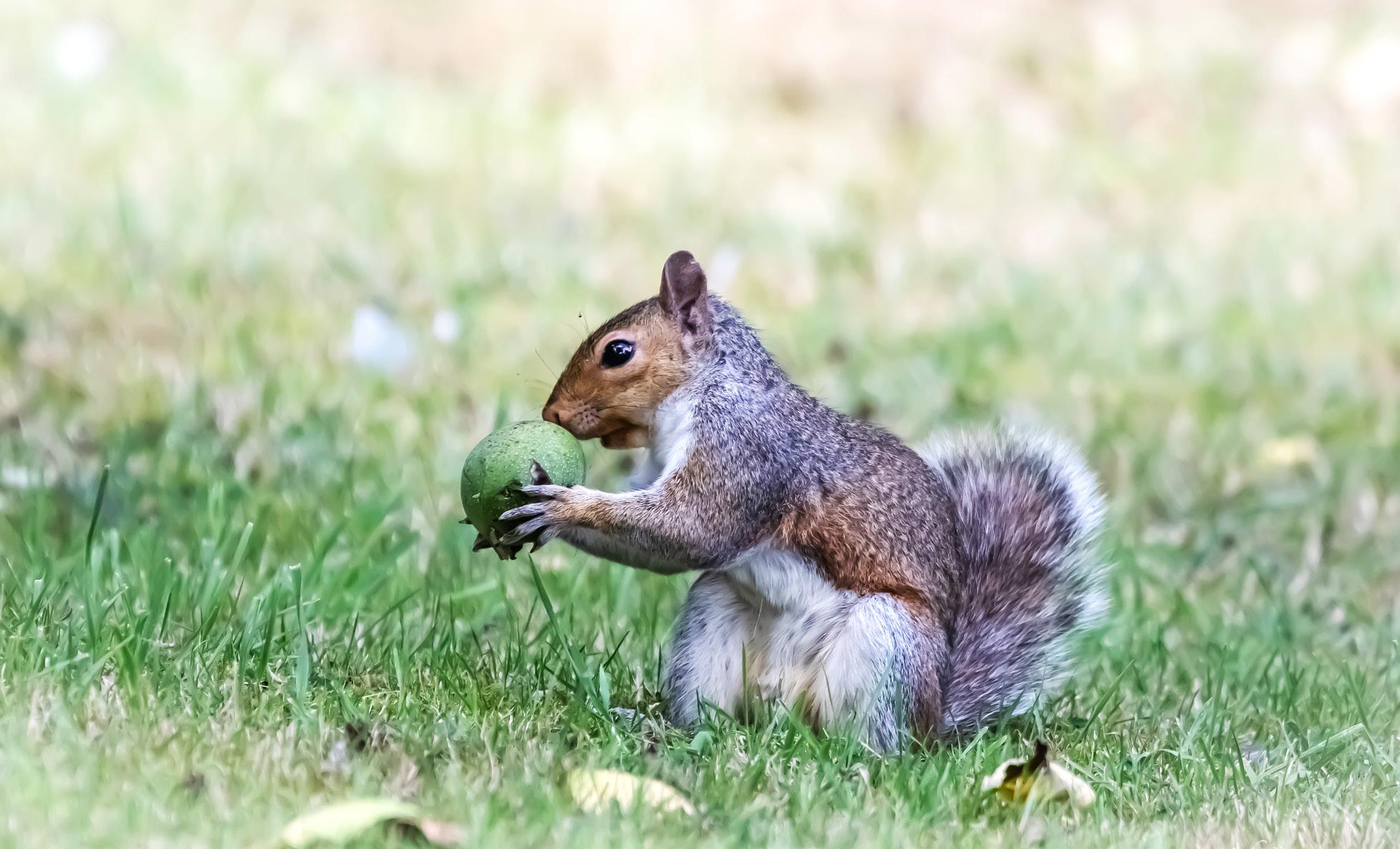

Walnut fiend Nicky Wicks
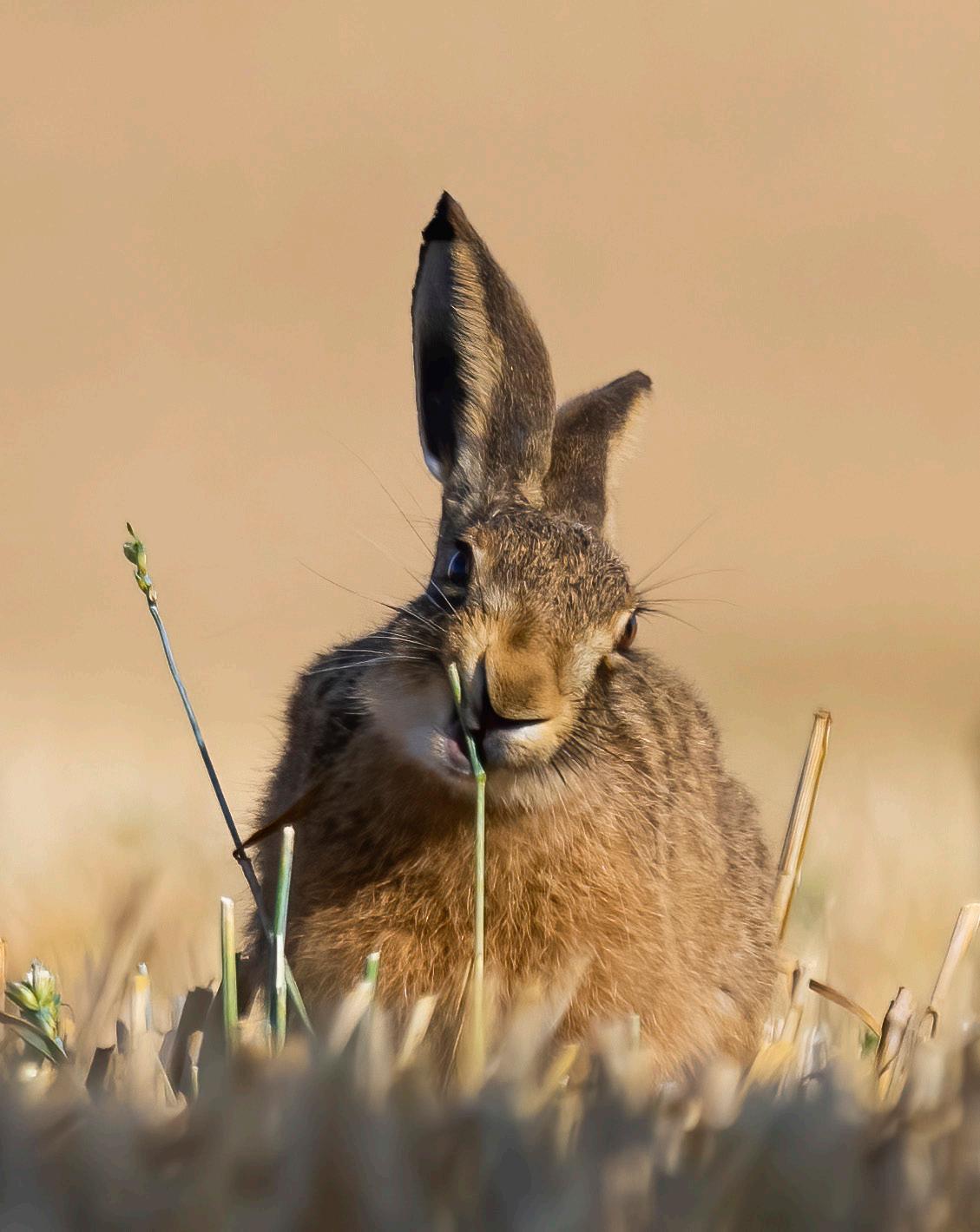
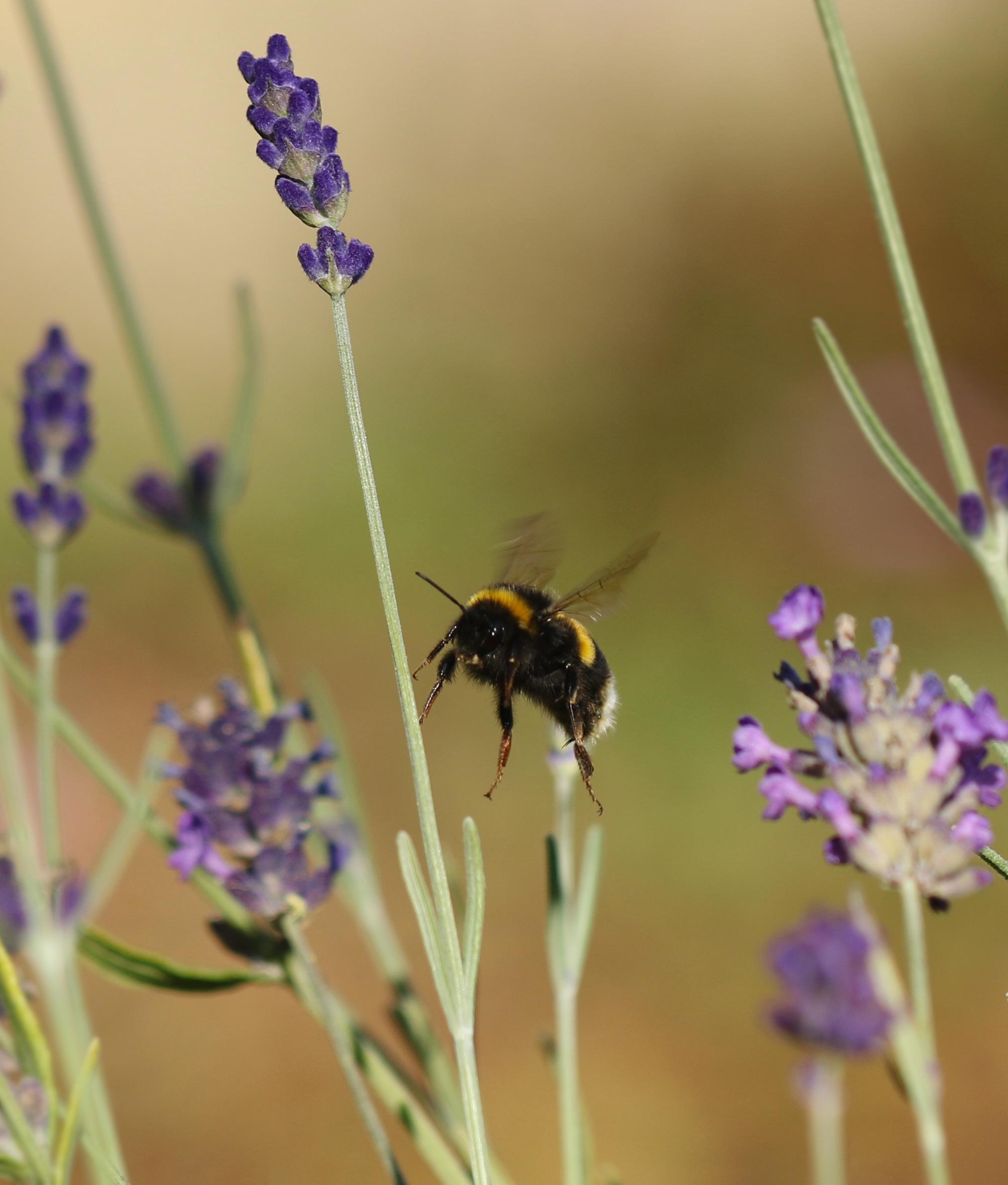

in the last
you’d like to join in, please do:
is
from
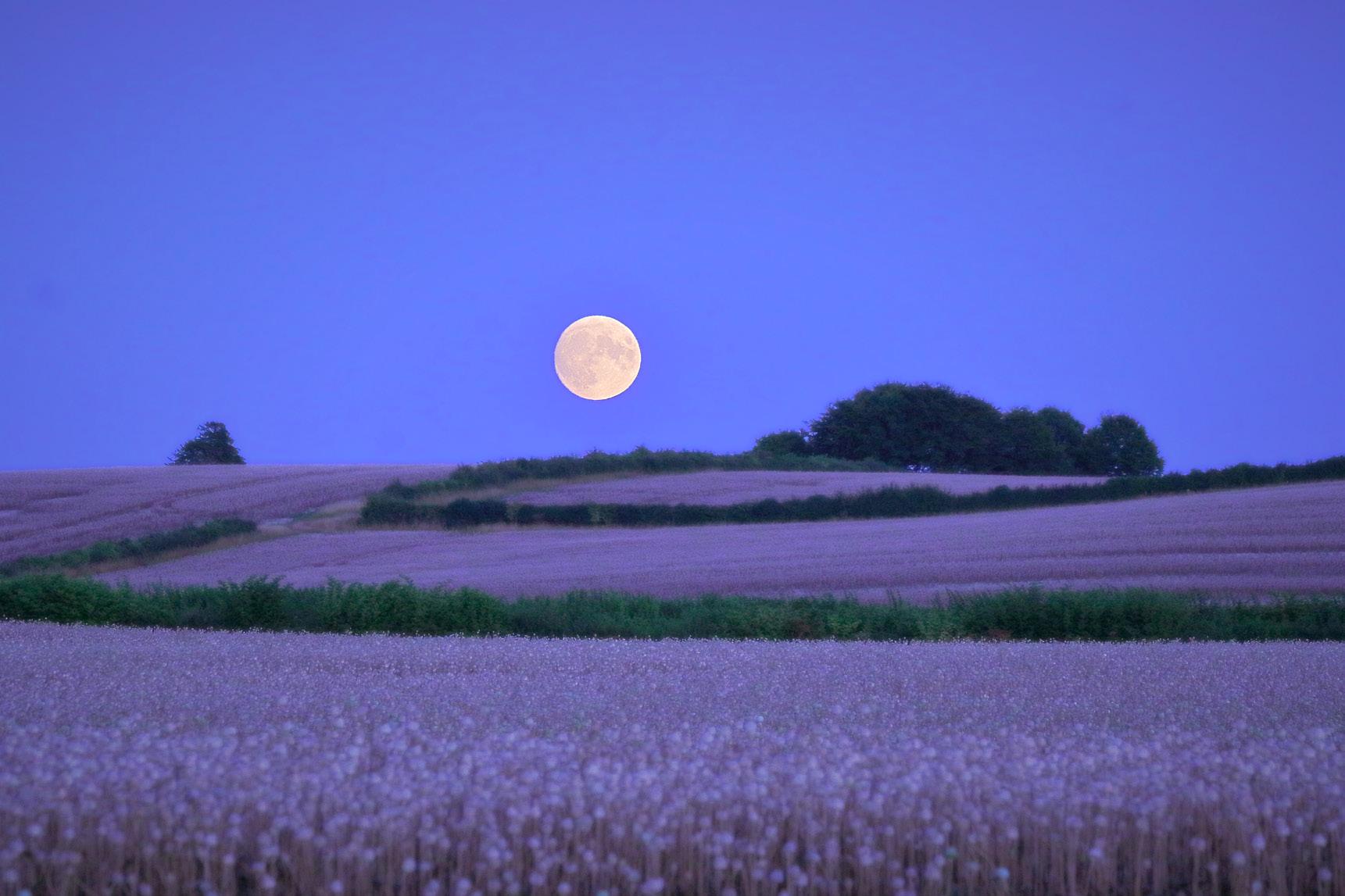
is that
have been
I see a bad moon arising Martin Shaw
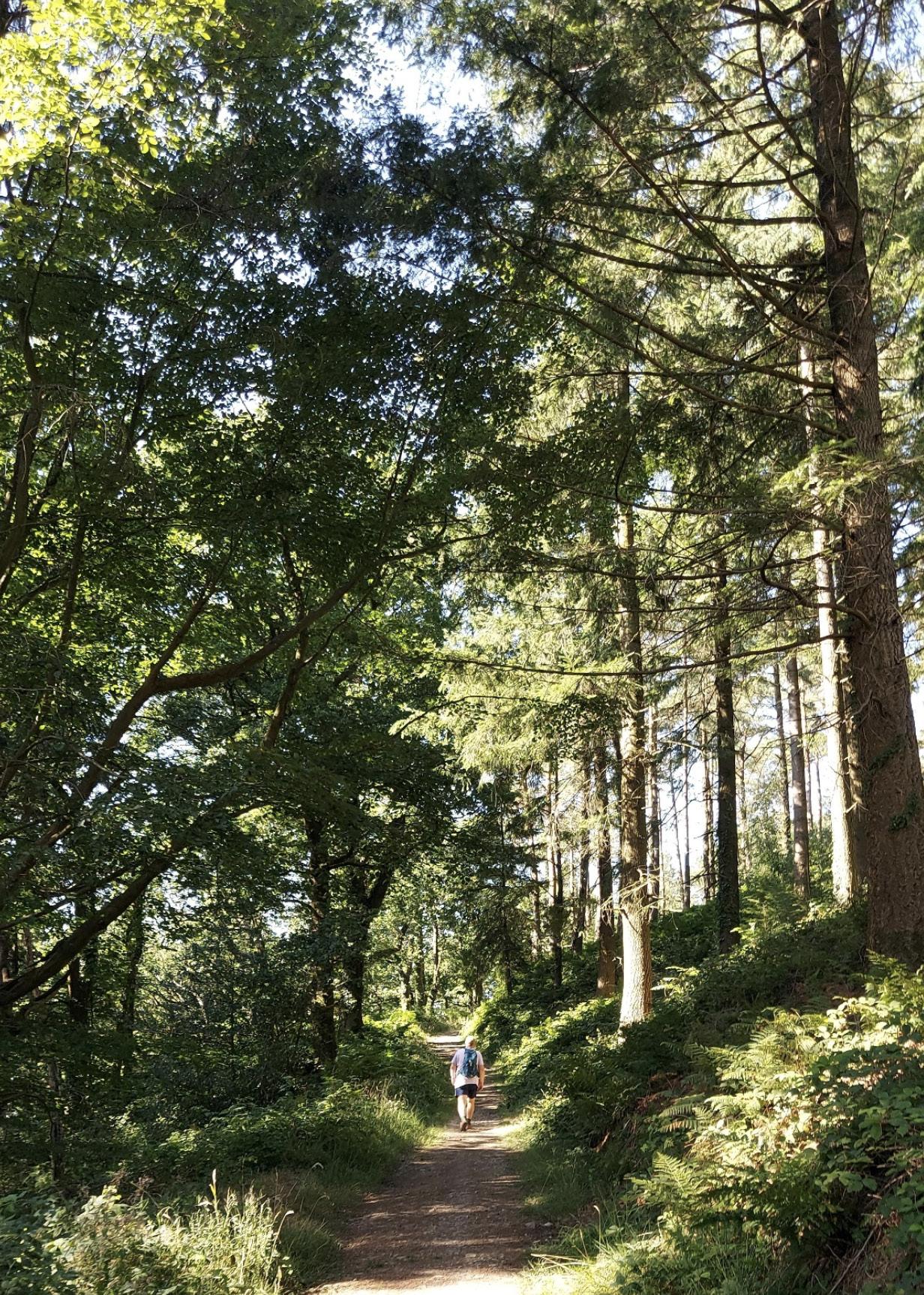
A gorgeous walk from South
through
spectacular
from
gallery; do pause to appreciate the
seems
Tower. The start of the Leland Way
through Moorwood
fine
on display as you walk through.
We have always created and recently walked the routes we feature (See all previously published routes here), so you know you can trust them. We aim for unpopulated routes with no roads and BIG VIEWS! You can see all our routes (including many not published in The BV) on Outdoor Active here, and all include a downloadable gpx file.
Giant guardians of the path across Kingsettle Hill
No maps required to find the route on the Leland Way - you follow this all the way to the forest
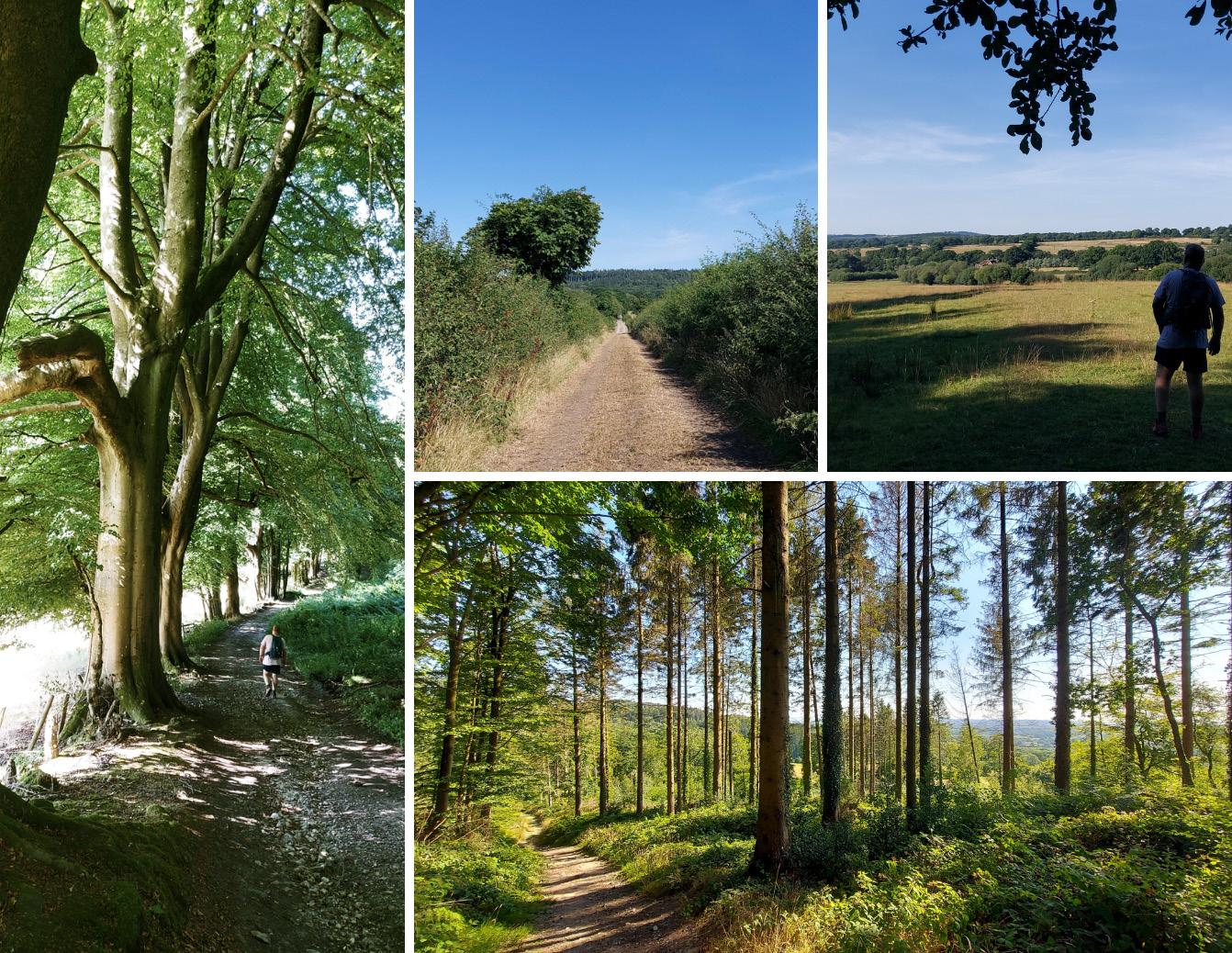
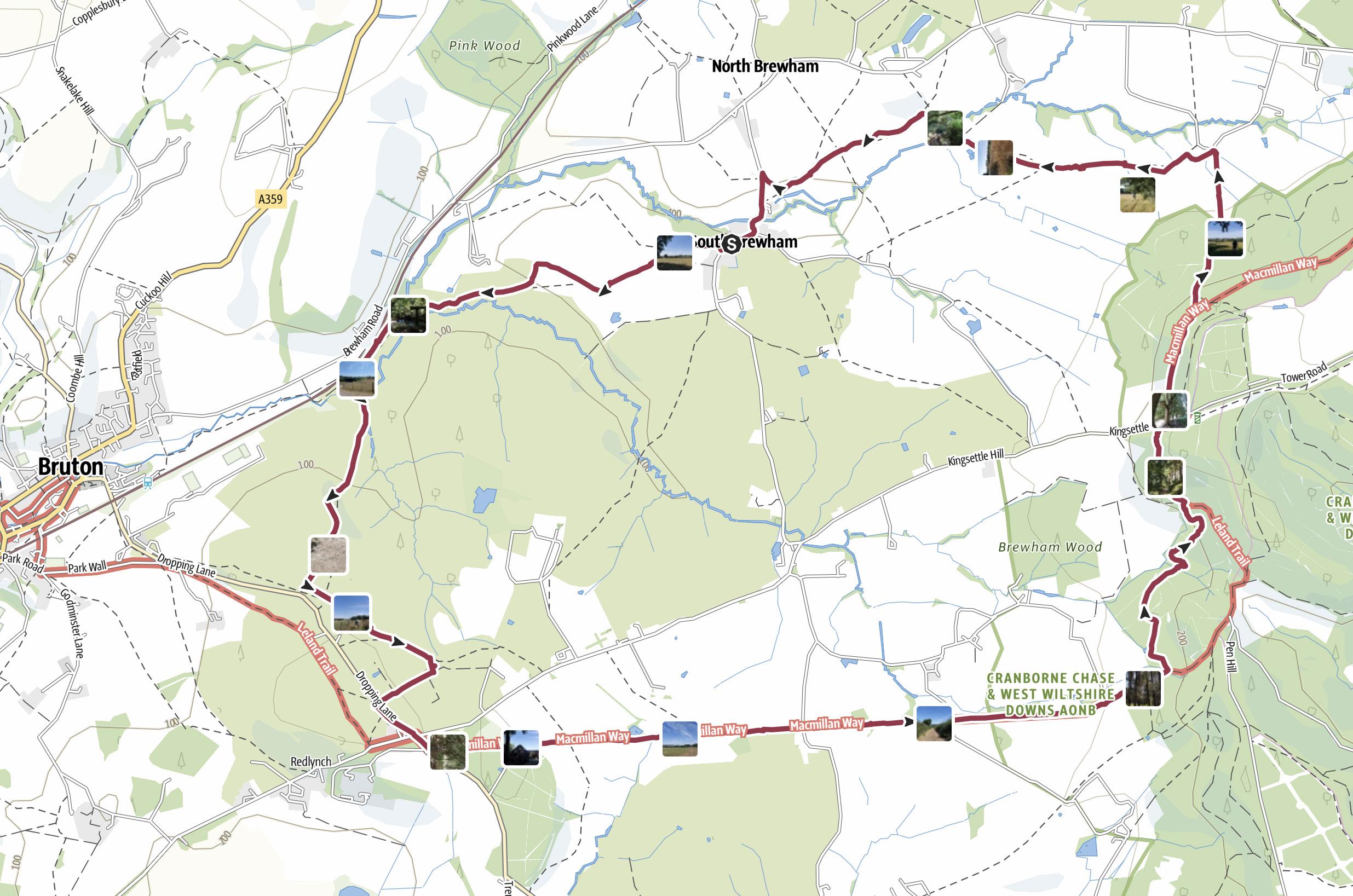
The end is in sight! looking back towards South Brewham
The climb through the forest up Aaron’s Hill was possibly my favourite part of the walk
Laura Wilson watched a therapist treat her horse – and gave up accounting to train as a McTimoney animal chiropractor
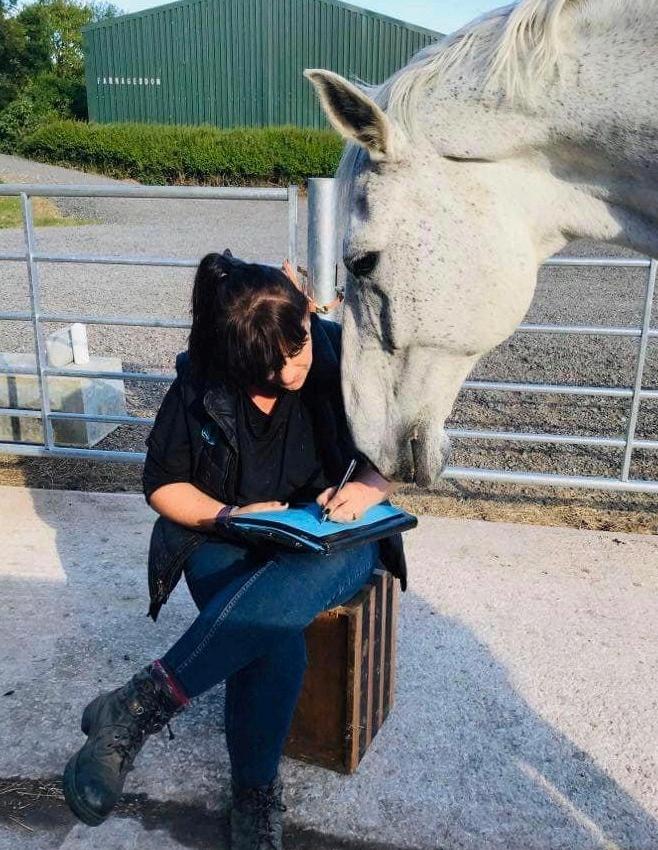
My event horse Cookie had a guarded prognosis from the vets. After a diagnosis of a hind suspensory tear and sacroiliac strain, coupled with less than ideal conformation, they said he was very unlikely to return to eventing.
I sought help and watched the incredible transformation that my McTimoney therapist Kazia Lyons achieved with him. At the time I was an accountant, but was inspired to retrain with the McTimoney Animal Association in 2014. Cookie was having treatments every six weeks from Kazia, and then when I qualified I took over. Nine years later he is still eventing (he’s 15 now), and we have had no recurrence of either issue. He had everything against him, and I am certain his regular McTimoney treatments are the reason he is still sound and well.
McTimoney is a form of chiropractic manipulation which is used to treat pain and dysfunction of the musculoskeletal system. The technique is non-invasive and gentle, and is readily accepted by animals. It predominantly focuses on optimising alignment of the spine and pelvis in order to restore correct function of the skeletal system, the nervous system and the surrounding soft tissue, resolving dysfunction and balancing the animal’s musculoskeletal system, restoring health and movement, soundness and performance.
I also incorporate various soft
tissue techniques into my treatments, including myofascial release, craniosacral work and massage.
I spend the majority of my time treating a huge variety of horses and ponies from all disciplines: eventers, show jumpers, racehorses (and ex-racehorses), riding and pony club horses, hacks, dressage, endurance, show … and some retired horses too. I also work with vets on rehabilitation plans
after injuries or operations, helping the four-legged patients to achieve a return to fitness.
Lance Dressage warmblood’s owner Liz Trowbridge called me to help with Lance’s rehab after a kissing spine operation a few years ago. It has been challenging at times, but it is so very rewarding to follow his return to work, watching him build muscle in the correct places and keeping on top of the inevitable little niggles that have presented themselves along the way.
‘Nine years later he is still eventing (he’s 15 now), and we have had no recurrence’Laura with gentle giant Calido
Liz says: ‘I needed someone who understands the physical demands and mechanics of an advanced competition horse , while always having the horse’s best interests as a priority. Laura is quiet with the horses but effective, completely reliable and I happily recommend her to everyone.’
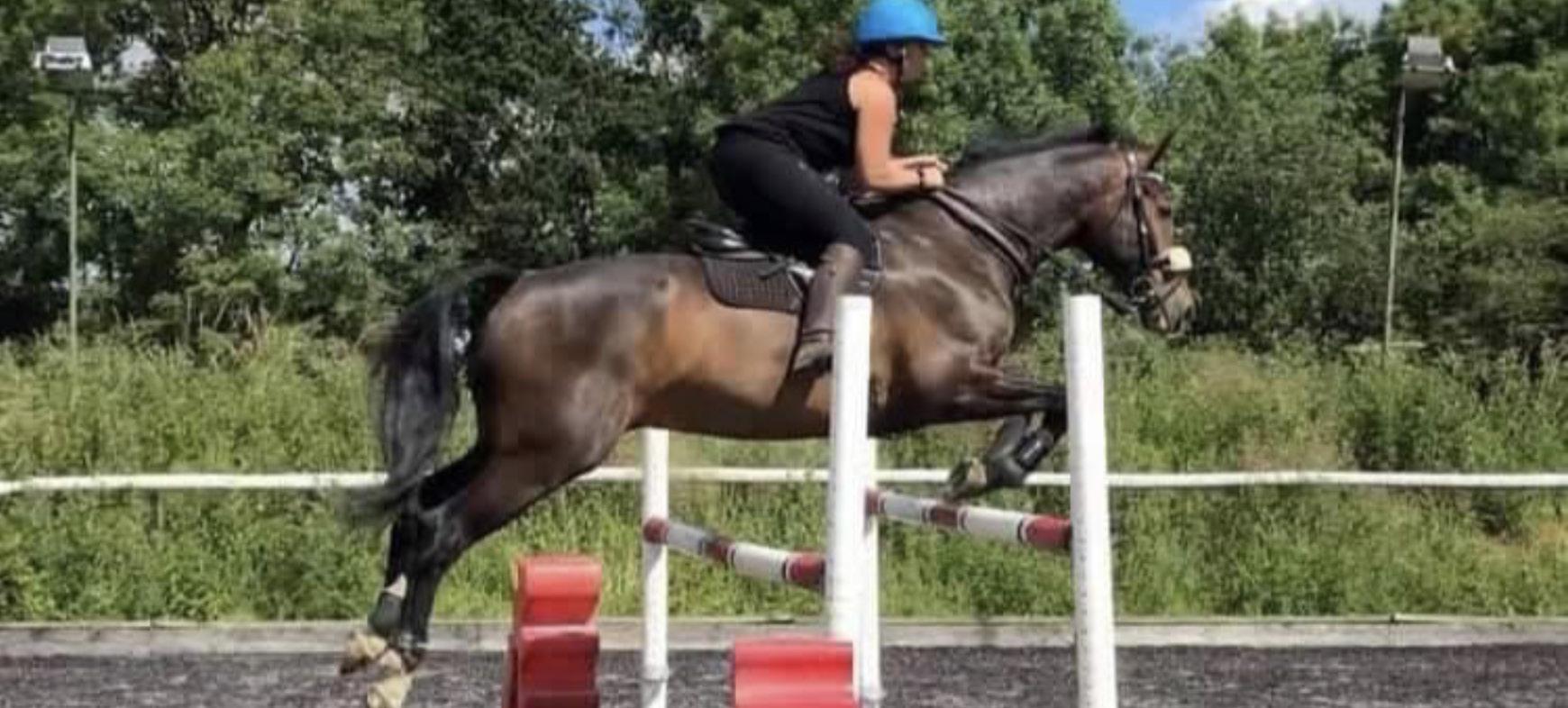
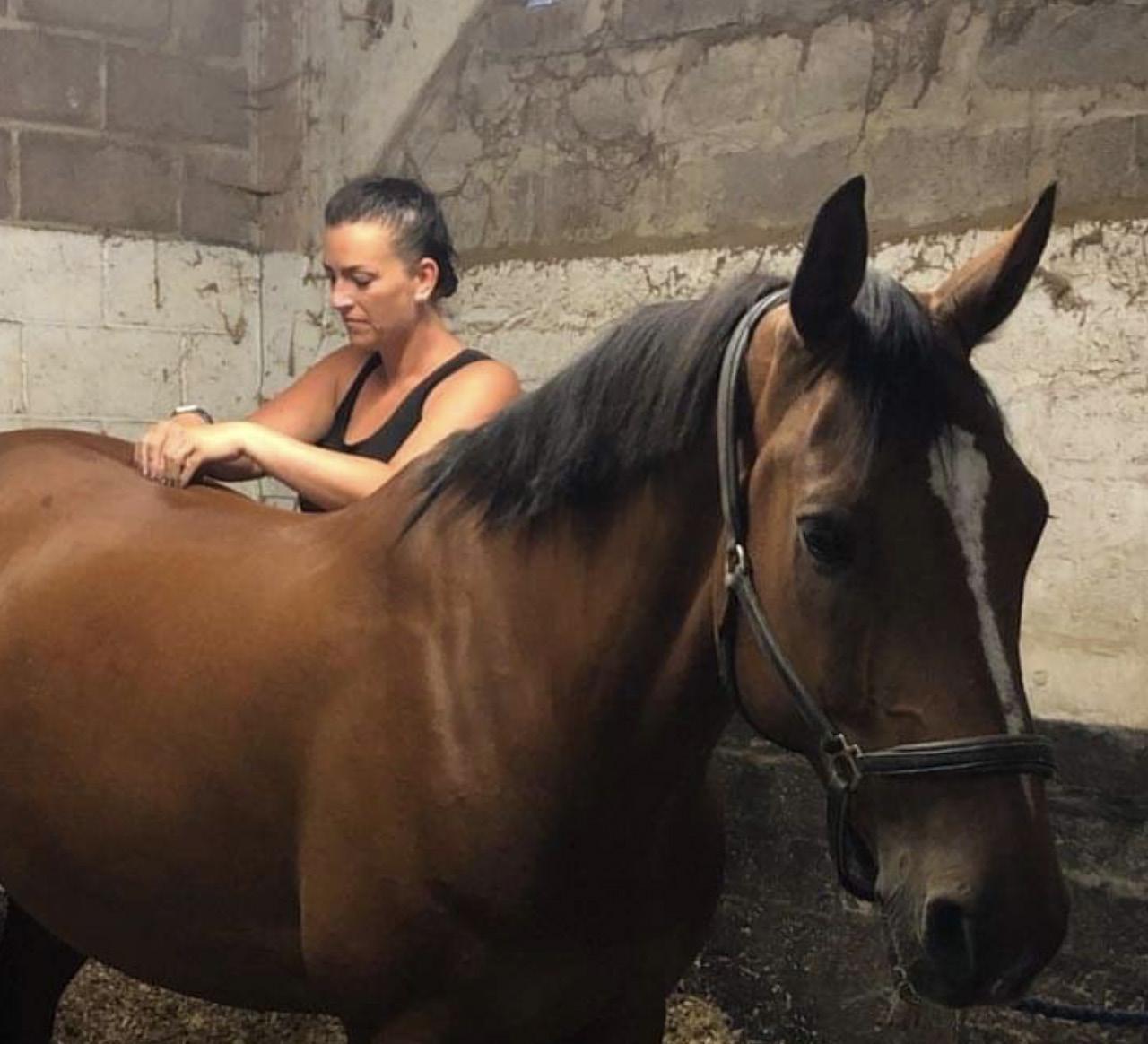
One of my most emotional cases was a couple of years ago, when a vet called me to visit a rescued Romanian street dog called Toto, who had a spinal nerve impingement. He needed a lot of expensive diagnostics and the vet suspected a possible operation, which sadly the owners simply couldn’t afford. Toto had been really struggling for weeks and I was his last chance before the unthinkable decision had to be made. He was also a therapy dog for the owner’s young daughter, so emotions were high and the pressure was on. When I arrived I could see that Toto was struggling to walk – he was very wobbly and his hind legs kept giving way underneath him, so he’d drag them along behind. If I hadn’t already had veterinary permission to treat Toto, I would have definitely walked away once I saw him. He needed a multitude of

adjustments from head to tail along his spine, and his pelvis was extremely rotated and tilted. I straightened him up and went away telling the owners to rest him and hope for the best …
The very next day I had an excited message from Toto’s owner, saying that he had made a full recovery and was now completely fine!
Toto had been fully restored to his former self after just one treatment and after an initial follow up I haven’t needed to see him again. I cannot explain how gratifying it was to treat this dog and give him back the quality of life that the owner thought was lost forever. Toto’s owner Clare Job says: ‘We honestly cannot thank Laura enough for what
she has done for our boy. She is amazing – I just wish I had called her sooner!’
I always say that I have the best job in the world. It is absolutely true – every single day is different. I’m usually out in the open air, and meeting people who care deeply about their animals. I am doing a job I love, working with animals and relieving their discomfort. It is hugely fulfilling.
Laura Wilson, McTimoney Animal Chiropractor BA (Hons) PGDip MMA Contact Laura on Facebook here or on laura@ laurawilsonmctim.co.uk
To find out more visit mctimoneyanimal.co.uk.
Laura treating ‘lovely Lance’‘Miracle’ dog Toto Cookie and Laura training
As weaning begins for this year’s foals, the stud begins to focus on sales, says Lucy Procter of The Glanvilles Stud August has disappeared in a swelter of dust, heat and flies. With more than 40 mares and youngstock on site, the business of protecting all of them with fly rugs (mesh rugs designed to help reduce the irritation of flies on horses living in fields during the day), would be impracticable and – in the extreme temperatures we had in August – even a light mesh fly rug would have made them overly hot. However, horses do help themselves. When sharing a field with others, they can be seen standing noseto-tail swatting flies off each other’s heads and bodies with their tails (we deliberately leave their tails long during the summer months to assist this). This summer three of our mares developed a novel fly-swat system, with all three of them standing nose-to-tail in a triangle, so that each could benefit equally from their constantly swishing tails! (see the fly triangle in action opposite)

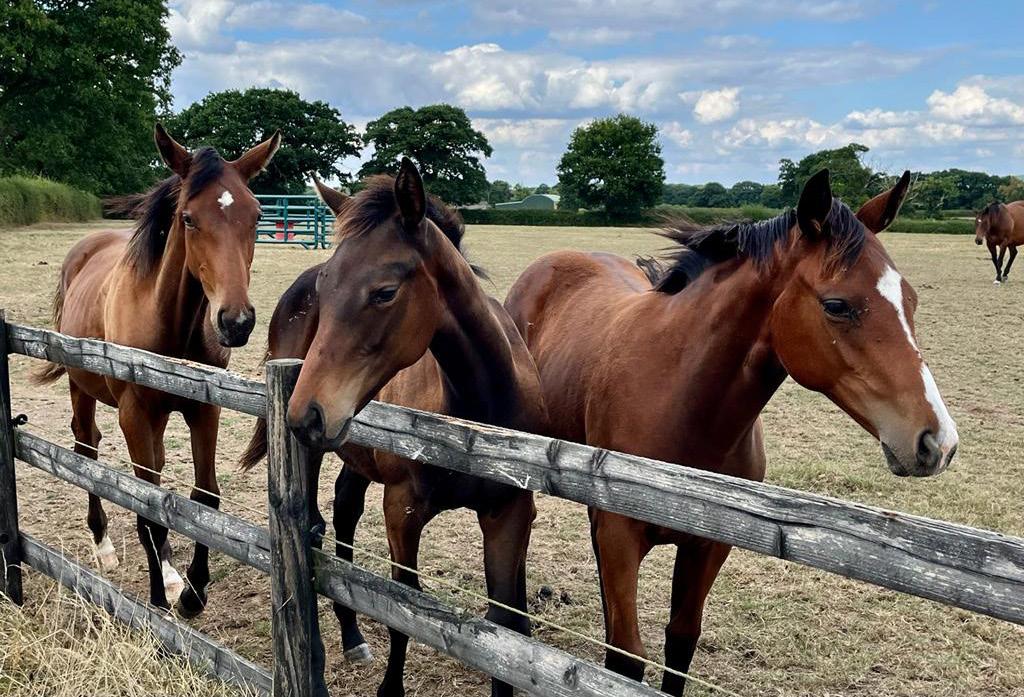
The foals tended to conserve their energy during the heat of the day, spending most of their time sleeping or drinking milk from their dams.
As soon as it became cool in the evening, however, it was time to play. The foals would start galloping around, bucking and rearing for the sheer fun of it, which was lovely to watch.
At the end of August, we started weaning the first foals, by now nearly six months old. Readers may remember from last year (see Lucy’s Sep 21 column here) that we wean in groups, removing two mares at a time from a field, leaving other mares to help steady the dynamics of those left behind. The foals usually settle very quickly with their friends and, as they have already been supplementing their milk with increasing amounts of grass and hard feed in the creep feeder, it is not too much of a shock to their systems. It was full circle for our foster mare Zeta who took on our orphaned foal at the start of the season. Having the oldest foal at foot, she was one of the first to be brought out of the field, and she will soon return to her owners. She is now back in foal herself, and we look forward to seeing photos of her new foal next spring.
We keep the mares on just a handful of nuts and poor grazing for the first couple of weeks after weaning to help dry up their milk supply. It’s important to keep a close eye on their ‘bags’ (the usual term for a mare’s udder); if a mare continues to produce large quantities of milk without a foal
to drink it, there is a danger of her developing mastitis, which (as many human mums can vouch ) can be extremely painful and difficult to treat. Once a mare’s bags have almost dried up, we move her to slightly better grazing and gradually increase her feed until we are happy that she is no longer producing milk.
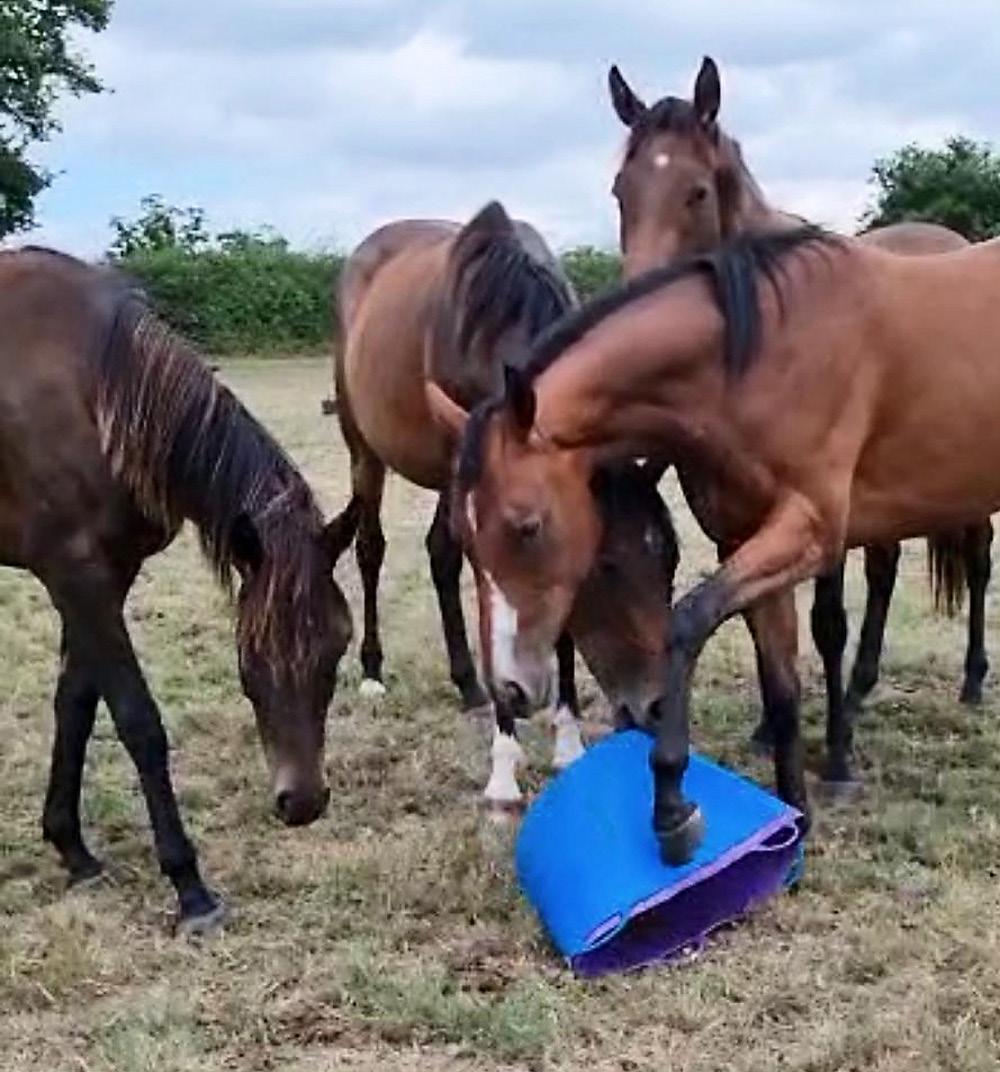
This is the time of year when the sales companies and bloodstock agents come to visit us to look at this year’s crop of foals. Tattersalls, whose main National Hunt (NH) sales arm is based at Fairyhouse in Ireland and whose NH foal sale is in November, and Goffs UK, based in Doncaster, whose NH foal sale is in January, both visited this month to see which foals might be suitable. Generally speaking, only foals born earlier in the year will be ready to sell in November. We have identified three foals that might make the trip to Ireland, and we will bring them into stables and start their prep work in September.
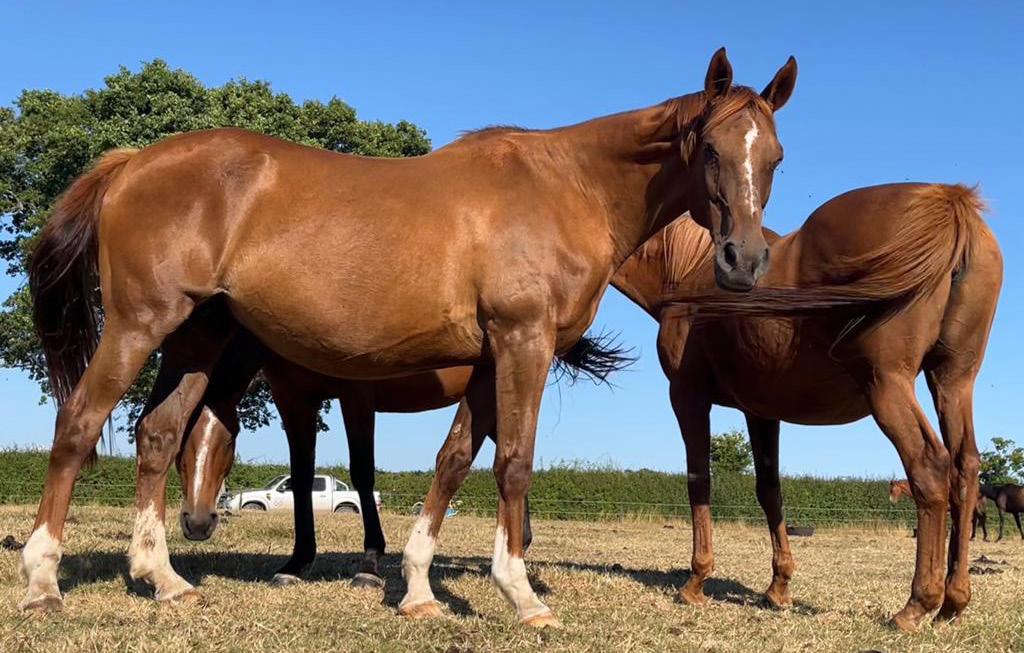
The two-year-olds that we were working with in July were lightly backed and ridden away in early August by our son Freddie, before being turned back out into the field 24/7 to eat, sleep and play – to be youngsters together until next spring when they will be re-backed and start working again. We got the youngsters backed just in time before Freddie went back out to the States to race ride for one of the leading jumps trainers based in Pennsylvania.
Meanwhile our daughter Alice, who works for
trainer Kieran Burke near Dorchester, had her first ride under rules at Windsor. Her second-place finish meant happy owners and trainer, and the prospect of further rides under rules for her. With a distinct hint of the arrival of autumn in the air and a noticeable shortening of the days, all efforts on the stud in the coming weeks will be focused on having everything ready for when the weather turns and stock needs to start coming in again at night.
I know we’re all just getting over the recent heatwave, but it’ll be winter before we know it!
Another boiling hot month. The ground was still like concrete and all that was left of the grass had officially gone. We have been feeding hay in the fields all summer. It’s been a slightly quieter month on the Eventing side. Cor Y Taran jumped double clear round West Wilts Novice, and I hope to take him to Osberton to the Six Year Championships at the end of the year. My top horse C Why won his first outing at British Dressage and had his first event in nearly a year at Aston-le-Walls. He and I were very over-excited, as he demonstrated down the centre line and subsequently bounced his way round all three phases. He is such a thrilling horse to ride, if a little unconventional; he has developed his own fan club whose members adore his


In search of better ground, we decided to make the long journey to Scotland and spent the bank holiday at the incredibly beautiful Blair Castle. We planned the 14-hour drive carefully, plotting a route with service stations where the lorry could stop so we could check the horses. Every stop we made sure their temperature felt good, offered them water and allowed them the chance to get their heads down to prevent the risk of them getting travel sick. Half way through the journey, we got both the horses off and allowed them to have a walk and a graze in a safe location. To encourage them to drink we placed apples into their water. They both travelled really well and arrived looking in great shape. We made sure we took
their temperatures on arrival, and took them for a long walk and graze before allowing them to rest in their stables. We subsequently had a week of thrills and spills.
Both horses are new to me this year and it was a big ask for them in their respective classes. Readers will remember that Equador MW was my Fedex parcel in the spring when he arrived from New Zealand. He was in the CCI3*L, and for where we are in our training I was pleased with a good dressage. We then had a fabulous round cross country until we unfortunately parted company in the second water. There were massive crowds, which he will never have seen in New Zealand and he was a little distracted. I also didn’t put his ears on as it was so hot – to my regret now and definitely a lesson learned! However we are both fine and I’m looking forward to getting him out Eventing soon.
Cor Y Taran is the horse I spontaneously bought from a Facebook message without actually having seen him, and he was in his first international FEI event. After a brilliant dressage of 29.9 he was lying third in a field of 100. The large crowds distracted him for the beginning of his showjumping round, leading to the disappointing and uncharacteristic dropping of some poles. But he settled and finished his round really
The August ground was so hard that Team Bartlett headed north in search of softer going for Equador MW and Cor y Taran, says Toots BartlettDouble clear for Cor Y Taran in the Novice at West Wilts
Toots and Cor Y Taran at Blair Castle, where after a brilliant dressage of 29.9 he was lying third in a field of 100
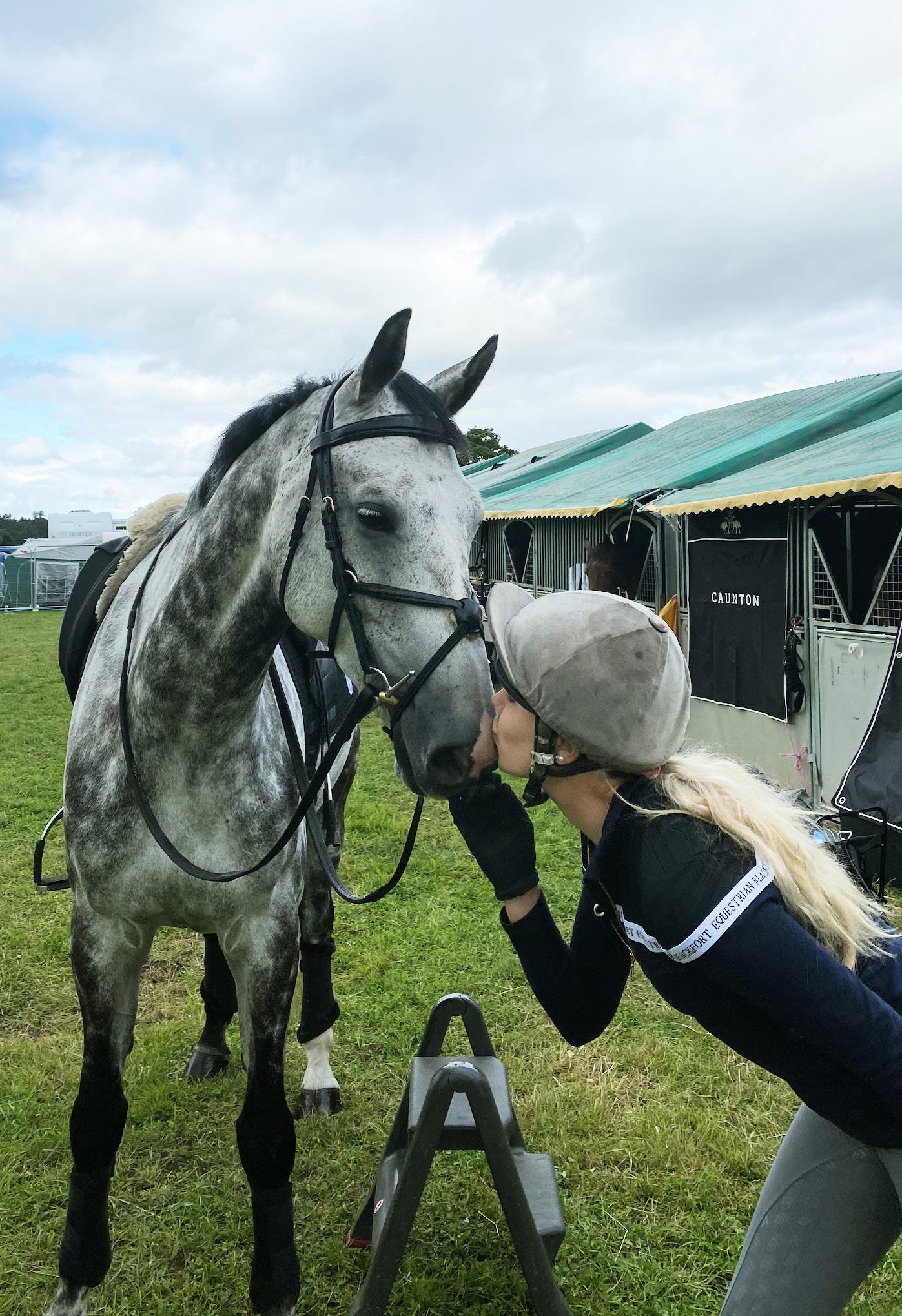
well. Having learned lots in the showjumping he came out and jumped a beautiful clear cross country inside the time. Competing in a different section of the CCI 1* was my beautiful partner of the last five years, Troy (Candyman Leanorth), with his new jockey Miai. I produced him myself and he is the horse responsible for my selection to the World Class on Youth Team. He has an enormous place in my heart. Miai has followed my guidance and instructions for him beautifully. I am truly delighted that he showed his incredible talent to win. It was hugely rewarding. Blair was a magnificent event –beautifully organised, incredible views and a great atmosphere. We also attended a drinks party in the castle and a ceilidh – it has definitely become one of our favourite events and we will be adding it to the yearly schedule despite the journey!
With the ground still so firm, and the end of the event season coming ever closer, we are down to three final events for 2022. I’m really looking forward to training hard and going out to try and smash the last month of the season!
I’ve already begun thinking about next year and I feel I might take a different route next year due to the increasing heat and its natural consequences of harder ground. I think I will try to get the Internationals done in the first few months. Potentially, I could then give the horses a two-week holiday mid-summer and bring them back out in the later part of the season. That way I could prevent them running so much on such hard ground. Also most of the overseas events are becoming
dressage and showjumping on an artificial surface.
This month we have to say a very sad goodbye to my wonderful groom Joel Hart, who is off to university. He has been an enormous asset this season and will be greatly missed. He will thankfully
return periodically to support and groom, and we are all very grateful to him for his good humour. I have thoroughly enjoyed working with him. We are consequently looking for a new groom to join the team – get in touch if you think you have Joel’s exacting standards and professional work ethic.
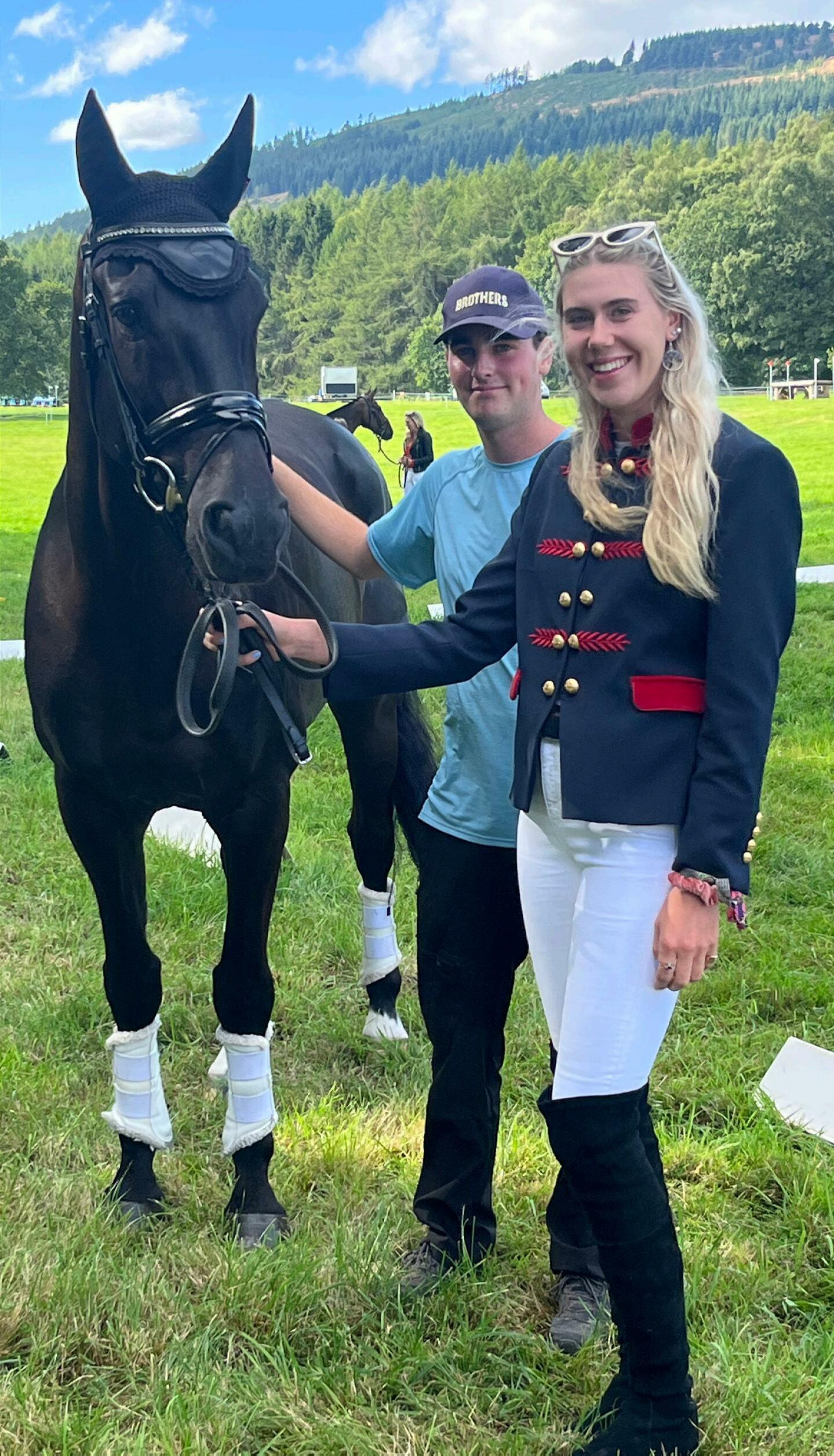
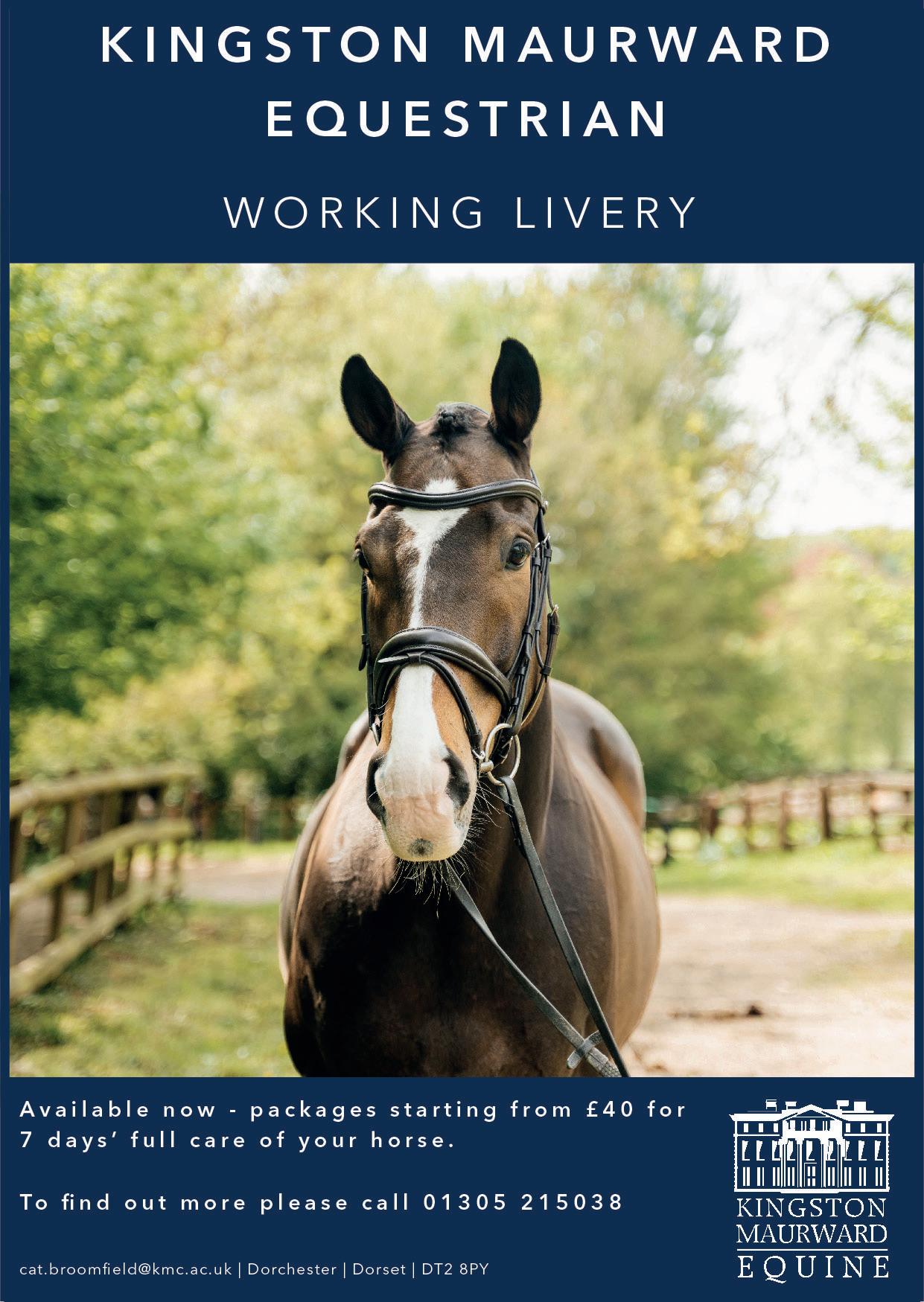
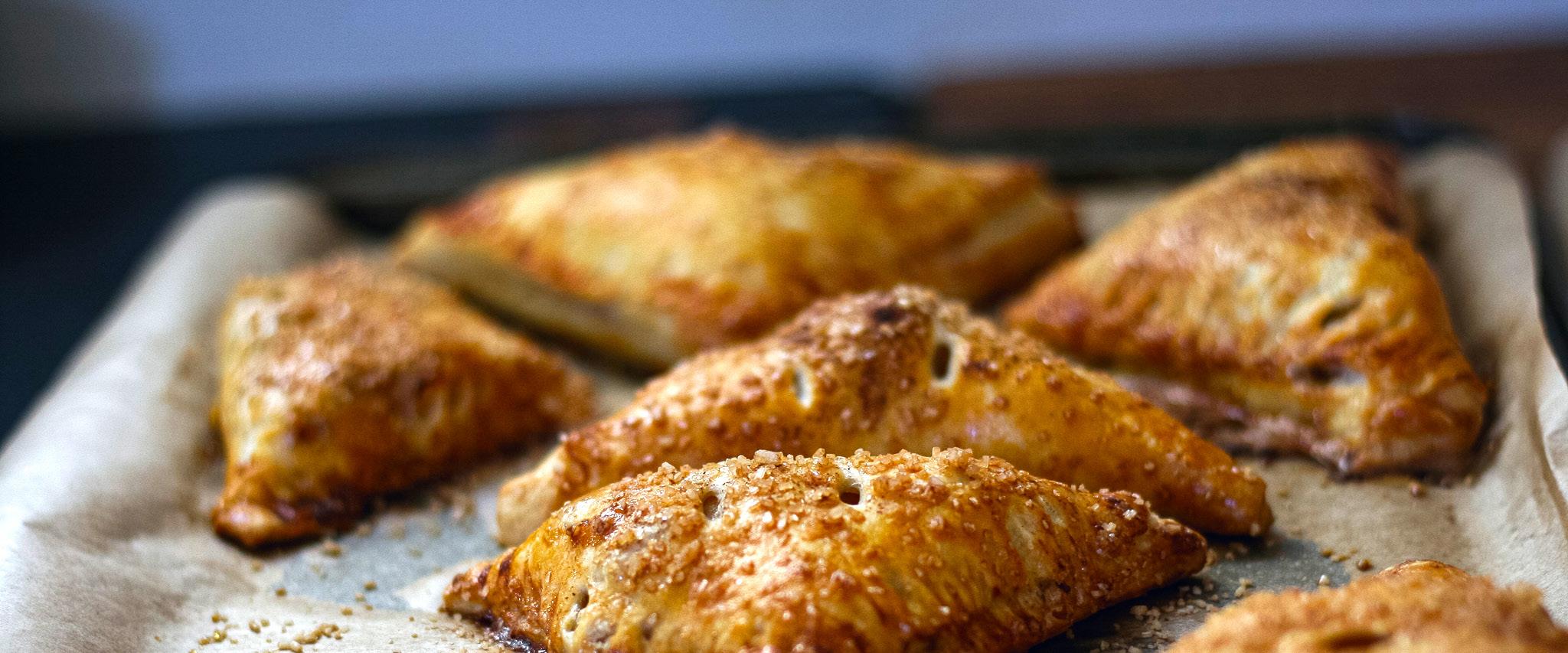
The hot and sunny summer will have been a blessing for all the parts of our lovely county that benefit from the tourist trade. After a difficult two years with the effects of the pandemic, to have full beaches and local attractions (and therefore full bars, restaurants and shops), will have been wonderful for all kinds of local businesses.
The weather has definitely made the last couple of months more interesting for our local farmers though. It still remains to be seen how much of an impact that will have on the levels of locally-grown produce in our shops. While some crops will have benefited – it ’s been good for the blossoming wine industry – others are struggling. If you want to show support for our local farmers and those who source their ingredients from them, then do try your local farm shops and delis and buy from them direct – even an occasional small spend helps if we’re all doing it. This recipe is made using apples which are just coming into season. Dorset has a wide range of apples and while some apple turnover recipes insist on Bramley apples, I would recommend you try any kind – sometimes the texture of the apple inside the pastry adds something wonderful to the bake, rather than just a soft inside. Heather x
• 2 packs of ready rolled puff pastry (fridge cold)
• 10 to 12 apples
• 1 tsp cinnamon
• 2 to 3 heaped tbsp soft brown sugar
• 1 egg (beaten)
• 1tbsp Demerara sugar to finish
• Peel and core the apples and chop into small pieces (0.5cm cubes).
• In a small saucepan, add the apple pieces, the soft brown sugar and the cinnamon. If you are using a sweeter apple variety then use less sugar here; you can always taste and add more if you need to. If using a sour apple variety, like Granny Smith or Bramley, then use slightly more sugar.
• Mix the ingredients well until the sugar and spice coat the apple pieces and then turn on the heat to medium. Gently cook the apples pieces until they soften. If you are using a Bramley apple, the apple pieces will completely lose their shape, but something like a Pink Lady will just soften to lose the ‘crunch’ when you bite them – this is what you are looking for. This will take 5-10 minutes and be careful not to let them burn on the bottom by giving them a stir as they cook.
• Leave this mixture to cool completely (you can make this stage ahead and leave in the fridge until you are ready to make the turnovers).
• Pre-heat the oven to 180º fan/Gas 5. Grease and line two baking trays.
• To make the turnovers, roll out the pastry and gently cut into squares – there are no rules here, the size of the square is up to you. Some love a huge turnover, some like little turnover bites.
• Dab a little of the beaten egg around the edge of the squares. Place the apple mixture onto one diagonal half of the square and fold the pastry over to make a triangle with the mixture inside.
• Press down the edges with a fork.
• Carefully move them to the baking tray. Brush beaten egg across the top and sprinkle over some of the demerara sugar.
• Bake for 15-20 minutes (depending on how large they are) until crisp and golden brown.
Heather Brown is on the committee of the Guild of Food Writers; she is a home economist with a passion for Dorset’s brilliant foodie scene, as well as a dab hand at fixing websites, and with a penchant for taking a good foodie photo. Heather runs Dorset Foodie Feed, championing Dorset’s food and drink businesses, as well as working one-to-one with clients.
 Image: Heather Brown
Image: Heather Brown

To be honest with you, this summer was a difficult one. As I discussed last month, heatwaves and drought aren’t really ideal when you’re trying to care for thousands of plants. We were constantly fighting an uphill battle, but a huge credit has to be given to our staff in the glasshouses, plant nursery, and all across Thorngrove. With all the extra watering and care that was required, thankfully we didn’t take too much of a hit with our beautiful plants – many of them looking as beautiful as ever. But it really was a stark reminder just how much of a task it can become if that ‘great Gritish summer’ is actually lacking in its signature showers!

A huge thank you to everyone who stopped by our stand at Gillingham and Shaftesbury show. It was a glorious day in the end, despite some worry of storms, and we always have such a brilliant time at the show. We were so impressed by what many of the local businesses had
to offer, and a special well done goes out to The BV for producing the official G&S Show Magazine
It really did feel like such a special community event, and it’s occasions like this which remind us why we do what we do. We hope you enjoyed it as much as we did!
We now look ahead to the autumn. It’s planting season, so don’t forget your bulbs! We also have lots of bedding for baskets, borders, and planters; your garden doesn’t have to be any less vibrant. We’ll be swapping out the begonias, petunias and geraniums for pansies, primroses and violas to name a few. The

cyclamen are making themselves known too, and it won’t be long before their bright colours are flooding the glasshouses. Another sign of the new seasons … and yes … even that festive one … it’ll be here before we know it!
Coming up in October we’ll also see the return of our Hanging Basket Workshops with Chris Francis. So keep your eyes on our website and social media in the next week or so for dates on that. Join for a demo, and then get creative with our gorgeous selection winter basket plants, and take home something unique that you put together with the expert guidance of Chris. We’d love to see you there!

The Thorngrove team aren’t terribly sad to see the end of the heat, and are eagerly looking ahead to planting season, says Kelsi-Dean BuckThe cyclamen are appearing

As the plot breathes a sigh of relief after the summer’s heat, Barry Cuff shares how his plants fared though the drought, and the impact on his harvest
We picked our first sweetcorn cobs (Swift) on the 25th August. They were on the plate with lashings of butter within four hours of harvesting! The drought has meant shorter plants and we do not expect to gather more than 50 cobs from the 40 plants. In a normal year we would expect to have 60 to 65.
Throughout the heat, our plot was watered daily, mostly early mornings around 6am. Taking turns with another plotholder to pump from the well, we have been able to keep the 1,500 litre tanks and troughs filled. We have seven tanks on the allotments, all of which supply troughs fitted with ballcock valves. To date our 14 foot well has not run dry and checking daily water levels we have had about eight foot of water consistently. The heat has had different effects on our crops:
Both mangetout and shelling gave up producing much earlier than usual, and a second sowing of mangetouts (Purple Magnolia and Carouby De Maussane) performed badly.
• Carrots and beetroot
Successional sowings of both did well. A last sowing of Early Nantes was made on the 14th.
• Celery and celeriac With copious amounts of water both are making good growth
• Runner and French beans Again with plenty of water both are producing well now temperatures are lower. Both stopped producing pods on the hottest days.
• Leeks
Our Musselburgh were planted out in mid-
July. They are doing well as they have received plenty of water. A few had leek moth damage but appear to have overcome it.
We only grow Little Gem and sow once a month in plug trays, planting out when large enough. These have been watered twice daily on the days the thermometer hovered around 30º.

• Brassicas
All have been well watered. All plants have waxed up giving them a bluish tinge – this helps them conserve moisture. Despite the fact they have not been protected from the cabbage white butterfly, there is little or no damage. I wonder if the waxing acts as a deterrent? It has certainly not deterred whitefly which is very bad at the moment.
We picked two very small curds of Cheesy cauliflower on the 26th. Normally these are not ready for at least another month. Under stress from the drought the plants are wanting to produce seed early.
Courgettes have been slightly less productive than a normal year. Among the forest of squash leaves, however, we can see some very large fruits forming of both Crown Prince and Butterfly butternut.
We have also kept our flowers well watered as they attract the bumblebees, moths, butterflies and hoverflies. Some of their favourites are tithonia, cosmos, Spanish flag (Mina lobata), Grandpa Ott (Ipomoea purpurea) and larkspur.

It’s September – if your garden has survived the summer, there’s still watering needed, planting to begin, and maybe no deadheading this year
As mentioned last month, watering is something everyone is going to need to pay close attention to, particularly if there are lots of potted plants around the garden. See last month’s article for more info and handy tips on this.

As September quietens down, it’s a good month to look at ways we can help the wildlife in our gardens.
Why not try adding a log stack in a sheltered corner. Logs can usually be sourced from tree surgeons, landscapers or firewood dealers. Native tree logs are best, but any will do. They can be piled up any way you wish, but a more concentrated stack has more opportunities for wildlife. Log piles can also benefit from having an old carpet on top of the pile. This will help create warmth and a drier place for insects, frogs, hedgehogs and even birds to live.
There are numerous hedgehog ‘hotels’ available to purchase – or you can make your own.
Position one under the log pile to provide a safe place for them to hibernate. here are many online videos showing how to do this.
The seedheads of teasels, lavender, verbena and rose hips are all particularly good for wildlife. If you can, stop deadheading roses to allow the hips to form, providing food for birds in the winter months.
Leave patches of grass in corners of your garden to ‘go wild’. Try to refrain from using pesticides and wherever possible, control slugs and snails organically,
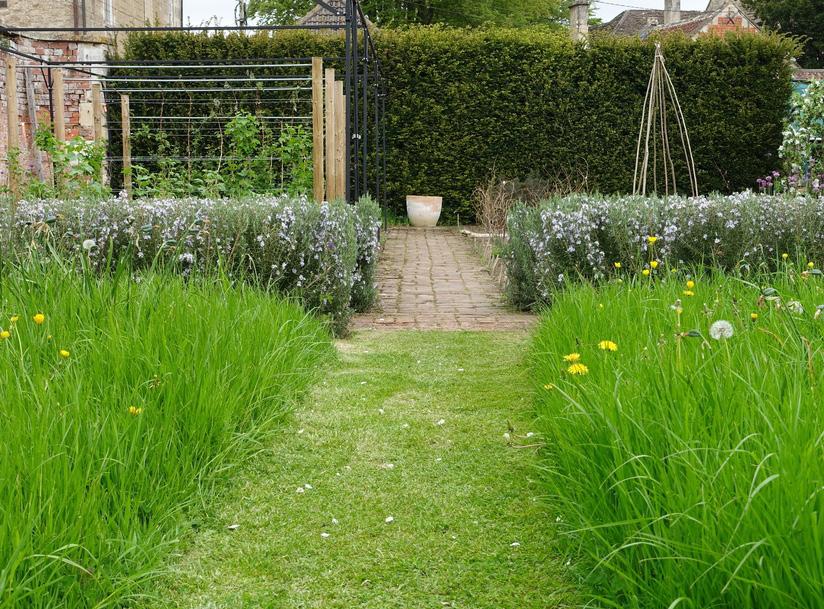
Bats are in significant decline and they need all the help they can get. There are lots of things a gardener can do to encourage them – planting night-scented flowers and building a pond will encourage the insects they feed on, as will letting your garden go a little wild. Having linear features like hedgerows and tree lines help them too. Domestic cats are the main bat predator in the UK – keeping cats indoors at night, particularly around
dawn and dusk when bats are emerging and returning to roost, will help protect them. If you erect a bat box, ensure it is high enough (at least four metres, if you can do so safely). The bat box should be away from artificial lights. See bats.org.uk for lots of advice on supporting bats in your garden.
• Continue to feed and deadhead hanging baskets if they have survived all that heat!
• Prune climbing and rambling roses.
• When we get some decent rain and the soil becomes
– daffodils, crocus and hyacinths can all be planted now.
September is a month of abundance, even after a summer drought, says foraging expert Carl Mintern as he enjoys the literal fruits of the season
This year has been a test of water management for both us humans and the natural world, with droughts seen across much of the country and record temperatures to boot. Indeed, many of our trees have decided to shed brown leaves as early as mid-August, giving some areas a very autumnal look and feel already.
I made meadowsweet custard by infusing my goat’s milk with the flowers; an almond flavour with hints of vanilla.
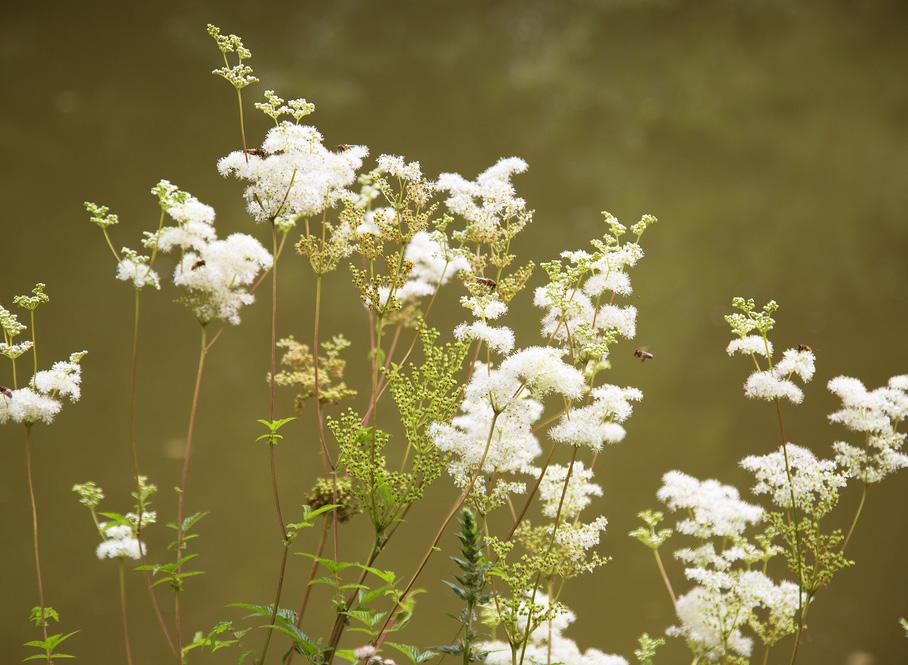
I, along with you I am sure, am hoping that the coming weeks and months give our surroundings a chance to recover from this summer with some muchneeded rainfall.
I have also noticed that many of our hedgerow harvests seem unaffected by the conditions, with a bumper year for blackberries and also many nut trees looking extremely bountiful. One such tree is the walnut (Juglans regia), a prized tree in the forager’s inventory.
While many people are surprised to hear that we can go foraging for walnuts in the UK, the walnut tree has been growing here since Roman times and can be found in many parks and larger gardens, as well as on roadsides. Indeed, it is
one of the things I will often spot from my car on journeys all around the Blackmore Vale and surrounding area.
As with most nut trees, the trick is getting to the ripe nuts before the squirrels, who are particularly adept at outwitting us human collectors when it comes to timing our harvests. Ideally you will wait until the shell has started peeking through the green husks which are in clusters of two to five. They are green and oval in shape, looking a little like a lime from a distance, and inside is the wrinkled seed. As the nut ripens, the shell forms and hardens around it. Once collected and dried out it can be stored for up to a year.
In the world of foraging, nuts
hold a special place for me, alongside mushrooms, as they can form the centrepiece of a meal and offer a huge amount of protein and other nutrients. As such, it should come as little surprise when I say that the walnut tree is by far my favourite tree to find on the landscape.
The next plant I wish to share this month is meadowsweet, (Filipendula ulmaria), a truly abundant wild herb that likes a damper environment – hopefully the autumn will deliver one. This sweetlyscented plant was famous both as a strewing herb, scattered on the floor for its scent, and as a flavouring for mead. Today I use it to infuse many things, from vinegars to custards.
Last September I undertook a challenge where I only consumed food I could procure myself, with not a single thing bought from a shop, and I made meadowsweet custard by infusing my goat’s milk with the flowers from this plant, which deliver an almond flavour with hints of vanilla. All parts of the plant are edible and can be added to soups or sauces, giving a deliciously sweet aromatic flavour to
sweet dishes such as stewed fruits. The bitter roots, along with the leaves and flowers, have been used dried as a tea. Traditionally found in damper meadows, meadowsweet grows prolifically in the Blackmore Vale along roadside ditches which have been created and maintained to irrigate agricultural land. It is both abundant and easy to find and identify.
Wild pears are free for the picking, and just the same as those you’ll buy in the supermarket
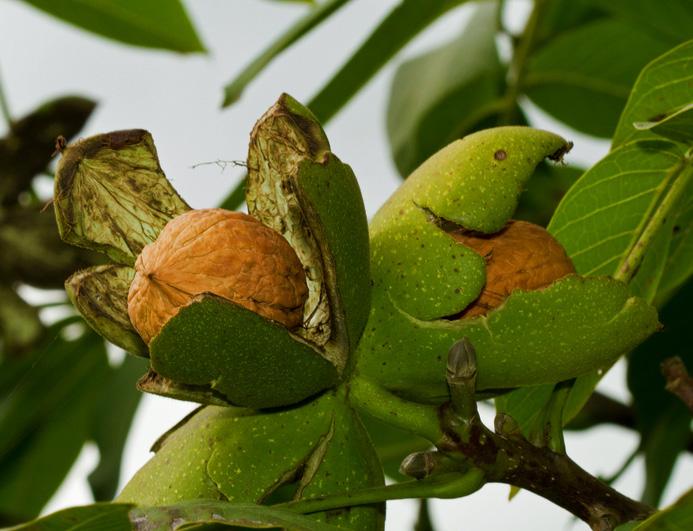

While I will spotlight no one in particular, I think its easy for us to forget that wild strawberries and raspberries proliferate in wild spaces all around us, along with wild blueberries and currants.
The difference? Well, apart from the fact mine taste better, and were free, not much at all ...
Finally this month, I would like to draw your attention to the possibility of finding other fruits we usually associate with cultivated harvesting.
As I sit to write this article, I can see a heaving bowl of pears, collected from a wild pear tree growing on an almost unused roadside connecting two small hamlets. The differences between the pears I have and the ones in the shops? Well, apart from the fact mine taste better, and were free, not much at all ...
Wait to harvest walnuts until the shell has started peeking through the green husks


I won’t bore you with how I was going to have natural free spring water for my flower beds this summer. Nor how I was going to have irrigation in all the beds. Or how (like always) the plumber never came when he said he would, and has only just turned up some eight weeks later –which is rather late. Or even how I’ve spent hours watering and keeping things alive this summer and I’m never going to get those hours back.
In fact I just had to give up on some beds and as a consequence had to cut down on the flower orders I’ve been able to take on.
But of course there is always next year to do things differently; with different plants and different varieties. The great thing about gardening, as I’ve written before, is you always get another season to try again.
Perennials are the way forward if our summers are getting hotter and our climate is changing – I will certainly be looking to grow more drought-tolerant plants myself. Of course they are more expensive, but they can be
grown from seed and some will flower in their first year. Good choices for this are achillea, yarrow and eryngium, or sea holly, which is the most beautiful steely blue colour and the bees LOVE it so it’s a real winner for the garden.
It’s a good idea right now to take the time and have a good look around your garden; see what has survived and thrived in your poor parched flower beds. Drought-tolerant plants tend
to have grey or silver leaves – the light-coloured leaves reflect the sun’s rays. Often the leaves also have tiny grey hairs on them, which help to retain moisture around the plant’s sensitive tissues. Some plants which really don’t mind a drought are echinacea (or coneflower), nepeta (or catmint; be warned, cats really do love this plant!), agastanche, salvias, lavender and rosemary. A lot of ornamental grasses thrive in dry conditions, unlike their moisture-loving cousin otherwise known as your lawn. The zinnias this summer have been amazing; they love it hot and dry. They are considered a ‘dirty flower’ because they make the vase water dirty, but a small drop of bleach will help prevent this.
There is an autumnal nip in the air first thing now, and thankfully a heavy dew which is helping my thirsty flowers. It’s certainly been a challenging summer for a cut flower grower.
The dry summer has been difficult, says flower farmer Charlotte Tombs as she makes plans to work around drought with her 2023 plant choices
The wildlife-rich shallows and seashore of Kimmeridge Bay were designated as a protected area under UK law in 2019 and form part of the Purbeck Coast Marine Conservation Zone (MCZ). The intertidal zone (the region between the high tide mark and the low tide mark) in Kimmeridge Bay is the only stretch with this level of protection along the open Dorset coast and an important part of our work at the Wild Seas Centre is to record and monitor the marine life along this coastline.
One such survey focuses on the furrowed crab, Xantho hydrophilus, a native to the south west coast but a recent arrival in Dorset. Further west, this crab has undergone a population explosion in recent decades, raising concerns about its impact on other long-term
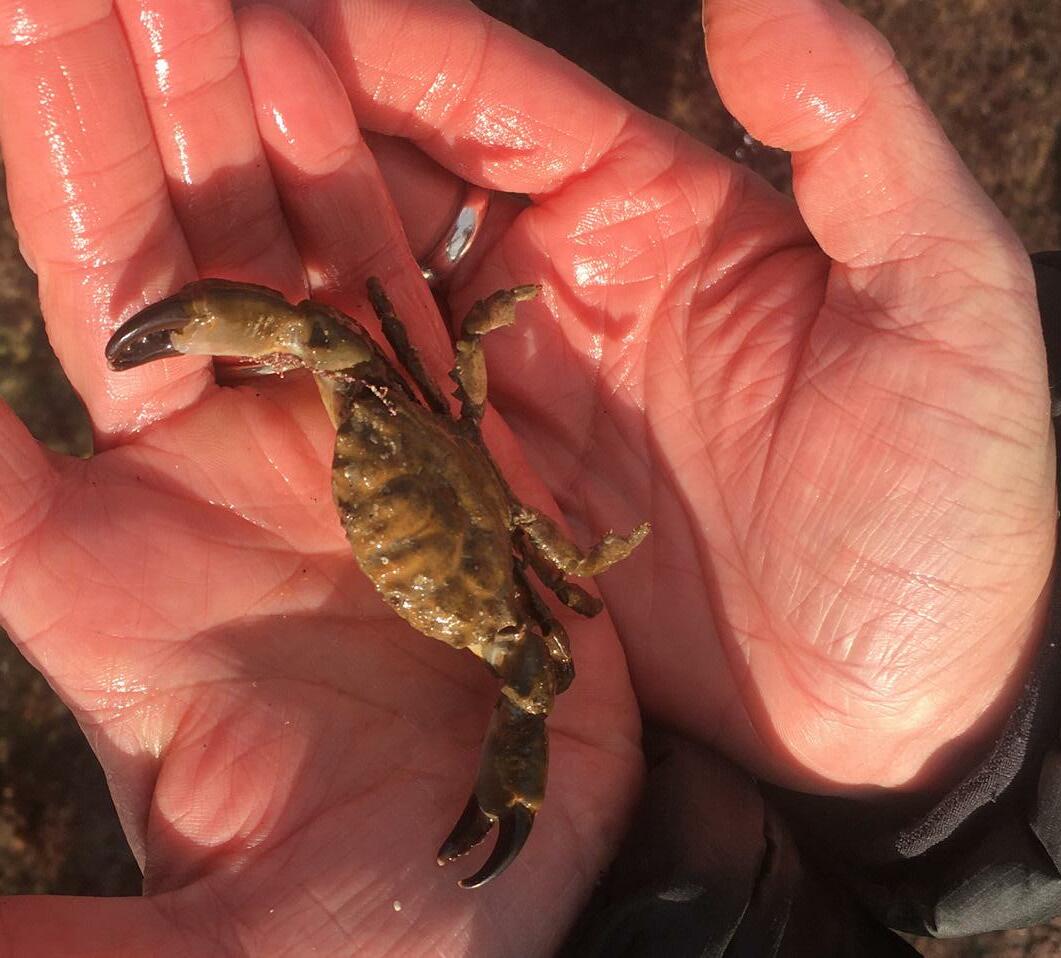
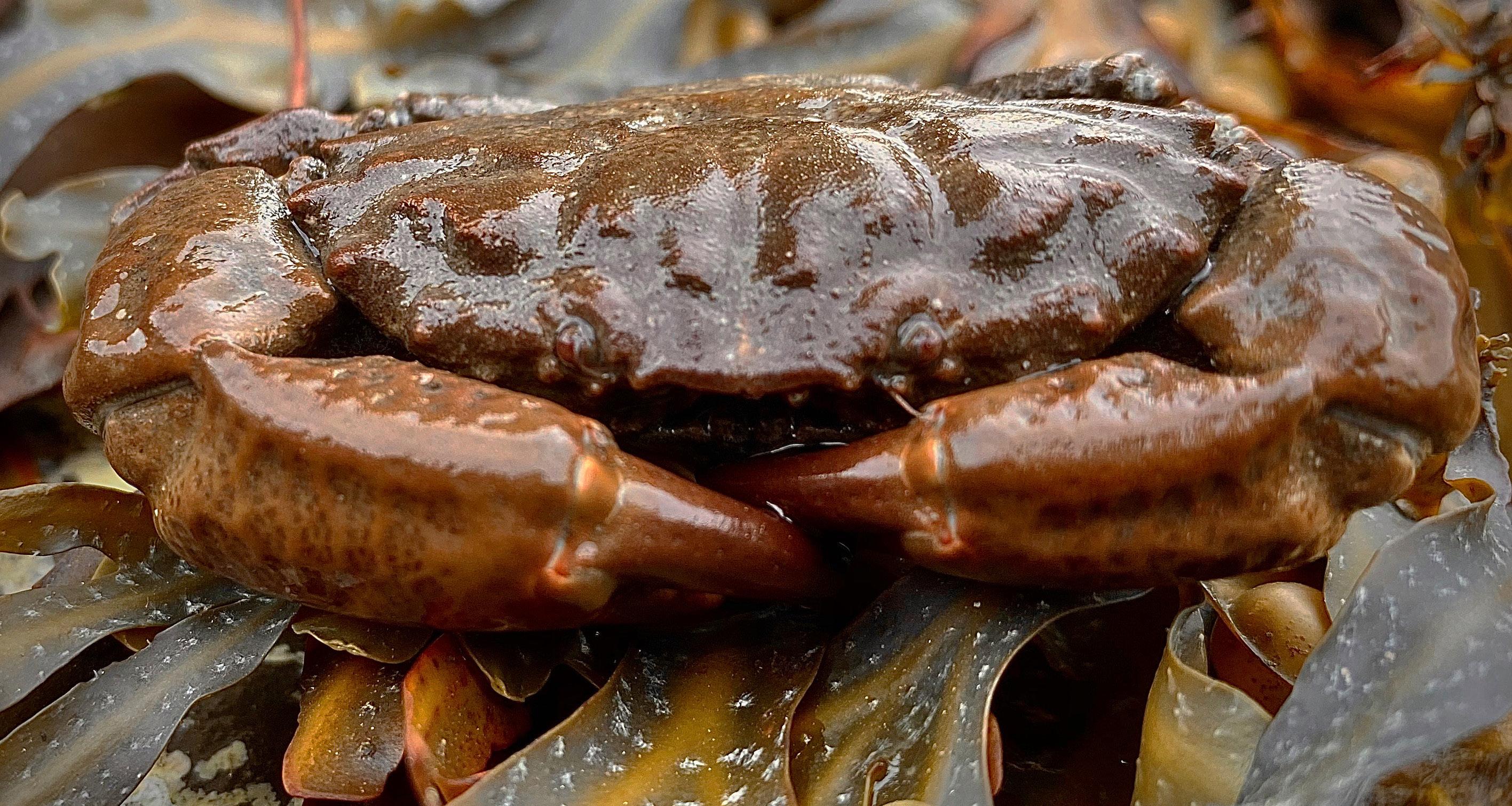

residents. First sighted on the seashore at Kimmeridge in 2019, the survey records the population size and any concurrent changes to other crab species on the seashore, including the edible crab, Cancer pagurus, of which there is an abundance of juveniles. Edible crabs move to progressively deeper water as they grow, so the ones found intertidally are the small, immature youngsters.
A team of trained volunteers records the number, size and sex of crabs, along with the habitat and associated animals. While the population of furrowed crabs is still at a low level, something interesting has been discovered about the edible crabs; out of the 125 recorded, only four were females. Crab experts appear to have no explanation for this gender discrepancy and further research is needed to solve the mystery.
The need to monitor Climate change is known to be altering the distribution and survivability of many wildlife species and it is thought that the furrowed crab may be one of these, hence its recent colonisation in Dorset. The effects of shifting distributions and the fortunes of both winners and losers in these changing times are unforeseeable, so monitoring changes and their impacts is vital to our understanding of how we can help. Of course, the most urgent need is to slow the global temperature increase, which will at least give species more time to adapt. Meanwhile our volunteers will continue to monitor this most difficult of ecosystems and share our understanding far and wide.
Growing a wildflower meadow in your back garden isn’t quite as simple as you might think – but it’s important to try, says writer Jane Adams
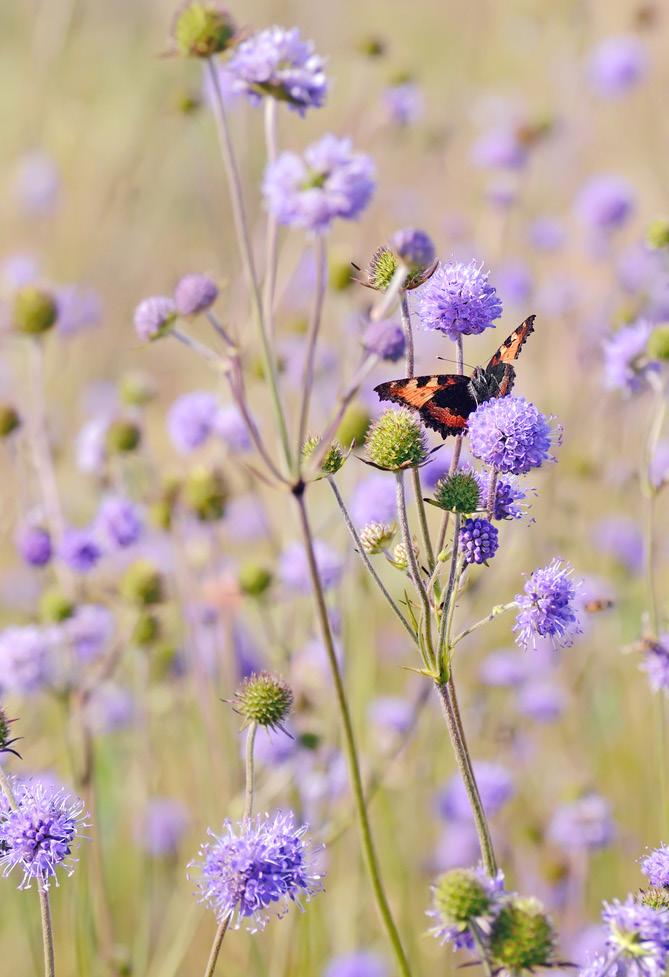
About ten years ago, I decided to grow a mini wildflower meadow on what was a rather forlorn patch of grass. It was lumpy and weedy, and I could tell it really didn’t want to be a lawn. Actually, allowing it to grow seemed an obvious win. I wouldn’t have to mow it and pollinators like bees and butterflies would benefit from any extra flowers. From what I’d read, insects needed all the help they could get. But I swiftly found out thet proper wildflower meadows are deceptively hard to grow.
In that first year I planted chamomile, knapweed, orange hawkbit, bird’s-foot-trefoil, yellow rattle, and devil’s-bit scabious plug-plants to boost the diversity
of plant life. My old lawn buzzed and crawled with insect life, and I felt pretty smug. The following year hardly anything grew except the devil’sbit scabious.
I know now what I did wrong. I didn’t research what wildflowers would and should grow in my sandy Dorset patch. I hadn’t considered the rich mosaic of interconnected plants and fungi that were needed to make a lowland meadow - even one as small as mine. In short, I thought copying nature would be simple, and it wasn’t.
In the UK we’ve lost a staggering 97 per cent of our species-rich grassland since the 1930s. That’s equivalent to 7.5 million acres; and quite a few of those acres would have been in Dorset.
Over the years meadows were mismanaged, undervalued,
and unprotected. What took hundreds, even thousands, of years to grow disappeared almost overnight.
But we do still have fragments of flowerrich meadows in our countryside. We just need to join them up so that wildlife can flow from one to another.
Which is why conservationists are keen for us to create green corridors for wildlife and plants by growing
wildflowers in our gardens. Just imagine if we could sew a giant living patchwork of native flowers right across Dorset.
In the meantime, the devil’s-bit scabious, and the bees that hang from their button blooms, are a joy to watch on my old lawn. And they are a reminder we can all do our bit to help wildlife during this ecological crisis.
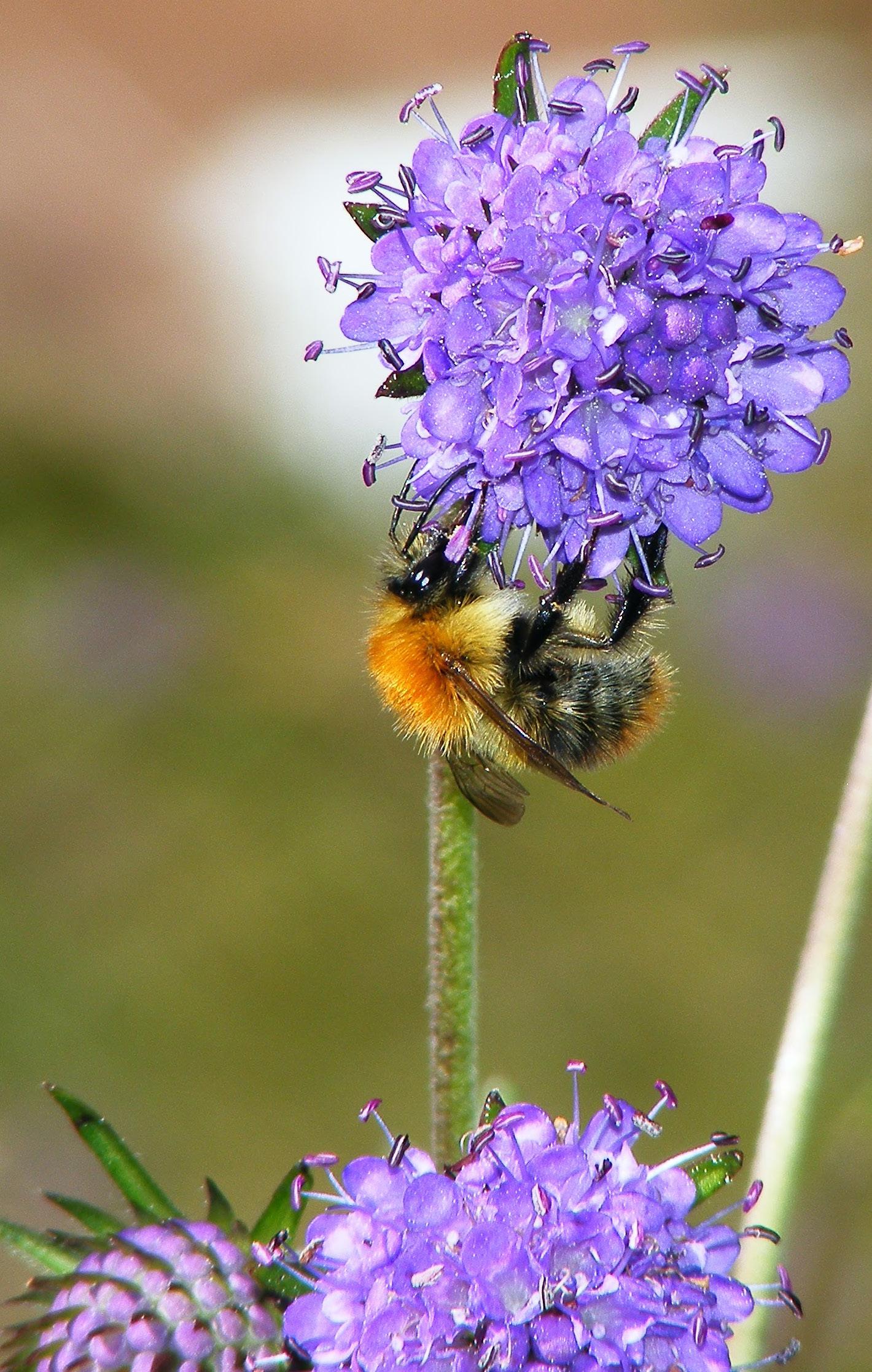
I thought copying nature would be simple. And it wasn’t.The common carder bee on devil’s-bit scabious Image: Jane Adams
We’ve lost a staggering 97 per cent of our species-rich grassland since the 1930s.
We all know by now that July 2022 was the driest July in England since 1911, and it has been the driest nine months (November 2021 to July 2022) since 1975/76. Met Office figures show that there has only been 24 per cent of the average rainfall for July.
The impact of this prolonged spell of dry weather is hugely challenging and causing concern for many agricultural and horticultural businesses across the country. The dry weather is severely hampering grass growth. In Dorset, as with much of Britain, most livestock is grazed in a grass-based system, meaning that livestock eats grass from the fields in the summer, with farmers harvesting surplus grass to feed animals in the winter in the form of silage. The lack of grass this summer will inevitably hit feed supplies for the winter –many farmers are already having are already having to feed their
livestock the forage reserved for winter to compensate for the lack of grass currently available.
For the county’s arable farmers, the dry weather has meant that harvest came early this year, with many having finished in time for the Gillingham and Shaftesbury show, which is somewhat unprecedented.
Fire risk still high Attention now turns to the planting of winter crops; with the ground still cracked and parched, the establishment of crops such as winter cereals and oilseed rape will be difficult. On top of all this, as I’m sure many will have seen and heard, the dry conditions are having widespread implications for firerisk and farm safety. The county has experienced several fires over the past few weeks. This is devastating and dangerous for all those involved but is
Farmers are already having to feed their livestock the forage reserved for winter.
also a heartening example of how the farming community is able to pull together in times of need. Neighbouring farmers are making great use of WhatsApp to alert one another to fire risks, and coming to one another’s aid with tankers of water to help extinguish fires and cultivators to stop them spreading (see the story on page 12).
This does serve as an important reminder though, with weather conditions so dry and temperatures high, the fire risk remains high. With an increased number of people making the most of the weather and enjoying being out and about in the countryside, there has also been an increase in the use of disposable barbecues.
The NFU is reminding the public to be safe and responsible when out enjoying the countryside.


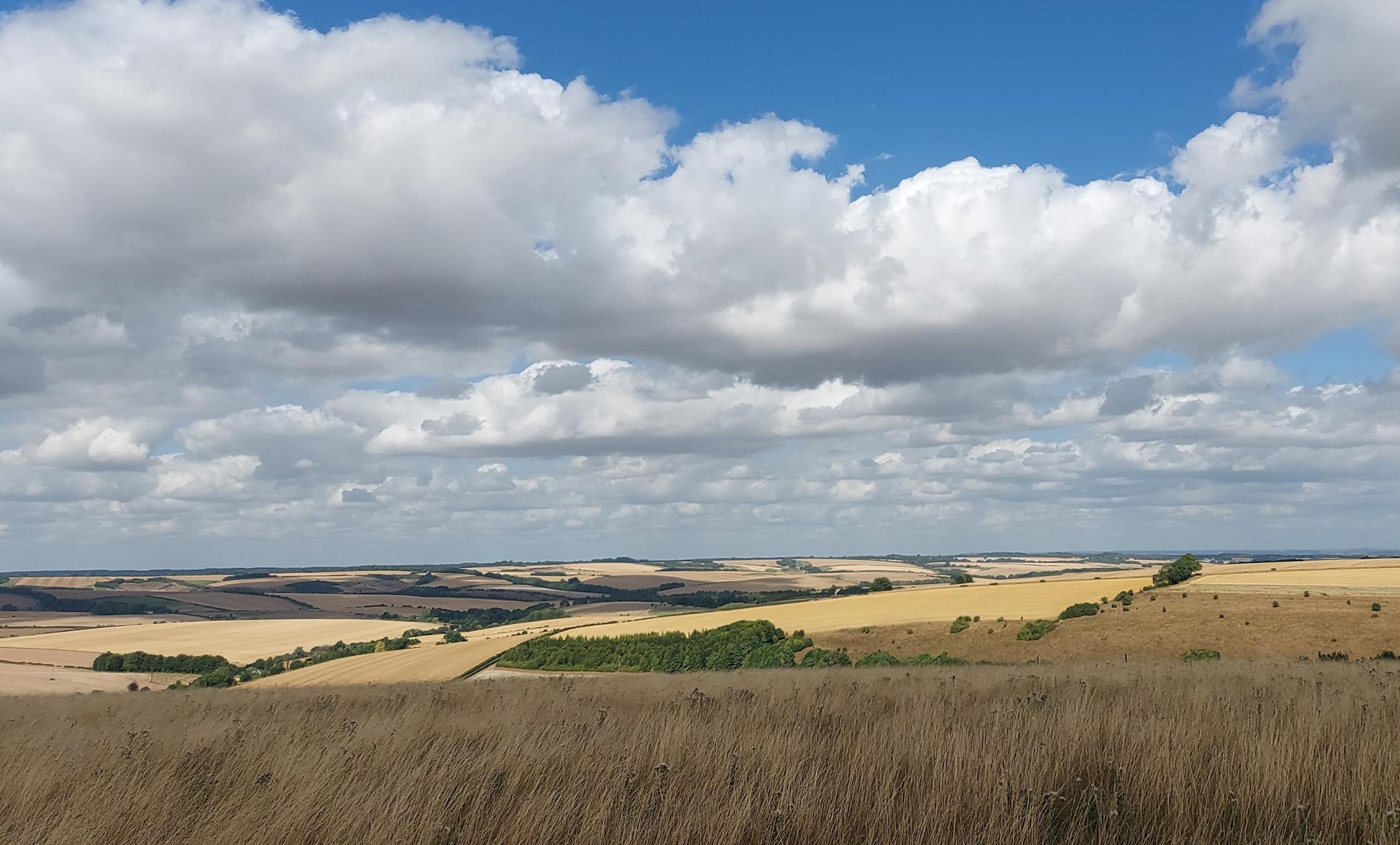
The dry summer continues its impact on Dorset farmers as we move into autumn, says NFU county advisor Gemma Harvey
The heat is on, on the ... fields?


Shearing sheep is vital to ensure the welfare of the animal –removing their thick winter coats keeps them cool and reduces the risk of parasites and disease that can fester on faeces left on their coats.
Wool became an important commodity once farmers realised that the material could be spun to make clothes.
Shearing is believed to have started around 3,500 BC and is mentioned numerous times in the Old Testament (Genesis 31:19 “When Laban had gone to shear his sheep, Rachel stole her father’s household gods ...”).
Shearers typically charge £1.50 per sheep, with the wool selling for around 75p.
In 1276, Florentine merchants agreed to buy 62 sacks of wool for 697 and a half marks from the Cistercian monks at Fountains Abbey in Yorkshire, on condition it came “without clack, lok, cot and breech wool or black grey or inferior fleece and without pelt wool”. Clacked wool had the marks cut off, to avoid paying duties as it weighed less (duties were levied on wool including the coloured marks). Lok was probably daggy wool – wool from the sheep’s rear end with poo on. Cot was coated (tangled) and breech the low quality stuff from the haunches. That black or grey were undesirable colours probably implies this was destined to be dyed.
And finally, pelt wool is the wool from dead sheep – which the unscrupulous might mix in to make up the weight. The monks were contracted to sort and weigh the wool and deliver at Clifton 14 to 17 sacks a year for the Florence trade.
Each sack was 26 stones (364lb of wool).
The Flemish wool industry had such an appetite for English wool that Richard I’s ransom was raised by confiscating the wool clip of the Cisterican monks –Henry VIII wasn’t the first king to rob the monks!
Once a major business, English wool is now a wasted opportunity –the industry needs a rethink, says Andrew Livingston Farm life is built around regular tasks – whether they’re daily, weekly, monthly, seasonal or annual. In the world of sheep farming there is one summer task that is seen as a cost and a hindrance, but which, once upon a time, provided the main income from the flock – shearing.
John Barton, a 15th-century wool merchant of Holme-by-Newark, Nottinghamshire, had a stained glass window placed in his parish church: ‘‘I thank God, and ever shall, it is the shepe hath paid for all …”
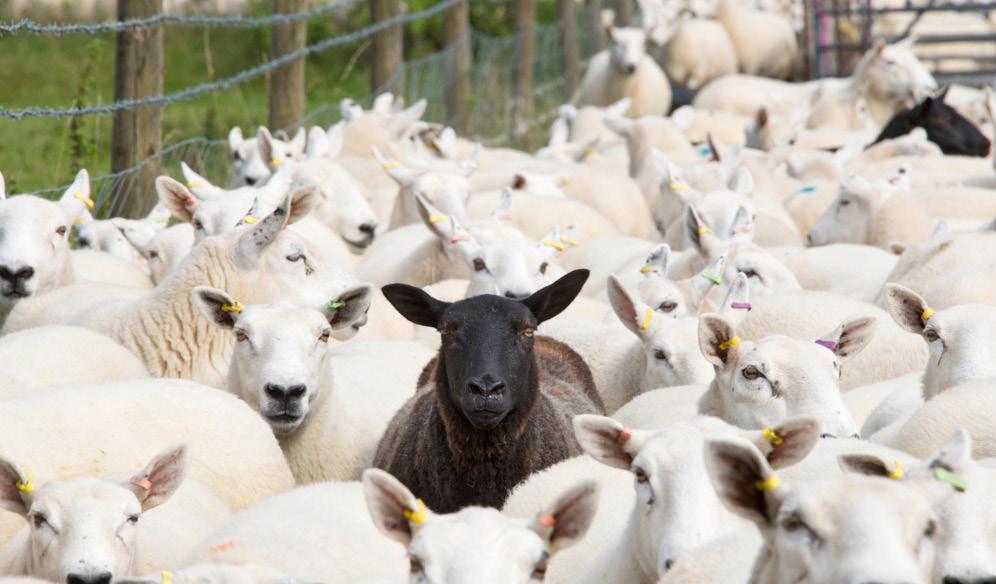
In the 19th century, man-made fibres could be easily massproduced and became a cheaper alternative to wool. They had the additional benefit of being more durable, easier to maintain and more readily available.
The rapid expansion in production and use of man-made fibres saw an equal and opposite reaction in the plummeting profits in the wool trade.
The price of wool is now so low
that it no longer even covers the cost of shearing, let alone making an income for the farmer.
Shearers typically charge £1.50 per sheep, with their 2 kilos of wool (on average) selling for around 75p.
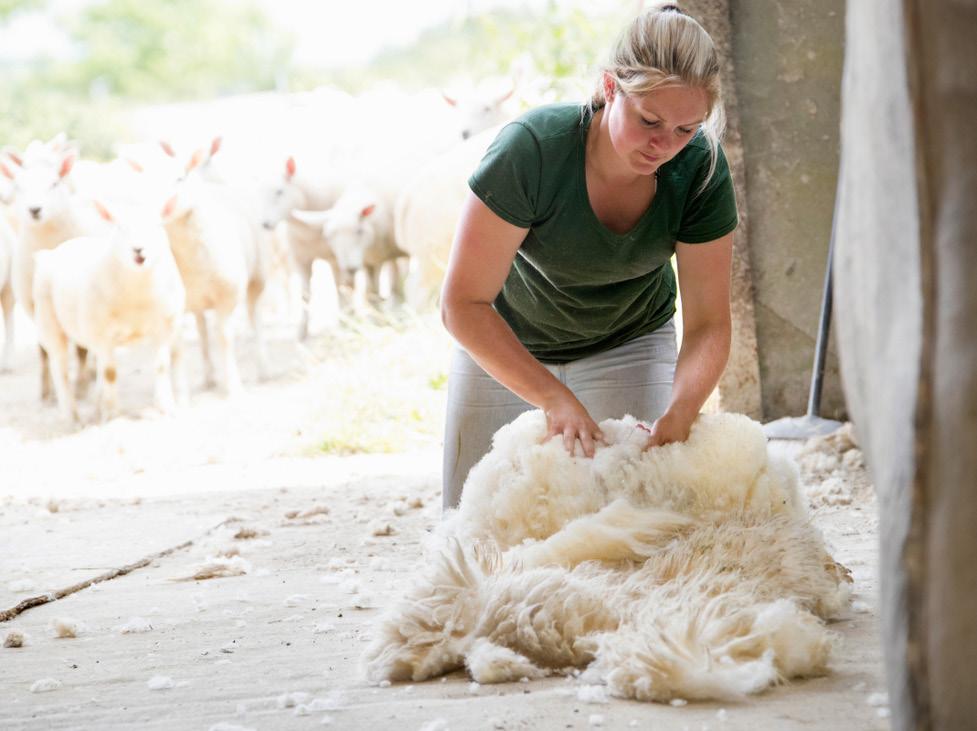
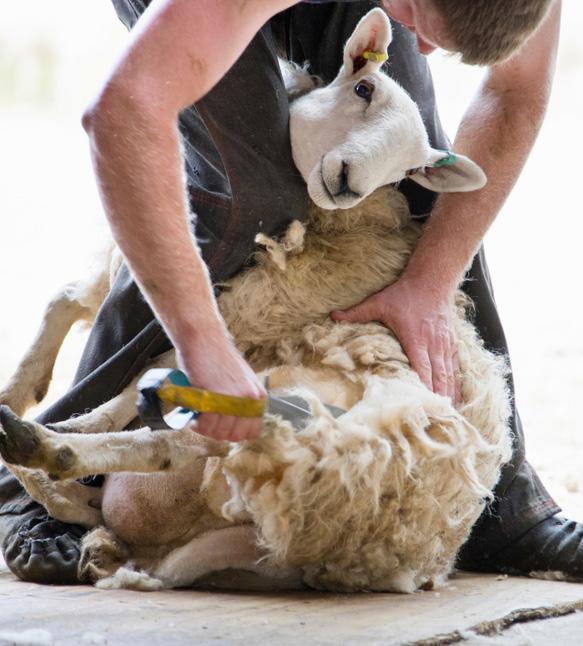
So what is the answer? At the moment, the price of wool is actually deemed at a high as the price of wool is inextricably linked with the price of crude oil, which is required in the production of man-made fibres. If the cost of those manmade fibres goes up, so do the alternative choices.
The British Wool board, whose job it is to effectively market wool so that farmers can get a decent return, needs to start working harder for sheep farmers.
Currently, British Wool sells wool for its members, but will only handle pure breeds’ fleeces. Some farmers have been proactive in treating and selling their wool. Rampisham Hill Farm, in Hooke, where I grew up, began treating and spinning their wool to sell themselves. Today, they buy fleeces from other Dorset shepherds to meet their orders. Sheep’s wool is also among the top insulating materials for the contruction trade in terms of
sustainability. Sheep are shorn every year (some twice) and the wool just keeps growing back! As a raw material, wool is abundant, continuously renewable and locally produced in Britain. It lasts for decades and at the end of its life can simply be composted, unlike oil-based
insulation. To manufacture plastic insulation in the first place you need oil, chemicals and lots of energy.
Another innovative use of sheep’s fleeces in recent years is as eco-friendly thermal insulating packaging. WoolCool makes this by combining two fleeces on the inside of a box to keep produce cool for up to 72 hours. The fleeces can then be recycled for various roles such as food for roses and protecting plants and flowers from frost.
Unfortunately, not all farmers have the time or resources to treat their fleeces to obtain optimum profitability – 1,000 years later we still pay less for daggy wool.
Wool is currently a wasted resource; somewhere out there there is an idea that will save the wool industry and make someone a lot of money.
I’ve got my own thinking cap on for that big idea ...
Woollen thinking caps maybe?
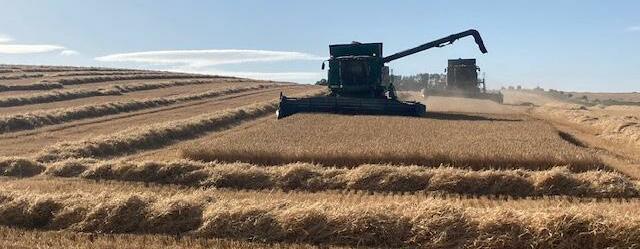
This year’s harvest of cereals, oilseeds and beans was completed in record time, finishing just a month after starting when it normally takes two. Yields were surprisingly good, especially for the wheat, when you consider how little rainfall we had during the growing season. Obviously the record amount of sunshine made the difference. Our biggest fear towards the end of harvest was the risk of fire in the fields we were working in. The combines were meticulously cleaned off each morning – any build up of dust around the engine could start a fire. There were several days when fires could be seen all around by midafternoon. On one occasion I thought Blandford Camp was on fire, but in fact it was a stubble fire near Pimperne.
We completed harvest without a major incident, although we had a roadside verge fire near Ashley Wood Golf Course which burned a small amount of stubble; the cause is not known, but probably a cigarette from a passing car.
The cattle side of the farm has been far more challenging – milk production has suffered a little in the heat and dryness. With little or no grass growth
over the last few months and very little rain to speak of, we have had to supplement the cattle’s feed, initially using baled silage and hay from last year or barley straw to keep them satisfied.
We are just beginning to feed some of this year’s silage to the herd. We will have to monitor the feed stocks carefully to make sure the milking herd doesn’t run short of the best silage.
We also rely on forage crops such as turnips to outwinter some cattle. These crops have been sown for about a month now, but there’s little sign of germination. They may have to be redrilled – or maybe we just wait for rain. Whatever happens, it is going to be a challenging winter for our stock. One option may be to sell some, now that we are TB free, before our next test in November.
Prices of energy are back making the headlines. With fertiliser prices closely related to the energy price we have managed to secure some of next year’s fertiliser, which has already been
delivered. More will be needed but who knows what price it will be, or if it will even be available? One of only two fertiliser plants in the UK has shut and we may be more reliant on imports, which is never good news.
The river Tarrant which flows through the farm is now completely dry. The last time this happened was in 1976, when most of the fish were removed before it dried up entirely. I do wonder about the effect on our local area of the water extraction from the bore holes at Shapwick, Sturminster Marshall, Black Lane near Blandford and at Stubhampton at the head of the Tarrant. Many millions of litres of water are being removed every day, not only supplying the local area but also being pumped further afield. I will monitor closely when the Tarrant decides to flow again. It rather feels at the moment like we are being sucked dry.
On a positive note it was great to spend a day at the excellently-organised Gillingham & Shaftesbury Show. Judging by the car parks, it must have had near-record attendance.

Millions of litres of water are being removed every day.
The 2022 Love Local, Trust Local Awards are now closed for entries; founder Barbara Cossins reminds us all that supporting local producers is vital
The extreme heat we’ve all endured has meant a very challenging summer for all our farmers and UK food producers. I know from personal experience that we breathed a huge sigh of relief on the farm when the harvest finished and we knew we had made it through with no major fires & all our animals surviving the heat.
All of us here at Love Local have been busy wrestling with Instagram, LinkedIn and Facebook – social media is essential for any modern organisation to communicate –working hard on our content as we gather in all the entries for the 2022 LLTL Awards.
Throughout October and November our wonderful sponsors will be busy judging and, as you can imagine, Tasting Day is one of the best parts of the job!
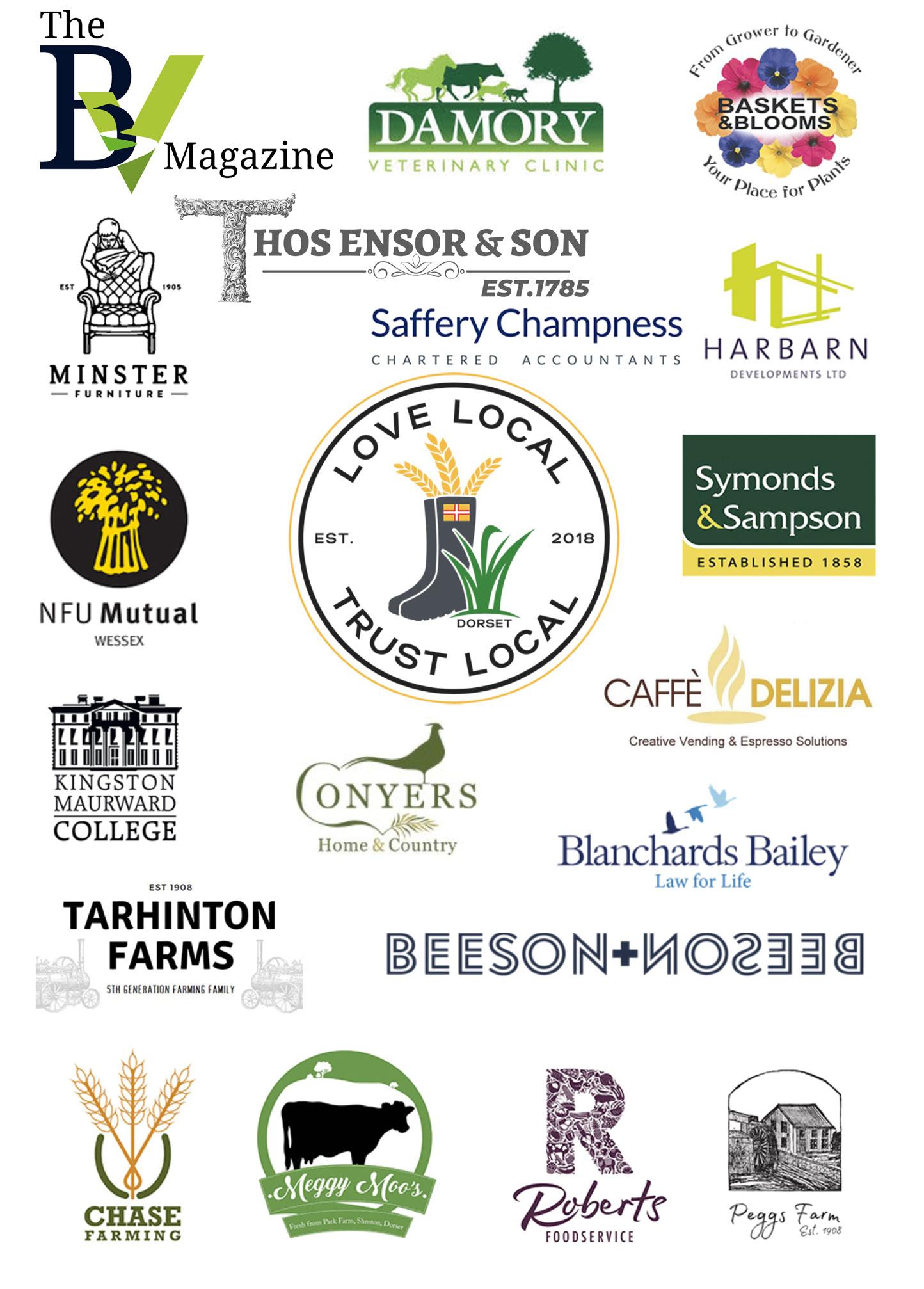
A big thank you must go to all of our Dorset enable these awards to happen. Being a self-funded not-for-profit organisation is always challenging, of course, but now moreso than ever when everyone is thinking about budgets and trying to save money wherever they can.
The fact that our loyal sponsors continue to support us year after year shows us just how important it is that we keep on sending out the message to eat and support local.
With rising bills and the onset of huge fuel price increases for
all of us, there is no better time to be championing our local food producers, farmers and fishermen. Our own mission is of course to let consumers know what is being produced right here in Dorset. But in a very real sense, if everyone supported just one local producer occasionally, the cumulative effect really would make a massive difference to
both the local economy and to the environment.
We need to grow food for everyone’s table and keep our carbon footprint down whenever we can.
We thank all of the entrants for taking the time to fill out their forms – the judges look forward to meeting you all. Good luck with your entries, and we look forward to telling your stories.
Want to reply? Read something you feel needs commenting on? Our postbag is open! Please send emails to letters@theblackmorevale.co.uk.
When writing, please include your full name and address; we will not print this, but do require it.
Is there any help on the horizon to mitigate the energy bills? How do we survive?
I literally don’t know. My contract just came to an end, and my renewal offer to fix a rate for the next 12 months is over £700 a month. It is ... ridiculous. I’m struggling to understand that it’s actually real, and not an admin error. I’m a single parent to two. I work full time. I’m not on any benefits. My teens have part time jobs. We do OK - but how am I supposed to just whisk up an extra £500 a month?
I keep searching and hoping, but there seems to be no answers or help from any quarter. The government are silent – SILENT! – during a national crisis that is genuinely more frightening than any I can personally remember. And if one more person tells me to get thicker curtains or to turn off appliances I’m not using, there may be bloodshed.
John Farrer SherborneI always enjoy Simon Hoare’s contributions to The BV - I admit I’m an ‘undecided’ voter but have always considered North Dorset lucky in their representative, and value his opinion and thoughts. But I can’t help but notice that he has been Missing In Action a few times in the last few issues.
Understandable occasionally –yet I have observed he doesn’t
fail to appear in a certain fortnightly printed title under a similar name.
Can it be that he values the readers of that paper more? They will, inevitably, be the older demographic, and therefore we all know they are those most likely to vote.
The BV is by far the superior publication in terms of reporting and content - and when I stopped to speak to you at the G&S Show (you did an excellent job on the show magazine, by the way) I saw the stats board in your marquee; I know The BV’s circulation to be considerable. You only need to follow your social media to see your instant connection with your readers.
And yet Mr Hoare doesn’t appear to value The BV enough to commit to a regular contribution?
Or perhaps it is your (what I presume to be) naturally younger, more digitallyconversant readership –who we all know are less likely to make time to vote, especially when we are all so disenchanted and disenfranchised with politicians – that he feels no need to engage with?
Interesting.
And possibly rather foolish. Dr Charles Mathews nr Sherborne
What is happening with our zombie government? We have had weeks of this beauty
pageant of two candidates. Our alleged caretaker PM is off on holiday (again). Meanwhile, inflation is at the highest rate for 40 years. Wages are so universally low they are unlivable, and we face a winter of increasing strikes (those old enough will remember how much fun that wasn’t in the 70s). Our energy bills are so eye-watering it is impossible to grasp the reality of them.
Local businesses are already closing down – the domino effect has begun, many many more are holding on by their fingertips, but there’s no way they’ll stay afloat when their current contracts run out.
The times are not ordinary. We need an extra-ordinary reaction to them.
Why was our government allowed to simply wash its hands of the whole energy crisis and say ‘not my job, love, wait for the next guy’?
Why is the country looking to a powerless Martin Lewis for guidance?
I am so angry at them all.
Shona B Nr. ShaftesburyTruss and Sunak
Thank you for your coverage of Liz Truss and Rishi Sunak visiting Dorset. It was an interesting and balanced article (contrary to what one person amusingly seemed to think on Facebook, before admitting they’d not actually read the article in question!), and it should have allowed us to gain a small insight into their responses to a few pertinent rural issues.
Sadly by following their summer campaigns more I see their responses were simply their cookie-cutter ‘right, we’re in the country so we need to talk about how great farmers are’
responses. Genuine insight into what our next prime minister may do for deprived rural areas and deep-seated planning issues feel further off then ever.
Tom Brady VerwoodWhat a travesty that a residential home is closing in Shaftesbury due to the inability to fill beds and thus keeping finances viable. Working in the NHS and trying to admit very ill people to overcrowded hospitals, we are informed time and again that there are no beds because there are no available placements to discharge people to.
There have been eight empty rooms at Pepperell house. How can this be? Why have these rooms not been filled?
Why is there not a long waiting list as there is in other care establishments?
Of course I don’t know the answers to these questions but would it not be worth a public enquiry to see if this hugely valuable resource could not be kept open?
I imagine it has been a difficult task for the trustees to negotiate the pandemic but there are other willing volunteers who would step
immediately into the trustee roles that the present trustees are vacating. Is it not worth having another try to keep Pepperell open?
Shaftesbury has an ageing and ever-expanding population. Residential settings for our elderly (soon to include all of us) and especially affordable ones are like gold dust. They should not need to be closed down, they need to have priority status.
And the above does not begin to address the devastation to residents and families who are losing their homes with such short notice. No doubt it will be nigh-on impossible to find other suitable accomadation, let alone a new ‘home’ which is what Pepperell most certainly is for its very elderly residents.
A safe home and an established community .
 Dr Katherine Gowing by email
Dr Katherine Gowing by email
May I thank you for your frank honesty in your editor’s letter this month?
I too am an overweight middleaged mum (there are a lot of us out there), and your letter really struck a chord.
Why was I sitting at home waiting for the right body
before I braved the outside world in some sportswear?
I’m not as brave as you; contact sport is defitely not my thing. But I DID used to love cyclingso I pulled the bike out of the shed and hit the road, lycra-clad wobbly thighs and all.
And it was brilliant!
I’m so angry at myself for forgetting how much I loved it. Yes, OK, I couldn’t walk for two days afterwards - but I was soon back on it again, this time with my teenage daughter alongside me.
It’s become a regular evening mum-and-daughter activity, just for an hour, and we’re both loving it.
My aching thighs thank you.
Charlotte L Blandford ***
I should like to express many grateful thanks to Laura and Ian of Swallowcliffe who came to my aid after a nasty fall outside of Tesco Shaftesbury on Saturday August 12th. They finished my shopping and escorted me home. I am glad to say that such great kindness exists. Ever grateful.
M. Forster Shaftesbury
Simply click to complete on your tablet, computer or phone - or there’s a download option if you prefer pen and paper.


Monthly updates from the various North Dorset Police Teams. This month’s news is from Sturminster Newton’s PCSO 5352 Mandy Robinson

Station Road in Sturminster Newton, the top section, has been pedestrianised for a significant number of years. Recently we have received reports of an increased amount of traffic, with suggestions that some drivers are not permitted to use this section of road. We will be showing an increased presence on this section of road and any driver caught contravening the traffic order will be subject of a fixed penalty notice, resulting in a nonendorsable fine of £50.
Making Communities Safer is a nationally-run campaign with the aim of bringing communities and organisations together take a stand against anti-social behaviour (ASB), in order to make communities safer.
During ASB awareness week, and due to recent ASB in Sturminster Newton, the neighbourhood Policing Team PCSO Mandy Robinson and PC Phil Sugrue invited district councillor Carole Jones and town councillor Debbie Mantock to join them in ASB preventative foot patrols in Sturminster Newton.
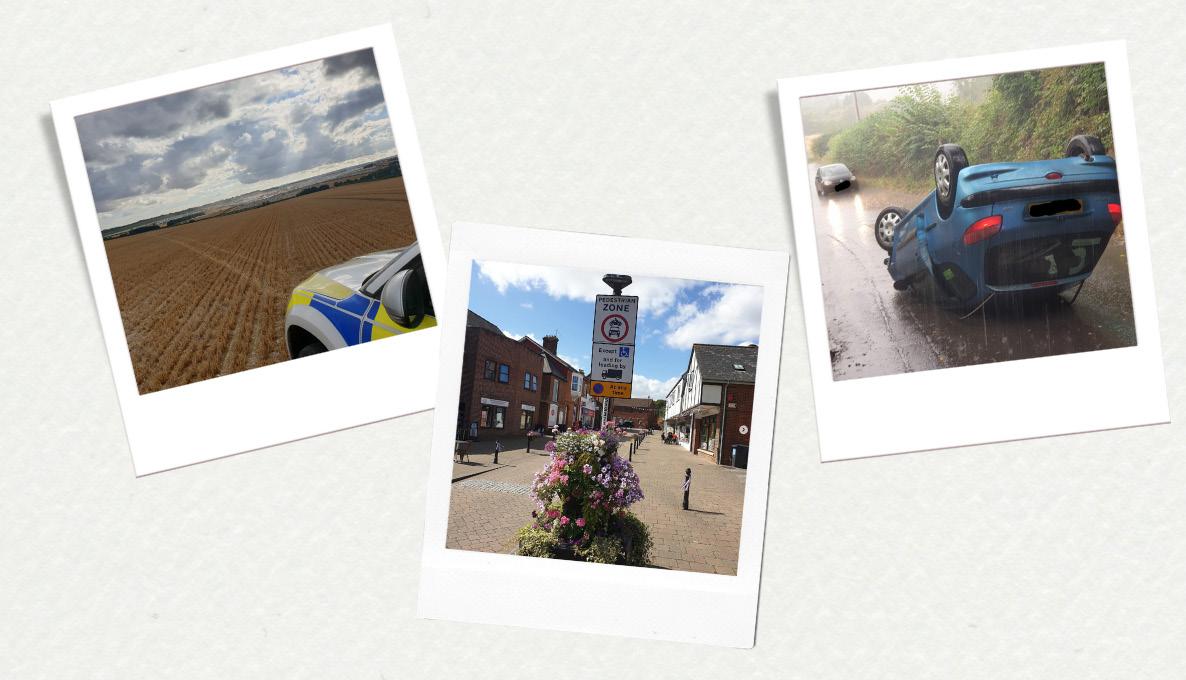
This was an opportunity for working with our partners and to engage, jointly, with the young people who meet up in the town. We patrolled the Railway Gardens, the town area, Butts Pond, Rixon Rec and Ricketts Lane Rec (also known as the Town Rec). Only two groups were seen and spoken to during the evening.
Recently a local residence was contacted by phone by a male
purporting to be from Barclays Bank. The caller stated that there had been fraudulent activity on the bank account and that it was necessary to move the money to a ‘safe’ account. The caller then shared bank details for this safe transfer account.
The intended victim was told to attend the bank and to phone the caller – the scammer – when they arrived, and to keep the phone line open. Fortunately, the bank realised this was a scam and no monies were lost.
DO NOT ENGAGE WITH FRAUDSTERS AND HANG UP! Please be on your guard and report suspicious activity to the police either by calling 101 or via the police website www.dorset. police.uk/
If a crime is occurring or a life is in danger, always call 999.
“Local NPT officers have been patrolling areas near to the Steam Fair, a visible deterence to criminals that may be in the area, providing a reassuring presence to locals who feel vulnerable.”
“Make sure you remember to drive to the conditions. Heavy rain and standing water can take the driver by surprise - often with dramatic consequences. This driver got caught out & tipped over just outside Shaftesbury, fortunately was uninjured.”
The pedestrianised section of Sturminster Newton’s Station Road comes under attention after reports of an increased amount of traffic
“Station Road pedestrianised;isfollowing recent complaints aboutmisuse and unnecessaryusage there will be anincreased presence from thelocal team.”
This month’s news from the unofficial capital of the Blackmore Vale ...

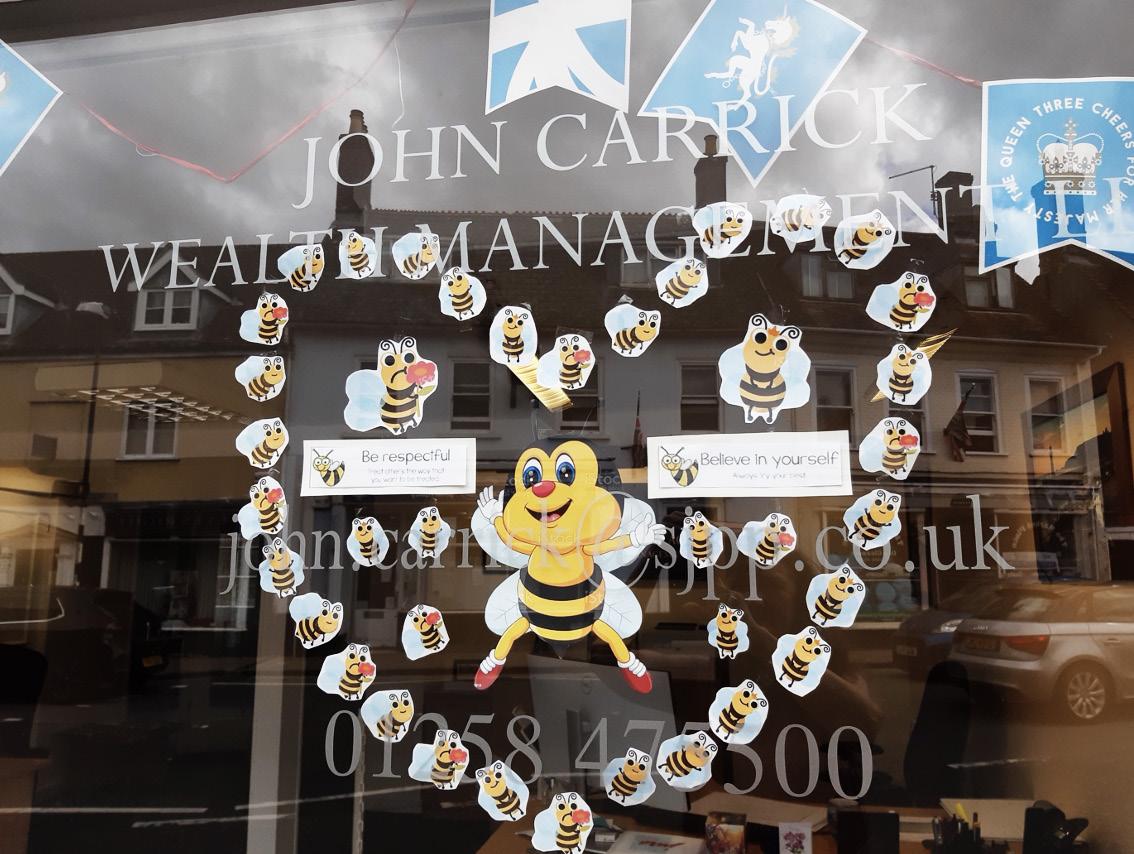

Work is continuing on the 1855 project (the former NatWest building) which is expected to be open for business in the late autumn. The project offers people-facing sales space to artisan entrepreneurs who may have outgrown working solely from home. For more information email Cheryl Basten and Jacqui Wragg at 1855stur@gmail.com
The Emporium and The Boutique are both looking for more volunteers to work on the shop floor or behind the scenes or both. The volunteers are a friendly bunch and working with them offers a good way to get out of the house, meet new people and at the same time use your spare hours to benefit the community. The team also enjoys social events together from time to time. If you are interested, pop
into either shop and leave your details for Cheryl to contact you, or email comcheststur1@gmail. com
The Art Gallery is open on the
floor above The Emporium, and it has a fascinating mix of interesting paintings, cartoons and prints at knock-down prices.
... and furniture too People often don’t realise The Emporium has a wide range of furniture for sale – the larger pieces are stored elsewhere but we can show you photos and take you to look. We can also deliver your purchases – and collect whatever it is you are replacing.
An early warning about Christmas - Jacqui Wragg is already working with a small team to plan the Christmas events for this year. The Christmas Tree lighting will be on the 26th November, and it is hoped to have an ice-rink in the town that weekend. Father Christmas will of course be on duty. There will also be late night shopping on the Friday evening
before. If you want to be involved in the planning, or have time to help on the day, please let Jacqui know - SturBiz18@gmail.com
The Friends of the Library are getting back in action after COVID, and have been running craft events for children during the summer holidays. Volunteers are needed to continue the Saturday craft sessions and also the planned after-school club for younger children. If you would like to be involved, please contact Michaela on friendsofsturlibrary@ hotmail.co.uk

During October there will be further contributions to the Queen’s Platinum Jubilee Green Canopy, with tree planting around the town. A new leaflet has been produced, introducing walkers to the remarkable specimen trees we have in the town. It is available from the Town Council and The Emporium – for information contact Taprisha Seifert – sturqgc@gmail.com
The car enthusiasts will be back in the recreation ground between 9am and noon on Saturday 3rd September, and again on the 1st October. From November to March inclusive they will be meeting either outside the Medical Centre or Hansons and Streeters. Numbers have increased over the summer and quite a collection now gathers every month. It’s definitely worth a wander round, and always good to chat to the owners. If you’d like to bring your car, it’s a relaxed meet and no booking or qualifications are necessary –just an interesting car (with the relevant insurance)!
A second wedding festival is being planned for 5th and 6th May 2023, with a wedding fair at The Exchange and support from
shops in the town, a display of dresses and culminating in a wedding ball at The Exchange. To help with the planning or get involved in the event, please contact Debbie at Stur’s bridal shop Forever Bridal - deborah@ forever-bridal.co.uk.

The Riverside Meadow Family Fest was a great success, and plans are already underway for a bigger, better event next year – but the plan is to move it to the start of the school holiday rather than have it at
the end of the summer. For information contact Ruth Caldwell riversidefamilyfest@outlook.com
And finally, thank you to all those who supported the Community Fete on Saturday 27th Aug and especially the shops who supported SturBuzz week by decorating their windows. The business voted the best by the public at the Community Fete on Saturday was John Carrick Financial Services with a joint second of The Boutique and Pure Hair. SturBuzz will definitely be back next year!
Employ My Ability offers vocational training for students with learning disabilities and special educational needs and disabilities. One of their students, Maddie Walters, has spent the last term working on her journalism skills with the aim of writing a column for us. - Ed
Hi, and how are you doing?
This month I am doing a ‘top 5’ list based on my favourite places to visit across North Dorset and surrounding areas, so you can be inspired to go and explore beautiful area.
Here are my top 5 places in North Dorset:
Stourhead is one of my favourite places to visit, because it has beautiful nature and fantastic scenery. It is accessible for wheelchair users and it’s disabled-friendly. During the summer holidays lots of people visit forthe nice walks in the sunshine.
Hauser and Wirth is an art gallery in Bruton where you can look in the gallery and see the artwork, and then eat in the café next to a big firepit. This gallery also does workshops so you can experience different art styles, learn
about art in Dorset and also have a shop.
Gold Hill in Shaftesbury has some lovely views, and is famous for an advert that’s filmed there. Everyone local knows it, but when was the last time you actually went there to enjoy it?
At Pallngton Lakes near Dorchester, Sculpture by the Lakes is an amazing place to go during the spring and summer months. The nature and beauty of this place is fantastic and it is very disabled-friendly.
Hambledon Hill is a beautiful hill situated in the Blackmore Vale. It’s tough to get to the top, but the scenery is stunningly pleasing. These are my top five places to visit in North Dorset – I hope you enjoyed them!
Maddie Walters
The 26 mile Jurassic Coast Mighty Hike takes place on the 10th September in aid of MacMillan Cancer Support. Joining in this year is a local team from Rose Engineering, a family-run engineering and construction company: ‘We wanted to raise money but also to raise awareness of the wonderful work Macmillan do. It’s a bonus that it’s getting us all a bit more active as well!’, said Tom Rose, Managing Director.
The facts are sobering; three million people are living with cancer in the UK, and it is increasing each year. MacMillan Cancer Support aims to help everyone with cancer live life as fully as they can, providing physical, financial and emotional support.
The Rose Engineering team have been training across the hills of Dorset over the past few months, committed to being fully prepared for the hiking challenge.
‘It’s going to be a tough challenge but we’re all training hard in the lead up to it. The amazing coastal views will push the team on.’ said Rupert Hayes, Operations Manager.
The Mighty Hike will take hundreds of walkers on the marathon-length route (see it here) from the starting point at Lodmoor Country Park in
Weymouth, along the South West Coast Path and through the Dorset countryside to finish near Corfe Castle. As any local walker knowns, the terrain along the coastal route contains plenty of steep hill climbs – and despite expectations, going down again is never much more fun than climbing up for tired legs.
‘We’ve received some great support from local businesses and individuals who have sponsored our team, but we still have a way to go to reach our target. If you can support us, and MacMillan, please do visit our JustGiving page to make a donation. We’d be so grateful.’ said Anita Beaumont, Marketing Officer.
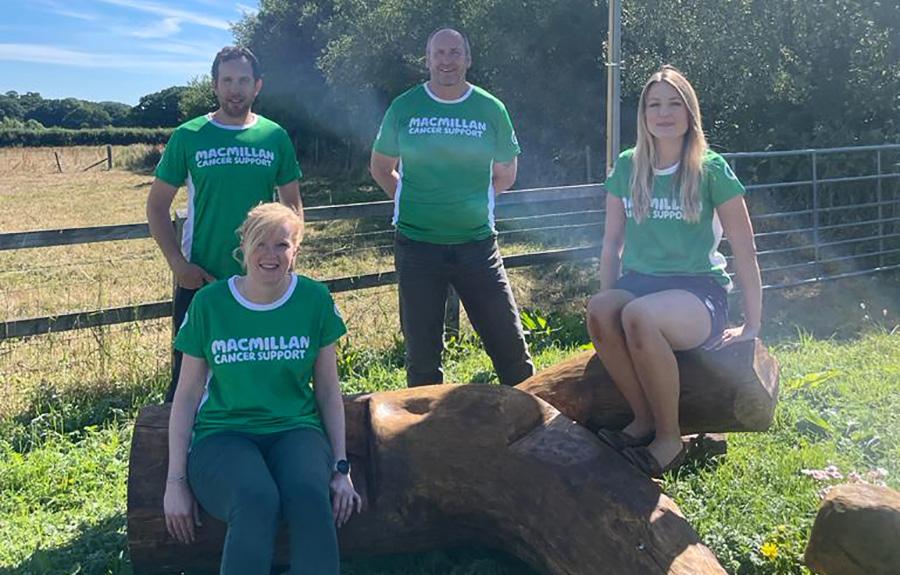

A new community public access defibrillator (cPAD) has been officially opened by the Sherborne businesses and organisations who have supported the £3,000 project. Following a cardiac arrest the chances of survival drop dramatically every minute.
The UK Resuscitation Council recommends that a defibrillator should be available when medical treatment is more than five minutes away, which includes most rural locations in the UK. The defibrillator is located in Cheap Street outside Sherborne Post Office, in an iconic K6 telephone kiosk. It is designed specifically to give confidence to those attending a casualty and it provides real-time voice instruction, helping even inexperienced rescuers deliver effective CPR.
Inside the phone box, where the telephone once was, the defibrillator is housed in a heated cabinet to protect it from the elements. The unit is registered with South Western Ambulance Service so that when someone calls 999, they will be directed to the box (if it is the closest defibrillator to the casualty). No code will be required to access the device.
A year ago, following a Sherborne Chamber of Trade appeal, local business Girlings Complete Hearing kickstarted the campaign with a £500 funding pledge along with a commitment to manage the project.
Midwest the Stationers raised a further £360 through a charity raffle. Nicola Girling said: ‘As hearing healthcare providers,
we didn’t think twice about supporting a new health resource for the town.
Naturally, we hope the defibrillator isn’t needed, but it’s reassuring to know it’s available round the clock for a cardiac emergency’.
Following months of negotiation with BT and Royal Mail, the telephone box was formally adopted by Sherborne Town Council through BT’s Adopt a Kiosk scheme. Town Clerk Steve Shield said: ‘The installation of more potentially life-saving equipment, in such a prominent location in the town, is invaluable for residents, local businesses and visitors alike.’
However this new defibrillator would not have been possible without the support of The Friends of the Yeatman Hospital (FoYH), which committed £1,740
to the project as part of its community outreach.
David Hayes CBE, chairman of the FoYH, said: ‘At the forefront of our priorities is emergency and long-term care for the Sherborne community. The defibrillator project is an excellent example of our contributions, and we are delighted to collaborate to ensure the equipment’s introduction and sustainability’. BT continues to support the cost of electricity to the box, so the equipment will be available 24 hours a day, seven days a week. BT’s Mark Johnson said: “We launched the Adopt a Kiosk scheme because the red telephone box is a significant part of our national heritage. We’re pleased to support a project which not only helps continue the legacy of the red kiosk, but crucially provides communities with such a beneficial and lifesaving function.’
A new defibrillator on Cheap Street continues the trend for repurposing the UK’s iconic but unused phone boxesinto community-funded local resourcesSherborne Defibrillator Launch L-R Jane Wood, Andrew Maddock, Nicola Girling, Juliet Pentolfe, David Hayes
In August 2020 and 2021, GCSE and A Level students received results that had been determined by their teachers because examinations did not take place due to COVID.
In these circumstances, the Dorset Association of Secondary Headteachers (DASH) agreed that it would not be appropriate
to share the unvalidated ‘school’ results, but instead decided to focus on sharing students’ individual successes and stories. The feedback we received from parents and students showed that this approach was much preferred, as it placed the spotlight on their hard work and achievements, rather
than a comparison of schools’ performance.
For this reason, DASH schools have decided to continue with this approach and ensure that results days remain focused on celebrating the success of our students.
Dorset Association of Secondary Headteachers


A spokesperson for Sturminster Newton High School (SNHS) congratulated SNHS students on their GCSE results: ‘Despite two years of disruption and school closure, students have performed magnificently and showed true resilience and determination. These are the first GCSE exams for two years and the government has told schools that grades will be deliberately lower than in previous years, as they attempt to get outcomes in line with 2019 results. Given this fact and the very difficult circumstances over the last two years, students have performed magnificently and should be massively proud of their results. With so many tremendous
achievements, it is difficult to pick out individuals but particular congratulations to:
• Sofia Sutton (seven Grade 9s, three Grade 8s),
• Ellie Mitchell (two Grade 9s, two Grade 8s, six Grade 7s),
• Luke Alford (four Grade 9s, one Grade 8, two Grade 7s)
• Alex Sharpe (six Grade 8s, two Grade 7s, one Grade 6 and a Merit)
• Beth Saunders (five Grade 8s, two Grade 7s and a Distinction).
‘These are spectacular and welldeserved achievements for our students and we are extremely proud of them.
‘A huge well done to them and thanks to all the teachers and parents who have worked so hard to support, encourage and motivate them over the last two disrupted years.
‘We wish all the students the best for their next steps.’
‘Congratulations to all SNHS students on their very impressive A level and BTEC results today.’ a spokesperson for SNHS told The BV ‘These students in particular have worked extremely hard over the last two years, and suffered endless disruption due to the pandemic and school closure – their GCSE exams were cancelled and school closures and online learning have been a feature of their post-16 studies. They have shown incredible grit, determination and resilience in their studies over the last two years and their hard work has definitely been rewarded in these great results. Well done and congratulations to them all for their hard work and perseverance. And many thanks to all the teachers and parents who have worked so hard to support them through some challenging times. ‘All students have done extremely well and unfortunately we cannot mention everyone, but particular congratulations to:
Kalib Collins (A*A* A*)
Ella Case (ABB)
Jack Tickner (AAAB)
Ethan Bloy (A*A*AB)
Holly Strange (ABC)
James Kley (2 Distinctions in BTEC, and a B)
Tamara Mruk (D* BTEC)
Anne-Louise Davies gained distinction levels in Health & Social Care, and achieved a merit in Creative Digital Media Production, having returned to study two additional full BTEC courses in a year.
‘Our departing class of 2022 now looks forward to a wide range of next steps. Onward destinations include undergraduate study at UWE Bristol (Geography), Edge Hill University (Education Psychology), Southampton University (Physics), Swansea University (Criminology and Psychology), University of London Institute in Paris (International Politics), University of Durham (History), Queens Mary London (Engineering with Foundation). Some pupils are now headed for employment with the armed forces, one is going to join KOROUTINE LTD on a Degree Apprenticeship and various other apprenticeships will be started.
There is also a wide range of exciting gap year travel itineraries.
‘The teaching and support staff of Sturminster Newton High School would like to wish every student the best of luck as they progress to their next step and congratulate them on these impressive and well-earned results.

A job well done.’

The Blandford School is delighted to report record-breaking results for year 13 students, who have smashed all previous records.As well as achieving the highest ever number of A* - A grades and A*B grades, ALL students passed all their examinations. With high grades in abundance across the year group, the following are the students whose results particularly stand out:

Lauren Mooney (A*A*Dist*)
Mollie Joyce (Dist*Dist*Dist*)
Jay Spackman
(Dist*Dist*Dist*)
Zoe Risborough (A*A*A)
Joshua Sterck (A*A*A)
Ethan Cain (A*AA)
James Corrie (A*AA)
Oliver Long (A*AA)
Toby Knight (AAA)
Ellen Fale (A*A Dist)
Finan Barker (A*AB)
Joe Opalka (A*AB)
Seb Flavell (A*AB)
Lewis Revell (A*AB)
Joseph Catling (AAB)
Daniel Hill (AAB)
Daniel Scott (AAB)
Every year students embark on an exceptionally wide variety of destinations, and this year
is no exception. Both Zoe Risborough and Joseph Catling will be studying Veterinary Science (a highly competitive field), Zoe at Bristol and Joseph is heading to Keele. Cambridge is the destination for Ethan Cain who will be reading Philosophy at Magdalene College – congratulations to Ethan for securing a place at Oxbridge. Luke Morgan will be heading north to study Archaeology at Durham.

Our former Head Boy, Jamie Hall, will be taking up a course at the prestigious Guildford
School of Acting, considered a world-class drama school. In a similar vein, Molly Carter has an offer to study Musical Theatre at the prestigious Laine Theatre Arts, and Lauren Mooney will be pursuing her dream to study acting at the Oxford School of Drama.
In contrast, Tom Fuller has been accepted to study Environmental Geoscience at the University of Exeter; a great example of a cutting-edge course at a Russell Group University.
Toby Knight leaves us to commence a degree apprenticeship with UCB, a global biopharmaceutical company. There is also genuine pride that Paige Bryant has the choice of either safeguarding the education of the next generation by commencing a degree in Primary and Early Years education at Sussex or pursuing a degree apprenticeship in the police force.
The range of university courses that students have chosen this year is vast: Anthropology, Architecture, Biology, Criminology, Economics, Law, Media, Paramedic Science, Politics, Psychology, Physics,Joe, Oli and Josh
L-R: Ellen (Head Girl), Grace, Peter, Lauren, Hollie
Other students are going directly into employment or further training, with one student beginning an apprenticeship in hospitality and two students joining the Royal Marines and the Royal Navy.

Headteacher Mrs Sally Wilson said: ‘We are very proud of this year 13 cohort, who faced significant challenges because of COVID and have emerged with stunning results. This is the first year of public examinations since 2019 and this makes their performance particularly impressive. We hope they are as proud of their achievements as we are of them; celebrate, party and keep in touch!’
Sally Wilson also congratulated the Year 11s and their GCSE results: ‘This is the first set of national examination results for three years, so we are super proud of Year 11, who have performed exceptionally well; we also believe their results will look strong in comparison with national averages. The students’ commitment, focus and resilience dealing with the demands of COVID, with some challenging individual circumstances plus remote learning and periods of isolation, as well as the new rigour of public examination courses, deserves a huge amount of praise. I lead a strong staff team and they are thrilled at these outcomes, extending their congratulations to the whole year group.

‘And we send a very special well done to the Class of 2022 highfliers who are listed below. We are so pleased for them. But every single one of our students has their own personal and special achievements. We look forward to welcoming most of them back to our sixth form
in September, and wish those leaving us all the very best as they head towards college courses and apprenticeships.’
Elowen Harley (seven Grade 9s, two Grade 8s)
Toby Bemand (seven Grade 9s, one Grade 8, one Grade 7)
Allegra James (seven Grade 9s, one Grade 8, one Grade 7)
Harry Knightbridge (six Grade 9s, three Grade 8s)
Evie Biggs (six Grade 9s, two Grade 7s, one Grade 6)
Charlie Jenkinson (five Grade 9s, three Grade 8s, one Grade 6)
Jaidee Payne (four Grade 9s, three Grade 8s, two Grade 7s)
Prajwalshwar Yakha (four Grade 9s, one Grade 8, two Grade 7s)
Jack Sully (three Grade 9s, two Grade 8s, three Grade 7s, one Grade 6)
Tahiya Payne (two Grade 9s, six Grade 8s, one Grade 7)
Thomas Sullivan (two Grade 9s, five Grade 8s, two Grade 7s)
Laila Hall (two Grade 9s, three Grade 8s, three Grade 7s, one Grade 6)
Joseph Powney (two Grade 9s, three Grade 8s, three Grade 7s, one Grade 6)
Alexander Catling (two Grade 9s, two Grade 8s, two Grade 7s, two Grade 5s)
John Cairns (two Grade 9s, one Grade 8, one Grade 7, two Grade 6, one Grade 5)
Archie Sterck (two Grade 9s, two Grade 7s, two Grade 6s, two Grade 5s, one Grade 4)

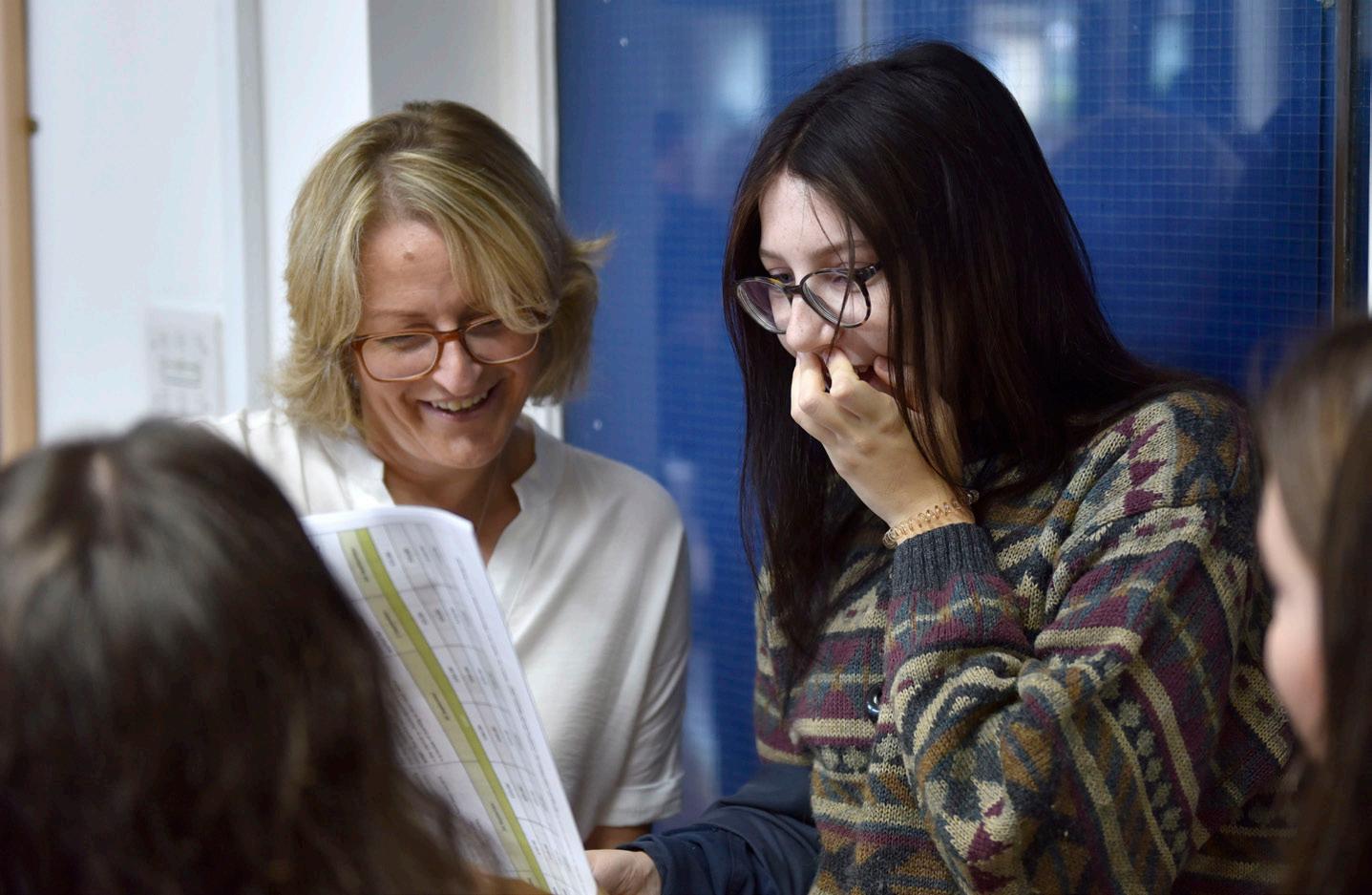
King Arthur’s School is thrilled to share the outstanding achievements of some of its students in their GCSE examinations and vocational qualifications.
Moving on to study A Levels at Yeovil College, Eleanor Bowman was excited to receive 10 GCSEs, achieving one Grade 9, a Distinction*, three Grade 8s and five Grade 7s. Additionally, She managed to find time to complete and achieve a Level 3 Free Standing Additional Maths qualification. Eleanor is looking forward to enhancing her Level 3 learning by taking maths, chemistry and English at college. Ben Morris succeeded in achieving a Distinction*, one Grade 8, four Grade 7s, two Grade 6s, two Merit 2s and a grade B (Level 3) in his Free Standing Additional Maths. Ben leaves King Arthur’s to study A levels in maths, physics and English Language at The Gryphon School Sixth Form. Also choosing a mixture of sciences, maths and English at A level, Katie Bolan is taking up her A level study at Yeovil College. She was thrilled to achieve two Grade 8s, four Grade 7s and four Grade 6s.
With such wide-ranging
opportunities of further study available to young people, the King Arthurs’ team are proud that 16 per cent of their students will take up apprenticeships locally. Harry Cropper moves on to an apprenticeship at Thales Engineering, a prestigious apprenticeship programme. Harvey Lane secured his landbased apprenticeship through Wiltshire College and University at the start of his KS4 studies. Two students are moving to the newer T Level vocational courses, with the remaining 80 per cent of Year 11 moving to studies at college or sixth form. Students have been confident in choosing courses out of county, as well as at local institutions. They reported how pleased
and proud they were, with many wanting to pass on their gratitude to teachers and staff at the school. It was a wonderful opportunity for the school to celebrate success.
‘We are extremely proud of all the hard work and awesome achievements of our students.’ said Headteacher Jen Jacklin. ‘After what has been a disrupted and difficult time, our students have risen to the challenge and demonstrated resilience and commitment to their success. As a school, we congratulate each and every student for their individual success and send our very best wishes for their future studies.
‘The improvement since the last set of formal exams in 2019 is both significant and exciting, and demonstrates what a rapidly improving school King Arthur’s is. Our teachers have worked tirelessly to support students to ensure they could achieve and take their next steps. As always, we will be thrilled to hear what our students achieve in the future and look forward to them joining our school alumni so we can stay in touch.’



Gryphon School students are celebrating an incredible set of GCSE results today. 14 students gained 10 or more GCSE grades equivalent to the old A* grade, and 39 gained 5 or more grades at that level.
Headteacher, Nicki Edwards, said ‘I couldn’t be more proud of all of our students. They have battled through three years of disruption in their education and have achieved these amazing results despite all of the challenges. We look forward to welcoming many of them into our Sixth Form, and wish those students going on to apprenticeships and college courses all the very best for their future.
‘I am very grateful for all of the effort put in by our incredible team of staff to support all of our students in enabling them to reach their full potential.’ Head of Year 11, Laura Bucke said ‘The achievements of this
year group are a reflection of their resilience and perseverance in the face of adversity throughout their GCSE years. I am proud of each and every one of them.’
Olympia Pudelko – who achieved an amazing 13 Grade 9s – and her friends Sophie Lord and Imogen Kimber said ‘Thank you to all our teachers. We are so
proud of everyone and feel shellshocked!’
Ben Titus is feeling ‘super proud and over-the-moon’ as he joins The Gryphon Sixth Form. As are Barney Griffiths and Liv Bowditch – Barney saying “I am very happy and looking forward to the next steps”. Liv said she was happy and excited to get the grades she needed for her A levels.

Shaftesbury School reports another great set of GCSE and BTEC exam results for students, among the best the school has ever achieved. The numbers of students achieving five or more 4+ grades including maths and English has improved, with many subjects securing at least 80 per cent of their entries at Grade 4+.
The most successful subjects were: the Arts, Biology, Chemistry and Physics, French, Religious Studies, Drama, History, and Maths.
Better than I hoped Headteacher Donna London-Hill said: ‘We are thrilled with these results. They are a testament to the hard work of our students and staff who together have achieved these high outcomes. We all know that the past few years have been tough, but the resilience and determination shown by our young people has been brilliant, and it goes to show that hard work pays off. The students were relieved and
delighted with the results and it was lovely to see so many happy faces. It means that they are able to move on to their next steps, which is great.’
The students were equally delighted with their results. One commented; ‘I am so relieved’, while another reported that ‘these are better than I could have hoped’.
Lots of students were keen to thank their teachers for the support and guidance that they had been offered for the duration of their courses, proving that education is very much a partnership. The school is very proud of the outcomes today and would like to wish every student a very happy and fulfilling future.
Just as the A level cohort had to contend with the added pressures, constraints and frustrations of the pandemic, so this year’s GCSE candidates were required to work towards their examinations against the background of considerable disruption and uncertainty.
Despite that, they have done magnificently well – 22 per cent of their GCSEs were awarded the top grade of 9; 48% grades 9 and 8; and 67% 9 to 7 (equivalent to the old A*/A grades).
On an individual level, 18 boys achieved ten or more grades 9-7. Among them is Bertie T, who secured an exceptional 12 Grade
9s, a feat emulated by only a dozen or so pupils across the country. Hot on his heels were Max S with ten Grade 9s and two 8s, and Hector K with ten 9s and one 8.
Just as impressive were all those boys whose grades demonstrated the power of hard work, commitment and selfbelief.
Headmaster Dr Dominic Luckett commented: ‘I am tremendously impressed by these results. They have shown great determination, resilience and ambition and their grades are a fitting reward. It is also worth noting that many
of the boys have extremely busy co-curricular programmes and have successfully combined their sport, music, art, drama and outdoor activities with the highest levels of academic attainment. Great credit also goes to their teachers and the other staff who nurtured and supported them through some very challenging times. I am very grateful to them all.
Equally, I am delighted that pupils at our sister school, Sherborne Girls, have achieved similarly excellent results.
Congratulations to them all – I want the boys to know how proud of them we are.’
Sherborne School and Sherborne Girls are celebrating superb and well-deserved A level results.
Sherborne School leavers look to start their degree courses, which range from Veterinary Science, Medicine, Mathematics and Engineering to English, History and Theology.

Sherborne Girls will be taking up a range of courses including Aerospace Engineering, Law, Veterinary Medicine, Physiotherapy, Liberal Arts, Medicine, Graphic Design, Economics and Finance, International Relations and Neuroscience.
Pupils from the two schools will be studying at top UK universities including Oxford, Cambridge, and Russell Group and prestigious overseas universities including
Hong Kong University, as well as universities in Norway, Estonia, Spain, Paris and New York. At Sherborne School, 28 per cent of Upper Sixth boys were graded A*, 60 per cent A*-A and 83 per cent A*-B.
Given the additional challenges that they had to endure throughout their Sixth Form careers as a result of the pandemic, these achievements are all the more impressive and a special mention is made by the school of Denys, a Ukrainian HMC scholar, who achieved A*A*AA despite coping with the dreadful events unfolding in his homeland.
Headmaster Dr Dominic Luckett said: ‘We could not be more proud of them all, not simply because of their stellar academic
and co-curricular achievements but for the superb young men that they are’.
Sherborne Girls are celebrating a record 26 per cent at A* grade. Sherborne Girls’ Head, Dr Ruth Sullivan, said: ‘I would like to congratulate our outgoing Upper Sixth who have been a privilege to work with during their time at Sherborne Girls. They have shown a level of maturity, good humour, focus and stoicism beyond their years, while continuing to be caring, compassionate and supportive of one another. I have never failed to be impressed by their approach to learning and life.
‘I, along with all the staff at Sherborne Girls, wish them every success as they embark on the next stage of their journeys.’

With the success of the UEFA Women’s European Championships, it seems that women’s sport is finally heading in the right direction. A recordbreaking Wembley stadium crowd of 87,192 witnessed England win their very first major women’s tournament. I don’t normally like watching football, but even I was gripped! Women’s sport hasn’t always been so well received though. Sport has been a male domain, mostly because vigorous activity was seen as inappropriate; women were sidelined and banned from participating.
Women’s football actually became popular during the First World War but, due to its increasing popularity, in 1921, the Football Association (FA) banned women from playing on FA-affiliated pitches. You can read the fascinating story here – it wasn’t until 1971, 50 years later, that the ban was overturned. This year’s Commonwealth Games in Birmingham was also
a massive success in terms of women’s sport, with more medals being awarded to women than men. The Games also saw the debut of the women’s T20 cricket.
I for one enjoyed sitting down with a cup of tea to watch everything the Games had to offer. Regular readers will know I love lifting weights, so the Olympic weightlifting was a personal highlight.
It is fair to say that equality in sport still has a way to go, but it is great to see how quickly it is progressing, with so many women’s sports like football, rugby and cricket getting ever more coverage and recognition. This will hopefully inspire more women to try a sport, nurturing the next generation into believing they can achieve whatever they wish to.
It is also a pleasure to see women participating not necessarily in the sport itself, but getting involved in other ways such as refereeing and coaching. I enjoy being part of a thriving senior ladies rugby team – a team that didn’t even exist five years ago. This season we are entering our very first league. We aren’t at elite level yet, but watch this space. In fact, most towns and villages now have at least one sports club open to women. So come on ladies, get yourselves involved!

With heroic successes and higher viewing figures, 2022 might just be the turning point for equality in sport, says expert Mel Mitchell
The message about reducing our intake of sugar is finally getting through: a high dietary sugar load is frequently one of the drivers behind obesity, diabetes, high cholesterol, worsened menopause symptoms and cognitive decline. Going cold turkey is the straightforward way to quit sugar but for some that is not an option. So how do we navigate the increasingly complex world of alternative sweeteners? Here is your guide:
It’s not a sugar substitute, but cinnamon is a fantastic sweet spice that may help to manage blood sugar highs and lows. Various studies have demonstrated beneficial effects of the spice on glucose, insulin, lipids, blood pressure and lean body mass. It needs to be used liberally for benefit; try a
whole teaspoon (my favourite is on stewed apples with Greek yogurt). Making sure you’re getting enough sleep, lots of fibre from veggies and plenty of protein in your diet are also all essential in fighting those sugar cravings.
Good PR sugar Honey, maple syrup, coconut sugar, rice syrup, date syrup and molasses are all popular with the healthy eating brigade. The truth is, though, that the body still just sees and treats these as if they are sugar.

They may have slightly less fructose and some nice minerals – but you would have to eat a lot to get any actual benefit. If you are reducing
sugar for health reasons, avoid these for now. Molasses is slightly lower on the glycemic index than the others and is probably the best of the bunch. It also has a huge amount of iron, among other things, so it’s great for those who need to increase their intake.
Oh, and demerara, turbinado, cane and dark brown sugar are still sugar. They just look fancy.
Demerara, turbinado, cane and dark brown sugar are still sugar –they just look fancy.
I say ‘possible’ because in studies, while lower in calories, nearly all alternative sweeteners have resulted in an increase in insulin and glucose levels. Additionally, a number of them contain FODMAPs (fermentable oligosaccharides, disaccharides, monosaccharides and polyols). These are short-
Finding sugar substitutions that aren’t even worse for you than the original can be tricky, says nutritional therapist Karen Geary
chain carbohydrates (sugars) that the small intestine absorbs poorly. Some people experience digestive distress after eating them – bloating, gas and diarrhoea. Choose wisely.
•
Stevia – normally used in drops, it is touted as the best natural low-calorie sweetener. Studies have noted that stevia does not significantly contribute to increased glucose and insulin levels.

The downside is that it can have a bitter aftertaste so shop around for a good one.
Low FODMAP.
• Yacon syrup – a favourite with people who stick to a keto diet, it is harvested from the yacon plant and it tastes like molasses. It is high in fructo-oligosaccharides (FOS) which feed good bacteria in the gut and helps with constipation.
Likely high FODMAP.
• Inulin – another FOS, a prebiotic fibre. Pretty good in tea and coffee but not as sweet as normal sugar.
High FODMAP.
• Monk fruit – quite hard to get in the UK but, like cinnamon, there is some research suggesting it may help blood sugar management. It has a caramel taste and is safe to use. Just check it hasn’t been combined with other sweeteners.
Low FODMAP.
• Erythritol (produced by fermentation from dextrose) and xylitol (wood sugar
from birch). Both are sugar alcohols, and are about 70 per cent as sweet as sugar but without the big insulin spike. Both are fabulous in low carb baking. Avoid, or take particular care with, xylitol if you have dogs at home as it is highly toxic. Erythritol is a low FODMAP, xylitol a high FODMAP.
• Allulose (watch this space) – not yet available in the UK, and relatively new to the market in the US.
It’s known as a ‘rare sugar’ and has the same chemical formula as fructose, but it is arranged differently, so it’s not processed in the body in the same way. It does not ferment in the gut so does not lead to digestive issues.
• Agave syrup. Diabetic friendly, this is a ‘natural’ sweetener but when processed it becomes 85 per cent fructose so it’s actually worse than sugar – it overloads the liver causing raised blood trigylcerides, bad (LDL) cholesterol and increased belly fat.
• High Fructose Corn syrup. Used mostly in processed foods but thankfully not in the same quantities here compared with other countries. It is known as the key driver of obesity, poor metabolic health and nonalcoholic fatty liver damage.
• Sorbitol and malitol. The sugar alcohols known for the most severe digestive distress and very high
• Aspartame, acesulfame-K, sucralose and saccharin. These are chemical sweeteners often under brand names such as Canderel, Hermesetas, Splenda, Sweetex. The jury is still out on the safety of these products and many people report side effects.
The jury is still out on the safety of some of these products and many people report side effects.
TRIGGER WARNING: References to suicide and selfinjurious behaviours which some people might find disturbing. If you need support, contact your GP or talk to The Samaritans on 116 123 or Dorset’s Connection on 0800 652 0190. For crisis help call 999or get to A&E if you can do so safely.
The stigma surrounding suicide is entrenched and globally recognised. Up until the early 1960s suicide was a crime, and anyone who ‘attempted’ and ‘failed’ could be arrested and prosecuted.

Although suicide is no longer illegal, the topic is still shrouded in shame and tarred with a similar brush. Even the phrase ‘to commit suicide’ perpetuates the narrative; the word ‘commit’ itself implies illegality.
According to the Office of National Statistics there were 5,691 suicides registered in England and Wales in 2019, three quarters of whom were men.
Three years on, this statistic has changed very slightly – the social stigma is reducing, people are reaching for help and the conversation surrounding mental health is finally becoming more normalised.
Simply starting a conversation can begin to interrupt the cycle of suicidal thought and help a person see that taking their own life is not the only option. It is important to remember that some people do not necessarily want to die. It is rather that they feel that suicide is the only option, in order to free themselves from their circumstances.
Sometimes those struggling just do not want to talk or be open about how they feel. If you fear they cannot keep themselves safe, it might be necessary to bring in trained support such as crisis teams and safeguarding professionals. If you can start a conversation, first choose an environment that is familiar and quiet – mutual comfort is important, as is talking openly without fear of interruption or others overhearing.
Also choose your timing. Trying to get someone to talk about their feelings when they are stressed or upset is not going to work. Make sure they feel safe and calm before you begin.
The most important thing to remember is just to listen. Active listening can be difficult, especially when you may be able to offer help. However, there is power in letting the person in distress feel heard, in giving them permission to talk through what is going on in their head.
It is also important to consider your non-verbal communication. If you as the listener are stressed, distracted or physically closed off, it may cause the speaker to feel that you are not interested. Open body language begins with the face – try to start with a raised brow and open eyes, giving good eye contact. This will signal that you are focused and listening. Make sure your body is facing towards the person with an open chest and palms, and with your feet flat on the floor. If this positioning feels too intense, try sitting beside the person instead.
Next, try not to give unsolicited advice. When someone is struggling, what they often want is someone to listen, not someone to tell them that they are doing the wrong thing. It is important for you to simply listen. Then, if appropriate, validate their feelings and give support.
Finally, remember to look after yourself too – we all have a tendency to throw ourselves into the fray in order to relieve some of the weight. But we cannot anticipate what effect that will have on our own mental health. If you do struggle as a result, reach out in your turn and share your feelings with someone else.
Dorset Mind has 1-2-1 and group support that you can access via their website: dorsetmind.uk/help-and-support/

Business owners face crushing costs on all sides, says CEO Ian Girling, as Dorset Chamber works to help where it can and lobby where it should
A warm welcome to my September column and I hope you’ve had a good summer. It’s clearly a very challenging time for both households and businesses as we all continue to face significant cost-of-living increases as well as soaring energy costs.
Recent statistics are worrying:
•
Inflation is at a 40 year high at over 10 per cent now and forecast to be at over 13 per cent in October. Some are predicting this could more than double next year.
• The latest increase of 1.75 per cent is the largest interest rate rise in 27 years and the rate is expected to increase further yet.
• We are seeing energy costs increase five-fold for some businesses – and households are also facing substantial cost increases.
• UK real pay has fallen by 3 per cent between April and June, the largest drop ever recorded – businesses are facing huge upward wage pressure.

• Insolvencies are on the increase, up by 63 per cent in the manufacturing sector since last year, and 60 per cent among UK restaurants.
As a Chamber, we continue to do our best for our members and Dorset businesses. Through our membership of the British Chambers of Commerce, at a national level were are pushing for increased support to include emergency energy grants for businesses, giving Ofgem further powers to strengthen

regulation of the energy market for businesses, a temporary cut in VAT to 5 per cent to reduce energy costs for businesses and for the Government to temporarily reverse National Insurance contributions and put money back into the pockets of businesses and workers.
We are also launching a new programme for businesses – a series of themed virtual workshops, free to attend, aimed at building the resilience of businesses. Our aim, as always, is to do our very best to
support Dorset businesses. I am very keen to hear how Dorset business are faring in the current climate. I’d like to hear about your specific concerns – and to see where we can help, whether through our lobbying or business support.
Please don’t hesitate to get in touch – we will do our best to help.
Contact the Chamber on 01202 71800 or you can message Ian via LinkedIn here
It’s never too late to reinvent your look; and that’s just what Classy Collections of Wimborne has done. After nearly 30 years in business, the award-winning, independent womenswear boutique has relaunched. In the heart of Wimborne
Minster – and now renamed CC of Wimborne – the shop has enjoyed a complete makeover inside and out. It has rebranded, revamped and has a whole new offering of sought-after designer labels that women of all ages are loving. Collections include Canadian designer Joseph Ribkoff, Marble, Just White, Toni and Rabe Moden. Whether you’re looking for trendy jeans or classic cut trousers, fashionable coats and winter wrap-overs, jumpers, shirts, a party look or relaxed loungewear – inspiration can now be found under one stylish roof.
Joseph Ribkoff is a Canadian designer known for fabulous fit and individuality. Dress it up one day for a wedding, wear it to a lunch another day. Even better, most items are crease-free. No ironing and so easy to pack!

Marble and Rabe Moden offer smart/casual jumpers, trousers, gilets, dresses and tops while Just White brings a quirky mix of stylish shirts perfect for jazzing up your look.

Orientique is an Australian ecoconscious label offering colourful organic cotton dresses and coverups perfect for beach to bar. Some are reversible – so you get two dresses for the price of one! With the long, hot summer this year, this cool and easy-to-wear collection sold out, but is being restocked with the latest new colours and styles for spring/ summer 2023. Excitingly, CC of Wimborne are expanding the holiday collection nexty year by introducing leading swimwear brand Triumph with a stunning choice of swimsuits and coordinated cover-ups.
A range of flattering bras and pants from leading designers Sloggi and Triumph means you can easily shape up your underwear too.
Owner Nicola Sheppard launched the business in 1993 and still works in the shop nearly every day. She says: ‘Fashion is in my
blood – I’m passionate about this business and I love helping a woman find what’s right for her. You just can’t get that one-to-one service when you shop online.’
Nicola and her team offer a personal shopping experience, and pride themselves on being friendly, honest and unpressurised.
‘We don’t do age-appropriate dressing here. We do age-less, helping every customer to find their individual style. Your clothes should reflect your personality and lifestyle.’ explains Nicola.
She adds: ‘We plan to celebrate 30 years in business with lots of special events for customers – it’s a true milestone in retail. When I opened the boutique, there were seven other independent clothes shops in the town – three in this street! I’m the only one still here and I’m still moving forward with new ideas to grow the business! That’s something to celebrate!’
CC of Wimborne is at 11 East Street, Wimborne BH21 1DS. Open Monday to Saturday 10am to 4pm. Visit classycollections.info
In their first land event since the pandemic, DOMVS estate agents will host an informative land seminar on Thursday 22nd September - an event that, preCOVID, was always well attended by local residents.
Free to attend and open to the public, the panel of six expert speakers will provide invaluable information to landowners who want to realise development potential for their sites.
The event, which will be held at The Crown Hotel in Blandford Forum, starts at 8.30am and will finish at 11am. Polly Greenway, CEO of DOMVS will be joined by Simon Hoare, Conservative MP for North Dorset, Emma Stainwright from Steele Raymond
Solicitors, Stephen Johnson from Williams Lester Architects, Peter Cattermole from CB Reid Accountants, Brett Spiller from Chapman Lily Planning and Neil Greenway, who is the DOMVS land specialist.
Neil Greenway says: ‘Much has changed in the last few years. There has been the introduction of new Building Control standards, ever-changing planning requirements – most recently regarding phosphates and nitrates – and building cost increases. This is why we’ve gathered together some of Dorset’s most knowledgeable industry experts to help demystify the process.
With land-savvy lawyers,
architect expertise and insider planning knowledge, attendees can expect to leave better informed about their land assets and their anticipated returns.’
Brett Spiller from Chapman Lily Planning says: ‘We are delighted to join the coveted DOMVS Land Seminar once again. It’s a great opportunity to meet with our local community and share our planning insights.’
With Dorset planning applications currently taking over a year in some cases – far exceeding the Government’s regulatory eight weeks – the DOMVS Land Seminar provides valuable, practical information for what is traditionally known as a difficult process.
Local family brewer Hall & Woodhouse will be running the main bar at this year’s Dorset County Show - and has pledged to donate all profits from the event to charity.
This will be Hall & Woodhouse’s first time at the county show, and all profits will be split between the show’s chosen charities, The Royal Agricultural Benevolent Institution and The Farmer’s Crisis Network (FCN) Dorset.
The Badger Beer Volkswagen will also make an appearance at the show, offering free samples of Badger, as well as selling some bottled Badger and branded merchandise.

There will also be free ‘Badger beer and cheese’ tasting sessions, hosted by Mark Woodhouse, Hall & Woodhouse’s family director. These will run at 1pm on Saturday 3rd and 12pm Sunday 4th, and encourage visitors to try new ways of enjoying everyone’s favourite food with Badger beer.
Anthony Woodhouse, chairman of Hall & Woodhouse, said: ‘This
event celebrates the best of local agriculture, farmers, and producers. As a Dorset business, it is so important that we give back to our community.
‘We are excited to be part of this year’s Dorset County Show and spend time with the visitors who are just as passionate as us about supporting our farmers and local producers.”
Nicki Ralph, chair of Dorchester Agricultural Society, added: ‘We are thrilled to receive Hall & Woodhouse’s support for our chosen charities. We’re delighted
the Dorset County Show is back with all the major attractions the show is known and loved for, such as cattle and livestock, sheep shearing, vintage tractors, show jumping, shopping, and plenty of food and drink. There’s live music, the fun fair, a local artisan’s tent, the Fabulous Food and Farming zone – it’s ideal family entertainment’
The show is on Saturday 3rd and Sunday 4th September at Dorchester Showground, Cokers Frome, 8.30am- 6pm both days. Tickets £23pp, under 16s free.
